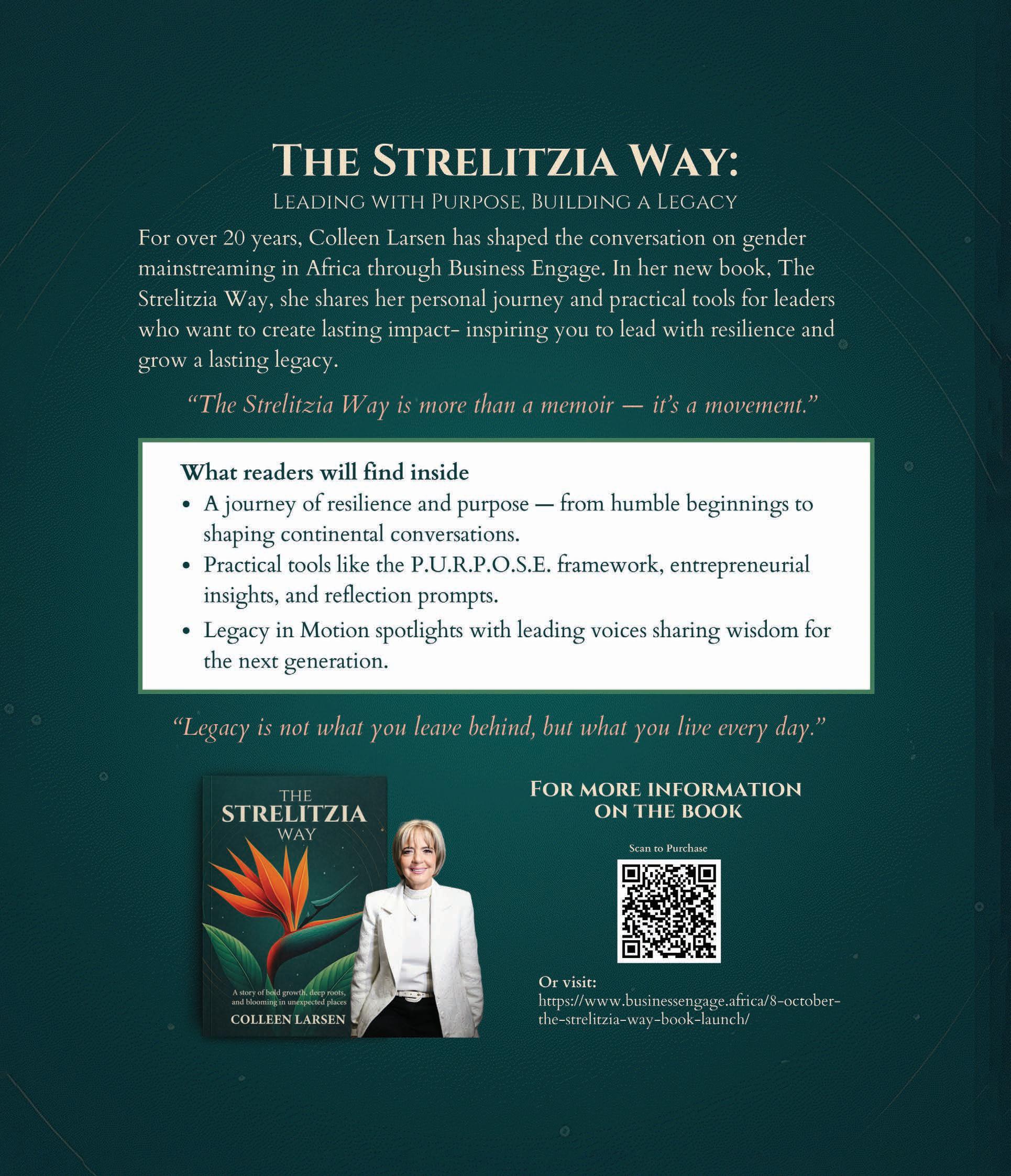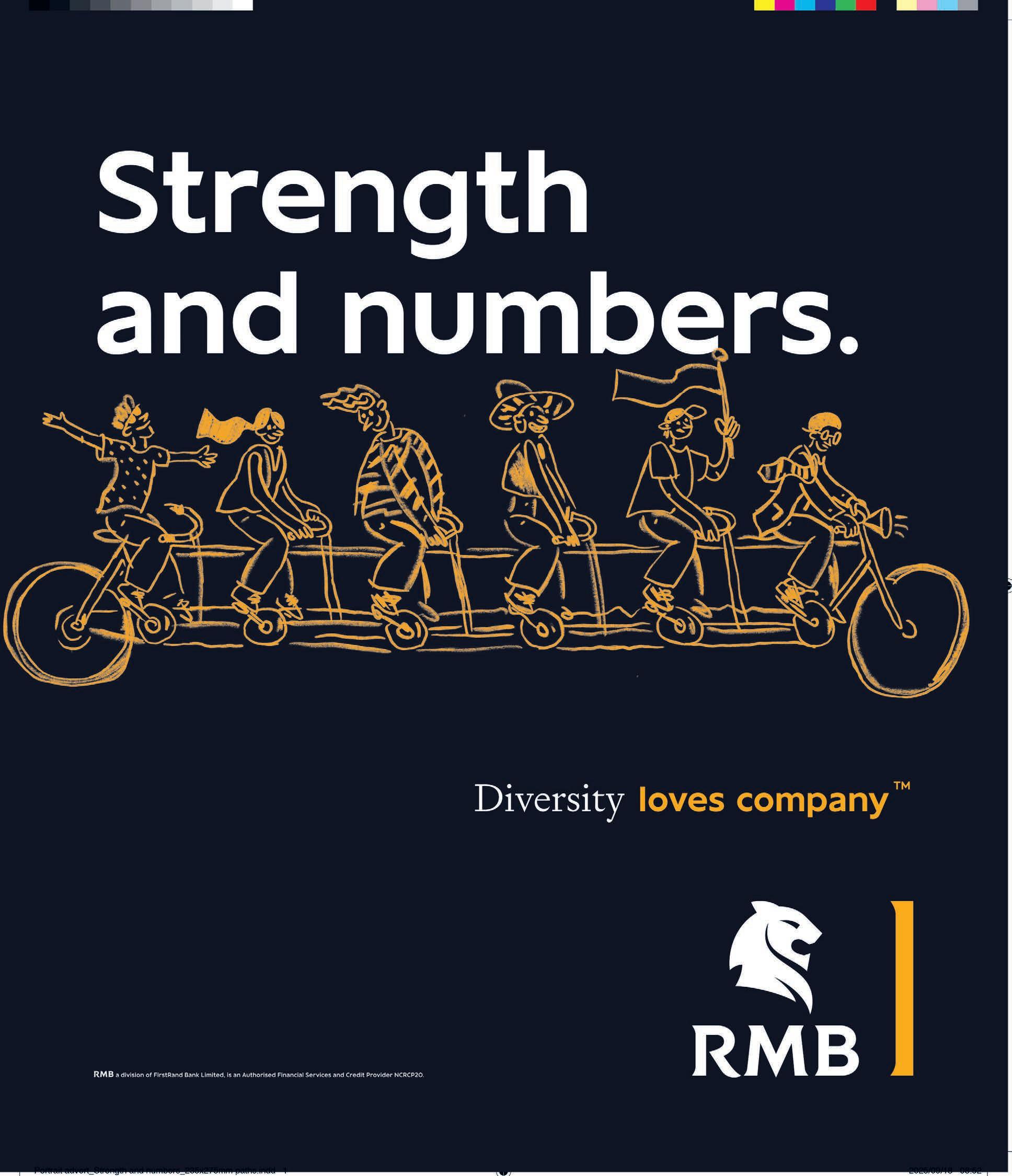







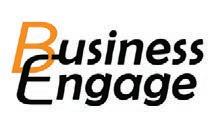









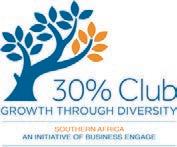

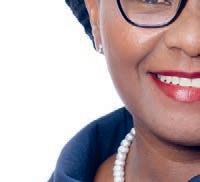














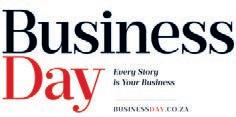























































































































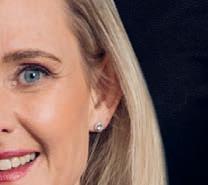
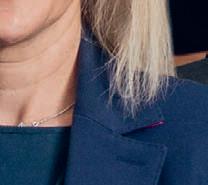
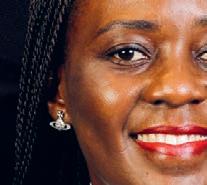

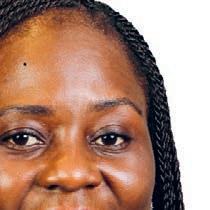

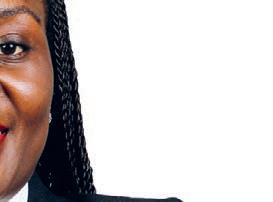

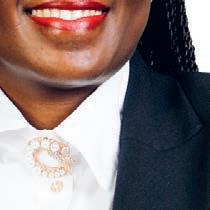




























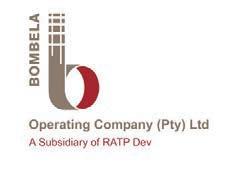




















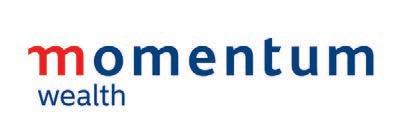


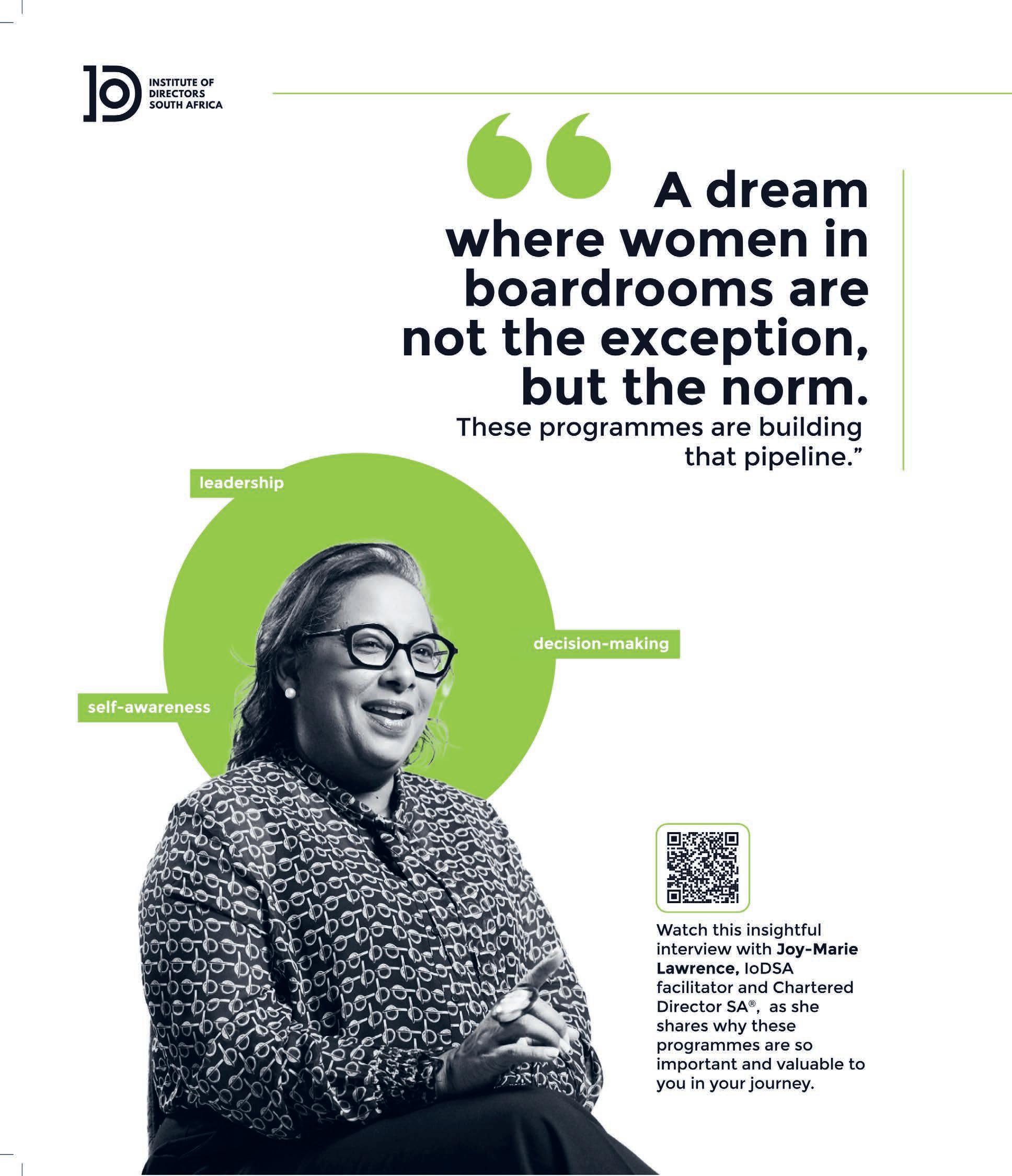
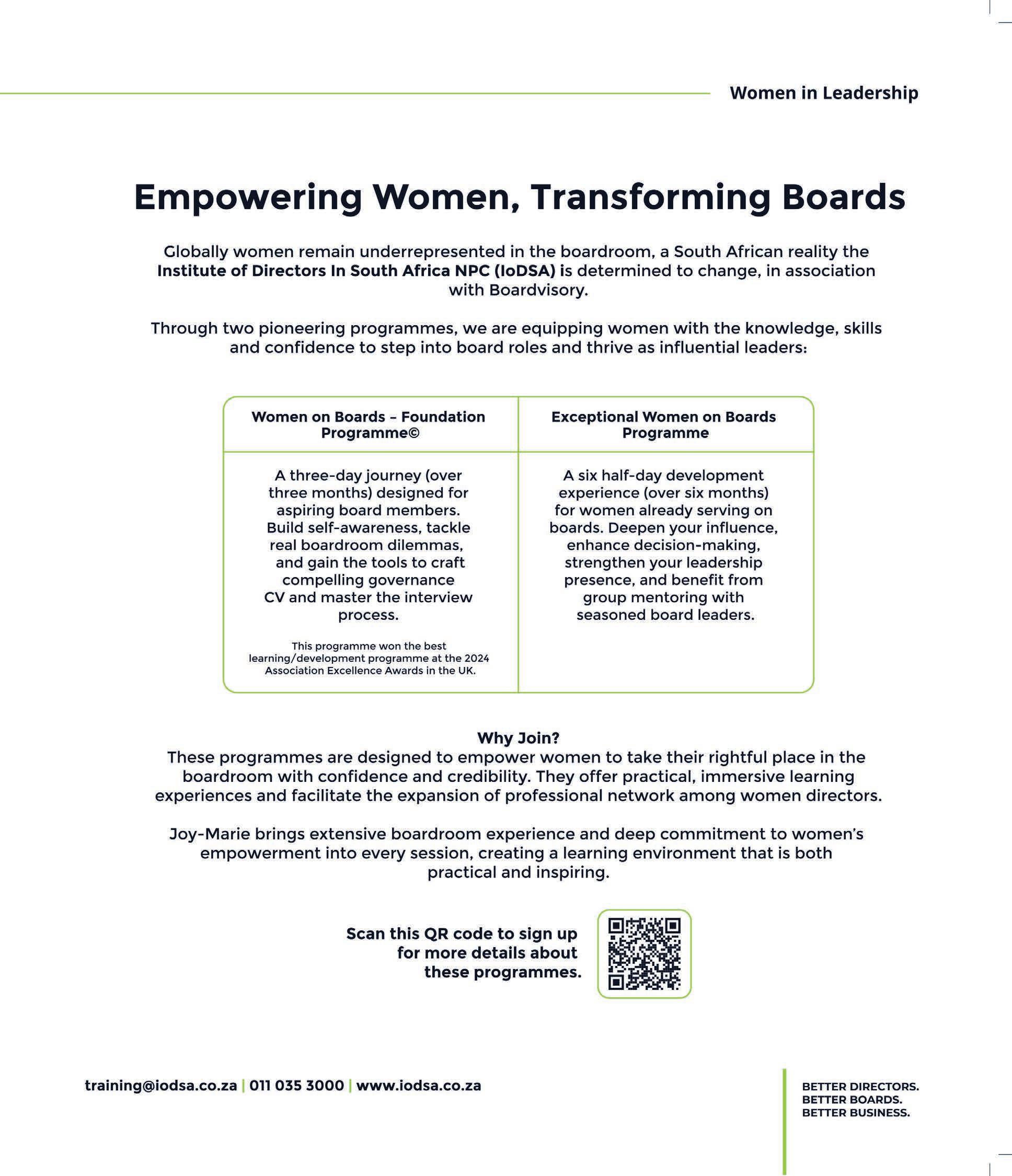
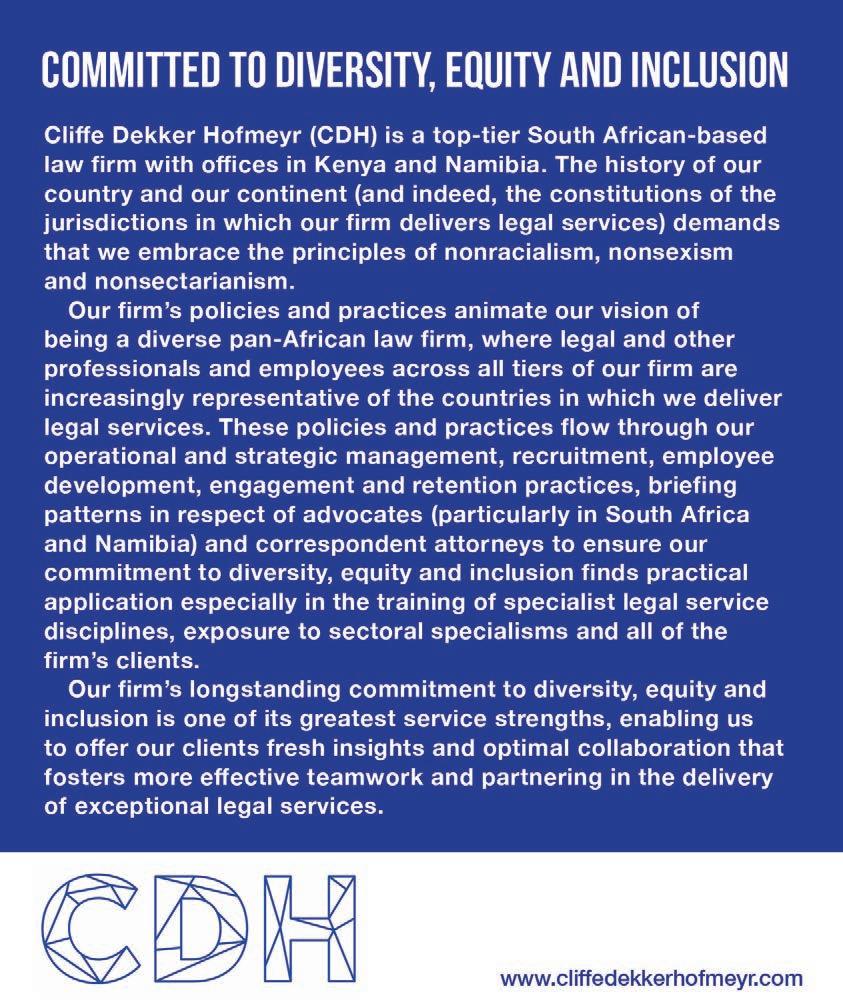
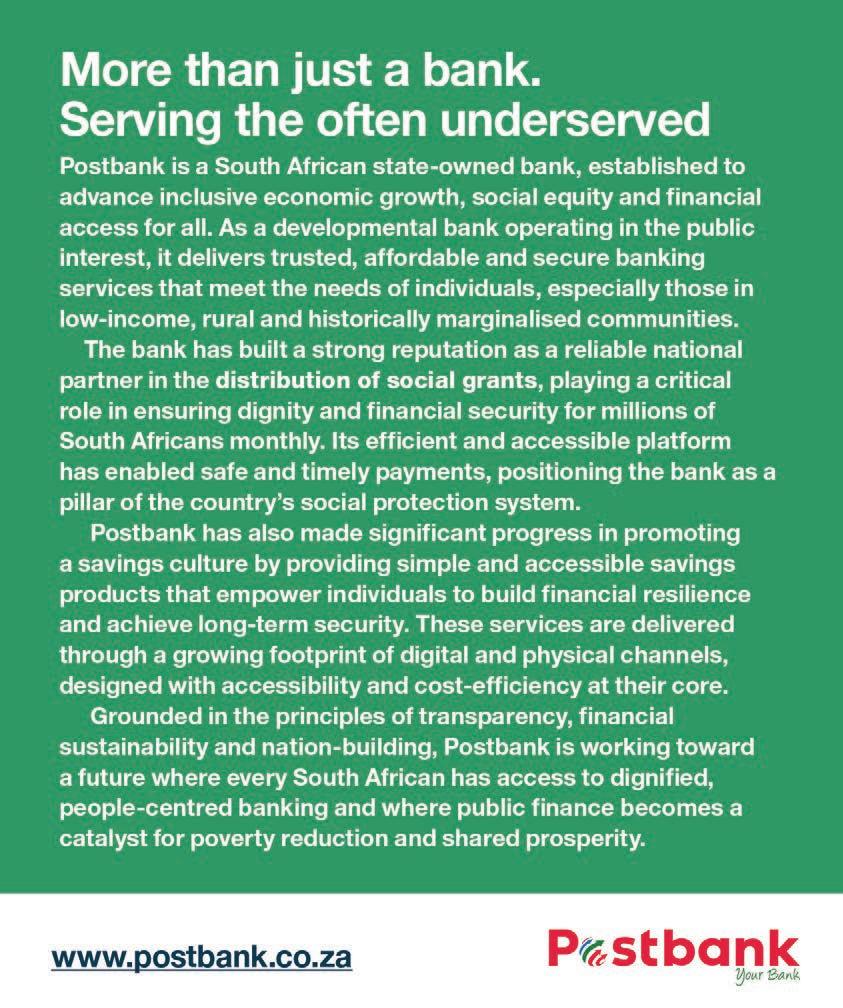
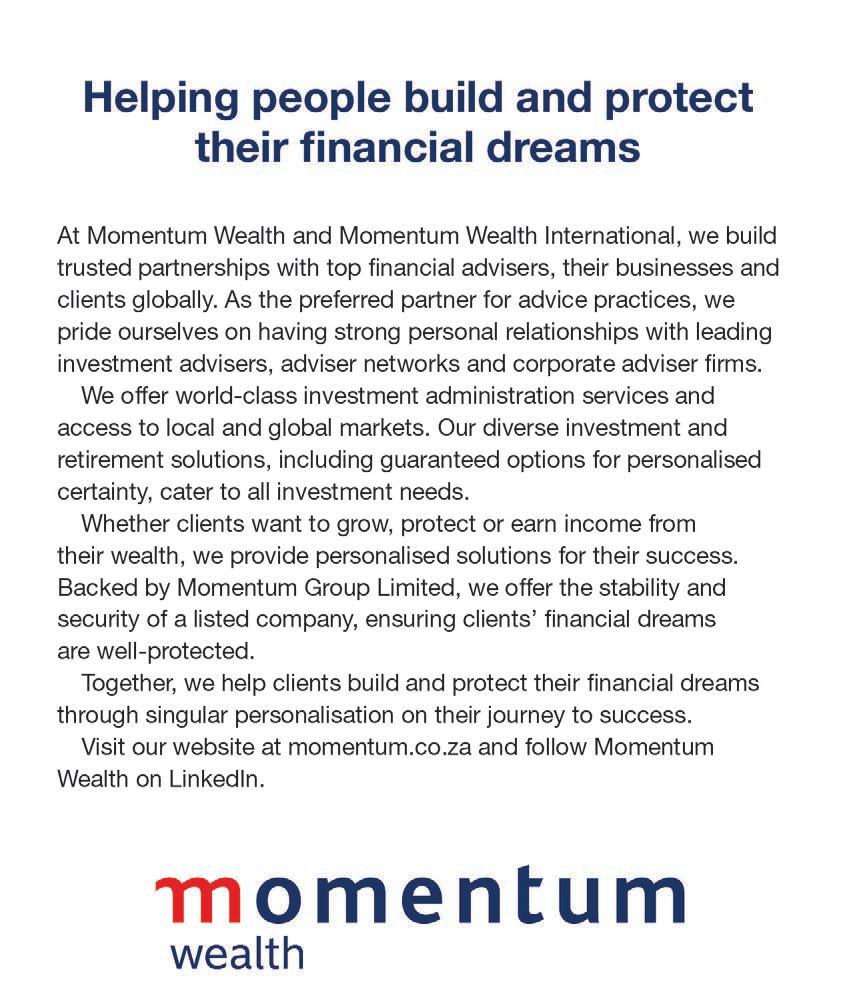
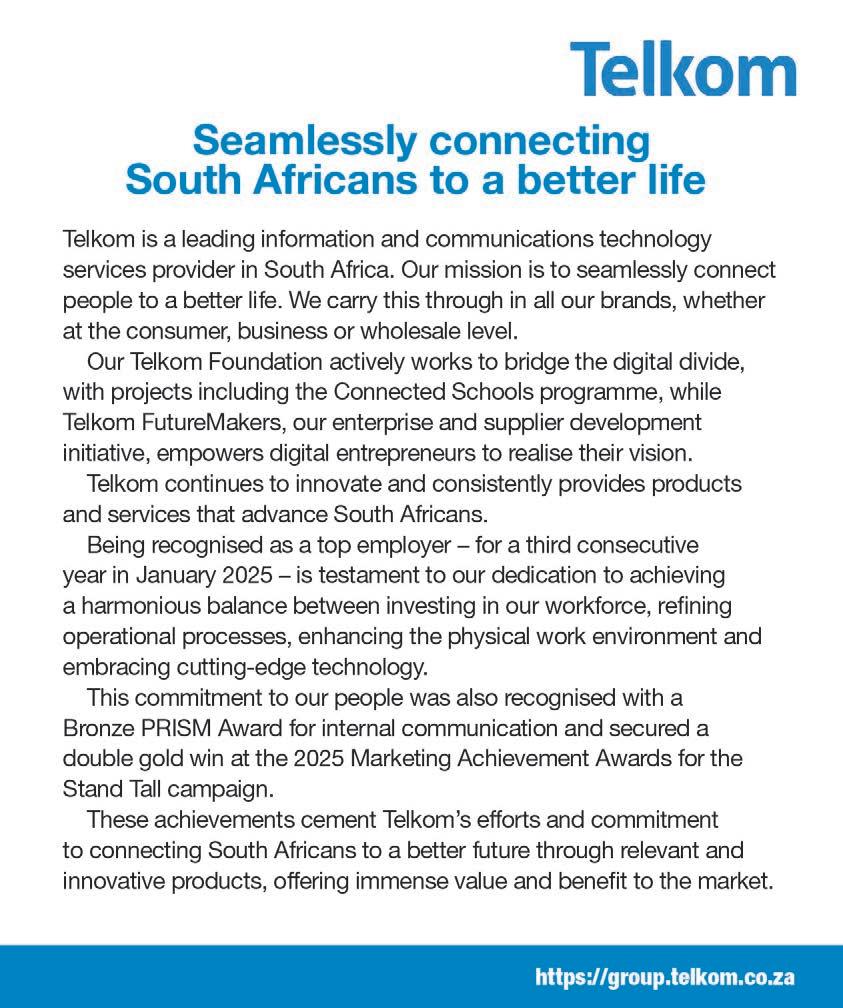
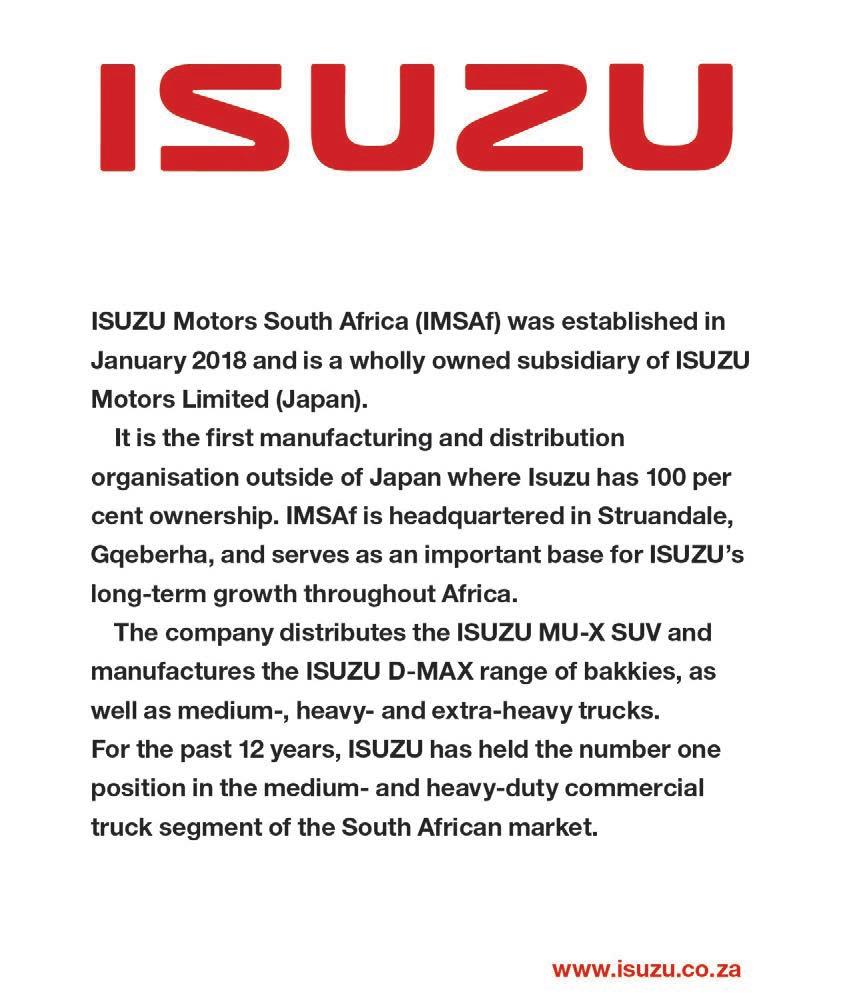
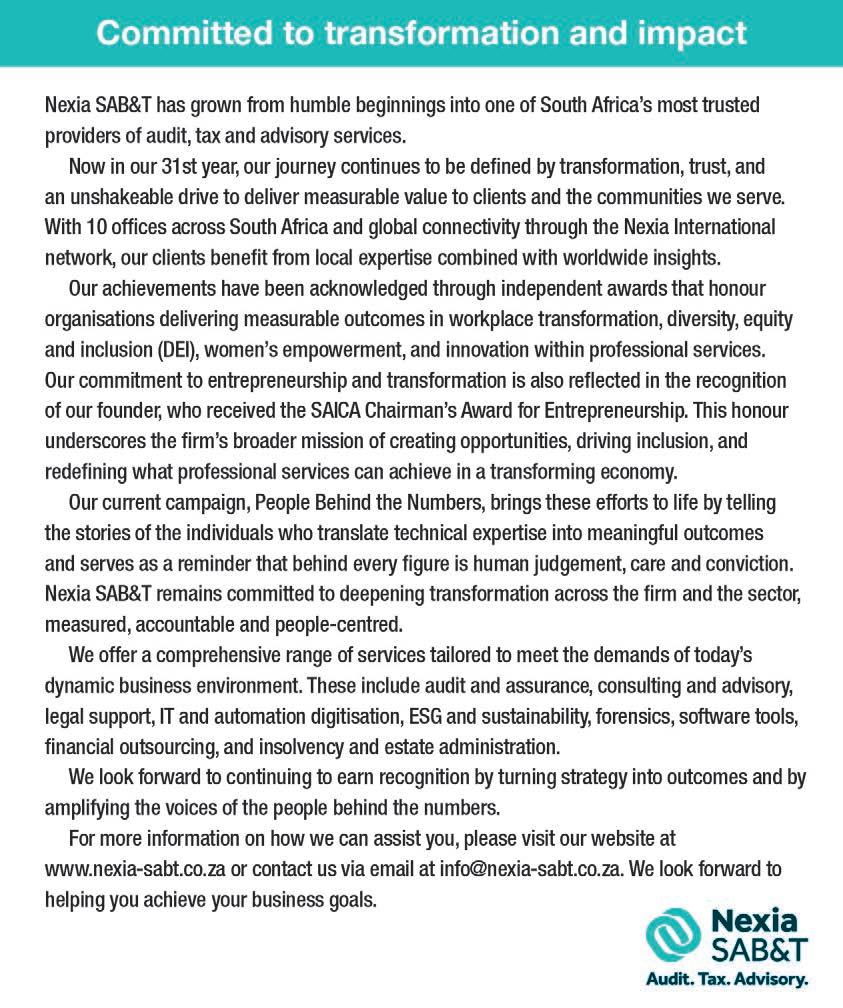
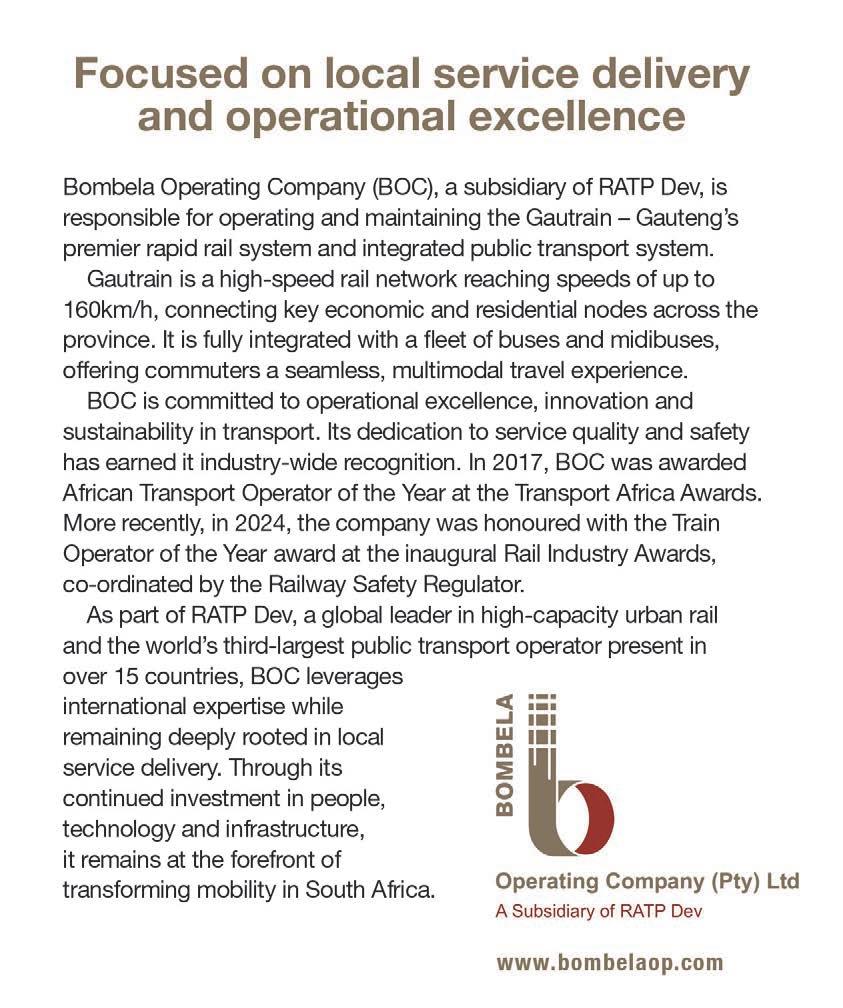
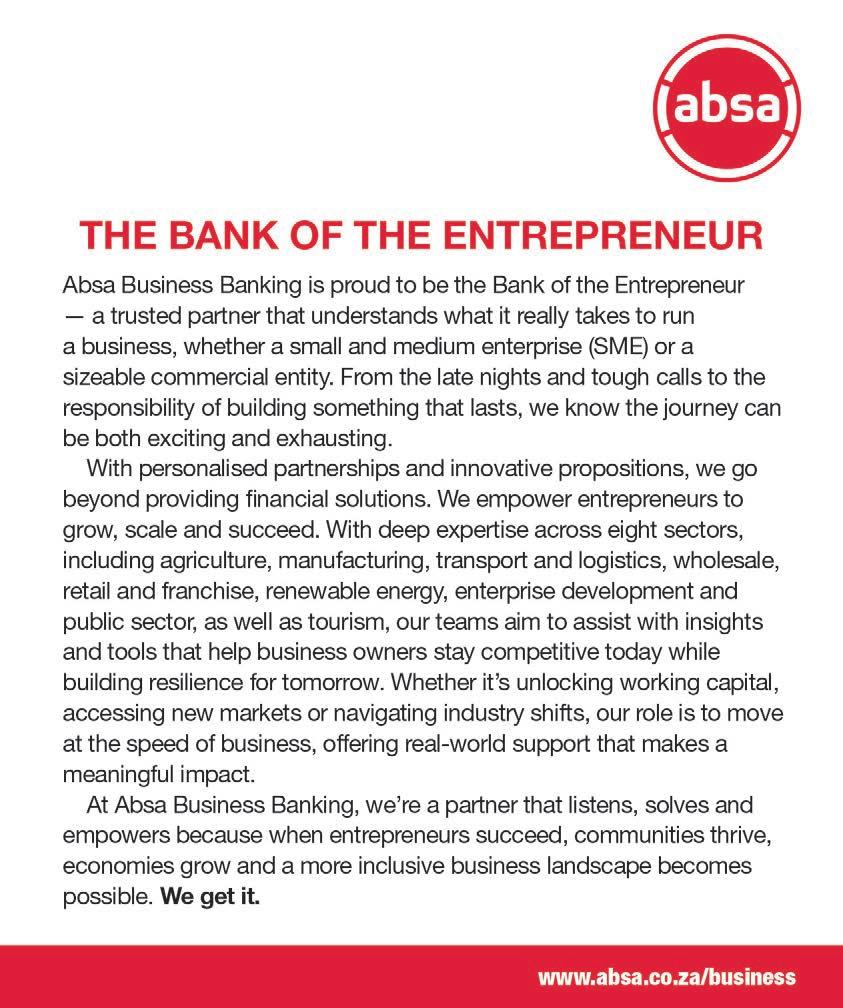



































































































































































































































Why celebrating Africa’s gender champions matters – the GMAs spotlight corporates and leaders embedding inclusion and driving progress.
Who are South Africa’s corporates instilling gender equity into culture, leadership and strategy across Southern Africa?
14
Two decades of Business Engage’s journey – unseen collaborations, regional growth and actions that embed gender equity into Africa’s business core and leadership culture.
SAID, THEY LISTENED
More and more women are shaping change in spaces where their voices might not have been heard before.
18 COLLABORATION
Women leaders are playing a critical role at the intersection of public and private sector collaboration.
28 BREAKING
Gender targets alone won’t x South Africa’s leadership gap. We discover the real barriers lie in culture, access and systemic bias.
31
Africa’s progress in terms of gender empowerment is frequently overshadowed by work in other regions. However, this belies that steady advancements are being made throughout the continent.
38 CHANGE-MAKERS
A new generation of young black women are rewriting the leadership playbook in their respective elds.
40 LEADERSHIP REDEFINED



42
Colleen Larsen shares insights from a journey of resilience, equity and purposeful leadership in business.
49 MENTORSHIP
Exploring why mentorship among women remains a missing link in transformation and why meaningful support structures are needed to unlock real change.
50 GENDER EQUITY
We unpack South Africa’s evolving gender equity journey, from representation to real in uence.
54 CORPORATE
Research reports may paint a more positive picture of South African businesses’ efforts to promote women into positions of leadership, but the lived reality is more nuanced.
58 TRANSFORMATION


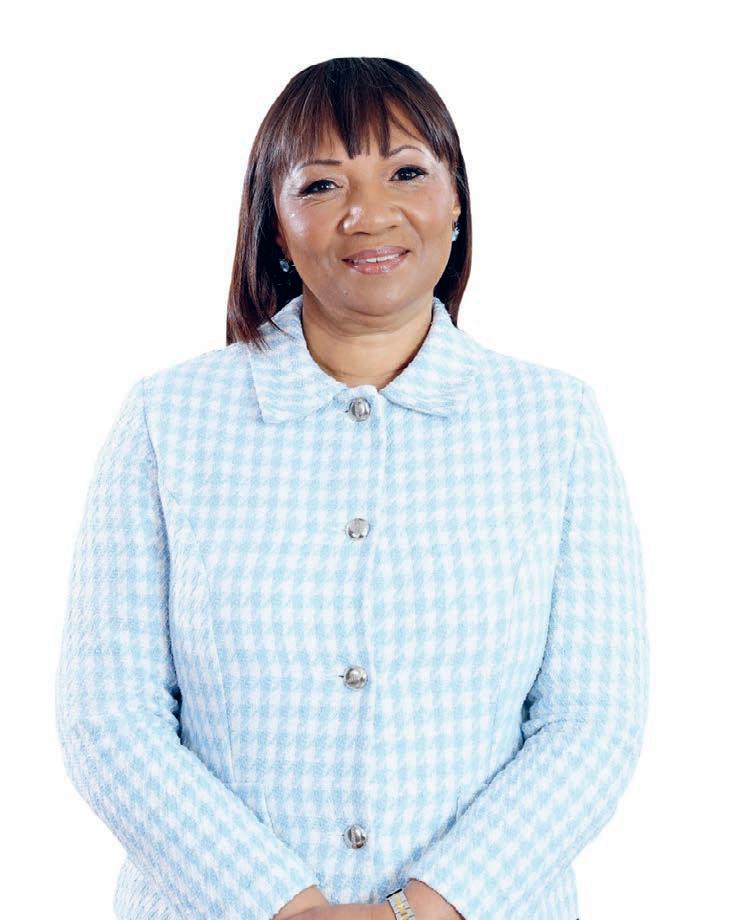
We explore how empathy and shared authority are rede ning leadership in a changing world.
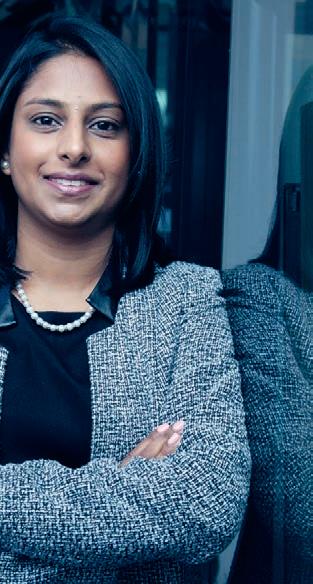
Uncovering the gender equity policies of two companies that are creating meaningful and lasting change.




60 REPRESENTATION
We explore the shift from symbolic appointments to genuine, system-changing representation.
62 SUCCESSION PLANNING
Practically implementing pipeline strategies and following through with real action goes beyond ticking the box.
66
Despite the “motherhood penalty” phenomenon, a select group of South African companies is rede ning the narrative, creating opportunities for growth and inclusion.



68
Menopause affects one in three South African women – impacting performance, retention and leadership continuity – making menopause-inclusive policies a strategic business imperative.

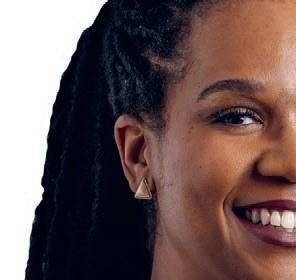


70
Gender-based violence and harassment costs South African organisations billions, but what is the economic impact for survivors?
74
In the wake of the fourth industrial revolution, women across Africa are not merely adapting to digital disruption; they are orchestrating it.
78
We unpack how ntech innovation is disrupting South Africa’s traditional banking barriers; and Why corporates must partner with SMMEs to drive growth and transformation.
82

African women entrepreneurs are nally getting support and access to vital credit and tools to unlock their potential and drive growth.
87 AGRICULTURE
Women are fundamentally helping shape a more resilient food system, writes Anina Hunter.

90
It is a responsibility and a privilege to manage people’s investments with care and discipline.
99
Keshia Manolios believes progress towards a truly inclusive corporate world is accelerating.
101
In South Africa, women’s representation in academic leadership remains a concern, shares Professor Sibusiso Moyo.
107
The next generation of leaders in academia must ready themselves to deal with geopolitical tensions as well as arti cial intelligence, shares Professor Grace Khunou.
110
Precious Ndluli is intentional about sponsorship, not just mentorship, actively advocating for women in rooms where they are absent.
112
Nonku Pitje shares the lessons that helped her harness her strengths, shape her career and live in her purpose. 49 79
96

Why equity must be built into every aspect of the employee experience; and How clarity of purpose drives powerful connections with colleagues and customers alike.




Po wer is never given freely – it is demanded, shaped and lived into reality. This year’s Celebrating Women issue is anchored in the theme “Power Moves: Women shaping systems, shifting cultures and driving South Africa Forward”. It is both a celebration and a challenge: a celebration of the women rewriting the rules of leadership, business and society, and a challenge to a country that still drags its feet on gender equity.
South Africa cannot claim transformation while gender-based violence continues to scar our homes, workplaces and communities. Nor can we speak of progress when women in corporate South Africa remain locked out of the C-suite, when motherhood becomes a punishment in the form of stalled careers, and when unconscious bias and gendered language quietly reinforce exclusionary cultures. These are uncomfortable truths, but necessary ones. Real empowerment requires us to confront these systemic barriers with urgency, not platitudes.
Yet power shifts are happening. Across the small, medium and micro enterprise sector, women are building resilient micro businesses –often in the informal economy – with little structural support. Imagine the economic potential if financial inclusion, targeted funding and integrated market access became standard practice. In boardrooms and classrooms, young black women are reshaping science, tech, culture and education, proving that succession planning is not an afterthought, but a national priority. In policy spaces, too, women’s advocacy has sparked change – “she said, they listened” is no longer a slogan; it’s a lived reality.
Published by:
PIcasso Headline, a proud division of Arena Holdings (Pty) Ltd Hill on Empire, 16 Empire Road (cnr Hillside Road), Parktown, Johannesburg, 2193 PO Box 12500, Mill Street, Cape Town, 8010 www.businessmediamags.co.za
EDITORIAL
Content Manager: Raina Julies rainaj@picasso.co.za
Contributors: Ryland Fisher, Zisanda Gila, Anina Hunter, Professor Grace Khunou, Colleen Larsen, Bridget Makhura, Brigitta Mangale, Keshia Manolios, Matsie Mpshe, Itumeleng Mogaki, Busani Moyo, Professor Sibusiso Moyo, Glenda Nevill, Precious Ndluli,
Globally, there are lessons to be learned: from gender-lens investing to menopause-inclusive policies that acknowledge the realities of working women in midlife. Locally, some companies have shown what transformation looks like when policies aren’t performative, but deeply embedded in operations, culture and leadership. Their stories prove that when policies work, women rise –and when women rise, organisations thrive.
However, gains are fragile. The rise of artificial intelligence threatens to erode decades of progress, particularly for women concentrated in the administrative and support functions most vulnerable to automation. If we do not act intentionally, the so-called future of work risks becoming another chapter in women’s exclusion.
So, where are the women CEOs of top JSE companies? Why does gender parity at the highest levels remain elusive? Perhaps because true equity demands more than quotas – it demands reimagining leadership itself. Empathy, influence and shared authority are not soft skills; they are power moves. Women are proving that leadership rooted in emotional intelligence is not only modern; it’s essential.
Yet, even as we celebrate these power moves, one truth remains: we need men’s voices alongside ours. Gender equity cannot be advanced in silos. Power shifts demand shared accountability – men must be part of dismantling exclusionary cultures, confronting bias and standing against gender-based violence.
This issue is an invitation: to celebrate, to interrogate and to act. The time for tokenism is over. The time for true power shifts is now.
Raina Julies
Thando Pato, Brendon Petersen, Nonku Pitje, Vanessa Rogers, Elriza Theron, Lisa Witepski
Copy Editor: Brenda Bryden
Content Co-ordinator: Natasha Maneveldt
DESIGN
Head of Design: Jayne Macé-Ferguson
Senior Designer: Mfundo Archie Ndzo
Cover Images: supplied
SALES
Project Manager: Tarrin-Lee Watts
wattst@arena.africa | +27 87 379 7119
+27 79 504 7729
Sales: Jacqueline Bezuidenhout
PRODUCTION
Production Editor: Shamiela Brenner
Subscriptions and Distribution: Fatima Dramat, fatimad@picasso.co.za
Online Editor: Stacey Visser vissers@businessmediamags.co.za
Printing: CTP Printers, Cape Town
MANAGEMENT
Management Accountant: Deidre Musha
Business Manager: Lodewyk van der Walt
General Manager, Magazines: Jocelyne Bayer






COPYRIGHT: Picasso Headline. No portion of this magazine may be reproduced in any form without written consent of the publisher. The publisher is not responsible for unsolicited material. Celebrating Women is published by Picasso Headline. The opinions expressed are not necessarily those of Picasso Headline. All advertisements/ advertorials have been paid for and therefore do not carry any endorsement by the publisher.
Mokebe Thulo, CEO of AWARE.ORG , is leading a new era of alcohol responsibility in
In a country grappling with the far-reaching consequences of alcohol misuse – where the ripple effects touch families, communities and the economy – Mokebe Thulo stands at the forefront of a decisive shift.
As CEO of the Association for Alcohol Responsibility and Education (Aware.org), she is steering a national movement focused on restoring dignity and choice while reducing harm. “Leadership is not about position; it’s about purpose and impact,” she says. Under her guidance, Aware.org has made this philosophy the heartbeat of its work, shaping both strategy and action on the ground.
At its heart, Aware.org is a collaborative platform where government, civil society and the alcohol industry co-create long-term solutions. What sets it apart is the way it works: education over enforcement, empathy over blame and inclusion over stigma. This approach plays out across three priorities: saying no to underage drinking, road safety and sober pregnancies.
The #NOtoUnderageDrinking campaign reaches young people through peer-to-peer education, school outreach, recreational programmes, engaging digital platforms designed for Gen Z and gami ed tools like Roblox. In the past year alone, 129 033 young people took part in these interventions, while 3 224 parents participated in programmes that help them guide healthier decisions at home.
On the roads, Aware.org partners with law enforcement and provincial road agencies, contributing to more than 10 000 roadblocks in 2024. These efforts led to over 9 000 arrests for alcohol-related traf c offences, while mass media campaigns reached millions, supporting measurable declines in alcohol-related crashes in several provinces.

Aware.org is dedicated to promoting and supporting the responsible use of alcohol. Its programmes target specific areas of harmful alcohol use, including underage drinking, consuming alcohol during pregnancy and road safety. Using recognised behaviour change approaches and informed interventions, Aware.org, an initiative of the alcohol industry in South Africa, collaborates with organisations experienced in the prioritised areas of action.
In the area of sober pregnancies – where South Africa faces some of the highest It should be fetal alcohol spectrum disorder (FASD) rates globally – Aware.org and the Foundation for Alcohol Related Research (FARR) deliver targeted behavioural change programmes. From Healthy Mother Healthy Baby workshops to community dialogue circles, the initiative reached 5 852 direct bene ciaries and 30 860 community members and leaders in 2024. “These results re ect a new era of responsibility,” says Thulo. “They’re proof of what’s possible when evidence, compassion and collaboration align.”
Every campaign is informed by behavioural science, ensuring it addresses root causes rather than symptoms. Pre- and postintervention evaluations, along with feedback from community ambassadors, keep programmes responsive and effective. “We want to shift behaviour sustainably – not through fear, but through understanding,” says Thulo. “That’s why we design with communities, not for them.”
This commitment to creative, evidence-led change has earned industry recognition. In
early 2024, Thulo was named 12th in the Loeries Of cial Rankings for Brand Managers, acknowledging her role in elevating Aware.org’s voice and in uence.
Since stepping into the CEO role, she has brought renewed purpose and clarity to the organisation’s mission. Her leadership blends empathy with evidence and courage with collaboration – qualities that are reshaping not only Aware.org, but also the way purpose-led organisations operate in South Africa. She believes lasting change happens when voice, visibility and values meet. Through cross-sector partnerships, Aware.org is building a culture where alcohol responsibility is chosen, not imposed.
“You are the architects of the future,” she tells young South Africans. “Trust your power, own your space and never be afraid to lead change.” Through her work, and that of Aware.org, she is building the infrastructure that makes this possible, changing not just behaviours, but also the way society understands and embraces responsibility.
For Thulo, the goal is bigger than reducing harm. It is about building systems of compassion, protecting the right to informed choice and embedding responsibility deep into the country’s social fabric. That is more than strategy; it’s legacy work.

For more information: www.aware.org.za
ABSA BUSINESS BANKING is committed to engaging, empowering and serving entrepreneurs, particularly women and youth
Despite signi cant progress, women continue to ght harder to get ahead. While Stats SA in its General Household Survey 2024 estimates that 42 per cent of South African households are led by women, women earn, according to data from the World Economic Forum, between 23 and 35 per cent less than men when doing the same job. At the same time, the Public Investment Corporation estimates that in 2023, only about 22 per cent of businesses operating in South Africa were owned by women.
In a similar vein, young people represent around 33 per cent of the population in South Africa, yet the participation of youth in business is relatively low. According to the Quarterly Labour Force Survey, 40.5 per cent of youth between the ages of 25 and 34 are unemployed.
Recognising the importance of empowering women and youth entrepreneurs, Absa Business Banking has been involved in several initiatives aimed at supporting these vital segments.
In 2023, it launched a proposition speci cally aimed at solving the pain points of women and youth entrepreneurs. While the proposition offers simple transactional banking, discounted business protection, easy access to funding and exible payment options, it also unlocks access to relevant training, networking and market access.
In addition, it focuses on holistic nancial planning. Speci cally designed for youth
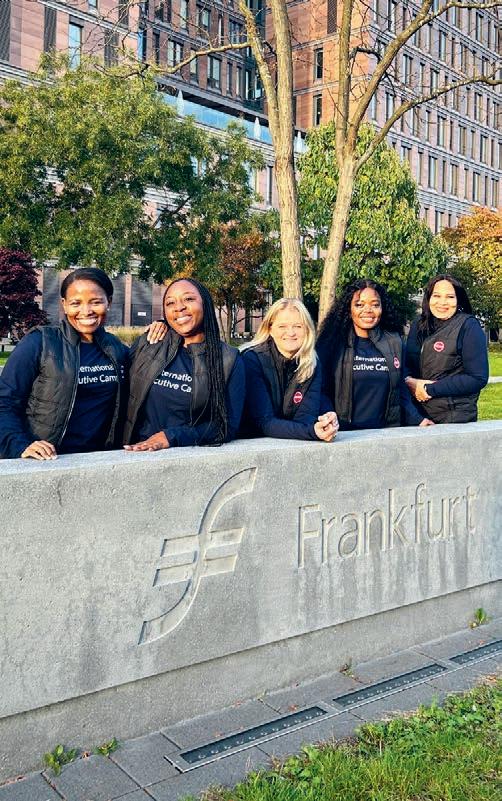
entrepreneurs, Absa Emerging Entrepreneur is focused on primacy and solutions that enable exible payments. For women-owned businesses, Absa She Thrives offers ease of access to funding while protecting the legacy of the woman entrepreneur.
“Since rst launching the solution two years ago, we have assisted numerous women and youth entrepreneurs,” says Sanah Gumede, managing executive for
“FROM OUR ONGOING DISCUSSIONS WITH BUSINESS OWNERS, WE IDENTIFIED A NEED FOR SKILLS DEVELOPMENT TRAINING ON BUSINESS
strategy and client value management at Absa Business Banking. “As the Bank of the Entrepreneur, we recognise that each business is different, and we are designing our solutions with the aspirations and pain points of these business owners in mind.”
As part of its active commitment to support women entrepreneurs, Absa, in collaboration with the African Development Bank and the Frankfurt School of Finance and Management, also launched a capacity-building training programme speci cally designed to help level the playing eld for women in business.
“From our ongoing discussions with business owners, we identi ed a need for skills development training on business strategy and nancial management aimed at helping them scale their businesses and access funding.”
Through a series of webinars, a specialised SME Business School and the Women Leadership Academy, entrepreneurs had the opportunity to network and engage with industry leaders. The Funding Readiness Webinar Series, aimed at providing knowledge on getting a business funding-ready, is still available online. The series includes actionable insights, practical strategies and real-world examples to help women navigate the complexities of preparing to apply for business funding and guide them in making informed nancial decisions.
For the second year running, Absa partnered with Visa to roll out a global advocacy programme, She’s Next. The programme is aimed at removing some of the obstacles faced by women entrepreneurs. It is dedicated to fostering an inclusive and equitable environment for women-led businesses through access to grant funding, tailored training, mentorship and networking opportunities.
Underscoring the impactful nature of these SME solutions, Absa Business Banking has received various international accolades, including the Euromoney Best SME Bank South Africa 2024 and 2025, the Most Innovative SME Bank South Africa at the 2025 International Finance Awards, Africa’s Best Digital Bank for SMEs 2025 by Euromoney and the Best New SME Product of the Year at the 2025 Global SME Banking Innovation Awards 2025, awarded by Digital Banker.


Absa has been a steadfast champion of women in sport, supporting athletes and communities through sponsorships and initiatives that promote equity and inclusion, writes SANAH GUMEDE, managing executive for strategy and customer value management at Absa Business Banking.
From the running track to the golf course and even across the most challenging mountain biking trails, Absa is committed to being a force for good, ensuring women are given equal opportunities both on and off the eld.
At the forefront of this commitment is Absa’s sponsorship of the Sunshine Ladies Tour, a partnership that elevates women’s golf and creates meaningful opportunities for female golfers to compete professionally. The Absa Ladies Invitational has attracted some of the best local and international talent and offers a prize fund that continues to grow.
Women’s golf has historically faced limited investment and fewer opportunities. Through Absa’s sponsorship of the Sunshine Ladies Tour, it is helping to change that narrative by creating a more level playing eld while inspiring the next generation of female golfers.
In addition to the competition, Absa also runs a youth development programme aimed at empowering young female golfers from previously disadvantaged backgrounds. This initiative aligns with the bank’s broader efforts to support grassroots development and ensure a sustainable pipeline of female talent – a key component of its Women Manifesto and broader gender equity strategy.
Furthermore, Absa has helped ensure women have a dedicated and celebrated platform in the world’s most challenging mountain biking event, the Absa Cape Epic. In 2019, the bank launched the #SheUntamed movement to improve women’s access to the sport. Since its
WHETHER ON THE RUNNING TRACK, ON THE GOLF COURSE OR IN CYCLING, ABSA IS COMMITTED TO BACKING WOMEN WITH THE RESOURCES AND THE RECOGNITION THEY DESERVE.
inception, women’s participation in cycling has grown from 36 riders in 2019 to 176 in 2024.
This year marks a renewed three-year partnership with the IRONMAN Group, giving selected #SheUntamed riders an opportunity to travel to unforgettable, inspiring destinations that test endurance on some of the world’s most demanding trails.
Women’s sport has, for too long, been held back by a lack of investment and opportunity. Through Absa’s partnerships and development initiatives, it is creating platforms for women to showcase their talent, breaking down barriers that have excluded them and inspiring future generations of athletes. Whether on the running track, on the golf course or in cycling, Absa is committed to backing women with the resources and the recognition they deserve. Beyond elite competition, Absa is equally focused on grassroots development. The bank continues to support the distribution of bicycles to pupils, facilitating learner mobility, reducing
the time spent getting to school and increasing productivity, engagement and academic performance. Earlier this year, the bank distributed 100 bicycles at the Axios Skills School. Of these, 50 were handed over to girl bene ciaries, highlighting Absa’s commitment to empowering girls.
By giving girls access to mobility, education and sport, Absa is contributing to long-term change, creating economic opportunities and contributing in a sustainable way. The bank believes that women belong in every arena, and with the right support, they will continue to inspire, achieve and rede ne what is possible.
In addition, Absa celebrated Women’s Month through its support of the Totalsports Women’s Races in Durban, Cape Town and Johannesburg, culminating in the Run Your City Tshwane nale. These events drew thousands of participants nationwide, celebrating women’s resilience, strength and solidarity while reinforcing the bank’s commitment to inclusion.
The collective impact of these initiatives is a growing movement that positions Absa as more than just a sponsor. The bank has become a true partner in progress, using sport as a platform to advance gender equity and inclusion. Each initiative, whether a road race, a golf tournament or a youth development programme, contributes to a broader vision of a society where women’s achievements are recognised, celebrated and ampli ed.

Celebrating Africa’s gender champions – the Gender Mainstreaming Awards spotlight corporates and leaders embedding inclusion and driving progress.
By COLLEEN LARSEN, CE of Business Engage and founder of the Gender Mainstreaming Awards
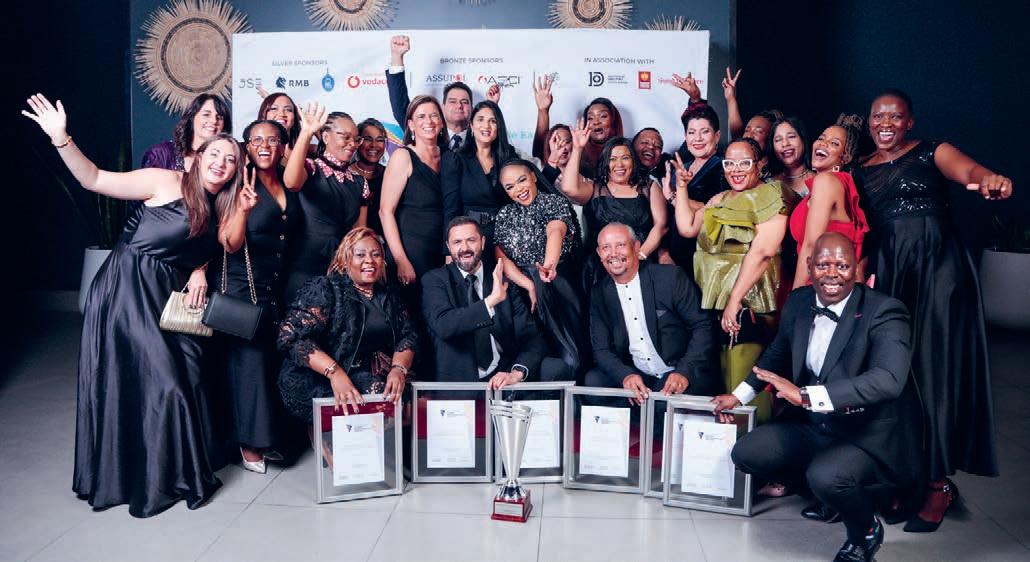
When we launched the Gender Mainstreaming Awards (GMAs) in 2013, it wasn’t only about getting women into the mainstream of business – although that remains a critical goal. It came from a sense of disbelief at the prevailing narrative. Whenever gender success stories were highlighted, the spotlight fell on the United States, the United Kingdom, or elsewhere in the world. Rarely, if ever, did people point to Africa. The assumption seemed to be that nothing meaningful was happening here.
We knew this wasn’t true. Across the continent, extraordinary work was being done. However, those efforts weren’t being harnessed, ampli ed or celebrated. Many initiatives operated in silos, so when viewed individually, they looked small. However, when placed side by side, they reveal a striking truth: Africa is not short on success; it is rich with it.
The GMAs were created to shift that lens. They were designed to recognise, celebrate and accelerate the work already underway. By shining a spotlight on organisations and individuals actively embedding gender into
business practice, the GMAs sought to tell a different story – an African story of innovation, courage and progress. More than a decade later, they have grown into one of the largest and most respected platforms of their kind, with a reach that extends far beyond awards night celebrations.
From the very beginning, the awards were never about token recognition. They were about changing perceptions and shifting mindsets. Too often, conversations about gender in business had been reduced to compliance, targets or symbolic gestures. The GMAs reframed the issue, positioning gender mainstreaming not as charity or corporate goodwill, but as a strategic business imperative.
The awards quickly became both a benchmark and a motivator. For corporates, applying meant more than writing a submission – it meant measuring themselves against peers, re ecting on their progress and identifying gaps. For individuals, being recognised validated the impact of their leadership and created role models for others to follow. For the
continent, the GMAs became a megaphone for telling stories of progress that the rest of the world had too often ignored.
What started in South Africa soon became a continental movement.
2013–2018: The early years built credibility, with South African corporates stepping forward to showcase initiatives that demonstrated measurable progress. The GMAs began to set the standard for what real gender mainstreaming looked like in practice.
2019–2021: The shift to virtual and hybrid formats in the wake of global disruptions allowed the GMAs to reach new audiences. In 2020, over 2 200 participants engaged with the awards. By 2021, that number had soared to 8 000 virtual attendees, proving the hunger for this conversation across Africa.
2022–2024: The footprint expanded into East and West Africa. Online streaming from these regions widened access, while in-person events brought together diverse voices: Johannesburg drew 650 attendees, Nairobi gathered 300, Lagos hosted 100, and Accra and other cities began to add their own momentum.
This growth re ects more than numbers. It signals a shift: Africa is recognising that its gender mainstreaming story is not only valid, but also inspiring.
The GMAs were designed to capture the breadth of gender mainstreaming, with categories spanning both corporate and individual achievements.
Corporate categories include initiatives in areas such as economic empowerment of women, skills development, women on boards and gender reporting. These highlight companies embedding gender mainstreaming into structures and strategy.
Individual categories celebrate leaders –Positive Role Models, Inclusive Leaders and RMB Africa’s Fearless Thinkers – who embody the change they want to see.
Together, the categories show that transformation is not just about systems or individuals, but also about both working hand in hand.
One of the most powerful ways the GMAs have extended their reach has been through the monthly In uence to Impact corporate spotlight sessions. These sessions give corporates the opportunity to showcase best practices, share the initiatives that earned them recognition, and learn from one another across industries and borders.
They ensure the awards are not just about a single night of recognition, but also about an ongoing exchange of knowledge and inspiration. By spotlighting both nalists and winners, the In uence to Impact series allows good practice to ripple outward, giving companies new ideas to embed in their own strategies.
At the same time, the sessions feature individuals – those recognised as Positive Role Models, Inclusive Leaders or RMB Africa’s Fearless Thinkers – who share their personal journeys. These stories are often about the boldest decisions they ever made, the moments when they chose courage over comfort, and the choices that de ned their leadership. In doing so, they provide not only inspiration, but also practical lessons for others walking the same path.
Together, the GMAs and In uence to Impact create a full-circle ecosystem: recognition, storytelling, peer learning and collective growth.
One of the most important impacts of the GMAs has been how they amplify collective success.
For corporates, the awards provide recognition that strengthens internal momentum. Leaders can point to the GMAs as evidence that their strategies are working,
which, in turn, motivates teams and secures board-level support. For industries, the awards spark peer learning, with companies adopting and adapting one another’s best practices. For Africa as a whole, the GMAs weave together a narrative of progress that challenges outdated global perceptions.
We have seen organisations transform recruitment processes, restructure boards and implement innovative mentorship programmes. We have seen individuals rise as role models – proving that leadership can look different and that inclusivity is a driver of growth.
Most importantly, we have seen con dence grow: con dence among leaders who realise their contributions are recognised, and con dence among companies that Africa’s story is worth telling on the global stage.
At the heart of the GMAs and the In uence to Impact sessions are the stories. They are stories of businesses that rethought how they measure value, of executives who championed women into senior roles, and of young leaders who challenged entrenched norms. They are stories of resilience, innovation and courage.
These stories prove that gender mainstreaming in Africa is not abstract; it is tangible. They remind us that gender mainstreaming is not just about statistics, but also human potential. And, they show the world that Africa is not lagging; in many ways, it is leading.
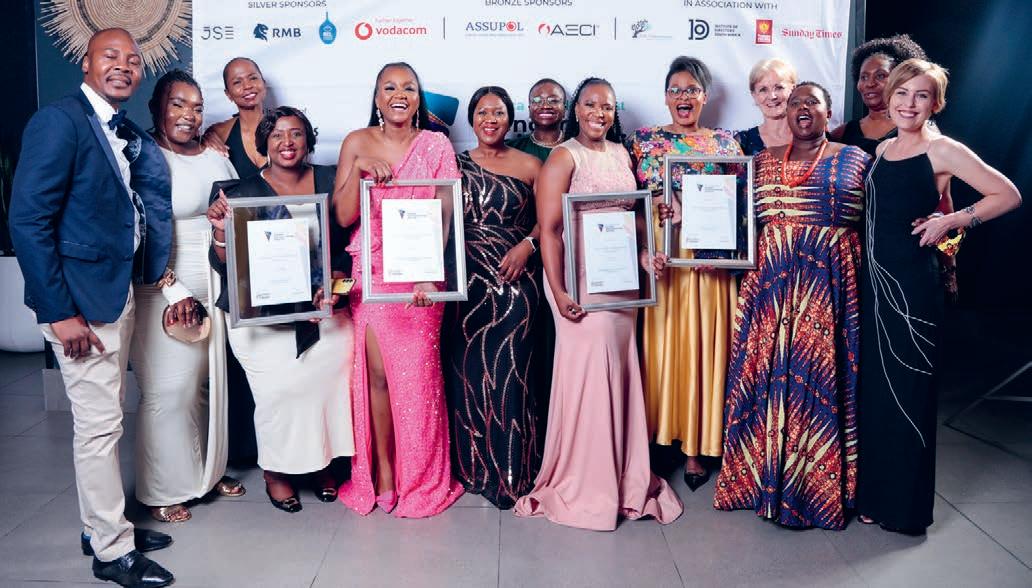
Perhaps the greatest achievement of the GMAs has been their role in reframing Africa’s global reputation. For too long, Africa was overlooked in conversations about gender mainstreaming. The GMAs and their companion spotlight sessions have turned that narrative on its head.
By collecting and showcasing initiatives from across the continent, the awards demonstrate that Africa is not waiting to be told what to do. We are innovating, experimenting and delivering results in our own way. The richness of success here is undeniable – when our stories are harnessed collectively, they stand as a benchmark for the world.
As the GMAs move into their second decade, the vision remains ambitious. The work is far from done, and the awards continue to evolve to meet the needs of corporates, leaders and communities.
The focus for the future includes:
• Deepening impact by encouraging companies not only to participate, but also embed practices that ensure long-term sustainability.
• Expanding reach across Africa so more regions, industries and voices are represented.
• Strengthening collaboration to reduce silos and highlight the collective richness of Africa’s progress.
• Elevating Africa globally by exporting stories of success, not only to inspire our continent, but also to shape global benchmarks for inclusion.
The Gender Mainstreaming Awards were born from a sense of disbelief that Africa’s successes were being overlooked. Over a decade later, they have proven what we knew all along: that Africa is rich in success when it comes to gender mainstreaming.
The GMAs are more than an awards evening. Together with the In uence to Impact series, they are a platform, a movement and a mirror –re ecting the progress being made, challenging companies to go further and amplifying the collective story of a continent that refuses to be underestimated.
By bringing these stories together – of corporates embedding change and individuals making bold decisions – the GMAs ensure Africa is no longer absent from the global conversation on gender mainstreaming. Instead, Africa stands where it belongs: at the centre of it. Follow: GMAs www.genderawards.com
COLLEEN LARSEN, CE of Business Engage and founder of the Gender Mainstreaming Awards, celebrates corporates embedding gender equity into culture, leadership and strategy across Southern Africa
The Gender Mainstreaming Awards (GMAs) have, over the years, become a mirror of the progress corporates are making throughout Southern Africa and beyond. They are not simply accolades; they are markers of transformation, recognising organisations that choose to weave gender equity into the fabric of their culture, strategy and leadership development. Among those recognised in previous years, four corporates stand out as enduring champions: Kearney, RMB, Tiger Brands and AECI.
For Kearney, global management consulting is not only about numbers and strategy; it is about building inclusive cultures where every perspective counts. The firm’s recognition at the Gender Mainstreaming Awards highlighted its consistent efforts to place diversity, inclusion and belonging at the heart of its operations.
Theo Sibiya, managing partner for Africa, summed it up powerfully: “Gender mainstreaming is not a ‘nice-to-have’ for us; it is a necessity. We can only deliver the best solutions to our clients when our teams reflect the world around them.”
What made Kearney’s recognition distinctive was the firm’s ability to view inclusion holistically. Kearney’s initiatives consciously recognised the intersectionality between gender and disability inclusion – ensuring their talent and leadership pipeline opens doors to a broader diversity of voices. This not only created opportunities internally, but also positioned Kearney to advise clients with credibility and authenticity on how to drive inclusive transformation in their own organisations.
Kearney’s work shows that consulting firms – often viewed as drivers of strategy at boardroom level – can also serve as role models for industries they advise. Kearney’s recognition at the GMAs validated that mainstreaming gender is both a business advantage and a leadership imperative.

At Tiger Brands, inclusivity is not a peripheral policy, but an integral part of the business strategy and a core organisational value. “Embracing diversity and inclusivity” is woven into how the company operates across multiple regions and markets.
When Tiger Brands was recognised at the Gender Mainstreaming Awards in previous years, it was not for isolated initiatives, but for a system-wide and strategic approach to gender mainstreaming.
Importantly, Tiger Brand’s recognition reflected a corporate culture shift. Gender mainstreaming was positioned as a driver of performance, innovation and long-term sustainability, not just as a compliance obligation. Its awards became markers of progress –proof that the company is intentionally building an inclusive workplace where leadership reflects the diversity of its people and the markets it serves, intentionally creating an inspiring environment where diversity is a source of competitive advantage and where all Tigers can thrive.
For a fast-moving consumer goods company with vast reach into households across South Africa and beyond, Tiger Brands’ recognition sent a powerful signal. It demonstrated that advancing women is not just about internal metrics, but also about shaping the future of business and society.

AECI’s recognition as the Gender Mainstreaming Champion for Southern Africa was a milestone both for the company and for the sector. At its heart, the award validated AECI’s tangible work in empowering women – not only within the company, but also across the communities it touches.
The award citation reflected the company’s social responsibility programmes, which actively uplift and empower women. These ranged from educational initiatives to enterprise development support, demonstrating a practical commitment to creating opportunity. For AECI, gender mainstreaming has always extended beyond the office walls – and it is about making a sustainable difference in the regions where it operates.
AECI’s recognition at the GMAs served as visible evidence of progress. It confirmed that gender mainstreaming is not an abstract aspiration, but something that can be measured in programmes, partnerships and the empowerment of women at every level. By investing in both corporate leadership pathways and community upliftment, AECI embodies what it means to be a gender mainstreaming champion.

“GENDER MAINSTREAMING IS NOT A ‘NICE-TO-HAVE’ FOR US; IT IS A NECESSITY. WE CAN ONLY DELIVER THE BEST SOLUTIONS TO OUR CLIENTS WHEN OUR TEAMS REFLECT THE WORLD AROUND THEM.” – THEO SIBIYA
Each of these corporate spotlights reflects a different pathway, but the collective message is clear: gender mainstreaming is a business imperative. Whether through consulting, banking, manufacturing or consumer goods, these companies demonstrate that transformation is possible when leadership commits with intention and consistency.
Their recognition at the Gender Mainstreaming Awards shows what can happen when organisations move beyond rhetoric and
“AT RMB, WE WANT TO CREATE A WORKPLACE WHERE EVERYONE, IRRESPECTIVE OF GENDER, CAN THRIVE AND ACHIEVE SUCCESS IN THEIR CAREERS.”– EMRIE BROWN
Rand Merchant Bank (RMB) has been a long-standing partner of the Gender Mainstreaming Awards –supporting an initiative that recognises gender equality as both a strategic business priority and a societal necessity.
At RMB, this commitment is brought to life through the gender equity employee resource group launched in 2015. The group focuses on building a workplace where women are empowered to succeed, pursue leadership opportunities and shape the future of fi nancial services. Importantly, it is designed not as a women-only initiative, but as a platform that encourages collaboration between men and women refl ecting the belief that true progress comes from harnessing the strengths of all.
This belief also underpins RMB’s sponsorship of the Africa’s Fearless Thinker Award. The sculpture “Africa’s Fearless Thinker” that stands in the company’s Merchant Place offi ce is a powerful symbol of courage, resilience, optimism, and tenacity. It captures the leadership qualities RMB values and seeks to champion across the continent. By sponsoring this award, RMB recognises and celebrates individuals who embody these traits and inspire others to think boldly about Africa’s future.
RMB’s role as sponsor is therefore deliberate and active. It represents more than association; it is a conscious alignment of the company’s corporate values with its support for Africa’s future leaders.



build systems, programmes and cultures that sustain equity. For Kearney, it is about intersectional consulting credibility. For RMB, it is about courage and creativity shaping culture. For Tiger Brands, it is about embedding inclusivity into core values. And, for AECI, it is about linking business success to community empowerment. Together, they set a benchmark for the continent – proving that mainstreaming gender is not only the right thing to do, but the smart thing to do.
This year, we celebrate 20 years of Business Engage – two decades of persistence, partnership and purpose. What began in 2005 as a seed of an idea has grown into a recognised movement shaping how gender is embedded into business strategy across Africa.
From the start, Business Engage was never about creating another network or membership group. It was about nding new ways to do business – ways that brought women into the mainstream of economic life, challenged outdated systems and equipped leaders to act with courage. It was about building not just programmes, but also platforms where inclusion became a business imperative.
Business Engage was built through conviction during seasons of uncertainty. We chose to keep going when resources were limited and when the vision was not yet widely understood. What carried us forward was clarity of purpose, the belief that business could be different and the knowledge that if we stayed the course, others would eventually see what we were building.
That belief proved true. Over 20 years, Business Engage has grown from a small initiative into a trusted partner for corporates across Africa. Today, we collaborate with more than 100 companies, working together to ensure gender mainstreaming is not left at the margins, but becomes central to strategy, culture and leadership.
Among the milestones that shaped our journey was the launch of the Gender Mainstreaming Awards in 2013. These awards were never about showcasing token efforts; they were about
LARSEN captures two decades of Business Engage’s journey – unseen collaborations, regional growth and actions that embed gender equity into Africa’s business core and leadership culture
recognising companies and individuals who were embedding inclusion into business practices. Over the years, they have grown into one of the largest platforms of their kind on the continent, drawing thousands of participants both in person and virtually.
Alongside the awards, we created innovative peer-learning spaces such as BoardWalks, LeadersWalks and Hot Tables. These formats were designed to move beyond traditional panels and into conversations that matter – where leaders could exchange practical insights, challenge assumptions and walk away with tools they could use. Each initiative re ected our belief that change is not achieved through events alone, but through consistent, intentional dialogue.





Colleen Larsen








A de ning feature of the past 20 years has been the expansion of Business Engage’s work across the continent. From South Africa to Kenya, Ghana, Nigeria, Mauritius, Tanzania, Zambia, Uganda, Botswana, Zimbabwe and beyond, we have seen how local context shapes the way inclusion takes root. Each country has its own nuances, champions and stories of progress. What remains constant is the conviction that Africa can lead the



way in rede ning how gender equity is done –not by copying external models, but by creating our own.
At the heart of Business Engage’s success has been collaboration. None of this could have been achieved in isolation. Corporates, leaders, allies and individuals have walked the journey with us – sometimes quietly, sometimes boldly – but always with a shared belief that inclusion is smart business.
Together, we have seen how collaboration magni es impact. When one company takes a step, it is meaningful. When dozens align around a common purpose, it becomes transformational. That collective effort has been one of the most powerful legacies of the past two decades.
Celebrating 20 years is not just about re ecting on what has been achieved; it is about recognising that the work is far from nished. Business Engage has never stood still, and we will not begin now. The next chapter will be about deepening impact –strengthening partnerships, equipping leaders with practical tools and continuing to innovate so inclusion remains woven into the fabric of business.
Our vision remains ambitious: to see Africa recognised globally as a hub of gender success stories, exporting models and practices that demonstrate what is possible when talent is fully unlocked.
As we look to the next 20 years, we carry the same spirit that sustained us in the beginning: belief. Belief that inclusion is not optional, it’s essential. Belief that when business harnesses 100 per cent of available talent, it ourishes. And, the belief that, together, we can keep shaping legacies that matter – not just for today, but also for generations to come.
Follow: Business Engage www.businessengage.africa
Blue Label Media (BLM), a premier outdoor media solutions company in South Africa, helps brands reach their full potential through innovative and effective Out-of-Home (OOH) and digital campaigns. A division of the multibillion rand, JSE-listed Blue Label Telecoms, we pride ourselves on pushing boundaries and reaching markets that others can’t. With 14 years of experience and a diverse product mix, we create campaigns that don’t just advertise, but also make brands unforgettable. We celebrate the powerful women driving BLM’s vision.
Adeline van Rensburg stands out as a beacon of strength and excellence in the media nance sector. She brings a wealth of experience and an infectious passion that drives both her team and the company’s growth.

Honouring the women at BLUE LABEL MEDIA who drive the company’s vision forward every day.
A chartered accountant by training, van Rensburg previously served as group nance manager at e.tv for four years. Her career trajectory is marked by steady advancement fuelled by dedication, expertise and a genuine love for the dynamic media environment.
Since joining BLM, she has strengthened the company’s nancial operations by implementing robust processes and controls. Her leadership has grown the nance team from a modest size to a skilled group of ve professionals. Beyond her technical expertise, van Rensburg fosters a supportive and empowering workplace culture, particularly uplifting the female members of her team.
She says: “I truly love my job and the people I meet and work with. Every day brings new challenges and opportunities, and I’m proud to lead a team that is passionate and driven.”
Makhotso Chabaku ensures all campaigns are scheduled, delivered and executed accurately across multiple media platforms. Acting as the central link between sales, creative and nance teams, she ensures seamless campaign execution from start to nish.
With over 10 years of experience in the media industry, particularly in OOH advertising, Chabaku has demonstrated strong organisational skills and problem-solving expertise. She has been instrumental in creating systems and processes that were almost nonexistent before her arrival, leading to operational excellence and enhanced team performance.
Re ecting on her role, Chabaku says: “Being given the opportunity to lead the traf c team has made me feel empowered and driven me to take initiative and make decisions without constant oversight. I see myself as a ball of re with precision, helping maintain credibility, revenue ow and customer experience.”
From receptionist to sales manager, Audrey Blom’s journey in the OOH industry is one of bold moves and unstoppable growth. Starting in 2003 with no prior knowledge of OOH, she took every opportunity to learn, explore and contribute across departments, eventually becoming an expert in sales, marketing intelligence and public sector engagement.
Blom’s leadership style was shaped early, not just by her professional roles, but also through standing up for others, even as a union shop steward during challenging times. “If there’s one thing I cannot tolerate, it’s injustice,” she says. Her courage to speak up and stand alone has been both her strength and her calling card.
In her current role, Audrey’s priorities are clear as she drives performance, develops talent and builds lasting client relationships. Her vision is rooted in collaboration, data-driven strategy and unlocking her team’s potential. Guided by the belief that “in all things God works for the good”, Audrey embraces every challenge as part of a greater purpose.
As Women’s Month celebrates female leaders across industries, the stories of van Rensburg, Chabaku and Blom remind us that representation matters. Women in advertising are breaking barriers, driving innovation and inspiring others. Their contributions create not only operational and business success, but also a culture of mentorship, empowerment and inclusion.

More and more women are shaping change in spaces where their voices might not have been heard before.
RYLAND FISHER speaks to three women pioneers in mining, retail and financial services
Bertina Engelbrecht, CEO of the Clicks Group, says she almost shouted with joy when she heard about the recent appointment of Joelene Pierce as the CEO of KPMG in South Africa.
“Sometimes we underestimate representation and how important that is to people. The day after my appointment, I came into my of ce in the morning and the women in the building all congregated around. They sang a song about empowerment and how I represented all of them. I realised that, if I left the organisation on my retirement and it was as I had found it, I would have failed those women.”
Pierce says being appointed as the CEO of KPMG in South Africa “is a privilege, but also a signal to women in our profession that the glass ceiling can and must be shattered. I hope that my journey inspires the next generation of women to lead with courage, empathy and conviction. We still have work to do, and I’m excited for the path ahead”.
transformation and inclusion
Nolitha Fakude, chairman of Anglo American in South Africa, says the company has been – and continues to be – deliberate about creating a workplace where women are fully recognised for their meaningful contributions.
“Since joining the company, I have witnessed intentional
and sustained efforts to champion women empowerment, foster inclusion and promote diversity.”
She adds that leadership is not a static role, but a continuous evolution. “It is a journey of growth, learning and a relentless commitment to meaningful change. My starting point has always been to engage with an organisation’s existing culture, understanding that change cannot be imposed from the outside; it must be cultivated from within. By working within established structures, I’ve learned how to gently shift cultures toward greater inclusivity and responsiveness.”
One of the greatest challenges she faced, Engelbrecht says, was being heard.
“Particularly when I raised an idea that only gained traction when repeated by a male counterpart or con rmed at a much later stage with data.
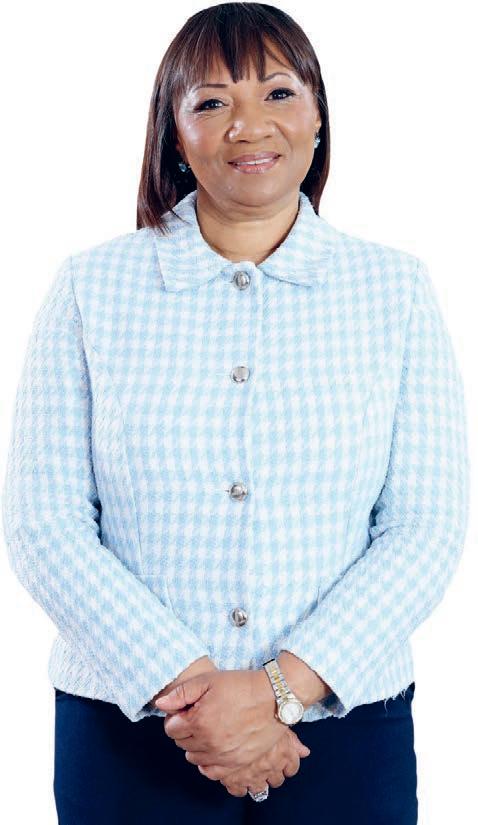
“This experience was not unique to me, but a reality for many women navigating corporate environments. At Clicks, while we had progressive policies in place, the real work lay in transforming mindsets and behaviours to make inclusion truly lived and felt. As CEO, one of my priorities is to foster a culture where every voice is valued and ampli ed, particularly those that have historically been marginalised.”
Pierce says that, over the years, KPMG
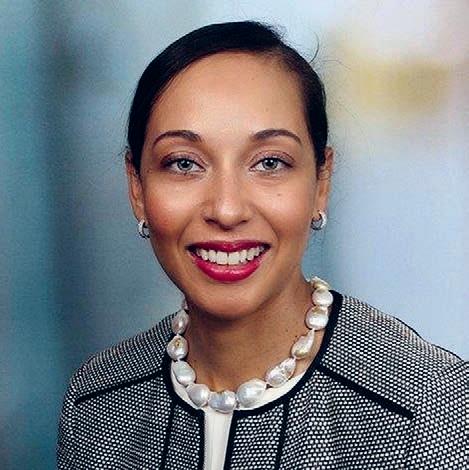
“I BELIEVE THAT WHEN PEOPLE FEEL SEEN AND SUPPORTED, THEY BRING THEIR BEST SELVES TO WORK.”
– JOELENE PIERCE
has made steady progress in advancing diversity and inclusion. “While the policies of the business were well-intentioned and supportive, the real cultural shift came from embedding those principles into everyday behaviours through meaningful mentorship, active sponsorship and ensuring women’s voices are consistently heard and included in strategic decision-making.”
Fakude says Anglo American identi ed the need to address bullying, harassment, gender-based violence and domestic violence – resulting in the development of the Living with Dignity Framework in 2019.
“Notwithstanding the great strides we have achieved as a company, we continue to explore ways and means to accelerate transformation in the mining industry. For me, this demands that we acutely pay attention to skills development and training as well as retention of talent that is already within the company.”
In her previous role at KPMG, as head of nancial services and as a member of the board, Pierce says she championed initiatives aimed at accelerating the pipeline of women leaders, “particularly through our Women in Leadership programme and deliberate sponsorship models”.
“In my new role, I will continue fostering a culture where women feel supported, valued and included. This means promoting inclusive
leadership practices and creating a workplace environment where everyone can feel a sense of belonging.”
Engelbrecht says that a commitment to diversity, equity and inclusion (DEI) is deeply embedded in the DNA of the Clicks Group.
“Long before I assumed the role of CEO, I was privileged to lead the DEI agenda as Group HR and corporate affairs director – ensuring transformation was not an isolated initiative, but a strategic business priority.
“Today, more than sixty-two per cent of our total employee base is female, and we’ve worked hard to ensure this representation extends into our leadership pipeline. At senior leadership level, forty per cent are women, and our board of directors is forty-four per cent (four out of nine) female, including a strong representation of black women.
“However, diversity is not only about gender –it’s also about race, age, ability and lived experience. We’ve built inclusive systems for talent development, performance management and succession planning to ensure appointments are not just representative, but also merit-based and future-focused.”
“As with most change initiatives, there was some initial resistance,” Fakude says. “It primarily came from individuals who were either deeply accustomed to existing processes or concerned about how the changes might impact their roles. This resistance wasn’t unexpected; it’s a natural part of the change curve.”
She says she worked alongside the CEOs of Anglo American business units – male and female – who took personal ownership of driving cultural transformation.
“Each of them actively championed the change within their respective operations, ensuring that the shift toward a more inclusive and respectful workplace is not only implemented, but also embedded in the way we lead and engage.”
Engelbrecht says resistance “is a natural part of any meaningful change”.
What is critical, she emphasises, is not to meet resistance with force, but with curiosity.
“I invest time in understanding the concerns, fears or assumptions that underpin that resistance. It’s about nding common ground and bringing people along the journey with empathy, dialogue and clarity of purpose.”
Pierce agrees with Engelbrecht that change naturally comes with resistance. It is “often subtle and rooted in unconscious bias or discomfort with disrupting the status quo”.
She rst tries to listen and understand where the discomfort lies, and then leads with empathy, clarity and unwavering consistency.
Fakude says that through the ongoing transformation work across Anglo American, the group has made meaningful progress in advancing gender representation.
“By the end of 2024, we exceeded our consolidated target of thirty-three per cent female representation within our management population, reaching thirty- ve per cent. This achievement re ects our commitment to building a more inclusive and equitable workplace.”
Clicks’ journey has been one of intentional cultural transformation – anchored in building a high-performance, values-driven organisation,” says Engelbrecht.
“Clicks has consistently delivered strong nancial results, even in challenging economic conditions. But beyond the numbers, our real success lies in how we’ve aligned our people, our culture and our strategy.”
Pierce says that KPMG has seen an increase in engagement, innovation and team collaboration as the company’s culture becomes more inclusive.
“I believe that when people feel seen and supported, they bring their best selves to work. Our ambition to be the most trusted and trustworthy professional services rm is at the heart of our culture and underpins everything we do.”
Fakude says she can share several key lessons based on her experience gained over the years.
“The rst lesson is about self-awareness. This begins with the ability to pause, re ect and listen to your inner voice.
“Secondly, values and principles will help you chart a path to a meaningful career rooted in integrity, humility and hard work. Lastly, there is the lesson of work-life balance. Taking on challenging positions and making sacri ces is essential for growth and selfdevelopment. But it’s equally important to remain grounded.”
Engelbrecht says it is important for young women to invest in their own growth –“through education, self-awareness and continuous learning.
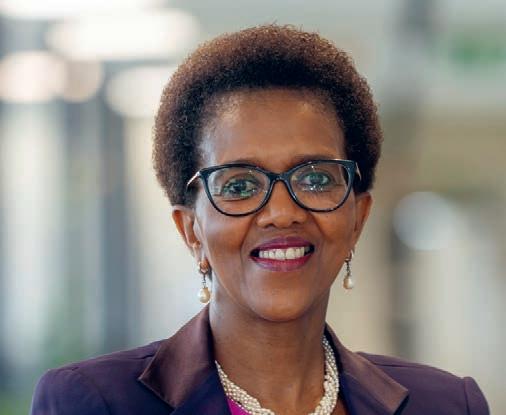
“BY WORKING WITHIN ESTABLISHED STRUCTURES, I’VE LEARNED HOW TO GENTLY SHIFT CULTURES TOWARD GREATER INCLUSIVITY AND RESPONSIVENESS.”
– NOLITHA FAKUDE
“Your quali cations will open doors, but your con dence and sense of purpose will determine how far you go. Secondly, surround yourself with mentors and allies who believe in your potential. Lastly, never shrink yourself to t into spaces –rather, transform them through your presence and your voice. Leadership is not about position; it’s about impact.”
The most valuable lesson Pierce has learned is that your voice matters – “even when it shakes”.
“Don’t wait to be ‘ready’ to take the next step. Sometimes growth comes from stepping into discomfort. Find mentors and sponsors who challenge you and hold you accountable to your goals. Remember, success isn’t just about what you achieve, but also how you lift others along the way.”
For Engelbrecht, DEI and transformation are not a project or a moment in time. “They are a sustained commitment to equity, justice and growth. We have a responsibility not just to deliver shareholder value, but also to build a society where everyone can ourish. That begins with inclusive leadership, courageous conversations and a deep respect for the dignity of every person in our organisation.”
Follow: Bertina Engelbrecht www.linkedin.com/in/bertina-engelbrecht-538084123
Joelene Pierce www.linkedin.com/in/joelene-pierce-3221211
Medical doctor, businesswoman and Wits University chancellor Dr Judy Dlamini realised there was a dearth of black professors at South African universities and decided to do something about it.
This led to the establishment of the Female Academic Leaders Fellowship NPC (FALF), which aims to develop a pipeline of black female academic leaders at universities across South Africa, starting at Wits. It is a public-private sector partnership that has begun to reap huge bene ts since its launch in March 2021.
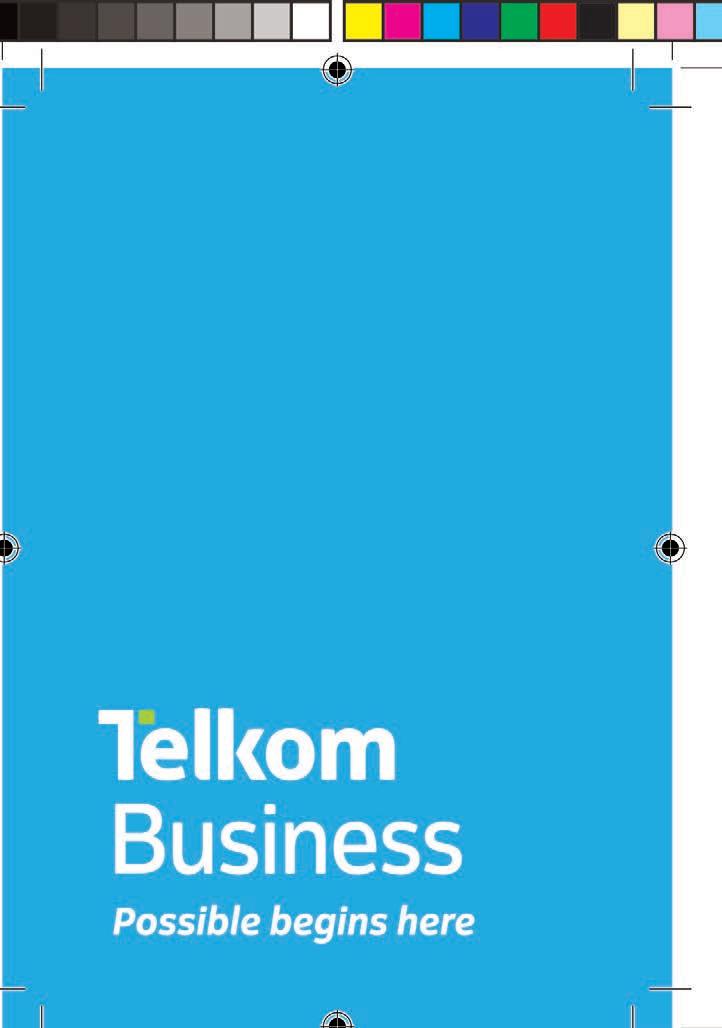
Women leaders are playing a critical role at the intersection of public and private sector collaboration, writes RYLAND FISHER
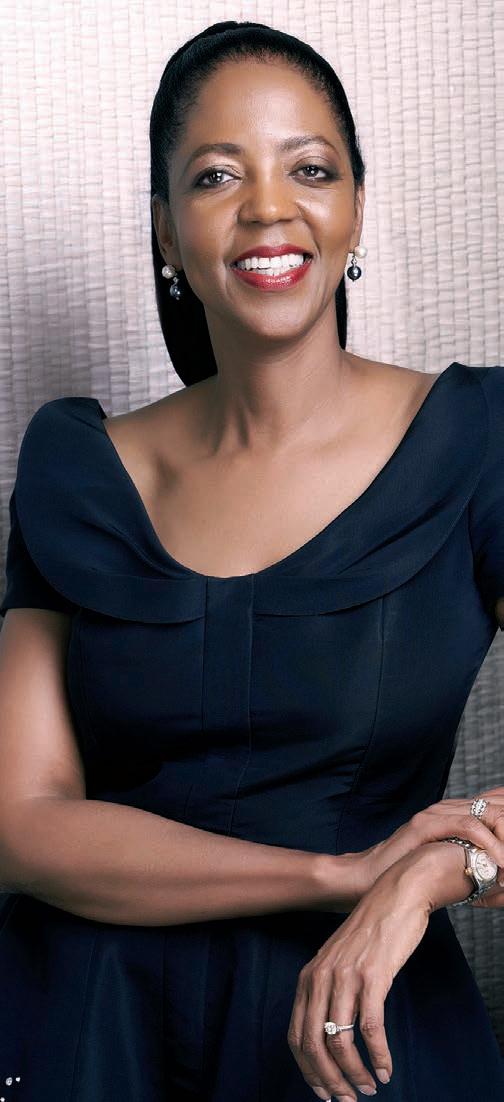
Dr Judy Dlamini
company’s lobbying capabilities with various industry and business bodies to in uence positive change for women and marginalised communities.
“As Group CEO of a business with almost seventeen thousand employees, sixty- ve per cent of them and fty per cent of our clients being women, what I care about is making a difference in the lives of those women every single day,” she says.
“Doing the right thing should not be a policy. It should be how we run our business and do our daily jobs. That is why including women is mainstream to how we run our business.
“As Momentum Group, we look beyond the BEE (black economic empowerment) scorecard to be an authentically transformed corporate. We believe in getting more young people into good jobs and in giving black- and women-owned businesses access to the market.”
“THE PRIVATE SECTOR HAS TO INVEST IN RESEARCH AND DEVELOPMENT IF WE WANT TO BE A KNOWLEDGE ECONOMY. WE ALSO NEED MORE ALIGNMENT BETWEEN THE SKILLS THE PRIVATE SECTOR REQUIRES AND WHAT WE PRODUCE AS UNIVERSITIES.”
– DR JUDY DLAMINI
“WE’VE WORKED WITH SECTOR-SPECIFIC STAKEHOLDERS IN EDUCATION, HEALTHCARE AND RETIREMENT FUNDS, GUIDING THEM ON HOW GOVERNANCE CAN ENABLE BETTER OUTCOMES –NOT JUST COMPLIANCE.” – PROFESSOR PARMI NATESAN
Professor Parmi Natesan, CEO of the Institute of Directors in South Africa (IoDSA), says the IoDSA “ rmly believes that governance structures must re ect the diversity of the society it serves”. She says they help organisations recruit board members who bring not only technical expertise, but also contextual awareness and lived experience.
Marais believes the strategic abilities of women are often underestimated. “I believe women bring a different perspective, often highlighting the importance of the human edge, empathy and deeper purpose,” she says.
“People make the mistake of thinking that empathy is soft, but there is a strategic edge to being empathetic. Empathy has allowed me to see strategic advantages. I’m not a ‘soft’ leader, but I have brought a deeper purpose to our organisation that revolves around building and protecting our clients’ nancial dreams.
“Care and accountability are not mutually exclusive. I keep people accountable, but I do it with care, because I care more about our purpose than our pro t.”
Dr Dlamini says women’s leadership is not appreciated as much as it should be. “Women are not a homogeneous group, but almost nine out of ten times, families are solid because the pillar is the woman. We are very attuned to context because we raise different children and know how to get the best behaviour out of each one,” she says.
“We ne-tune our leadership, based on what we’re dealing with, the context and the people that we’re working with. That is such a powerful characteristic that women bring to the party.”
Professor Natesan believes women bring a collaborative, empathetic and long-term orientation to leadership that is increasingly essential in a complex and interdependent world.

Entrepreneur and television presenter
Zanele Morrison believes women bring an understanding that everyone in society is important and no one should be left behind in the process.
“Women have the ability to include especially the least considered among us –that is a brilliant quality. I think we also bring about a level of inclusion in conversations. We bring about equity in conversations.”
The Momentum Group has actively participated in public policy debate and shared its knowledge with government “to help improve our industry and the lives of South Africans”, says Marais.
She adds that the group’s health business exists to provide more health for more people for less. The business has shared its knowledge and experience with government to support public health infrastructure, expand access and help build a more equitable and resilient healthcare system for all.
sure that we look after our employees when it comes to health, education, gender-based violence (GBV) and skills development. We’re a microcosm of society, and we also support society by supporting our employees.”
regulatory body, engages with government, regulators and industry associations to embed governance principles into national strategies, says Professor Natesan.



“We’ve worked with sector-speci c stakeholders in education, healthcare and retirement funds, guiding them on how governance can enable better outcomes –not just compliance.”
Morrison works in the nancial investment and the media space. She says they are working to create ease of access.
“We currently run a programme, Zimbali, where we work with people in the art space who have been hugely impacted not only by GBV, but also mental health challenges. This project helps people, especially women, to access wellness initiatives and education platforms. It also helps people nd new ways of navigating in this changing world.”
Professor Natesan says the IoDSA in uences policy through its work on the King Committee, where she serves alongside other role-players in the governance ecosystem.
“We in uence how governance is conceptualised and applied in both public and private sectors. King IV’s

and structural reform. “By promoting ethical leadership in industry bodies, we aim to transform the industry for better outcomes for clients and society as a whole,” Marais says.
“There are many issues that business leaders collectively discuss in response to the challenge to improve our country. These are enriched by having a female perspective in formulating the appropriate response, for example, care for families (NHI) and transformation in the workplace (Employment Equity Act). We continuously work on how we can make our industry work better for more people, while solving social, economic and environmental challenges in our South African context.”
Morrison says she has worked with investment companies to facilitate policy discussions with organisations such as the National Empowerment Fund and National Treasury.
“We are a part of the conversations that enlighten us on where policies are going, and what policies are trying to achieve.”
Dr Dlamini says Wits University is grateful for the private sector’s support because, without the private sector and philanthropic organisations, Wits would not be able to do what it needs to do.
“I BELIEVE WOMEN BRING A DIFFERENT PERSPECTIVE, OFTEN HIGHLIGHTING THE IMPORTANCE OF THE HUMAN EDGE, EMPATHY AND DEEPER PURPOSE.”
– JEANETTE MARAIS
“The private sector has to invest in research and development if we want to be a knowledge economy. We also need more alignment between the skills the private sector requires and what we produce as universities.”
Marais says the Momentum Group is involved in several public-private partnerships. These include its empowerment nancing initiatives, funding water projects such as the Lesotho Highlands water scheme, funding renewable energy projects and providing health services to government.
“In South Africa’s dual healthcare system, a signi cant portion of the population depends on public health services and does not have access to private care. Public-private partnerships are essential to addressing this reality, combining the public sector’s reach with the private sector’s capabilities, innovation and resources,” she says.
Professor Natesan says the IoDSA has made a tangible impact on public-private partnerships through its input into governance guidelines for the appointment of board members state-owned companies in an attempt to improve
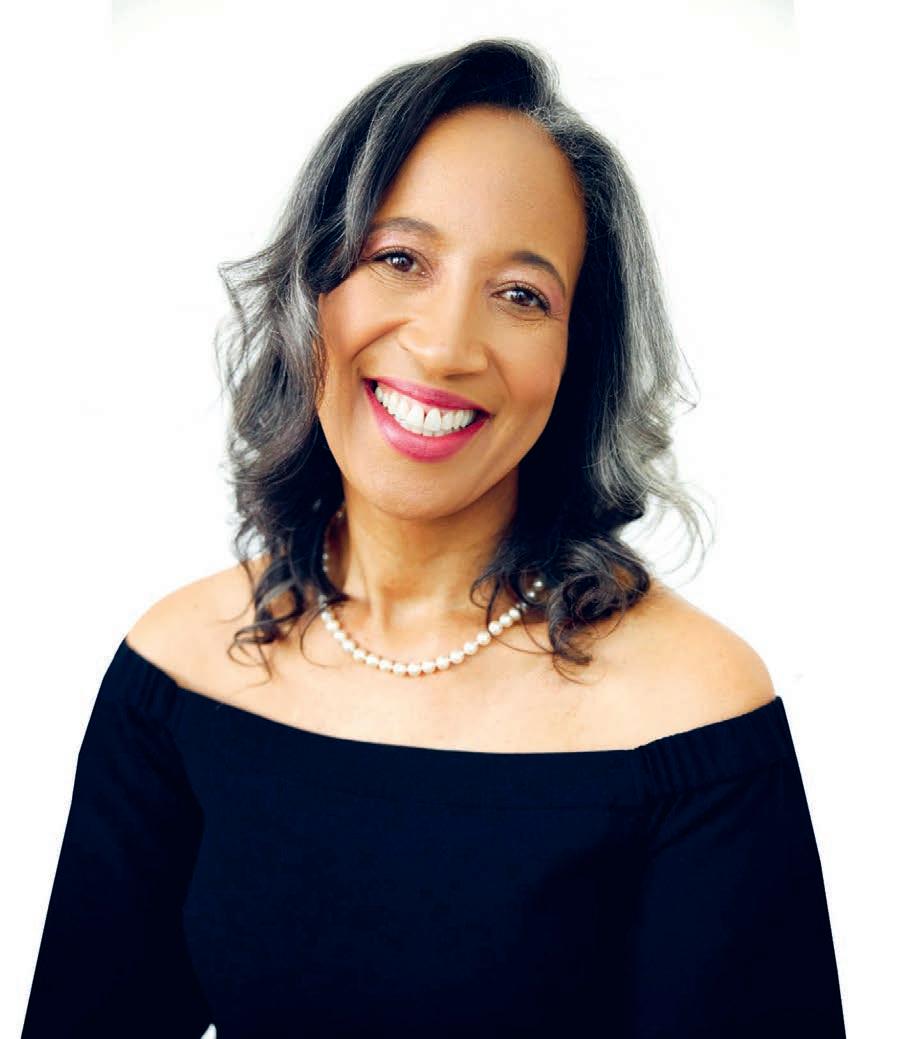
“We also regularly convene thought leadership events bringing together directors from both sectors to tackle shared issues. Governance creates a common language between public and private sector role-players, allowing for greater trust, mutual accountability and long-term bene ts.”
Morrison feels that, in South Africa, everyone needs to question the effectiveness of the policies of yesterday.
“We need to question and take accountability for where we are as a country today. We need to question what needs to be done to reduce the loss we see in public service and in public infrastructure and political instability.”
Professor Natesan says that gender-lens collaboration is “absolutely critical” for national development.
“Gender-lens collaboration ensures that policies, programmes and investments are designed not just for women, but with women. It helps identify blind spots that traditional policy-making often overlooks.
“At a governance level, this means involving more women in decision-making spaces where priorities are set and resources allocated. This is the only way to achieve the outcomes of equity, responsiveness, and the ethical culture King IV advocates.”
Marais says that while there is no gender equity yet, government and corporates need to apply a gender lens to the work they do.
“To right any wrong, any form of inequality, there must be some pressure and special focus; it won’t happen naturally.
“Critical Mass Theory suggests that having at least three women or members of a minority group on a corporate board or in a decision-making group can signi cantly change the dynamics and effectiveness of their participation.
“If you make the conscious choice that you want diversity of opinion in room, it means you want diverse people in the room. When you reach that critical mass tipping point of numbers, it starts happening naturally. Once it happens naturally, the forced structure should disappear.”
Having women’s views re ected in national development is not a nice-to-have, says Morrison. “Women are an essential and sustainable part of national development, because when you are a recipient of gender inequality, you end up wanting to solve that inequality.”
There are clear bene ts to public-private partnerships, Marais says. “We can see meaning in collaborating, and we still want to do it. We have shared objectives and agree on most of the principles of what we want to achieve for South Africa, but we don’t agree on the most practical and reasonable way to get there. We do share a destination and a willingness; what we are keen to gure out is aligning on the ‘how’.
“However, in my experience, there is a greater willingness from the private sector to collaborate with the public sector to build the economy and South Africa than I sometimes experience from government. So much more can be achieved when we work together.”
Dr Dlamini says she would love to see more collaboration between the private and public sectors. “We are doing everything to involve the private sector in our FALF project and the other work of the university. I will continue even after I stop being chancellor. As long as there is life in me, I’ll continue to drive the agenda that will make the world better because of what we did.”
There is a growing recognition that no one sector can drive national development alone, says Professor Natesan. “There’s increasing openness to collaborative models, shared value thinking and co-investment in
Follow: Jeanette Marais www.linkedin.com/in/jeanette-marais-bb045530
Zanele Morrison www.linkedin.com/in/zanele-morrison-11137235
Professor Parmi Natesan www.linkedin.com/in/parmi-natesan-064a2154
Dr Judy Dlamini www.linkedin.com/in/judy-dlamini-71b11912
“WOMEN ARE AN ESSENTIAL AND SUSTAINABLE PART OF NATIONAL DEVELOPMENT, BECAUSE WHEN YOU ARE A RECIPIENT OF GENDER INEQUALITY, YOU END UP WANTING TO SOLVE THAT INEQUALITY.”
– ZANELE MORRISON
long-term outcomes. However, we still face issues of mistrust, siloed agendas and misaligned timelines between public urgency and private sector cycles.
“We need more inclusive, transparent and outcomes-oriented partnerships that put people and planet at the centre

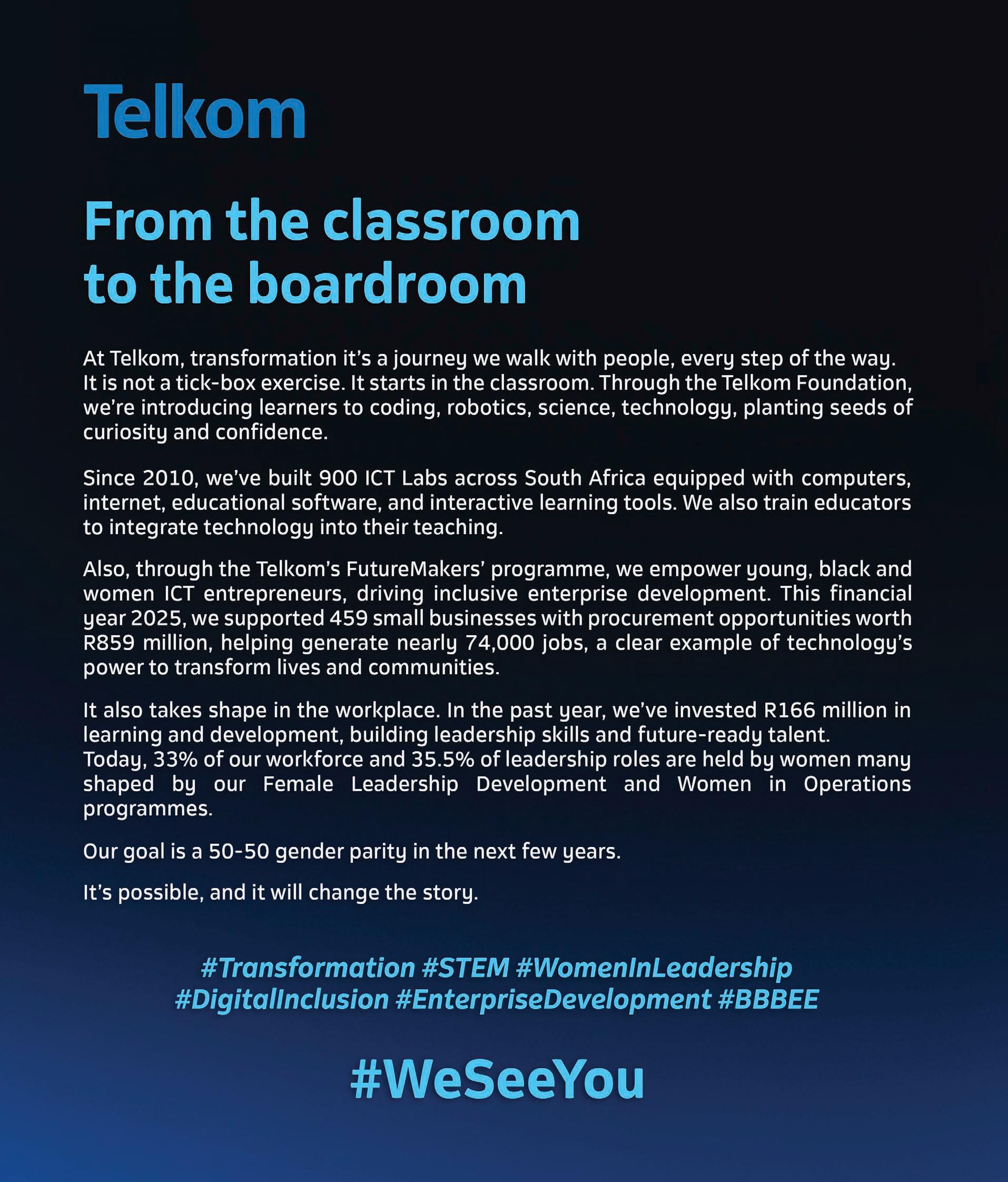

With these women in key leadership roles who understand the business’s values and vision, TELKOM is proving that focusing on diversity, equity and inclusion is the foundation for a successful operation
Telkom is committed to diversity and the equitable representation of genders, rmly believing this leads to meaningful engagement, widens the talent pool and provides the organisation with credibility and competitive advantage. Strong representative leadership that lives by Telkom’s values of collaboration, customercentricity, accountability, agility and simplicity furthers its goals and enhances its reputation in the industry.
Mpho McNamee, group chief of corporate affairs, leads corporate affairs with a clear sense of purpose shaped by deeply held personal values. She believes leadership is about more than delivering quarterly results; it’s about creating an environment where
“LEADERSHIP IS ABOUT MORE THAN DELIVERING QUARTERLY RESULTS; IT’S ABOUT CREATING AN ENVIRONMENT WHERE BUSINESS PERFORMANCE AND SOCIAL PROGRESS ARE ACHIEVED IN BALANCE.” – MPHO MCNAMEE
business performance and social progress are achieved in balance. For McNamee, corporate affairs is the space where business strategy, social responsibility and personal integrity meet. She knows that organisational success is measured not only by nancial results, but also by the ability to maintain a strong social licence to operate, cultivate trust with stakeholders and build a brand positioned for long-term resilience.
Achieving this requires a steady hand, knowing when to push for innovation, when to protect the organisation’s reputation and how to balance competing priorities without losing sight of the bigger picture. Leadership, for McNamee, is both a responsibility and a privilege. She sees her role as not only steering Telkom through complex business



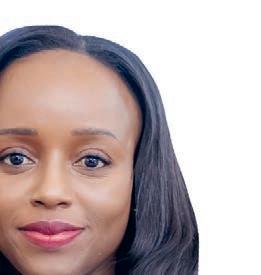




landscapes, but also nurturing the next generation of leaders. Her mentorship philosophy blends encouragement with accountability, helping others become grounded, con dent and values-driven, capable of making decisions that create both commercial value and social good.
Her leadership style is rooted in accountability and values-driven decision-making. She believes true leaders must balance commercial imperatives with social responsibility, ensuring that every decision contributes not only to business growth, but also to long-term societal progress.
For McNamee, leadership is not about authority, but about in uence and example. She emphasises integrity, collaboration and accountability as non-negotiables, ensuring her team feels empowered to take ownership and deliver with excellence.
Ultimately, McNamee sees leadership as a legacy-building responsibility, one that demands resilience, foresight and unwavering commitment to values. By aligning business success with social progress, she is helping shape a leadership culture that is sustainable, inclusive and future-focused.
Nonkululeko Dlamini, group chief financial officer, holds the view that great nance leadership starts at eye level – in meetings, on the oor with the team and in the dialogues where people and numbers meet. Dlamini is a leader with a surprisingly straightforward approach. For her, it’s about being present, asking insightful questions and being a mentor, more than a gatekeeper. That commitment to being present has gradually helped transform a siloed mindset into a collaborative culture where common objectives supersede departmental boundaries.
AI IS NOT A THREAT TO PEOPLE; IT IS A PARTNER. BY AUTOMATING ROUTINE TASKS, AI FREES OUR TEAMS TO FOCUS ON HIGHER-VALUE WORK.”
Dlamini views inclusive growth as a discipline rather than a catchphrase. It manifests in the way decisions are tested for reach and return and how budgets are created, using cross-functional workshops rather than email chains. She urges teams to look beyond the income statement to gauge success, considering supplier-development progress, smaller partners’ on-time payments, skills pipelines for in-demand roles, and long-lasting customer outcomes.
“Resilience is compounded when the company makes prudent and purposeful investments,” says Dlamini. Her nance team is renowned for its stringent commitments, controls and accuracy. Despite this, staff






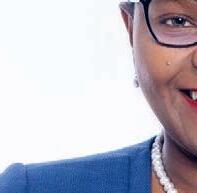




relationships are characterised by mutual respect and trust. In Dlamini’s world, “strict” does not imply closed doors. Rather, it refers to setting unambiguously high standards and anticipating all possibilities. This results in fewer escalations, quicker problem-solving and a common understanding of opportunity and risk.
“Arti cial intelligence (AI) is one of the most powerful forces reshaping our work. In nance, AI is already transforming forecasting, reporting and analysis. Yet it also brings understandable concerns about the future of work. As CFOs, we must set the tone: AI is not a threat to people; it is a partner. By automating routine tasks, AI frees our teams to focus on higher-value work such as strategic thinking, scenario planning and business partnering. Our role is to encourage teams to embrace this technology, to invest in the skills they need to thrive and to make clear that human judgement and creativity remain at the centre of nance,” she says.
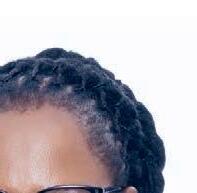
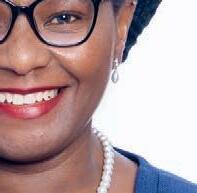
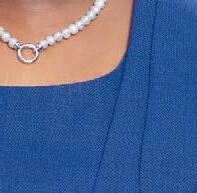



Dlamini leads as a team member. Open dashboards, “ask-me-anything” sessions and daily huddles help non nancial colleagues to understand nance. She supports mentoring groups for women at various stages of their careers, combining technical expertise with self-assurance and negotiating skills. She confronts the facts early, safeguards long-term investments in people and capability and unites teams around a practical course of action. When a dif cult quarter comes around, as they occasionally do, everyone is aligned with the approach to follow.
“Inclusive growth starts in the room that you lead. It’s in the small supplier invoice you pay on time, the intern you support, the openness you maintain when goals falter and the standards you uphold when it would be simpler to do otherwise,” she says.

By reimagining what it means to be a group CFO, Dlamini is demonstrating that opportunity and disciplined stewardship are not mutually exclusive. They can be combined to create long-term value.




Melody Lekota, group chief of human resources, is a passionate HR leader with a love for learning and a commitment to growing people and organisations. As group chief of HR at Telkom and a member of the group executive committee, she has led large-scale transformation with a steady hand, combining meticulous planning with an unshakable calm in the face of change. Her career spans senior HR roles across industries, including telecommunications, media and fast-moving consumer goods, giving her
“FOR ME, EVERY SUCCESSFUL TRANSFORMATION BEGINS WITH PEOPLE – NOT PROCESSES. “IF YOU BRING PEOPLE WITH YOU, THE CHANGE WILL TAKE ROOT.”
– MELODY LEKOTA
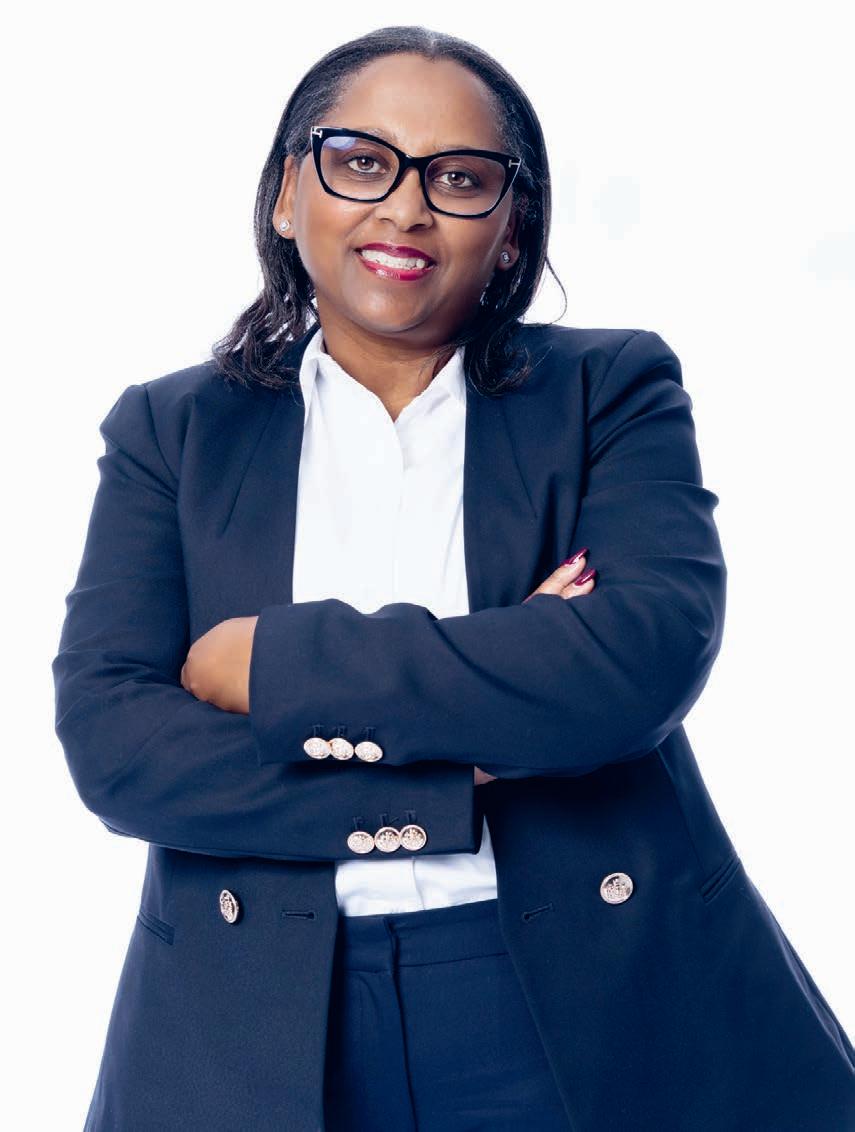
Melody Lekota
a deep understanding of how to align people strategies with business goals.
“For me, every successful transformation begins with people – not processes,” Lekota says. “If you bring people with you, the change will take root.”
When she joined Telkom in 2016, it was facing a perfect storm: nancial pressure, siloed operations and the urgent need to unite diverse business units behind a single vision. The easy option would have been to focus purely on cost-cutting and process optimisation. However, she knew that real, lasting change required a deeper shift –rebuilding trust, fostering collaboration and creating a culture where every employee could see themselves in the future it was trying to create.
Her philosophy is simple: resilience is built before the storm. This means embedding employee wellbeing into everyday work, encouraging cross-functional collaboration through initiatives, such as the Culture Reset Programme and OneTelkom Challenge Series, and inviting employees to co-create the de nition of inclusion in their own work context.
Lekota’s approach has always been grounded in two things: careful planning and calm under pressure. Transformation can be messy, but chaos is not inevitable. If you plan deliberately, anticipate resistance and create space for dialogue, change becomes less of a threat and more of an opportunity.
One of the most testing moments of her career came during the COVID-19 pandemic. In a matter of days, the organisation had to transition thousands of employees to remote work – something many thought impossible at the scale needed. It was a crisis, but it was also a moment of profound unity.
Teams innovated new ways of serving customers, managers learned to lead virtually, and employees supported one another through uncertainty. That experience reinforced her belief that resilience is built long before a crisis – in the culture, relationships and trust nurtured daily.
Inclusion has been her North Star throughout this journey. From setting ambitious women-in-leadership targets to engaging employees in de ning what inclusion means to them, Lekota has seen how diversity of thought fuels innovation and resilience. It’s not just the right thing to do; it’s the smartest strategy for a future- t workforce.
“Leadership, for me, is about creating a room where every voice matters and then making sure those voices shape the decisions we make,” says Lekota. “That’s how you build not just a thriving workforce, but a stronger, more united organisation ready for whatever comes next.”



Beauty Apleni, CEO: Openserve, was appointed to lead Openserve, the subsidiary of Telkom Group, in July 2025. Apleni’s career has been shaped by a deep commitment to learning, adaptability and collaboration. Originally from Gqeberha, she was raised in a family that valued education and hard work. Growing up, she was always curious about the potential of technology to change lives.















Apleni’s leadership journey is de ned by resilience, courage and a commitment to continuous learning. She believes education is not simply about quali cations, but also about building the mindset and skills required to lead with integrity in complex environments. Her academic journey gave her the technical grounding to understand business at a strategic level, but more importantly, it instilled in her the discipline and curiosity to keep learning and adapting. For Apleni, leadership is about more than authority; it is about guiding with compassion, making decisions that balance governance with humanity, and creating space for others to thrive. She sees education and mentorship as twin pillars of leadership, both of which empower her to navigate challenges while uplifting those around her. Her story demonstrates that when leaders embrace both courage and continuous learning, they not only strengthen their own capacity, but also build resilient organisations prepared for the future.
“My leadership style is built on being purpose-driven, collaborative and customer-centric, focusing on delivering value for all stakeholders. I attribute much of my career success to my ability to build high-performance teams, maintain strong partnerships and embrace challenges as opportunities for growth. I believe in leading by example, empowering others to succeed and nurturing talent by fostering an inclusive environment where everyone feels valued, heard, challenged and empowered to grow.”



The rise to the top has not been without challenges, and Apleni also experienced challenges along the way. She credits the importance of mentorship and the learning culture at Telkom that empowers employees with skills to navigate challenges at different levels of their career, from interns to junior managers and middle managers transitioning to leadership roles.
“I HAVE LEARNED THAT INVESTING IN PEOPLE’S GROWTH, NOT JUST THEIR IMMEDIATE SKILLS BUT BROADER POTENTIAL, LEADS TO LONG-TERM RETENTION AND SUCCESS.”– BEAUTY APLENI
“There are several leaders within Telkom who have been great mentors to me. Whenever I had challenges in my career journey, I would use them as a sounding board to help me navigate those challenges. This has also shaped my approach as a leader today. I focus on creating a workplace where people can thrive both professionally and personally. This includes offering mentorship opportunities and recognising achievements. I have learned that investing in people’s growth, not just their immediate skills but broader potential, leads to long-term retention and success. I aim to ‘lift as I rise’, ensuring others in my teams have opportunities to develop their careers.” By actively supporting and mentoring those around her, Apleni believes we can build stronger, more robust organisations.
“LEAD WITH COURAGE AND COMPASSION AND GOVERNANCE BECOMES DEEPLY EFFECTIVE AND DEEPLY HUMANE.”
– EPHY MOTHLAMME
As a woman leader in the telecoms industry, Apleni believes women bring a unique combination of empathy, resilience, compassion and collaborative thinking that is vital in today’s complex work environments. Their ability to foster inclusive cultures, listen actively and support diverse perspectives helps drive innovation. She believes women often excel in balancing strategic vision with operational detail, enabling them to lead with clarity. These qualities contribute to team cohesion and performance, enhancing organisational agility and long-term success.
For Ephy Mothlamme, group executive: group company secretary, integrity has always been the compass guiding her journey professionally and personally. So too has women’s resilience: the steady force that helps us rise, restart and keep building when the path is steep. As group company secretary, her role is to ensure the organisation operates transparently and ethically and to the highest standards of accountability. Beyond policy, integrity lives in daily choices, the courage to stand on principle and the discipline to lead with compassion and humility.
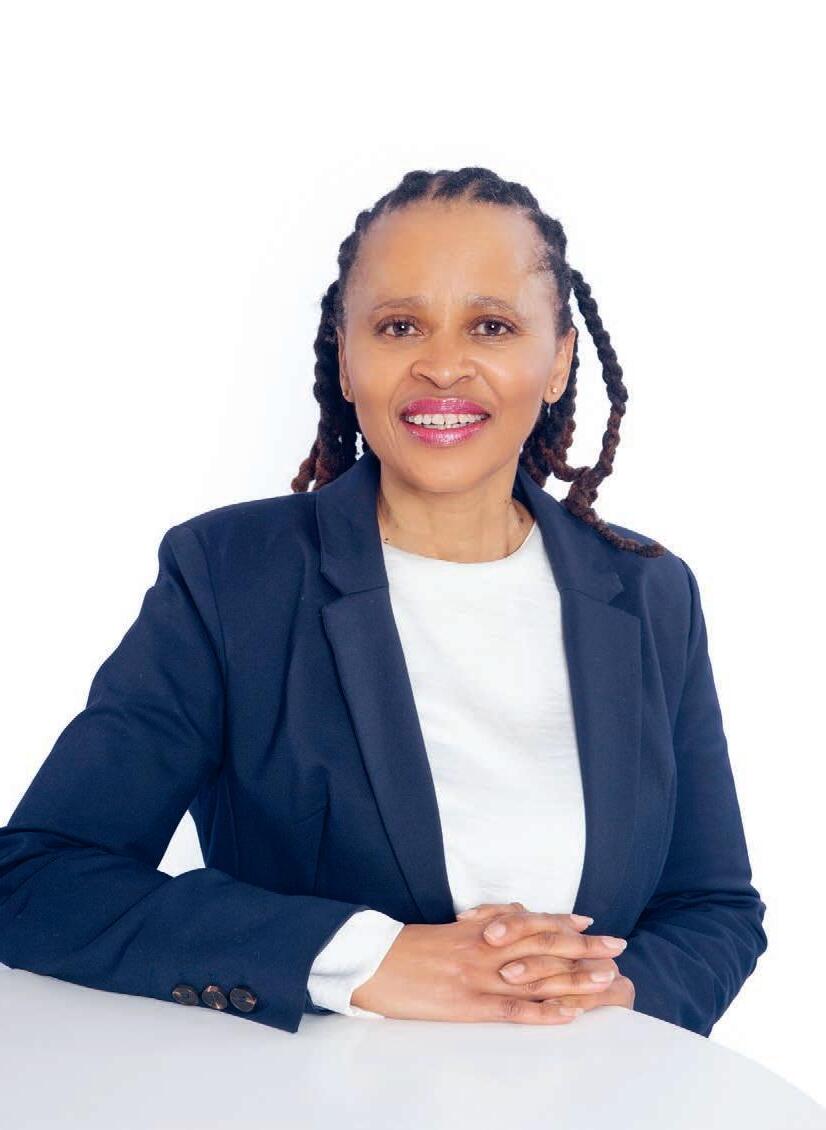
Motlhamme’s path into governance was shaped by challenge and opportunity. Courage often means making dif cult decisions, asking challenging questions and protecting reputation and stakeholder trust – even when it’s unpopular. What sustained her was resilience: balancing risk with responsibility, adapting without losing herself and nding forward motion when doors appear closed.
Leadership also requires compassion. Governance is not merely enforcing rules; it is understanding the human impact of every decision. By listening deeply, valuing diverse perspectives and guiding people through complexity, governance transforms into a culture of care and accountability. For many women, especially those building small businesses, compassion in governance looks like fair processes, timely payments and real access to opportunity.
Motlhamme has also been an entrepreneur. Building a small advisory venture taught her what no textbook could: pitching with purpose, meeting payroll, managing cash- ow uncertainty and delivering excellence with limited resources. It sharpened her sense of risk, discipline and service, and deepened her empathy for women who carry both professional ambition and family responsibility. These lessons convinced her that effective governance must enable growth, not just control it.
Those in secure corporate roles often underestimate the change they can unlock for women-owned small, medium and micro enterprises. Empowerment is deliberate action: inclusive procurement, accelerated payment terms, capability building and mentorship and transparent reporting that tracks spending and outcomes. When they open markets, pay on time and sponsor talent, resilience becomes opportunity.
Balancing roles as a mother, attorney, entrepreneur and governance professional has taught Motlhamme that resilience is a daily discipline – showing up at the boardroom table, in the business and at home, and still choosing integrity. Guarding integrity demands vigilance, courage and humanity. Lead with courage and compassion and governance becomes deeply effective and deeply humane, building trust, strengthening resilience and translating into real growth for women, families and the economy.

more information: https://group.telkom.co.za


Gender targets alone won’t fi x South Africa’s leadership gap. ITUMELENG MOGAKI discovers the real barriers lie in culture, access and systemic bias
Leadership today is shifting. In an era de ned by disruption, burnout and calls for inclusive growth, traditional command-and-control models are giving way to leadership that prioritises empathy, emotional intelligence, collaboration and in uence.
South Africa is seeing women at the forefront of this change, rede ning what it means to lead. Qualities once dismissed as “soft power” are now recognised as critical to building resilient organisations and future-ready economies.
Yet despite this progress, women remain under-represented at the highest levels of leadership, highlighting systemic barriers that go beyond skills or ambition.



Asked whether companies are doing enough to prepare and support women for CEO or chairperson roles, Fikile Mbhokota, CEO of Satrix, points to data released in a 2023 Employment Equity report by the Department of Employment and Labour, which revealed that just 26.5 per cent of top management roles in South Africa were held by women.





As of mid-2025, women occupy 37 per cent of board seats, including 40 per cent of nonexecutive director roles, as reported in the 2024 South Africa Spencer Stuart Board Index: Governance practices in the JSE Top 50 companies. While this re ects some progress toward gender-balanced governance, women remain signi cantly under-represented in executive



leadership, holding only 22 per cent of executive director positions, with just 5 female CEOs and 10 CFOs across the JSE Top 50.
“Globally, the picture is even more stark; in the S&P 500, only 8.2 per cent of CEOs are women, underscoring the persistent barriers that continue to limit women’s access to the highest levels of corporate power,” Mbhokota says.
She also says men should not hesitate to advocate for the women on their teams.
“Talent should always be nurtured, and men should play a signi cant role. Growing leaders helps not only the individual, but the company and the greater economy, too. Leadership development should start early, with intentional succession planning, cross-functional exposure and tailored leadership coaching.
“This isn’t about ‘ xing women’ but redesigning systems so that everyone has an equitable chance to rise.

“The numbers underline the urgency. A 2023 UN report, Why Women Earn Less: Gender Pay Gap And Labour-Market Inequalities In South Africa, shows the pay gap widens at senior levels, with women in the highest decile earning 18.7 per cent less than men, a clear sign of a glass ceiling,” adds Mbhokota.
Smangele Nkosi, general manager for Cisco South Africa, agrees, adding that gender targets alone have not led to executive leadership parity because setting targets doesn’t change organisational culture.
“These JSE Top 50 gures, echoed in PwC’s 2024 Executive Directors Report, re ect a persistent gap between representation and true in uence. The challenge is not just access to the boardroom, but whether women are trusted with strategic decision-making power,” says Nkosi.
She adds: “True transformation requires sustained investment in environments where women are seen, heard and trusted with strategic in uence.”
Nkosi explains that Cisco addresses these challenges through internal leadership development and mentorship, which accelerates female leadership by tackling barriers such as career development, con dence and networking. “At Cisco, we embrace equity by removing systemic barriers and fostering a culture of integrity and accountability, creating workplaces where women can thrive and hold strategic roles.”
Busi Mavuso, CEO of Business Leadership South Africa, says gender exclusion at the executive level is not only a social justice issue, but also an economic one.

“The most obvious implication is that we’re limiting the pool of human resources and talent.
Evidence is clear: ‘diversity improves performance’. Without it, we handicap our ability to compete and innovate,” she comments.
She believes female leadership also promotes fairer treatment in workplaces. “When women occupy leadership roles, they amplify women’s voices and experiences, driving the institutional changes we need.”


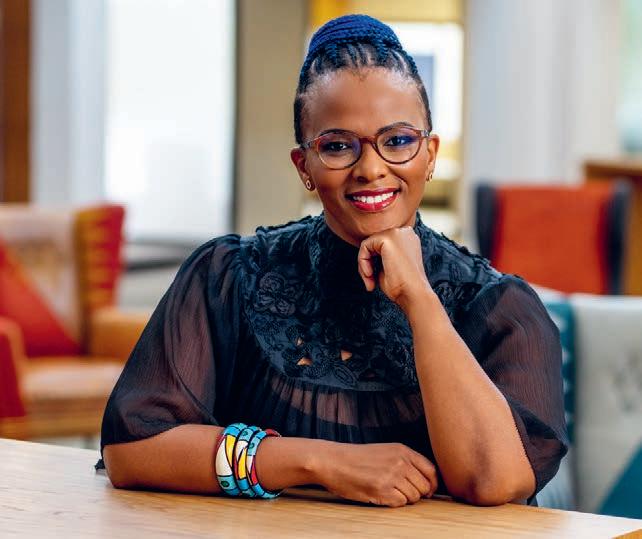
Mavuso also says meaningful corporate transformation goes beyond representation alone. “It’s not just about occupying of ces; it’s about deliberately placing women in operational roles that drive business outcomes. Too often, women are limited to supporting functions like HR or corporate affairs. True transformation means equal access to core business levers, equal pay for equal work, inclusive policies and safe environments.”
Zoleka Lisa, vice president of corporate affairs at SAB, says one of the biggest obstacles facing women today is the persistence of negative perceptions about their leadership.
“The reality is clear, women leaders are already shaping the future of business, government and society, bringing innovation, empathy and inclusive decision-making that drive stronger outcomes. While bias and stereotypes persist, they do not de ne women’s potential or achievements. Progress has been made, and momentum is building toward greater inclusion,” says Lisa.
She adds: “As leaders and as a society, we must normalise women’s leadership by creating transformational policies. Sustained investment in mentorship programmes that prepare and connect women to leadership opportunities is essential.”
In addition, she says, dismantling outdated stereotypes in favour of a modern leadership paradigm that values collaboration,
empathy and adaptability will accelerate progress. “Overcoming these barriers requires committed leadership across government, business and civil society, supported by policies that actively challenge them.”
Bongani Mthombeni, executive director at Atana, says in the private sector, B-BBEE (broad-based black economic empowerment) legislation has evolved to give points for black ownership where directors and owners are not only black, but also women and professionally registered.
“This is a positive step. Similarly, the Employment Equity Act encourages black representation across all levels. It is the employer’s responsibility to eliminate bias and improve black women’s representation in top management. Currently, no policy prevents organisations from trading if they lack black women in leadership positions.”
Mthombeni says that in government, more professional and quali ed women need to advance into ministerial portfolios and executive roles. “Political appointments often prioritise loyalty or political agendas over professional expertise. Without policies requiring speci c quali cations for ministerial or executive roles, quali ed women will continue to face limited opportunities to lead in government.”
“I was more guarded, more aggressive. Over time, I pushed back by staying true to who I am.
“I believe you can be direct and decisive while still leading with empathy. That shift in mindset helped me challenge the idea that leadership must look or sound a certain way, and I now try to model that for others,” she says.
McDougall also believes that authentic women’s leadership in South Africa is, and should be, rooted in strength, empathy and lived experience.
“It’s the ability to challenge legacy systems while staying grounded in integrity and community. For me, it also means making space for other women, bringing others with you rather than forging ahead alone. In a country with such deep inequality, authentic leadership means being visible, vocal and committed to lasting transformation.”
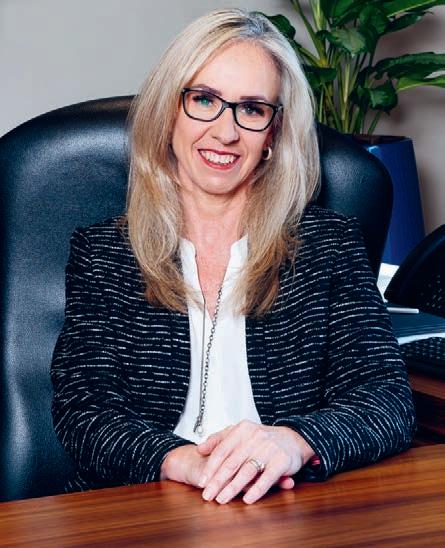





Early in her career, Helen McDougall, CEO of Woodlands Dairy, often found herself the only woman in the room and felt pressure to lead a certain way.
In summary, there is a clear consensus that South African leadership is evolving, with women increasingly shaping approaches that are empathetic, collaborative and inclusive. While board representation has improved, systemic barriers and biases continue to limit women in executive roles. True change requires ongoing mentorship, leadership development, equitable policies and supportive organisational cultures.
As Mavuso concludes: “We need to shift our approach from a transactional perspective to one that recognises the transformational impact of gender diversity on our institutions. By doing so, we can unlock the full potential of our organisations and reap the bene ts of diverse leadership, regardless of legislative requirements.”
Follow: Helen McDougall www.linkedin.com/in/helen-mcdougall
Bongani Mthombeni www.linkedin.com/in/bongani-mthombeni-4961a45b
Zoleka Lisa www.linkedin.com/in/zoleka-l-b476451
Busi Mavuso www.linkedin.com/in/busisiwe-mavuso-bcompt-fcca-mbl-mphil-7593a154
Smangele Nkosi www.linkedin.com/in/smangele-nkosi-a8692429
Fikile Mbhokota www.linkedin.com/in/fikile-shabangu-mbhokota-876b801b
STENDA unpacks how Tshidi Matjeke-Dlungwane is redefining women’s roles in mining
In a sector long shaped by relentless grind and rigid hierarchy, Tshidi Matjeke-Dlungwane is proving that possibility has no ceiling. Her rise, from frontline mining operations to the boardroom, embodies leadership rooted in courage, empathy and vision. Beyond personal success, she uplifts communities, mentors young professionals and shows that resilience, innovation and service to others can redraw the industry’s traditional map.
Matjeke-Dlungwane’s leadership is a masterclass in adaptability. She reads the room with unerring precision, aligning strategy with people and circumstance. On a dusty site, she commands a safety brie ng with the rigour of a drill plan. In the boardroom, she pivots to collaboration, inviting diverse voices to co-create solutions. The result is a culture where decisions are agile, accountability is shared, and risk is managed through informed consensus – proof that leadership is as much about people as process.
Her career path charts a deliberate ascent through mining’s unique terrain.
PERSPECTIVE
Stenda believes women bring a crucial relational lens and a safety-first mindset to mining operations – qualities proven to lower incident rates through proactive communication and collaborative problem-solving. Stenda underscores the power of visible female role models and structured mentorship, paired with technical training that makes even the most complex processes accessible.
To shift the industry’s demographics, Stenda advocates for intentional hiring and retention strategies that confront gender bias head-on and create clear pathways for women to progress into senior technical and leadership roles.


Fresh from the University of Pretoria as a metallurgical engineer, she earned her stripes in hands-on technical roles before pivoting to entrepreneurship, translating operational realities into business opportunities.
Determined to broaden her strategic lens, she completed an MBA at GIBS (Gordon Institute of Business Science). “Victory loves preparation,” she says. Each move, from operations to optimisation, site management to corporate strategy, underscores her belief that leadership is demonstrated, not simply designated.
For Matjeke-Dlungwane, advancing women in mining is a measurable imperative, not a slogan. She envisions a sector where women shape processes, safety protocols and innovative roadmaps. She drives mentorship programmes, sponsorship networks and business coaching that open technical disciplines to young women who might otherwise turn away. Her aim: to normalise ambition so the next generation sees leadership and entrepreneurship as natural destinations, not distant dreams.
Economic empowerment lies at the heart of her mission. By elevating women into decision-making roles and championing women-owned suppliers, Matjeke-Dlungwane proves that inclusion unlocks hidden value. Her initiatives – ranging from inclusive procurement to targeted community investment –show that social licence and pro tability are inseparable when women help steer strategy and outcomes. She also designs leadership pipelines with a situational lens, surfacing the right competencies for each business phase – whether ramping up
Stenda Trading has a focused leadership development programme to fast-track high-potential women into key operational and strategic positions. This initiative pairs mentorship with targeted training, ensuring participants gain both technical depth and managerial confidence.
Women now hold leadership posts across safety, operations, procurement and finance, reflecting the company’s broader commitment to diverse governance and the belief that inclusive decision-making drives stronger performance and safer, more innovative operations.
production, reversing underperformance or driving digital transformation. Her message to aspiring women is clear: when capability meets opportunity, in uence follows.
Ultimately, Matjeke-Dlungwane demonstrates what is possible when leadership values people as much as pro t. By embracing inclusive, situational leadership, she has built trust and cohesion in a traditionally unyielding sector, challenging assumptions about women’s roles and inviting the industry to re-imagine itself – a mining future that is safer, more innovative and undeniably more inclusive.






For more information: https://stendagroup.com
Africa’s progress in terms of gender empowerment is frequently overshadowed by work in other regions. However, this belies the fact that steady advancements are being made throughout the continent, writes LISA WITEPSKI
Colleen Larsen, CE of Business Engage, is on a mission to prove that Africa should be viewed as a benchmark for gender advancement. She says although it is generally recognised that the continent is making strides in this area, it does not receive the kudos it deserves. This is despite the many initiatives that are gaining ground for women in countries throughout the continent. “We need to shed a spotlight on these projects, because their untold stories are making a massive difference,” she insists.
Here are some of the women ensuring female voices are heard.
Having mentored several women with the intention of capacitating them for leadership roles, Michel Mzondo, chairperson of the Institute of People Management Zimbabwe Women in HR Committee, says it is ironic that she had a moment of doubt when she was nominated to take the helm of the Women in HR Committee.
She attributes this reticence to imposter syndrome, noting that the fact women still experience this phenomenon is exactly why initiatives like the Women in HR Committee are important.
Her own journey as a champion for women’s empowerment was catalysed by her observation of how much harder she needed to ght, as a woman, for recognition and promotion in the workplace. “I actively sought out other women who’d had the same experience and who were passionate about capacitating their female peers,” she says. Her search for community led her to UN Women, where she was part of the 2015 Empower Women Global Champions for Change Cohort, championing the online campaign “Break the Glass” – a digital campaign aiming at increasing the visibility of women in leadership.
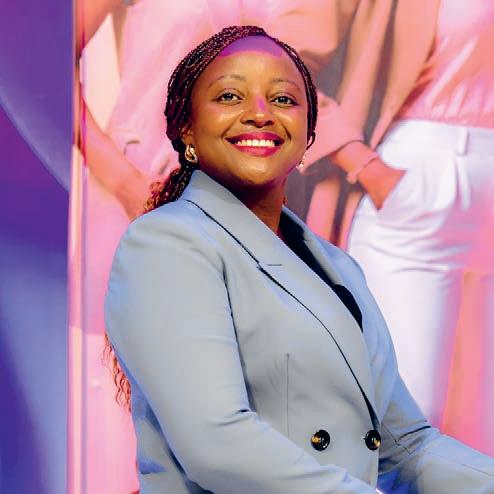
Michel Mzondo
“WOMEN ARE CAPABLE AND THEREFORE NEED TO BE INCLUDED IN DECISION-MAKING POSITIONS. WOMEN NEED TO BE BOLD ENOUGH TO GO AFTER THEIR GOALS.”
– MICHEL MZONDO
Her work with the Women in HR Committee continues this theme. Under her guidance, it has implemented a group mentorship programme, supported by female leaders from diverse industries who share their insights on topics from personal branding to how to increase your visibility. The online sessions draw around 65 attendees every month, Mzondo informs.
The committee is, furthermore, working to raise the pro le of women in leadership by leveraging platforms to spread its message. For example, during March, when Zimbabwe celebrates Women’s Month, it secured a spot
on the “Workers on Wednesday” show on a popular Zimbabwean radio station, where women in HR were invited to speak about issues that frequently affect women in the workplace, from maternity leave to sexual harassment and mental health. The insert proved so impactful that the committee has been invited back regularly to provide insight and context to discussions about the workplace.
Mzondo and her fellow committee members have also been part of these platforms, lending their voices to panel discussions and debates at conferences, while also increasing the visibility of women in HR.
Her team has, furthermore, targeted marginalised girls and young women through a sanitary pad donation drive, which saw it raise US$3 000 worth of sanitary pads through strategic partnerships – enough to provide a year’s supply of sanitary pads to up to 300 girls and young women.
The committee plans to run the campaign once more this year, while other future plans include hosting career guidance workshops for young women at the University of Zimbabwe. It is also planning to partner with Women on Boards to host a breakfast, where female leaders will share their insights and experiences on the way to obtaining board membership.
“Our point is this: women are capable, and therefore need to be included in decision-making positions. Women need to be bold enough to go after their goals,” Mzondo says.
Most women understand that it’s wisest not to walk alone after dark, or that it’s a good idea to let your friends and family know when you are leaving the house and when you expect to return. Plainly, then, security and personal safety are major issues for women – yet women’s experiences are seldom taken into account by the security industry.
Sienna Dutkowsk, the founder of Lady Askari, was made aware of this when her husband, a former US Marine who provides diplomatic security, was looking after a female client in Iraq. When she asked how he would protect her while she went to the bathroom, he told her that all measures were in place to ensure she wouldn’t be vulnerable. She replied: “That means you’ll tell a group of men that I need the toilet, and post one man at the window and another at the door while I use the bathroom. I don’t feel comfortable with that.”
Guided by this insight, Lady Askari was established to “create unique security solutions that meet the needs of the end user”, with the twin aim of increasing female participation in the industry – important because, according to Dutkowsk, female representation in the industry stands

“I BELIEVE WE ALL HAVE A DUTY TO GIVE A VOICE TO THOSE WHO HAVE NONE, SO MY PERSONAL DUTY IS TO FOLLOW THIS COURSE UNTIL IT BECOMES A NORM TO SEE WOMEN WORKING IN THE SECURITY INDUSTRY.” – SIENNA DUTKOWSK
at around 14 per cent. This points to Dutkowsk’s core driver: inclusivity. And, while gender is, of course, part of this, so too is disability, which is why Dutkowsk is currently broadening the company’s focus. At the same time, Lady Askari is working to help Kenyan women feel both physically and psychologically safe, through initiatives such as peer mentoring, the distribution of lactation kits and personal security training. Having provided 500 such training sessions, free of charge, the company is making headway in its mission to help women look after themselves.
“I believe we all have a duty to give a voice to those who have none, so my personal duty is to follow this course until it becomes a norm to see women working in the security industry, and until women hear the words, ‘Madam, you deserve to be here. We want to hear from you’.”
Executive director of Fita Faal Auto Ida Faal’s mother burst into tears when her daughter told her she wanted to be a motor technician. “If that’s the resistance I faced within my own family, imagine how I was received by the rest of my community,” Faal says.
It’s no small exaggeration to say that she was ostracised. Having completed her training (where she was one of only two females in the class), she took up an apprenticeship at a local workshop – and after three months, had yet to be handed a spanner by one of her colleagues. “They all thought I was too weak and feminine,” she muses.
Nor did things change once she opened her own workshop, which she was forced to close after three months. Faal attributes her lack of clientele to a boycott of her business. “The community was trying to put me in my place; teaching me a lesson for thinking that I, as a female, could challenge the men in the industry.”
Faal refused to take the message. Instead, she moved online, becoming the rst technician in Gambia to digitise.
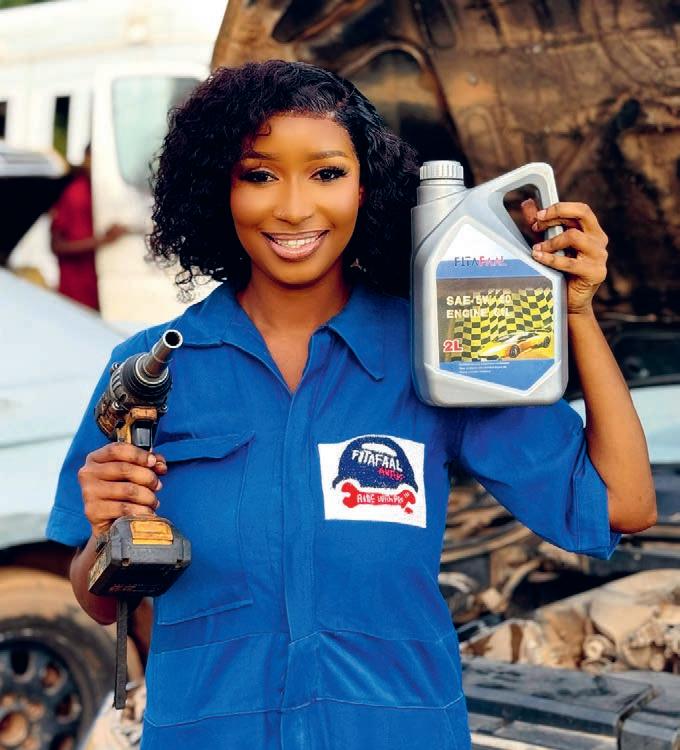
“I decided to make men my allies, rather than my enemies, and I did this by solving a pain point,” she explains. She researched the latest automotive innovations, such as developments in diagnostics, and helped workshop owners implement them. Helping them improve the ef ciency of their businesses earned her a loyal client base, who slowly opened up to the idea of referring their own customers to Faal.
This way, Faal was able to grow a customer base of her own, and Fita Faal Auto reopened in 2022. Faal also established the Clocktvet Foundation, which provides training to equip young females with the skills they’ll need in the workplace, while advocating for vocational training to ensure young women are career-ready.
Faal admits that blazing this trail has been far from easy – but, she says, it has been necessary. “I refused to allow the challenges I faced to kill my spark. I knew that if I did, I’d be killing the dreams of all the young girls coming up behind me. Someone has to ght for a world where girls aren’t told ‘no’.”
Follow: Sienna Dutkowsky www.linkedin.com/in/sienna-j-dutkowski-aa719b6 Michel Mzondo www.linkedin.com/in/michel-mzondo-mbl-ctp-chodp-44b326107 Ida Faal www.linkedin.com/in/ida-faal-%F0%9F%91%A9%F0%9F%8F%BE%E2%80%8D%F0%9F%94 %A7-113a26177
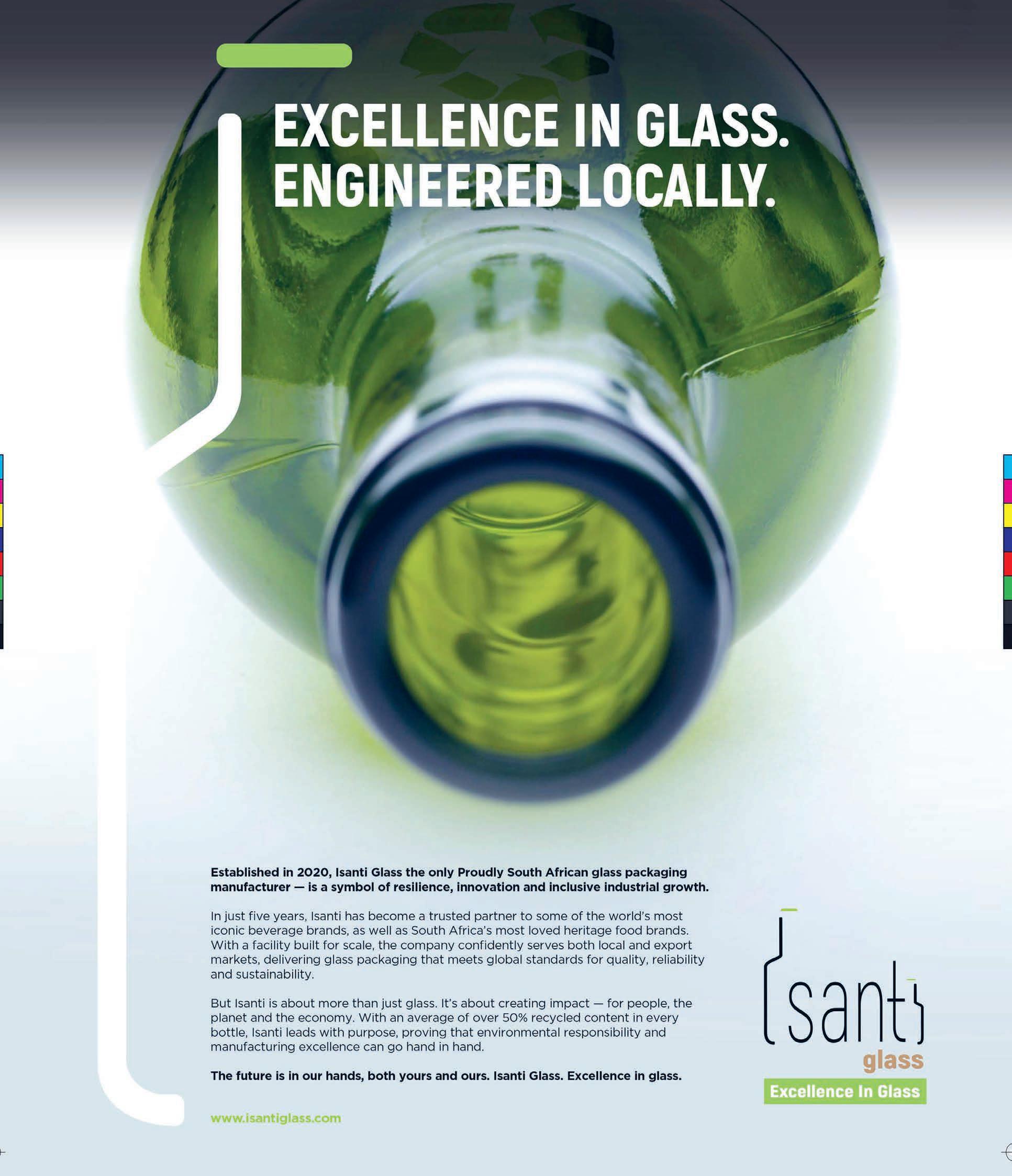
From engineering to banking leadership, Postbank’s chief operating officer Eurekha Singh champions financial inclusion, believing that banking women means banking entire communities and transforming South Africa’s economic future. By
BUSANI MOYO
Meeting Eurekha Singh, chief operating of cer (COO) of Postbank, is to encounter a woman who embodies resilience and purpose. Her manner is calm yet assured, and her words are precise yet warm. She combines the technical focus of an engineer, the operational discipline of a banker and the lived understanding of a woman who has navigated spaces where doors were not immediately open to her.
Her journey has not been the straightforward path of many corporate executives. It has been one of reinvention, persistence and seizing opportunities, even when they arrived in unexpected guises. Today, she forms part of the top echelons of one of South Africa’s most critical nancial institutions, helping shape it not into just another bank, but also an engine of inclusion. Her vision for Postbank is built on something deeply personal: the conviction that empowering women creates a ripple effect that strengthens entire communities.
Singh grew up in a family where the message was simple but powerful: education, integrity and hard work would always be pathways to independence. Her father insisted that nothing could stand in the way of knowledge, while her mother showed by example that women could shape their own futures if they refused to accept con nement to traditional roles.
“We were raised with integrity, discipline, hard work and service. However, if I look back, the most powerful in uence was my mother. Even though she was at home with us for the rst nine years of our lives, she was never just a housewife. She ran a dressmaking business, did hairdressing, and always found ways to contribute income. She hammered into my sister and me that a woman must be nancially independent, saying, ‘If you’re not nancially independent, you can’t control your own destiny’. That advice shaped everything for me.”











“I HAD TO OWN THE SPACE WITH EXPERTISE. THAT MEANT PREPARATION, CONSISTENCY AND BEING TECHNICALLY STRONG. YOU SUCCEED BY BEING SO GOOD THAT THE STEREOTYPE FALLS AWAY.” – EUREKHA SINGH
































That lesson dug deep. Singh pursued chemical engineering, a eld where women were scarce and women of colour even scarcer. Her early years were spent quite literally in hot, noisy smelter plants, monitoring complex processes and troubleshooting technical failures. “I was often the only woman in the room,” she recalls.

That reality was not always easy. She tells one story that has never left her. “I went to meet a supplier about a technical product. He looked at me and said, ‘So where’s your boss?’ He assumed I was a PA.” Singh says that moment was de ning. “I realised that if I wanted to change perceptions, I couldn’t explain my way into credibility. I had to own the space with expertise. That meant preparation, consistency and being technically strong. You succeed by being so good that the stereotype falls away. That experience stays with me to this day.”
That philosophy of taking up space through competence became her guiding approach. In time, though, engineering began to feel limiting to her restless mind. She loved the science of it, but she suspected there was a broader canvas where she could use her problem-solving instincts. When a former boss phoned her one day and suggested she join a project in banking, she was startled. “Banking was never in my plan,” she admits. However, curiosity overcame hesitation, and she took the leap that would change the rest of her career.
Singh discovered that banking was simply another kind of engineering, one of processes and systems rather than machinery and metals. She drew on the same logical skills, drilling into inef ciencies, breaking down complex processes and assembling solutions. Her analytical background became an asset as she immersed herself in nancial services, rst at Nedbank, then at FNB, later at ABSA, and eventually in a leadership position at BDO. Along the way, she re ned her expertise in operations, strategy, compliance and large-scale transformation. More importantly, she began to understand banking not merely as a technical function, but also as a social service that could either widen or close gaps for people on the margins of the economy.
SHE BEGAN TO UNDERSTAND BANKING NOT MERELY AS A TECHNICAL FUNCTION, BUT ALSO AS A SOCIAL SERVICE THAT COULD EITHER WIDEN OR CLOSE GAPS FOR PEOPLE ON THE MARGINS OF THE ECONOMY.
When the opportunity to join Postbank came, Singh was already well-established in private sector leadership. At rst, she hesitated, wondering whether a state-owned bank would offer the same energy and ef ciency she had grown used to. However, the more she researched, the clearer it became that the Postbank mandate of nancial inclusion aligned with her values. In the private sector, success was measured primarily by pro t margins and shareholder returns. At Postbank, success would be de ned by how many people, especially women and vulnerable citizens, could be drawn into the nancial system and equipped to shape their futures. “That is not a chance that comes along often in a career,” she says. “It felt like purpose.”
Singh is frank about why she said yes to Postbank. “Initially, I thought, do I really want to move to the state sector? But then I researched. I saw Postbank’s mandate, and it was like a moment of clarity. This isn’t about fat margins. This is about inclusion, nation-building and designing for people left out. Once I understood that, I knew this was purpose. And you don’t walk away from purpose.”
Women sit at the heart of that purpose. “I often say this: when you bank a woman, you bank a community. Women reinvest, they pay school fees, they buy groceries, they support enterprises. That money doesn’t stop at them – it multiplies through society. If we’re serious
about nancial inclusion, we have to design around women.”
So how does Postbank do that? Singh explains: “When we design a product, we start with one question: does this improve nancial inclusion? The second question is whether it improves inclusion for women. It doesn’t move forward if it doesn’t pass that test.” She explains what this means in practice: “Low-cost channels like USSD and SMS’s, so that rural women without data can still bank. It means mobile banking units going directly into communities where branches don’t reach. It means retail partnerships with Shoprite or Boxer, so if a woman’s grant card isn’t working, she can x it where she shops. And, it means running literacy programmes with community leaders.” She is clear about why this is needed: “Too many women don’t use products because nobody explained them. That education piece matters.”
Inside the bank, Singh has worked to cultivate an environment that recognises what women carry. “I’ve always mentored women,” she says. “At Postbank, we’ve created forums for women leaders to support upcoming women. We talk honestly about balance and juggling children and leadership. And, we have a policy – exible working, delivery over hours logged. It’s not about sitting at a desk from nine to ve; it’s about results. That gives women space.”
Still, she is realistic. “Banking is a twenty-four-hour, seven-day job – customers transact at all hours, regulators demand responses and crises don’t wait for of ce hours. Women are already doing a twenty-four-hour, seven-day job at home. It’s incredibly hard unless you have support.” She is lucky to have this support. “My husband is active at home, and he cooks. My children pitch in. Without that, I couldn’t do this role. We need to acknowledge that women in leadership need support not just at work, but also at home.”
Singh’s vision is crystal clear when asked what Postbank will look like in ve or ten years. She wants the bank to be digitally powerful but community-anchored, seamlessly present
– HAS BEEN A CORE PART OF SINGH’S OPERATIONAL WORK.
in customers’ everyday lives, and particularly known for championing women and young people. She sees Postbank becoming the rst choice for millions of South Africans who may once have thought that banking did not belong to them.
“This future is already being laid,” she says. “Core system overhauls are underway. Retail partnerships are expanding. Digitisation projects push forward with SMS and USSD tools for today and a Postbank app for tomorrow.” She calls the approach “phygital” – a strategic blend of light-touch physical presence through mobile units and stores, reinforced by a strong digital backbone. She notes that banks worldwide are shuttering costly branches, but insists that “exclusion cannot be the price of ef ciency. By blending digital channels with mobile units that physically enter underserved communities on a cycle, Postbank aims to ensure no South African is left behind”.
Product innovation is also key. The Postbank team is working on small-scale insurance offerings for shop owners who may believe coverage is “not for people like me”. They are designing credit products that will not shut out micro entrepreneurs who lack traditional collateral but need affordable nance to grow businesses. They are also focusing on savings products aimed at young people and families who have never been invited into a culture of saving through the formal nancial system. “Only when products are both affordable and accessible to these groups will the vision of inclusion be real.”
The challenges are formidable. Postbank, tied for many years to the postal service,
began its journey lacking many of the specialised skills of a modern nancial institution. Building capability – both systems and people – has been a core part of Singh’s operational work. She points out that while Postbank cannot always seek to compete with commercial banks in terms of salaries, it attracts individuals drawn by something more powerful: purpose. “When you come here, you know you are not just serving customers; you are shaping the country. You may not earn the biggest package, but you leave behind something that matters.”
For all the weight of her job, Singh remains grounded. The sea is her sanctuary. Having grown up in Durban, she nds an endless sense of calm returning to the ocean with her family, a good book in hand, the sound of the waves dissolving the daily intensity of executive life. It is there, in those quiet moments, that she regains balance and perspective.
Of course, there are dif cult days. She does not shy away from admitting there are mornings when the responsibility feels overwhelming. Her way back to steadiness is always returning to purpose. “I remind myself why I started – that keeps me grounded,” she says. Purpose is, for her, not a cliché but a real compass.
Her advice to young women dreaming of careers in leadership is practical and inspiring. “Pursue education relentlessly to remain curious and adaptable and step boldly into spaces where women are under-represented.” She believes they must embrace resilience, knowing that the journey will not always be easy, but that growth often comes from discomfort. Most of all, she emphasises the importance of solidarity. “Our strength multiplies when we lift each other,” she insists. In her life story, from the lessons imparted by her mother to her own nurturing of younger women leaders, that philosophy comes full circle.
Singh’s story has a thread that stretches from a seamstress’s living room business to a COO’s responsibility for a national bank. It is the story of women who insist on independence, navigate obstacles with grit, mentor and lift as they rise and measure success not just on personal achievement, but also on the wellbeing of the communities around them.
She hopes that when the future Postbank is remembered, it will not be for infrastructure or pro t margins alone. It will be remembered as the bank that understood true progress is measured in how it brought women and youth into the fold of nancial freedom, anchored itself in communities and reshaped what dignity in banking could mean for South Africans.
That is the legacy Singh envisions. Not titles or wealth, but a bank and a country transformed by the belief that when women rise, everyone rises with them. As Postbank charts its path to become South Africa’s State Bank – a vision supported by government as it will supplement the current banking system – Singh envisions that women will be an important facet of the bank that Postbank will become.
VISIT WEBSITE SCAN
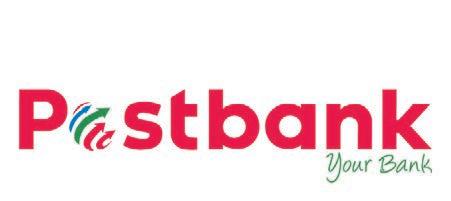
For more information: www.postbank.co.za
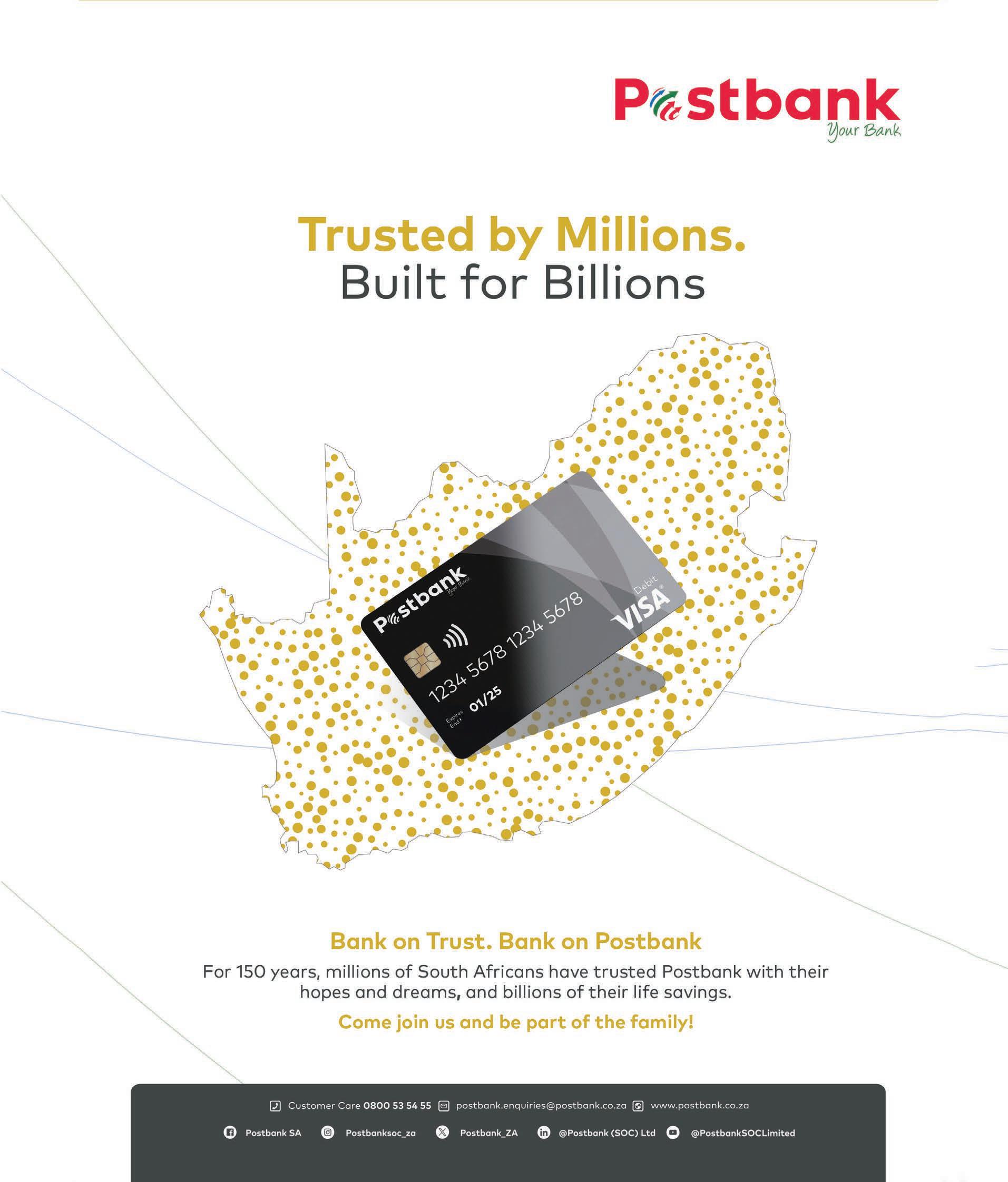
A new generation of young black women is rewriting the leadership playbook in their respective fields. Thando Pato speaks to these change-makers to learn what shapes their vision and drives their commitment to transformation
“I’m a serial tech founder. My businesses are founded on my desire to address socioeconomic pain points I can’t ignore and that keep me up at night. I usually go down a rabbit hole researching to learn how I can solve them,” says Nneile Nkholise
As a mechanical engineering and physics graduate, Nkholise started her career working for local and national government departments in the Free State, auditing and looking for maintenance solutions for critical infrastructure – an issue still close to her heart and the basis of her latest venture THOLA.
Nkholise rst came to the public’s attention when she made headlines locally and abroad with her rst start-up, iMed Tech, which successfully produced and supplied government hospitals with affordable and locally produced prosthetics for breast cancer patients.
Despite the runaway success of iMed Tech, she walked away from the business in search of the next big problem to address.
“I gured someone else would make good use of the technology and processes I had developed,” she explains.
Nkholise went on to found 3DIMO, an agritech start-up, before pursuing her latest venture, THOLA, which is focused on tackling infrastructure challenges using data and arti cial intelligence (AI).
She is now based in the United States (US), where she is scaling the business.
“The US has the right mix of customers – insurers, utilities, industrial operators – as well as policy and technical talent.
Programmes like those of Greentown Labs and ACCEL have opened doors.
And, areas such as the Great Lakes and Rust Belt corridors have given us access to ageing plants – infrastructure – that mirrors South Africa’s challenges. Working in biotech has taught me to build systems and products designed and geared towards changing people’s lives. And, the US has offered me the partners and markets to scale that impact,” she explains.
She admits that despite her success, drive and determination, she sometimes suffers from self-doubt, but rises above it. “I doubt my path every single day. However, I have learned to surround myself
with incredible mentors, friends and family, including fellow founders with shared experiences.”
Nkholise says being a founder, particularly a black female founder in the biotech space, is challenging, and the nature of her work means that she confronts various obstacles, including bias, regularly. However, she is not deterred.
“I work relentlessly – almost obsessively – to prove myself as a businesswoman and a leader. I have learned to enjoy challenges, even when they include proving my capability and expertise because I am being judged by my race, gender or age. Those instances, I believe, give me the opportunity to, hopefully, clear the path for people who come after me and look like me, to use my life as a case study of what is possible,” she says.
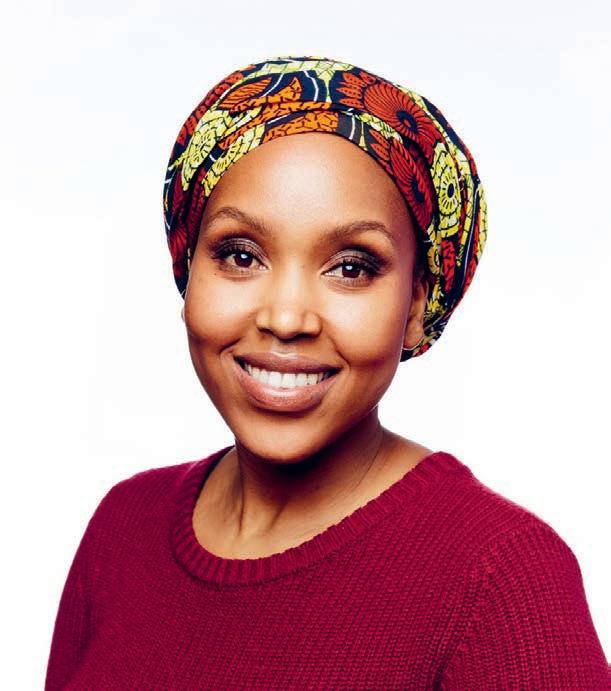
Determination, faith and an ambition to empower communities, particularly women working in the recycling and waste management sector, drive Tshegofatso Mole
A former journalist with no business background, Mole says ongoing mentorship has been a critical building block in her entrepreneurial journey. “I had limited knowledge of the fundamentals of operating a business. The industry I am in is incredibly nuanced, and I knew coming in that I would need guidance in navigating its mechanics. I am fortunate that I have a great mentor who keeps me in check.”
She says, despite self-doubt at the beginning, her con dence has grown alongside the business, but she’s not resting on her laurels. She still has bigger ambitions for the Moli & Mela Group. “At this point, I
believe we are still in the building phase. There is still a lot of work and building that needs to be done,” she explains.
The company is in the process of building a waste recovery plant with the end goal of creating a circular waste economy that includes a manufacturing division and provides jobs for local communities. “In the next ve years, our vision is to establish these sites throughout the country and, eventually, in other parts of the continent.”
Mole says the biggest challenges facing informal recyclers are legal recognition, access to funding and the tools to grow their businesses. However, the Moli & Mela Group is trying to change that by helping waste pickers register their businesses, meet regulatory requirements and tap into a broader market.
“I am focused and intentional about formalising our sector. There are many opportunities for growth when a business meets all the requirements. We’ve helped many businesses, particularly women-led businesses, in this regard.
“I am passionate about creating a sustainable impact in marginalised communities. We’ve identi ed a big need for education around environmental sustainability and responsible waste management, while creating jobs and driving lasting impact.”


Khethiwe Nkuna believes in the intersection of strategy and soul. Her career, which has spanned corporate social investment leadership, entrepreneurial ventures and, most recently, publishing, is driven by the deep desire to make a lasting impact.
“What fuels me is impact that lives beyond a campaign or nancial year. I am energised by work that moves the needle in real and measurable ways. I thrive where strategy meets humanity, vision becomes lived reality and power is used as a force for healing, not harm.
“Compliance doesn’t have to be cold, and strategy doesn’t have to be disconnected from people’s lived realities,” she says.
Strategy and soul are visible in her current ventures. She is the founder and CEO of SkillQuest, a consulting rm bridging the gap between policy and people through
human-centred diversity and inclusion, environmental, social and governance, and other innovation programmes.
She is also a co-founder of the Mwelase Foundation, an organisation honouring her late father, which is focused on delivering robotics to rural classrooms, implementing workplace-readiness programmes for unemployed youth, and entrepreneurial development for underprivileged women.
Her most public success is her recently published bestseller, Tear Her Down, which explores scarcity, internalised misogyny and fractured sisterhood among women in the workplace.
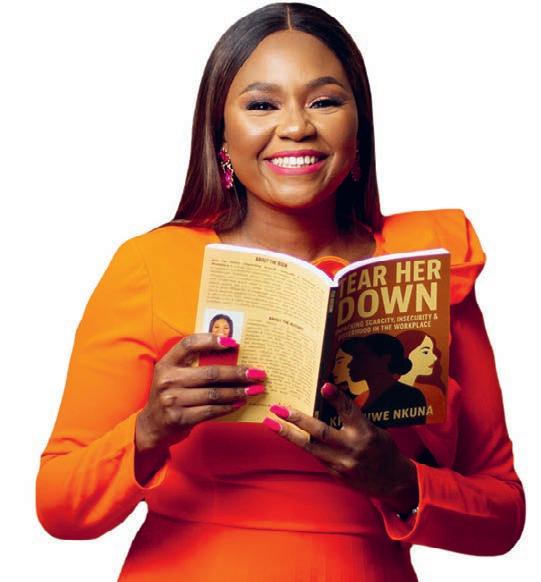
“It was not easy to write, but it was necessary. Since its release, it has sparked important, healing and disruptive conversations about how we lead, how we support one another and how we
co-create environments of emotional safety and true sisterhood. The book becoming a bestseller was a beautiful moment, but its real success lies in the stories women have shared with me about how it helped them name, heal and rise,” she says.
Nkuna, a modern-day leader, writer, speaker, mentor, activist, strategist and dreamer, says her career path has been driven by her intuition and two principles: the refusal to settle for mediocrity and commitment to authenticity.
“I listened when my gut whispered, and I intentionally built a career that honours the multiple parts of who I am. I gave myself permission to be multidimensional.”
Her legacy, she hopes, will be felt in systems that work better, organisations that lead with care and thriving communities because someone dared to build differently.
ITUMELENG MOGAKI speaks to two South African women, one a pioneering psychologist and the other a change management expert, on how empathy and shared authority are redefining leadership in a changing world
Leadership is not just a women’s issue, but for women, the journey to the top comes with a distinct set of challenges and opportunities. As workplaces become more disrupted, diverse and people-focused, leadership models are shifting away from rigid hierarchies towards in uence, empathy and shared authority.
In an ever-changing world, South African women leaders are helping rede ne what effective leadership looks like and, in some cases, challenging long-held perceptions in the process.
For Dr Phyllis Ndlovu, CEO of Kisima Psychological Services, the change is partly driven by the pace and complexity of today’s business environment. “Expectations from leaders have increased exponentially,” she says. “Younger employees want to understand ‘the why’ behind every decision, while older leaders can misinterpret this as insubordination, when in fact it’s about engagement.”
Wendy Spalding, director at Tuesday Consulting, shares a similar view on the shift, but frames it in terms of broader workplace trends. “We are moving from quota systems to a strong focus on the quality of leadership, whether male or female,” she says. “The disrupted workplace requires leaders who care for their people, but this must be balanced with performance and accountability.”
Both expert leaders agree that empathy and emotional intelligence (EQ) are now central to leadership success. “EQ is not just about being ‘nice’, it’s a set of interdependent skills,” says Dr Ndlovu. “Leaders need self-awareness, the ability to manage relationships, make sound decisions and cope with stress.”
South Africa ranks 16 th globally for women in senior management roles, with 42 per cent representation above the global average of 32 per cent.
She also warns that authoritative styles sti e creativity and risk-taking. “When leaders invite participation, employees feel safe enough to bring their best ideas.”
For Spalding, empathy is a performance driver, especially when paired with trust and resilience. “Empathy builds loyalty among employees and clients, but it’s not enough on its own. Leaders also need technical skills, critical thinking and agility. Cultural intelligence is equally important in navigating diverse markets and teams.”
Dr Ndlovu resists making a sharp distinction between “women’s leadership” and leadership in general. “If we differentiate too much, we risk reinforcing stereotypes.” Instead, she emphasises what she calls “multigenerational reciprocity”, which means leading with an awareness that today’s decisions will bene t future generations.

Spalding, while equally focused on inclusivity, highlights the importance of equal access from the start. “Meaningful leadership in South Africa must translate into equal opportunities for all, supported by government, communities and the education system. Industries historically dominated by men must deliberately create enabling environments for everyone to succeed.”
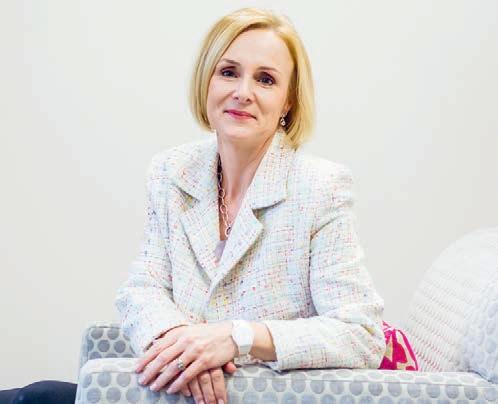
Both experts have challenged traditional leadership assumptions in their work, though their approaches differ.
Dr Ndlovu often uses science to dismantle resistance to modern leadership models. “Neuroscience shows that treating employees with humanity improves results. In some ways, these so-called modern approaches are a return to African principles like Ubuntu.”
In Spalding’s case, she leans more on data to shift thinking. “We provide research and insights that help organisations benchmark leadership in measurable and inclusive ways. This disrupts old biases and norms and helps effect change.”
For young women aspiring to lead differently, Dr Ndlovu’s guidance is clear: “Find a mentor. Know your purpose and manage expectations with your team and revisit them often.”
In response to the same question, Spalding says: “As a leader, you must aspire to in uence beyond your title. The most impactful leaders are those shaping industries and communities.”
To summarise both experts’ views, as South Africa faces economic uncertainty, social change and rapid workplace transformation, leadership that combines empathy, accountability and in uence will be a strategic necessity, not just a personal virtue. And, while the conversation extends beyond gender, women leaders are demonstrating how these qualities can reshape not only organisations, but also the entire system.
Follow: Dr Phyllis Ndlovu www.linkedin.com/in/phyllis-ndlovu-a81bb1131
Wendy Spalding www.linkedin.com/in/wendyspalding
For Enel Green Power South Africa, sustainability has always meant more than generating clean energy. It fuels human potential, breaks barriers and ensures women – often the backbone of communities and the catalysts for lasting transformation – are equipped with the tools, opportunities and recognition they deserve.
Across its many projects in South Africa, Enel has positioned social impact at the heart of its community investments. This commitment is realised through both socioeconomic and economic development streams that provide funding, training and market access that is particularly signi cant for women-led businesses, alongside bursaries and education initiatives that open doors for the next generation. To date, Enel has supported over 100 female-owned businesses with more than R300-million in nancial contributions.
“When women succeed, the impact is far-reaching, touching families, strengthening communities and driving economic growth,” says Caroline Nhlane, Southern Africa head of communications at Enel Green Power.
One such example is Marice Mercuur, founder of Marice Rooibos Skincare. What began as a mother’s attempt to soothe her daughter’s eczema with rooibos has grown into a nationally recognised brand, stocked by Wellness Warehouse and sold across South Africa. With Enel’s support, Mercuur was able to scale production, build an online presence, secure retail partnerships and employ members of her community. With plans in place to grow internationally, her journey illustrates how access to the right resources can transform a personal solution into a business that uplifts an entire community.
“WHEN WOMEN SUCCEED, THE IMPACT IS FAR-REACHING,
ENEL GREEN POWER shares its blueprint for sustainable change
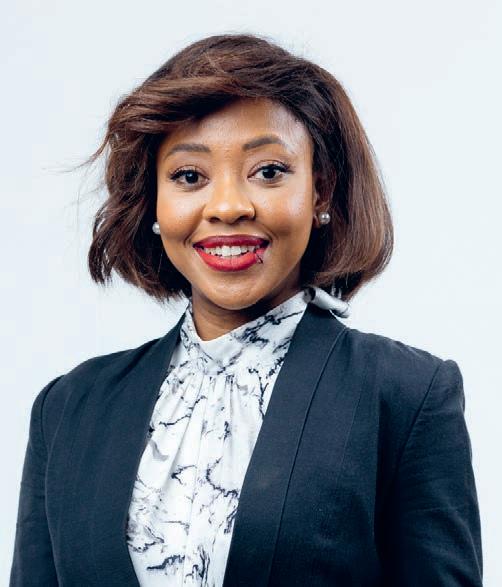
Just as entrepreneurship can ignite possibilities, Enel recognises that lasting change requires broader support systems that give communities the means to succeed. The company’s many social investment programmes prioritise women, from healthcare wellness centres –where 68 per cent of bene ciaries are women – to its COVID-19 Pandemic Awareness Programme, which addressed the rise of gender-based violence during the crisis. Among these initiatives, education stands out as one of the most powerful levers for change.
“Enel’s Bursary Programme has seen considerable success since its inception,” adds Nhlane. “With a cohort of forty-one students across universities, TVET and FET colleges, and schools, fty-eight per cent of recipients are women. More than twenty million rand has already been invested in bursaries and education for female students, helping open pathways to higher learning and careers. Several of these young women are already completing internships, including one who, after losing her father, became her family’s primary breadwinner. Upon completing her degree and internship with Enel, she is now beginning her professional career with the company. These
are the kinds of stories that show how investing in education not only reshapes individual futures, but also uplifts entire households.”
Beyond education, Enel believes collaboration is central to the success of all initiatives. To this end, Enel works with community liaison of cers and project steering committees to identify community needs and co-create solutions with local stakeholders rather than imposing them from the outside. By working alongside communities, Enel ensures solutions are not only welcomed, but also sustainable in the long term.
This collaborative model extends to women-led projects focused on sustainable livelihoods. From agricultural initiatives that create employment while addressing food security to skills development programmes that prepare women for employment opportunities, these efforts are designed to empower women as active participants in shaping their futures. By partnering within the communities where it operates, Enel ensures the bene ts of renewable energy development ripple outward, strengthening families, spurring economic resilience and inspiring future generations.
“At Enel, we have seen rst-hand that when women rise, entire communities thrive. By unlocking the potential of women, we unlock the true potential of South Africa,” concludes Nhlane.
www.enelgreenpower.com

COLLEEN LARSEN, CE of Business Engage and founder of the Gender Mainstreaming Awards, shares insights from a journey of resilience, equity and purposeful leadership in business
It wasn’t the easy days that shaped me … it was the ones I mastered with clarity. When I look back on my journey, I do not see a straight line of victories. I see a path paved with moments – some bold, some quiet, and all signi cant. The turning points weren’t only the public wins or headline events. They were also the private decisions, the late nights staring at spreadsheets, the mornings when doubt whispered louder than faith and the
Gender equity cannot be reduced to compliance. True transformation is embedded in business DNA, not outsourced to HR or written only in policy. When inclusion becomes a mindset that influences strategy and leadership, it drives long-term value. The moment we think we have “arrived” is the moment progress stalls.
Metrics matter for credibility and accountability, but numbers alone don’t inspire movement. It is the stories of people – leaders who championed inclusion, women who advanced in their careers, workplaces that transformed – that humanise the data and drive commitment.
rubble of challenges that tested my resilience. What mattered most was choosing to rise again anyway.
Business Engage was never just a strategy on paper. It was built through belief – through the stubborn decision to act on a vision others could not yet see. It was shaped in seasons of nancial strain, moments of doubt and choices that felt impossible. Yet, we kept going. What carried us wasn’t perfection, but clarity,
community and the conviction that the work mattered. Now, nearly two decades since that rst step, I no longer see only progress; I see legacy.
That legacy has become The Strelitzia Way – both the title of my upcoming book and a philosophy of leadership – anchored in resilience, clarity and purpose – that shows how personal values and business impact can intertwine to create lasting change.
Change doesn’t begin with polished plans, but with honesty. I have seen bold conversations – often uncomfortable ones – become the real catalysts of progress. Whether in a boardroom or over coffee, truth dismantles assumptions and creates pathways for innovation.
No one changes the world alone. Male allies, in particular, play a vital role when they step forward with conviction, not obligation. When inclusion becomes everyone’s business, it stops being labelled a “women’s issue” and becomes recognised as smart business.
Corporate social investment (CSI) is not an optional extra, but a strategic driver. The strongest results come from long-term partnerships aligned with business purpose, not from one-off goodwill projects. True CSI transforms communities and builds sustainable business at the same time.
Progress rarely begins under perfect conditions. If I had waited for ideal timing, unanimous support or full funding, Business Engage would never have started. Growth comes from the courage to begin anyway and to take bold steps even in uncertainty.
Expanding across Africa revealed that transformation is never one-size-fits-all. A model that works in Johannesburg may need adaption in Nairobi or Lagos. Local voices and cultural nuance are not optional; they are the foundation for sustainable impact.
Compliance may open doors, but champions keep them open. Real transformation depends on committed leaders who act consistently, inspire others and carry the cause long after the spotlight moves away.
Purpose-driven work is rarely celebrated in the beginning. At first, it feels invisible. The applause comes only after years of perseverance and consistency. Legacy is built in the long game, in the seasons of endurance that turn vision into reality.
Every success carries a responsibility: to invest in others, to mentor and sponsor and to plant people who can carry the vision further than you alone ever could. Legacy multiplies when you lift others along the way.
ON THE QUEVOLUTION MINDSET ON PAGE 52
Representation alone is hollow. Real equity is when individuals feel they belong –valued, empowered and free to thrive. Belonging is the heartbeat of inclusion; it transforms presence into participation.
This work is deeply human. Ambition alone cannot sustain it; it requires empathy, vision and purpose. Leading with heart ensures that the impact stretches far beyond key performance indicators and into lives, communities and culture.
Leadership requires adaptation, but never at the expense of purpose. I’ve learnt to embrace change courageously while staying anchored in core values. Purpose is the compass that steadies you, even as the landscape shifts.
My mantra has always been simple: start where you are. Do not wait for the perfect conditions or the right title. Progress begins in imperfect places, with imperfect people who are willing to act anyway.
Legacy has never been about accolades or recognition. For me, it lies in the systems we shape, the people we invest in and the conversations that ripple through industries and communities. Influence lasts not because of a title, but because of ethical practice, innovation and the belief in using 100 per cent of available talent.
Incremental change is not enough. Waiting 130 years for parity, as predicted by some, is a missed opportunity. We need Quevolution – quick, deliberate and sustainable evolution. It is a mindset that moves beyond compliance toward innovation, beyond isolated initiatives toward systemic integration.
I believe Africa can be the global benchmark for gender mainstreaming – not by copying Western models, but by exporting our own stories of impact.
You cannot build from burnout. Work-life balance is not indulgence; it is fuel. Swimming, walking the dogs, breakfast with Malcolm, faith and stillness are not distractions, but the practices that sustain me. To live fully is to lead sustainably.
The future is not written in policies or pinned to events; it is shaped daily in boardrooms, breakrooms and communities by those who dare to believe that equity is both possible and necessary.
The lessons of my journey are not just mine. They are reminders for every leader and entrepreneur that purpose, clarity and resilience are stronger than doubt. We don’t build simply to profit; we build to create value that lasts.
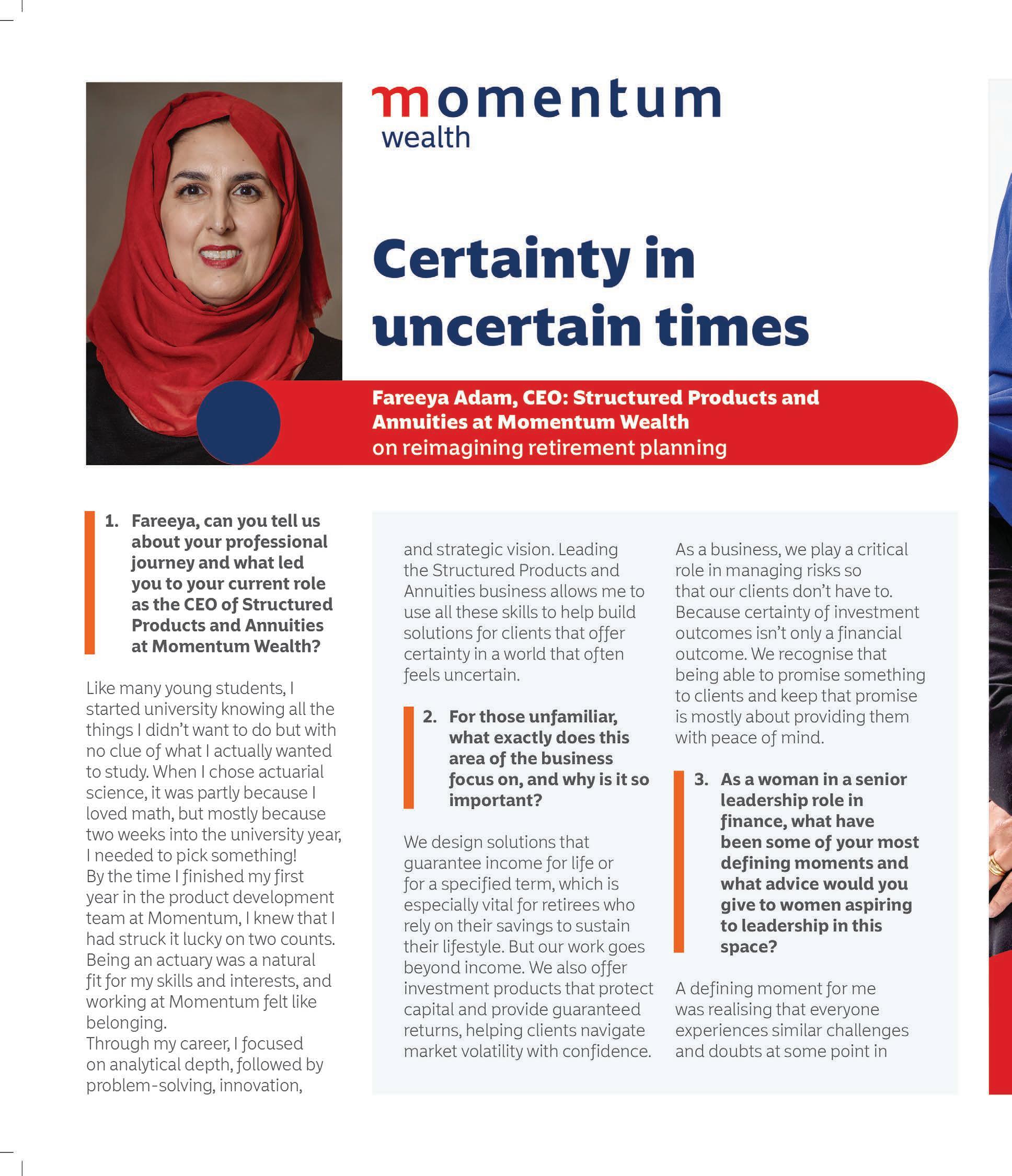
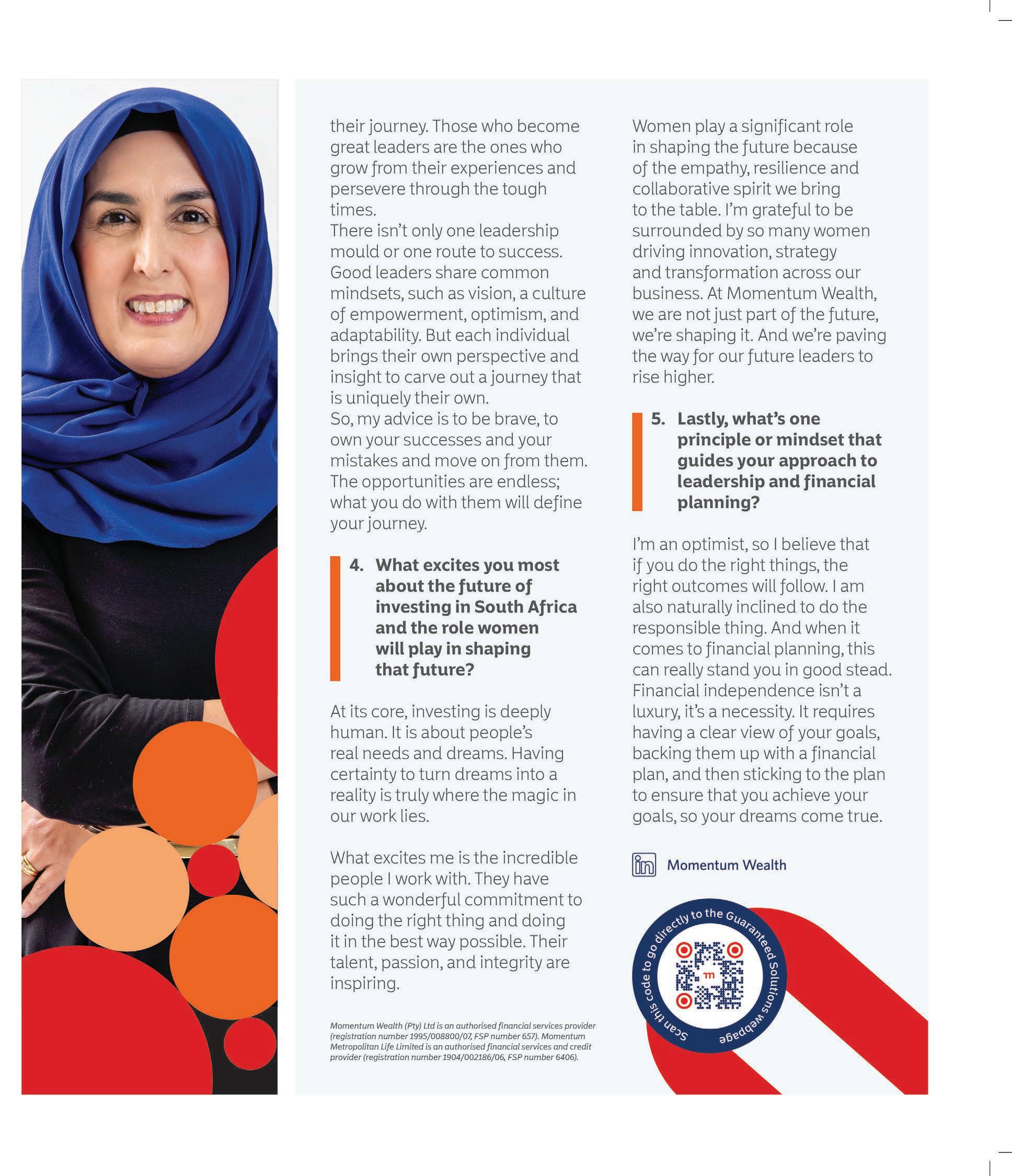

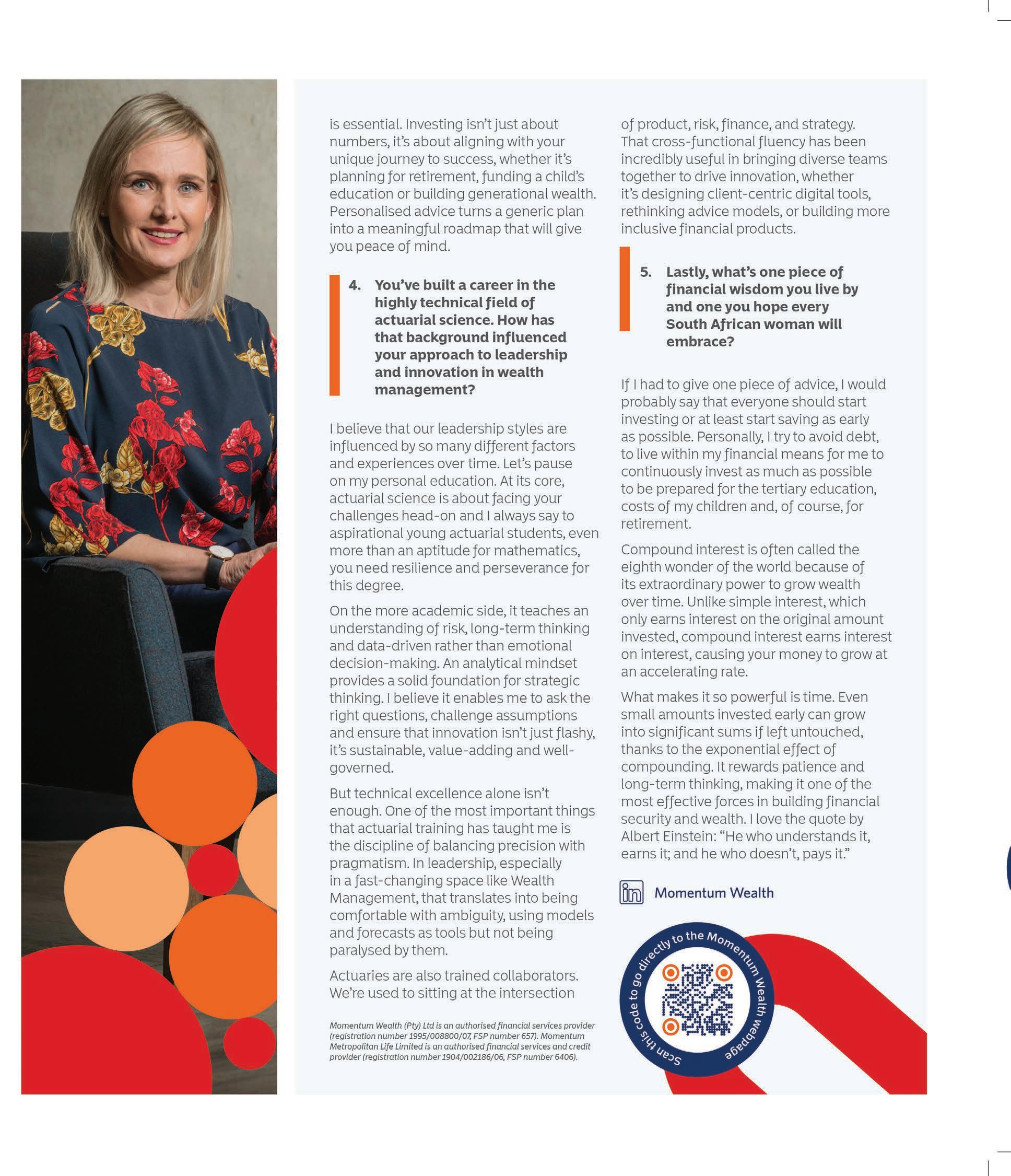

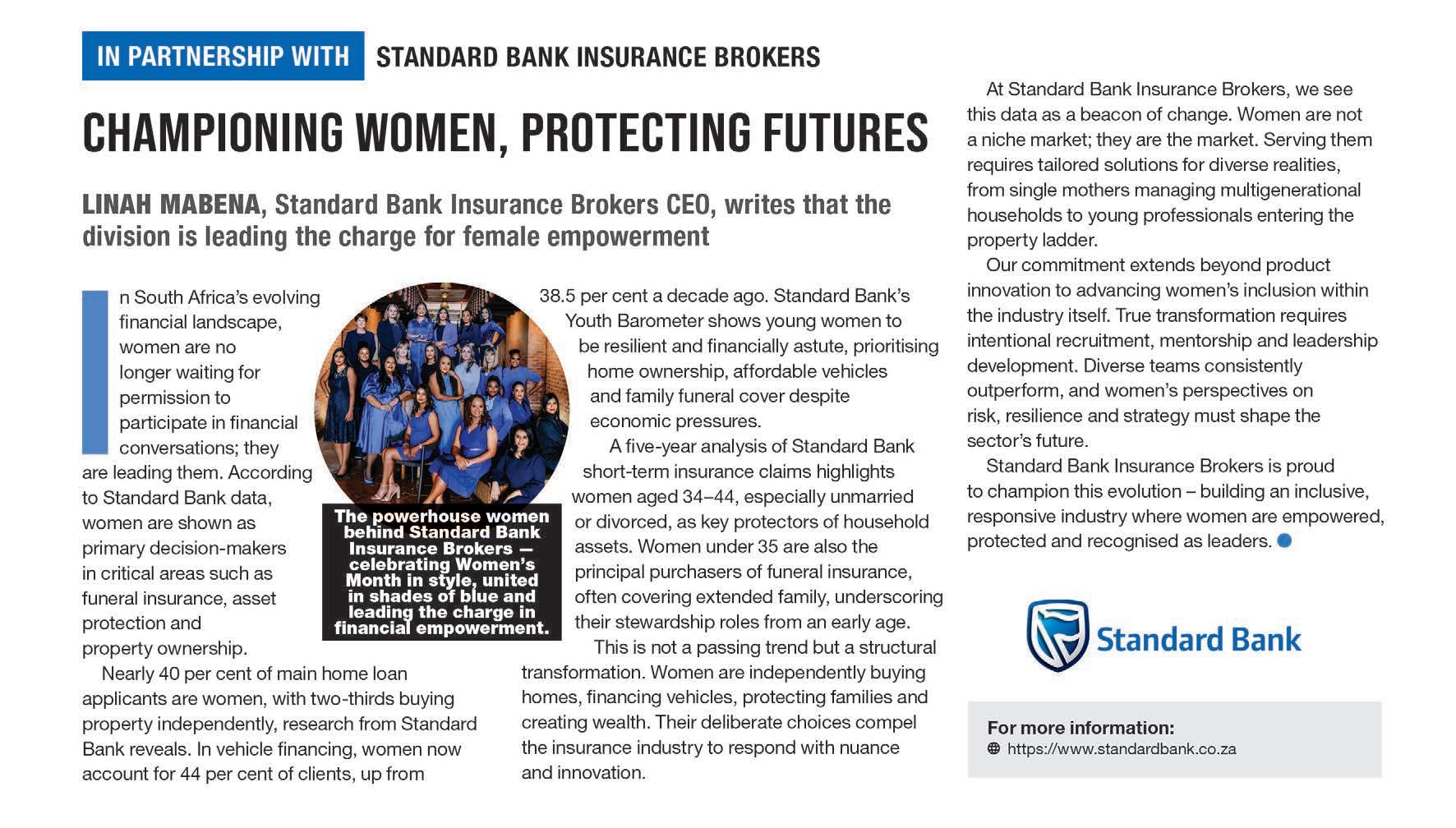
BRIGITTA MANGALE , director – Pro Bono and Human Rights at Cliffe Dekker Hofmeyr, explores why mentorship among women remains a missing link in transformation and why meaningful support structures are needed to unlock real change
Women made up around 47 per cent of South Africa’s total labour force, according to the World Bank (2024). Yet this presence does not translate into leadership positions.
A 2024 survey showed that women held only 36 per cent of board seats in JSE Top 40 companies and just 23 per cent of executive management roles. While ambition among women is evident, barriers to advancement persist, particularly the absence of structured mentorship spaces for women on the rise.
Female leaders bring undeniable strengths to business. Research consistently shows that women in senior roles are more trusted, foster collaboration and demonstrate empathy in managing teams. Their diverse perspectives enrich company culture, drive innovation and boost pro tability. If this value is so clear, why do barriers remain – and why are there so few examples of women actively mentoring other women?
In practice, the issue is complex. For generations, women have had to ght relentlessly for a seat at the table – and then ght again to be heard once they are there. In my own career, I found that it was often my male seniors who provided mentorship and guidance, while female seniors seemed less accessible. As I grew into seniority myself, I realised why: the title of “leader” does not automatically translate into respect or in uence.
Many businesses adopt transformation targets to increase the number of women in leadership roles. However, these measures often stop at compliance, with little effort to ensure that women are empowered, supported and able to thrive in those roles.
True empowerment requires structural change. Organisations need to do more than meet quotas – they must create environments where women can advance while managing family responsibilities, challenge harassment at all levels and break into male-dominated networks. Without this, female leaders remain locked in battles for legitimacy and respect, leaving little bandwidth for mentorship.
For women to mentor and empower the next generation, businesses must provide meaningful support. This means more than titles or transformation targets; it requires ensuring women in leadership have the resources, recognition and authority to succeed. Only then can they create the mentorship spaces so vital for long-term empowerment and sustainable business growth.
Women supporting women is not a luxury; it is a business imperative. The responsibility for enabling it lies not only with women themselves, but also with the collective action of companies committed to genuine transformation.
Follow: Brigitta Mangale www.linkedin.com/in/brigitta-mangale-4358b1a2


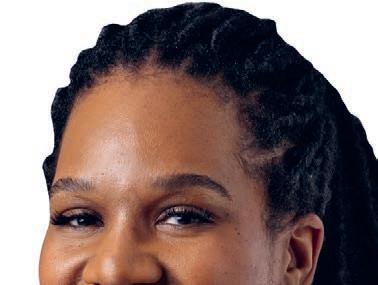




ELRIZA THERON unpacks South Africa’s evolving gender equity journey – from representation to real influence. With insights from business leaders and the bold concept of the “Quevolution”, she explores progress, persistent gaps and the need for systemic change and allyship to make inclusion a lived reality
There are too many untold stories. If we harness the stories, more will happen. This powerful call to action from Colleen Larsen, CE of Business Engage, captures the essence of South Africa’s ongoing journey toward gender equity. As the world intensi es its focus on inclusive growth, South Africa and the continent at large present a compelling laboratory of innovation, leadership and resilience.
The gender equity conversation is not new, but it is evolving. More than a matter of fairness, it has become a critical development imperative. Across boardrooms, policy circles and grassroots movements, the call for systemic inclusion has been gaining momentum for a while now. It is no longer just about representation; it is about in uence, transformation and sustainability.
South Africa has laid a strong foundation for gender equity through progressive legislative and corporate frameworks, such as transformation codes, employment equity laws and sector charters, according to Ignatius Sehoole, CEO of KPMG South Africa. Each
mechanism encourages representation and transparency, compelling companies to disclose board and executive team compositions. “The increasing presence of women in senior roles, along with male allies actively championing gender transformation, signals a shift from mere compliance to genuine commitment.”
Leila Fourie, Group CEO of the Johannesburg Stock Exchange, provides a few excellent examples to illustrate the progress made in South Africa so far, highlighting that in 2024, the country achieved a historic near-50/50 split in national leadership, with women now holding approximately 45 per cent of parliamentary seats. “This milestone was shaped by years of advocacy, voluntary party quotas and the recognition that decision-making must re ect the society it serves.”
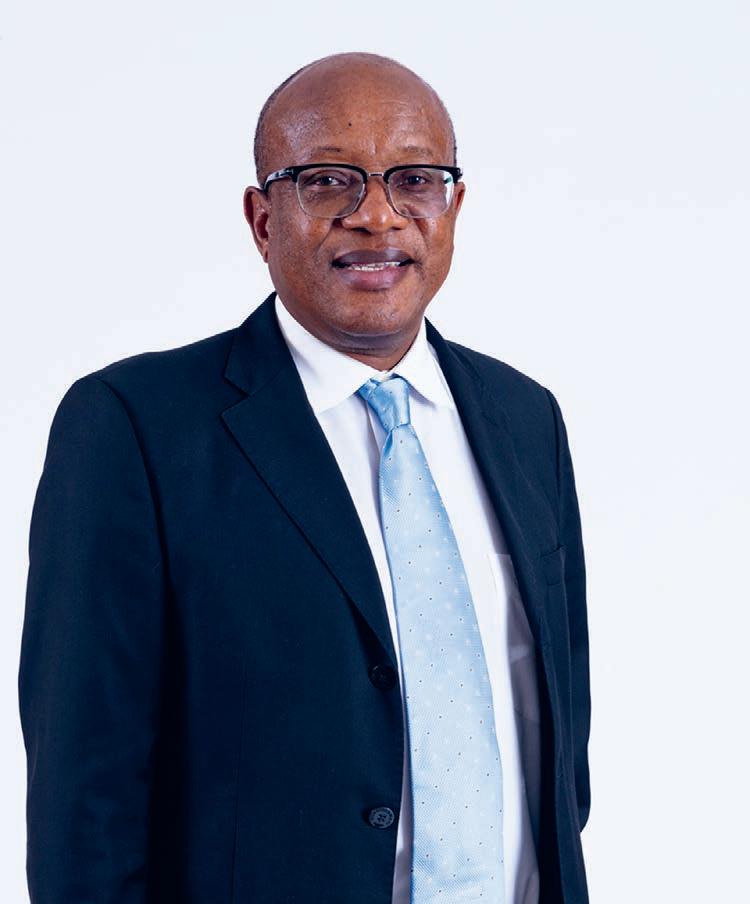
Joelene Pierce, CEO designate of KPMG South Africa, echoes this: “Organisations are recognising that diverse leadership strengthens governance, fuels innovation and enhances resilience.”
Monde Ndlovu, managing director of the Black Management Forum, agrees, adding that the research supports this sentiment.
“Companies with diverse executive teams are thirty-six per cent
“THE INCREASING PRESENCE OF WOMEN IN SENIOR ROLES, ALONG WITH MALE ALLIES ACTIVELY CHAMPIONING GENDER TRANSFORMATION, SIGNALS A SHIFT FROM MERE COMPLIANCE TO GENUINE COMMITMENT.”
– IGNATIUS SEHOOLE
more likely to outperform nancially, according to research done by McKinsey, while Deloitte reports that inclusive workplaces are twice as likely to meet their nancial goals.”
These gender equity frameworks have been instrumental in pushing organisations to reconsider not just who is at the table, but also how the table itself is structured. Corporate boards and leadership teams are increasingly diverse, and mentorship programmes and leadership accelerators aimed at women are more prevalent than ever before.
When it comes to the corporate sphere, Fourie asserts that several major listed companies now have over 40 per cent female board representation. “The Banking Association South Africa’s 2023 Transformation Report shows that women’s share of voting rights in banks has climbed to seventeen per cent, well above the sector target of ten per cent. Just as important, investment in upskilling has surged with R4.98-billion spent on black women and R5.65-billion on African women, far exceeding generic scorecard targets and rebounding strongly from the COVID-19-affected years.”
Ndlovu notes that such progress is also visible in the rise of remarkable women leaders such as Tsakani Maluleke, South Africa’s rst female Auditor-General, Busisiwe Mavuso,
CEO of Business Leadership South Africa, Shirley Machaba of PwC, and Mary Vilakazi at FirstRand. “These women lead while uplifting, linking their roles not only to the development of the country, but also the development of others,” he adds, which is supported by Pierce: “True success lies not only in individual achievement, but also in creating pathways for others to thrive alongside you.”
Ndlovu makes a further astute observation: “If we look at what happens at household level, we can see that women can make a lot happen, often with very few resources. So, imagine what they can do when running multibillion rand and dollar enterprises across the continent.”
He adds that the link between gender equity and economic growth is undeniable. According to the Boston Consulting Group, diverse management teams generate 19 per cent more revenue from innovation. Harvard Business Review notes that such teams make better decisions 87per cent of the time.
presence does not always translate to in uence, urging a move from tokenism to true empowerment.
Larsen also points to a critical distinction between intention and impact. While many companies articulate a commitment to transformation, they often lack the internal culture, resourcing or operational alignment to translate goals into sustained action. True empowerment cannot exist without structural support.

Yet, for all its strides, South Africa still faces formidable challenges in implementation. Transformation often becomes a box-ticking exercise, and real cultural shifts lag behind. Accountability mechanisms are underdeveloped, and a lack of disaggregated gender data makes it dif cult to track progress or develop targeted interventions.
Pierce emphasises this point: “Without reliable data, strong accountability and systems that respond to the diverse realities of women across South Africa, progress will remain uneven.”
Intersectionality is another critical area where gaps persist. Women in rural communities or from marginalised groups often remain excluded from opportunity pipelines. Their lived experiences, shaped by race, geography and class, are not adequately re ected in policy outcomes. Sehoole stresses that boardroom
Fourie agrees: “For all our progress, the hard truth is that the highest rungs of South Africa’s leadership ladder remain out of reach for too many women, especially for far too many black women. Our challenge is no longer one of awareness or intent; it is execution. The gap is no longer in vision but in delivery.” She further argues that, if South Africa’s rst act in gender equity was building progressive laws and broadening early representation, then the second must be dismantling the systemic and cultural barriers that keep women from the helm. “Until the women who ll our middle management tiers are equally visible in our C-suites, our boardrooms and our vice-chancellors’ of ces, our transformation will remain un nished.”
Across Africa, we see a mosaic of inclusive approaches from which South Africa can learn. Sehoole uses examples to illustrate this, such as Rwanda’s parliamentary quotas, Kenya’s grassroots mobilisation and Nigeria’s tech-driven gender advocacy. “These examples demonstrate the power of data, transparency and community-led change.
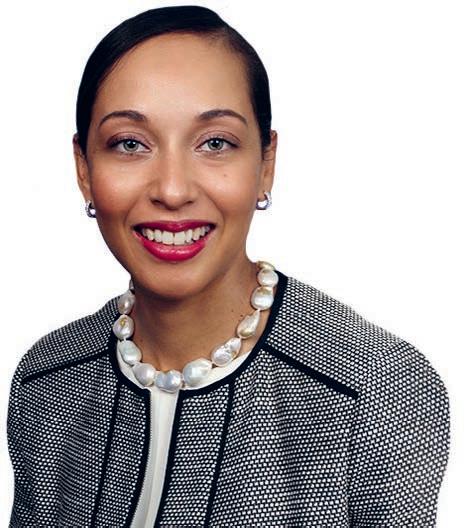
“WITHOUT RELIABLE DATA, STRONG ACCOUNTABILITY AND SYSTEMS THAT RESPOND TO THE DIVERSE REALITIES OF WOMEN ACROSS SOUTH AFRICA, PROGRESS WILL REMAIN UNEVEN.”
– JOELENE PIERCE
South Africa can bene t from regional collaboration, sharing best practices in monitoring and evaluation, and building cross-border platforms to advance gender-focused initiatives.”
Pierce adds to this, noting Ethiopia’s gender budgeting and Senegal’s inclusive policy design. “Pan-African experiences offer valuable insights into resilience, agility and community engagement. South Africa can play a leading role in harmonising gender equity standards across the continent and fostering dialogue on inclusive leadership.”
“WE NEED TO MOVE FROM APPLAUDING AMBITION TO MEASURING DELIVERY. TRANSFORMATION MUST MEAN MORE THAN COMPLIANCE; IT MUST BE OPEN, REAL, EQUITABLE OPPORTUNITIES FOR WOMEN ACROSS EVERY RACE, CLASS AND GEOGRAPHY.”
– LEILA FOURIE
African nations are not waiting for global permission to lead. Fourie provides further examples of Morocco setting a 30 per cent board target by 2024, and Egypt enforcing 25 per cent.
Larsen points out that the goal is not to compare, but to collaborate: “Each country has its positives and negatives. How can we share this knowledge and become the gender hub of Africa?” she asks. Fourie echoes this, emphasising collaboration and regional benchmarking: “When one country advances, others can follow; when one stumbles, others can help it back on its feet.”
One of the most compelling shifts in the gender conversation, as Larsen explains, is the move from empowerment to mainstreaming. Empowerment efforts often place the burden of change on women, asking them to upskill or adapt. In contrast, mainstreaming embeds gender into the structural DNA of organisations and policies. “Empowerment is often focused on xing women; mainstreaming focuses on xing systems,” says Larsen. This paradigm shift is essential if equity is to become a lived reality rather than a written promise.
Fourie’s leadership at the JSE demonstrates how mainstreaming yields measurable results.
THE QUEVOLUTION DEMANDS STORYTELLING AT SCALE, INVESTMENT IN CROSS-BORDER KNOWLEDGE-SHARING AND THE MOBILISATION OF LOCAL CHAMPIONS. IT ALSO MEANS INTEGRATING MEN INTO THE SOLUTION, NOT AS BYSTANDERS, BUT AS ACTIVE AGENTS OF CHANGE.
As she argues: “We need to move from applauding ambition to measuring delivery. Transformation must mean more than compliance; it must be open, real, equitable opportunities for women across every race, class and geography.”
This also includes rethinking leadership pathways, challenging biased recruitment systems and investing in early-career development for under-represented groups. Gender mainstreaming does not end with a single appointment; it must inform decision-making, culture and impact measurement.
In a world frustrated with the slow pace of gender parity, Larsen introduces a powerful concept: the Quevolution – a deliberate, consistent and sustainable evolution that moves quicker than the projected 130 years it will take to achieve global gender parity.
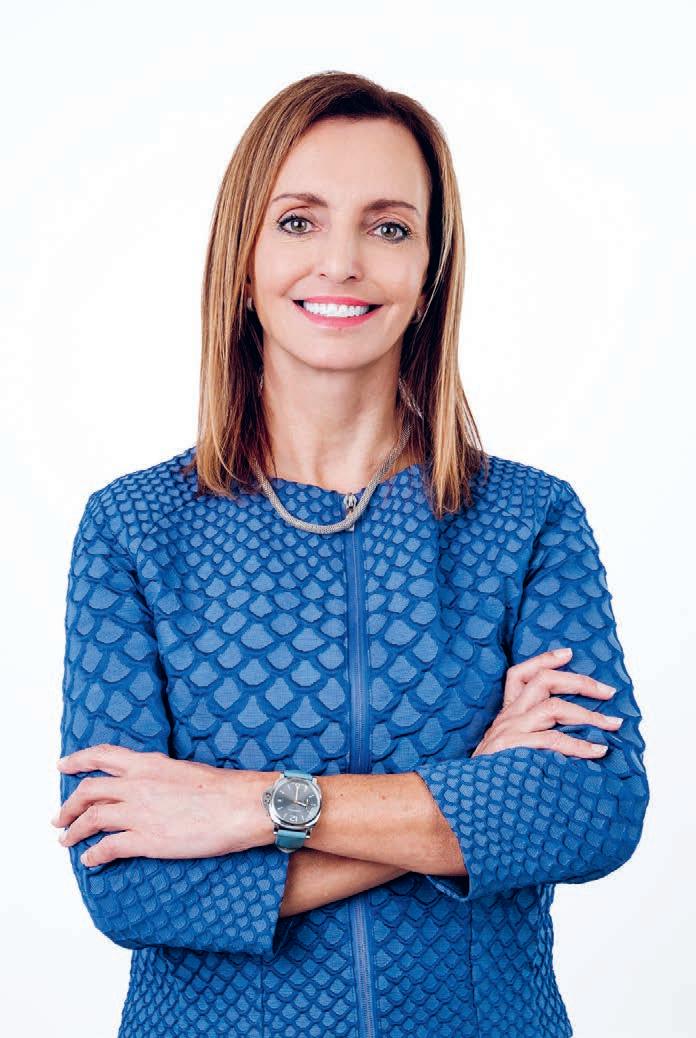
“A revolution is not sustainable,” she says. “We need something that is deliberate, consistent and sustainable, a quick evolution or Quevolution.”
The Quevolution demands storytelling at scale, investment in cross-border knowledge-sharing and the mobilisation of local champions. It also means integrating men into the solution, not as bystanders, but as active agents of change.
Gender equity is not a women’s issue; it is a societal one. “Genuine progress demands that men not only support inclusion efforts, but also actively challenge patriarchal systems that disadvantage everyone,” notes Larsen. Male allies set the tone from the top, turning aspiration into action.
In practice, this means male CEOs, directors and senior managers creating mentorship circles, advocating for gender budgeting and ensuring policies are not only in place, but also properly enforced. Culture is shaped by those with power, and male allies must use theirs to open doors for others.
Too often, the gender narrative is anchored in de cit, highlighting the problems without showcasing the progress. While it is important to recognise persistent issues, such as gender-based violence, unequal pay and underrepresentation, we must also spotlight the success stories, innovations and role models shaping a better future.
Storytelling is a powerful change agent. By amplifying voices across the spectrum of gender experience, whether urban or rural, corporate or informal, young or old, we can create a richer, more inclusive picture of what is possible. It also enables more people to see themselves as part of the solution.
As we look ahead, South Africa must lean into its leadership potential, not with slogans, but with tangible, measurable action. By investing in robust gender data, enabling local champions, and embracing a Pan-African perspective, we can unlock the true potential of diversity. Gender equity is not a quota to be lled or a policy to be passed. It is a lens through which we must view leadership, economic growth and social progress. With deliberate action and collective will, South Africa and Africa can shape a future where inclusion is not an aspiration, but a way of life.
Follow: Leila Fourie www.linkedin.com/in/leilafourie
Monde Ndlovu www.linkedin.com/in/monde-lot-ndlovu-mba-pd-sa-80500b162
Joelene Pierce www.linkedin.com/in/joelene-pierce-3221211
Ignatius Sehoole www.linkedin.com/in/ignatius-sehoole-5179a035
Colleen Larsen www.linkedin.com/in/colleenlarsen
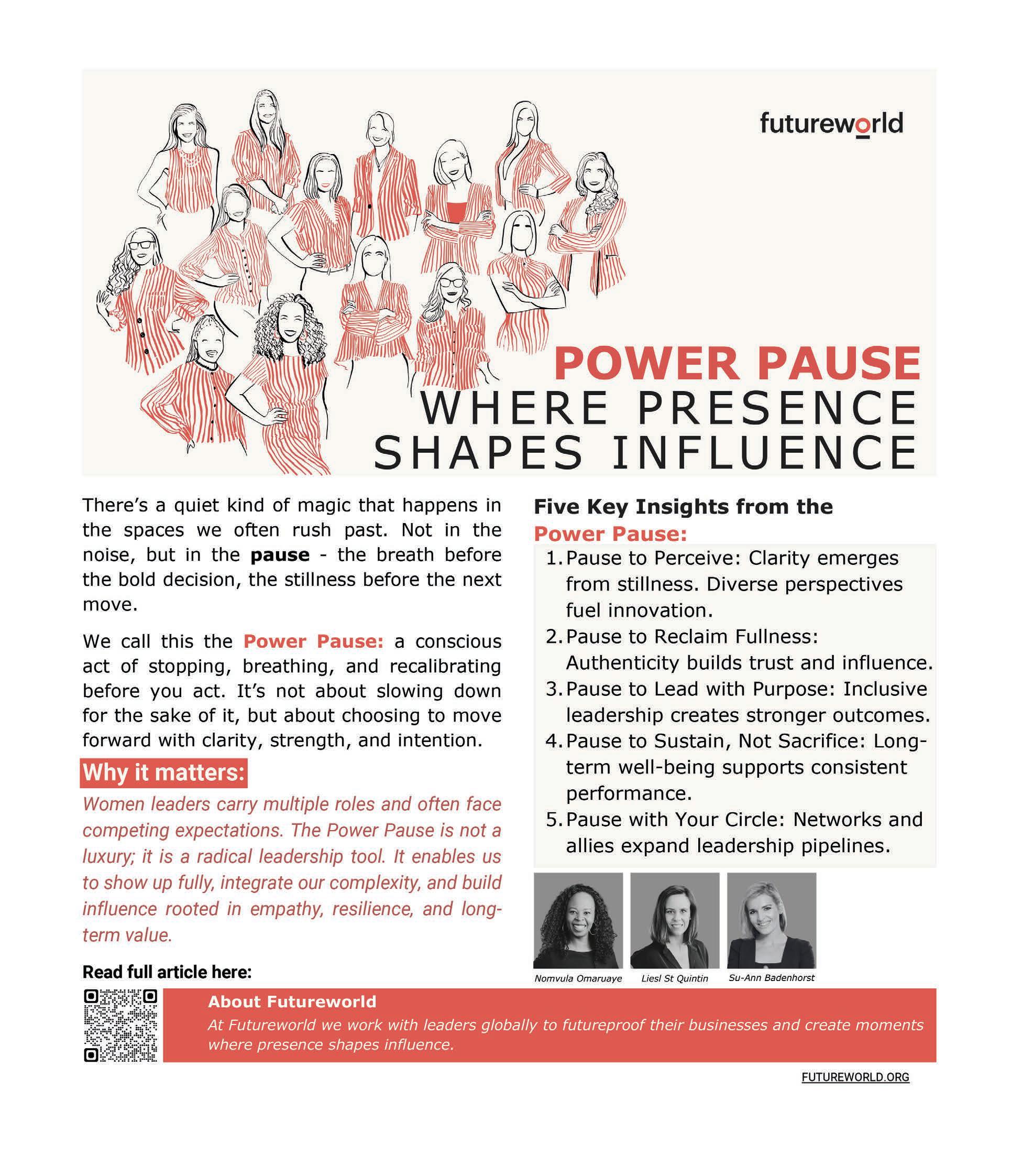
While research reports paint a more positive picture of South African businesses’ efforts to promote women into positions of leadership, the lived reality on the ground is more nuanced, writes GLENDA NEVILL
Unconscious bias remains a signi cant barrier to women striving to reach the top of their game in corporate businesses. South Africa remains, at its heart, a patriarchal society, although efforts are in place to transition to a space where true equality is embedded into the country’s social fabric.
Nthabiseng Kubheka, CEO of the Bombela Operating Company, heads a transport company, a sector often regarded as being male-dominated. “Gender stereotypes and societal beliefs often lead to assumptions that women are less suited for technical or leadership roles in transport,” she says. She adds: “In some instances, this bias in uences hiring decisions, promotion opportunities and team dynamics, where women may be perceived as ‘token’ appointments rather than valued contributors. On the bright side, more people are becoming aware of these biases, and this not only means that we are having conversations, but also doing the work that leads to real progress.”
Kgaugelo Maphai, founder and CEO of the Matrix Group, believes that while it may vary from company to company, patriarchal tendencies are still at play. “As such, our socialisation


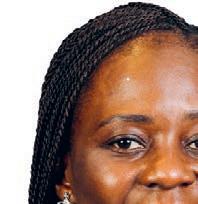
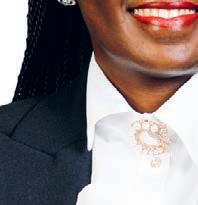


in uences how we think and respond to matters,” he says. “This is not limited to just women; as a society, we need to be more vigilant about our unconscious biases and nd ways to challenge ourselves to be more open-minded and inclusive in our decision-making. We are still in uenced by societal stereotypes and we must challenge ourselves to be more ‘real’ as a society.”
Associate director at global management consulting rm Kearney, Jo-Ann Pöhl, believes the hardest barriers to confront “are the ones we cannot see”. In her career, she says, she’s confronted them all.
“They are not written into policy documents or announced in board meetings. They lurk in everyday interactions, unspoken expectations and ingrained systems. Unconscious bias, stereotypes and exclusionary cultures are still shaping the professional journeys of far too many women,” she says.



“I’ve learned that confronting them takes more than resilience. It has taught me to draw on my courage and self-belief, and be willing to speak the truth, even if it makes others uncomfortable.”

This is a sentiment echoed by Kubheka. “One important lesson I’ve embraced is not allowing my gender to de ne or limit my potential, especially in the face of systemic beliefs. I often share that while none of us
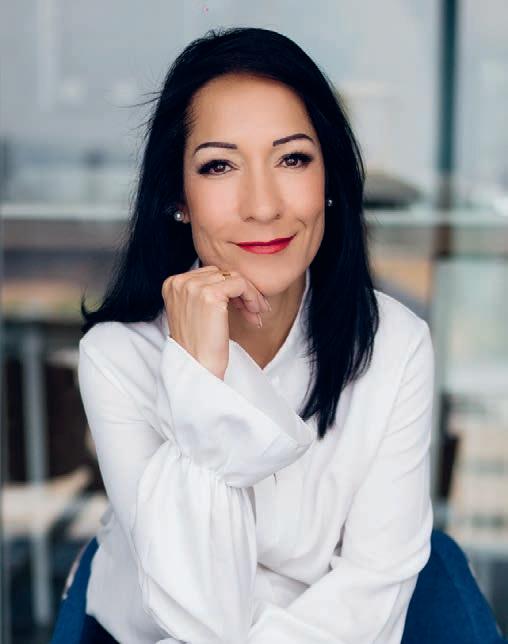
chose our gender, we do have control over our mindset, and it’s often the mental boxes we place ourselves in that become the real barriers to thriving in any environment,” she explains. Still, women are often labelled as too emotional, bossy or aggressive in business, a generalisation male colleagues don’t have to deal with. Kubheka believes these labels re ect the deep-rooted gender bias and ills of our society and beliefs.


“This does not only happen at work, but also at home and in the societies we come from,” Kubheka says. “This requires us to work on some of our societal cultural norms and beliefs; it requires a change in how girl children are raised and made to believe how they should
“IT’S ESSENTIAL TO NORMALISE DIVERSE EXPRESSIONS OF LEADERSHIP AND CHALLENGE THESE STEREOTYPES THROUGH EDUCATION AND INCLUSIVE CULTURE-BUILDING.”
– NTHABISENG KUBHEKA

be behaving versus boys to make sure they are better equipped to face and deal with such strange stereotypes as they move into corporate.”
Sadly, she doesn’t believe these labels will go away anytime soon. “I think we have the capacity to build enough inner strength and resilience to not pay attention to such, as they are meant to be a distraction to diminish women’s leadership styles and discourage assertiveness. It’s essential to normalise diverse expressions of leadership and challenge these stereotypes through education and inclusive culture-building.”
Pöhl says for years she felt the pressure to be composed and controlled always, even when life was falling apart. “My cancer diagnosis
Nthabiseng Kubheka, CEO of Bombela Operating Company, has some advice on how to improve the profile of women in leadership positions.
• Champion DEI at leadership level with executives actively advocating for inclusive policies.
• Implement diversity and nondiscrimination training across all levels.
• Use gender-neutral language and female role models in job ads.
• Be transparent in ensuring equal opportunities in hiring, promotions and pay.
• Have honest conversations about structural barriers.
• Ensure policy alignment between government and private sectors.
• Initiate targeted skills development programmes for women.
• Display visible leadership commitment to gender equity.
• Monitor progress through measurable indicators like pay equity and promotion rates.
shattered that facade and gave me much-needed perspective. Despite the dif culties, it taught me that vulnerability is not a weakness to be hidden, but a strength to be embraced,” she explains. “I had to unlearn the idea that empathy and emotion made me less effective as a leader. I now lead with soul, not ego. I believe progress matters more than perfection. That means showing up authentically, even when it feels uncomfortable, and accepting that my leadership style will not look or sound like anyone else’s.”
The future lies in corporate cultures evolving to embrace diversity where inclusivity is embedded in values, practices and leadership models, Kubheka believes.
“That said, I believe women need to play an active role in changing the corporate culture; unfortunately, the few who have made it into key decision-making roles have a huge responsibility to be the champions of inclusive cultures. No one is going to do it for us. We are the ones whot need to drive it, with many men who have decided to be great allies, into progressive gender-neutral cultures that enable everyone to be able to show up in their authentic self.”
Women outnumber men and therefore invariably in uence society, Maphai points out. However, he adds: “I’ve witnessed women not supporting one another when they reach positions of authority or leadership; they behave like men. They become power-hungry and kick the ladder down so other women can’t ascend like them. We need to re ect on this and start doing things differently to advance our society. Emotional intelligence and self-awareness are the key,” he says.
Pöhl has the last word: “Too many women believe hard work alone will speak for itself. The truth is, accomplishments rarely speak unless we, or our advocates, give them a voice. I’ve learned to own my achievements. It makes space for the next woman to do the same.”
“AS A SOCIETY, WE NEED TO BE MORE VIGILANT ABOUT OUR UNCONSCIOUS BIASES AND FIND WAYS TO CHALLENGE OURSELVES TO BE MORE OPEN-MINDED AND INCLUSIVE IN OUR DECISION-MAKING.” – KGAUGELO MAPHAI
Follow: Nthabiseng Kubheka www.linkedin.com/in/nthabiseng-kubheka
Kgaugelo Maphai www.linkedin.com/in/kgaugelo-maphai-86990b11
Jo-Ann Pöhl www.linkedin.com/in/jo-ann-p%C3%B6hl-552273b
The Grant Thornton Women in Business Report statistics and facts show how South Africa is improving its women in business outlook:
• In South Africa, women make up 47.2 per cent of senior management roles, putting us in the lead globally.
• Top three C-suite roles for women are in HR at 57.1 per cent, CFO at 52.7 per cent and CMOs at 36.3 per cent.
• Businesses with a gender equality strategy on employee pay sit at
• 52.7 per cent in South Africa.
• Globally, 40.3 per cent have a target on equal pay in place and 41.8 per cent for South African firms.
• Globally, only 4.1 per cent of mid-market firms have no women in their senior teams; in South Africa, that number is 2.2 per cent, down from 8.5 per cent in 2024.
• Women make up 35 per cent of CEOs (down 3.5 per cent from last year) and 38.5 per cent of COOs (up 9.3 per cent).
• Almost half (49.5 per cent) of South African respondents say the percentage of women in their senior management team has increased in
management the last 12 months.



































In a sector long defined by male dominance, BOMBELA OPERATING COMPANY is forging a path where women are not only present, but also leading
As the operator and maintainer of the Gautrain rapid rail system, Bombela Operating Company (BOC) is setting a powerful example of how gender diversity can drive innovation, excellence and transformation in public transport and communities.
BOC’s commitment to gender equity is re ected in its workforce composition: women make up 53 per cent of its employees, a gure that far exceeds industry norms. This representation spans all levels, from junior roles to the executive committee, which is 70 per cent female. At the helm of the organisation recognised as Train Operator of the Year by the Rail Safety Regulator at the inaugural Rail Industry Awards in 2024, is Nthabiseng Kubheka, a trailblazing CEO who also serves as country director for RATP Dev. Her leadership has been internationally recognised, including being named one of the top fteen women in the global rail industry by the International Railway Journal
This visible representation sends a strong message: women taking up technical and leadership roles is a strategic imperative, and their presence is essential to the company’s success.
“Much of the company’s diversity, equity and inclusion progress has been driven by visible leadership and clear accountability,” Kubheka notes.
BOC is not just hiring women; it is cultivating a sustainable pipeline for
female leadership in technical roles. The company is actively monitoring traditionally male-dominated positions, such as engineering and train driving, to ensure increasing female participation.
“While we are creating opportunities for women by lling entry-level train driver roles, we remain committed to a fair and inclusive recruitment process that values all quali ed candidates, regardless of gender,” Kubheka explains. “We currently have over sixty per cent female representation in our conductor job grade – a crucial feeder role into train driving positions. The next key milestone in our journey is advancing female train drivers into route supervisor roles. Through this progression, we are actively cultivating a sustainable pipeline for technical leadership.”
This strategic approach ensures women are not only entering the industry, but also being prepared to lead it. From the control rooms to the driver’s cabin, women are becoming the face of Gautrain’s operations.
BOC’s transformation journey is supported by a strong focus on career progression and professional development. The company offers structured leadership programmes and nancial support for
“MUCH OF THE COMPANY’S DIVERSITY, EQUITY AND INCLUSION PROGRESS HAS BEEN DRIVEN BY VISIBLE LEADERSHIP AND CLEAR ACCOUNTABILITY.” – NTHABISENG KUBHEKA


further studies. This re ects a broader vision of empowerment: to build a skilled, con dent and independent workforce.
Internally, BOC fosters a culture of growth through 360-degree feedback, mentorship and clear performance goals. Employees are encouraged to pursue development opportunities that align with their career aspirations, ensuring talent is nurtured and retained across all levels.
This investment in people is not just about lling roles; it is about creating leaders. Whether in operations, engineering or customer service, BOC ensures women have the tools, support and pathways to thrive.
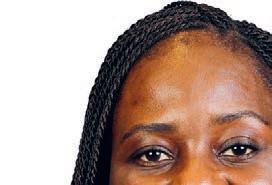
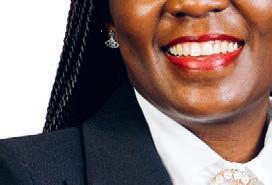

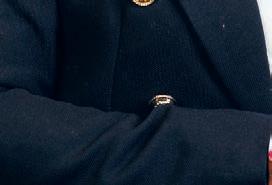








WHETHER IN OPERATIONS, ENGINEERING OR CUSTOMER SERVICE, BOC ENSURES WOMEN HAVE THE TOOLS, SUPPORT AND PATHWAYS TO THRIVE.
BOC’s success is rooted in its people. “We are a people business, and our people are the driving force behind everything we do,” Kubheka af rms. The company places employees at the centre of its strategy, recognising that service excellence begins with engaged, empowered staff.
Employee engagement is not just a metric; it is a tool for innovation. BOC regularly engages with staff to discuss its commitment to inclusivity and to gather ideas that can improve both operations and societal impact. One such idea emerged during a strategic alignment session, where customer service staff raised a concern based on feedback from deaf commuters.
At the time, none of the employees were trained in sign language, creating a barrier for passengers. In response, BOC introduced sign language training for customer facing employees based at various stations.
“We realised we could not only improve the experience for our passengers, but also upskill our people, giving them a new, valuable skill within and outside the workplace,” Kubheka explains.
This initiative exempli es how BOC’s inclusion strategy produces tangible improvements in both customer service and employee development.
BOC’s commitment to transformation extends beyond its workforce, with one of its missions being to impact communities around its operations positively. This is deeply embedded in its corporate social responsibility strategy. The company believes its role extends far beyond transport, expanding to uplifting lives, restoring dignity and creating opportunities for those in need.
One of its partnerships is with the Ponelopele Drop In Centre in Alexandra, where BOC provides monthly groceries to support the daily care of 150 children
aged ve to sixteen. Located near Gautrain’s Marlboro and Sandton stations, Alexandra is one of Gauteng’s most underserved communities.
In Midrand, BOC supports the New Jerusalem Children’s Home, which provides shelter, care and rehabilitation to orphaned, abandoned and traumatised children. BOC’s contributions help sustain the home’s operations and expand its reach to more vulnerable youth.
These initiatives are not just charitable; they are strategic expressions of BOC’s commitment to be a responsible corporate citizen. By investing in the wellbeing of children and vulnerable communities located near its operational footprint, BOC ensures its presence brings tangible, lasting bene ts to society.
This community- rst approach complements BOC’s internal culture, where employees are encouraged to engage with social causes and participate in mentorship programmes such as Sizanani, which supports over 380 learners from Alexandra. BOC employees volunteer as mentors, helping young people navigate their educational and career paths.
Additionally, since 2022, BOC has actively supported education through its external bursary initiative, which has funded 20 students pursuing tertiary studies in commerce, humanities and sciences. The bursary programme provides comprehensive nancial assistance, including tuition, accommodation, textbooks and meals.
The various community engagements and programmes re ect BOC’s belief that public transport and mobility is more than infrastructure; it is a vehicle for nation-building, empowerment and social cohesion.
BOC’s operational performance is world-class. The Gautrain system boasts a 99 per cent availability rate and over 95 per cent punctuality, supported by advanced safety protocols and customer service excellence. However, what truly sets BOC apart is its human-centred approach.
As the current concession agreement approaches its end in 2026, BOC’s journey is far from over. With a foundation built on inclusivity, operational excellence and community impact, the company and its people are poised to continue leading and changing the face of South Africa’s rail industry.
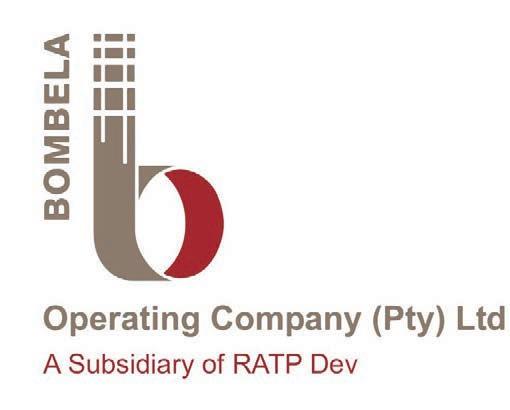
We’ve all seen the corporate promises, the glossy annual reports and the polished statements on International Women’s Day, all pledging a commitment to gender equity. But, what happens after the social media posts fade? What does it look like when a policy crafted in a boardroom actually echoes in the hallways, shapes a career and changes a life? We have the answers.
The gap between intention and impact can be vast, but some South African companies are closing it with deliberate, measurable and deeply human strategies. They are proving that true transformation isn’t about ticking boxes; it’s about rewriting the rules. We spoke to leaders at Ashburton Investments and HEINEKEN Beverages – two companies in vastly different sectors – moving beyond the statistics to understand the lived reality of what happens when policies truly work.
In the high-stakes world of nance, Ashburton Investments is proving that a culture of equity is not just a moral good, but a competitive advantage. Its commitment to advancing women is woven into the very fabric of its talent development strategy. Rather than simply aiming for representation, it is actively creating dynamic pathways for growth.
Meghna Ravjee is the company’s chief nancial of cer (CFO). In a recent interview, she spoke about one initiative that has proven to be a powerful catalyst for change. “A particularly impactful initiative at Ashburton Investments has been the secondment programme, which enables employees to work in other areas of the business temporarily,” she explains. “Several women who participated have successfully transitioned into high-impact roles, such as IT business analysts and investment analysts, demonstrating how exposure to new functions can unlock career growth and diversify leadership pipelines.”
Robust, structured support systems complement this hands-on approach. Ravjee emphasises that growth is an active investment, not a passive hope. “Ashburton employees have access to mentoring and coaching programmes that re ect our
What happens when gender equity policies actually work?
BUSANI MOYO goes inside two leading South African companies to uncover their blueprints for meaningful, lasting change
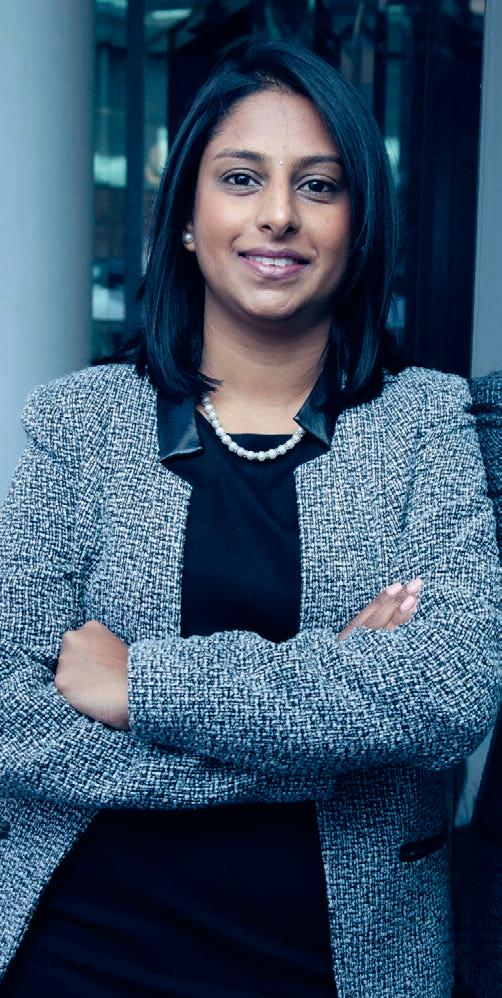
commitment to actively invest in growing our talent,” she explains. “These programmes provide personalised guidance and insight from experienced professionals, helping women navigate career challenges with con dence and clarity. We also offer tailored training programmes designed speci cally for high-achieving women, enabling them to make purposeful and meaningful choices that expand their impact and in uence.”
This deep investment is crucial in an industry where systemic hurdles persist. Ravjee offers a candid perspective on these challenges. “Challenges, such as unconscious bias, under-representation across the industry, rigid work structures and limited access to strategic opportunities, persist globally,” she acknowledges. “These are compounded by networking gaps, cultural double standards and environments that don’t always foster belonging or con dence.”
In response, Ashburton’s strategy is clear and decisive. “Our approach is rooted in transformation. We’re proud that many of our senior leadership and executive roles are held by women, re ecting our commitment to building a diverse and inclusive leadership team. Through initiatives, such as transparent promotion frameworks, exible work policies and our secondment programme, we’re actively reshaping career pathways.”
Furthermore, the company directly confronts one of the biggest barriers to women’s advancement: balancing professional ambition with caregiving responsibilities. Its policies are designed
“OUR APPROACH IS ROOTED IN TRANSFORMATION. WE’RE PROUD THAT MANY OF OUR SENIOR LEADERSHIP AND EXECUTIVE ROLES ARE HELD BY WOMEN, REFLECTING OUR COMMITMENT TO BUILDING A DIVERSE AND INCLUSIVE LEADERSHIP TEAM.”
– MEGHNA RAVJEE
to create a culture of genuine work-life integration. “Through exible work models, including remote work and exible hours, the company empowers employees to manage their professional and personal responsibilities more effectively,” Ravjee says. “Family support resources, such as on-site childcare facilities and mothers’ rooms providing private spaces for nursing mothers, help alleviate the stress associated with caregiving.” This structural support is reinforced by a leadership culture that champions wellbeing. “Leadership plays a pivotal role by actively promoting open dialogue around wellness and work-life balance, reinforcing psychological safety and a sense of belonging.”
For global beverage leader HEINEKEN Beverages, gender equity is not a supplementary goal or a corporate social responsibility initiative; it is a central pillar of the organisation’s business strategy. This top-down commitment creates a powerful current of change that ows through every department, from the brewery oor to the executive suite.
The company’s people director, Enid Lizamore, makes its position clear: “At HEINEKEN South Africa, gender equity is not an aspiration; it is a business priority that is fully embedded in our strategy. We believe diverse teams drive stronger performance, better decision-making and more innovative solutions for our customers and communities.”
This belief is backed by ambitious, non-negotiable targets integrated into its global framework. “Our efforts align with Brew a Better World – our global ‘Brew a Better World’ initiative, which includes a commitment to gender equality,” Lizamore states.

“GENDER EQUITY AT HEINEKEN SOUTH AFRICA IS NOT A COMPLIANCE EXERCISE. IT IS A STRATEGIC ADVANTAGE AND A CORE PART OF HOW WE BUILD A BUSINESS THAT IS FIT FOR THE FUTURE.”– ENID LIZAMORE
“Our goal is to reach thirty per cent women in senior management by 2025 and forty per cent by 2030. We have also committed to ensuring equal pay for equal work.” These are not just numbers on a page; they are drivers of deliberate action. The results speak for themselves. “Women now represent forty-one per cent of our senior leadership talent pipeline, and just over forty-four per cent of our C-suite leadership team is female.”
This success is the outcome of concrete actions woven into the organisation’s HR processes. “Our approach is deliberate and measurable,” Lizamore explains. “All leadership shortlists include female candidates, supported by a targeted Women in Leadership programme showcasing high-potential women to accelerate progression. Pay equity audits identify and address gaps incrementally, with progress reviewed at executive level to ensure transparency and accountability. Inclusive leadership training is mandatory for all leaders to recognise bias and create psychologically safe environments.”
The company invests heavily in a suite of female-focused development programmes to build a powerful and sustainable talent pipeline. Lizamore highlights several key initiatives, including a Women in Sales programme launched in partnership with GIBS (Gordon Institute of Business Science) with 90 per cent female delegates, a Sales Leadership programme with the same female representation and the Ela Lidera programme, which was launched with an all-female cohort. She adds that the organisation’s graduate and bursary programmes both have at least 70 per cent female representation.



Crucially, HEINEKEN Beverages understands that a truly inclusive culture cannot be mandated by policy alone; it must be built on empathy and shared understanding. “Through our internal initiatives, such as #InHerShoes, we have moved beyond policy statements to authentic cultural change,” Lizamore reveals. “This campaign ampli es the voices of women across our business, fostering empathy, allyship and a shared responsibility for creating an equitable workplace.”
This holistic approach is why she concludes with such conviction: “Gender equity at HEINEKEN South Africa is not a compliance exercise. It is a strategic advantage and a core part of how we build a business that is t for the future.”
The journeys of Ashburton Investments and HEINEKEN Beverages, though unfolding in different industries, offer a shared and powerful narrative. They reveal that meaningful progress on gender equity is born from intentionality, driven by accountability and sustained by a genuine commitment to cultural change.
Ashburton demonstrates how a deep, nurturing investment in individual pathways and supportive structures can dismantle barriers in a traditional industry. HEINEKEN, in turn, provides a model for how a globally aligned, target-driven strategy can embed equity into the very DNA of a business, turning it into a competitive advantage.
Together, they provide a powerful blueprint, proving that when policies are thoughtfully designed and authentically embraced, they do more than just change statistics; they change lives, strengthen businesses and build a more equitable future for all.
Follow: Meghna Ravjee www.linkedin.com/in/meghna-ravjee-ca-sa-36bb3263 Enid Lizamore www.linkedin.com/in/enid-lizamore-0aa68419
In South African corporations, too many women leaders still face isolation, tokenism and double standards. VANESSA ROGERS explores the shift from symbolic appointments to genuine, system-changing representation
In South Africa’s corporate landscape, women continue to break barriers, yet representation often stops at the symbolic level. High-pro le appointments are celebrated, however, too frequently, women nd themselves isolated, unsupported or navigating workplaces that were never designed to sustain their success. True transformation is not about lling quotas; it is about shifting the systems that shape leadership, in uence and decision-making.
Colleen Larsen, CE of Business Engage and founder of the Gender Mainstreaming Awards, has long been involved in promoting inclusive leadership and providing platforms for dialogue on gender transformation in business. “I’ve never approached my work from a place of opposition. It’s never been an ‘us versus them’,” she says. “Instead, I believe in creating platforms where everyone can co-exist, collaborate and evolve the system together.”
“FOR TRUE REPRESENTATION TO EMERGE, WE ENCOURAGE THE COMPANIES WE WORK WITH –OUR CLIENTS – TO MOVE FROM PROGRAMME-BASED EFFORTS TO SYSTEMIC INTEGRATION.”
– COLLEEN LARSEN
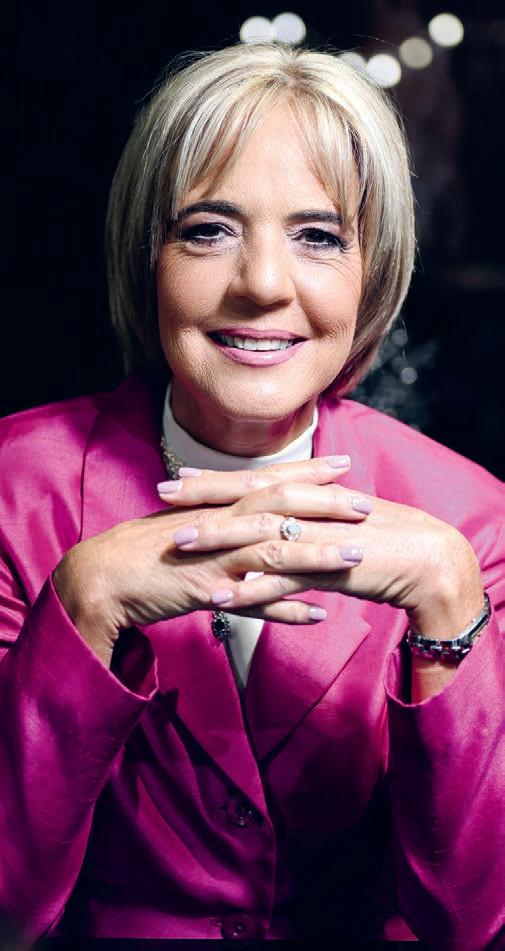
On advancing gender transformation beyond aesthetics, Larsen advises that instead of focusing on the dominance of one group, she’s focused on building ecosystems that reward inclusive leadership, long-term thinking and shared value.
“This is why initiatives such as the Gender Mainstreaming Awards and Business Engage’s peer-learning platforms don’t just highlight women’s voices. Instead, they invite men into the room as allies and co-creators of change. Transformation must go beyond what is publicly seen. It must embed inclusion into strategy, leadership and value creation,” she says.
Asked what her main struggles have been on her career path to date, Larsen reveals that some of her toughest moments haven’t come from the system, but from the pressure to conform to it.
“Early in my journey, I realised that playing by outdated rules wasn’t the path to change. So I stopped asking for a seat – and built a different table. The lesson? Stay anchored in your purpose. Systems don’t change overnight, but people do. And, when suf cient numbers of people begin to think differently, the system simply has to adapt.”
Her motto? “Keep showing up with clarity, consistency and courage; and invite others to do the same.”
As an advocate for gender mainstreaming in business, Larsen advises that representation is not just about numbers; it’s about in uence. It’s when diverse voices shape decisions on a sustainable basis and aren’t simply invited to attend the meeting.
“For true representation to emerge, we encourage the companies we work
with – our clients – to move from programme-based efforts to systemic integration,” she says. “Policy changes play a role, yes, but a recharged company culture is what drives new behaviour patterns.”
In Larsen’s opinion, businesses need clear key performance indicators linked to inclusive leadership, mentorship pipelines that serve everyone equally and accountability that sits at the top. She is adamant that true representation is about “ xing systems so everyone can thrive”.
“You need to do more than simply claim a seat at the boardroom table or attend the meetings to which you are invited,” says Larsen.
Her pointers for developing a pipeline-building toolkit, which is in essence what Business Engage was created to do, are:
•Start by being intentional. Who are you mentoring? Who are you advocating for when they’re not in the room?
•Leadership is not just about position; it’s about legacy. We need to move from scarcity to abundance thinking. When I walk into a room, I don’t want to be the only one; I want to open the door wider for the next one.
•Create completely new formats – safe, strategic spaces where real conversations can happen and new networks can emerge.
Larsen believes the saying “power, pipeline, policy” can be seen as a useful framework when it comes to women empowerment in boardrooms, executive teams and within strategic decision-making. However, the framework needs to be applied with depth.
“Power is not about control,” she advises. “It’s about responsibility and stewardship. Pipelines need to be inclusive from the early stages of a career, not just at executive level. Policy without practice is meaningless.”
Additionally, she feels that a fourth “P” should be applied – partnership, because none of the above can work if applied in siloes.

“True transformation happens when we bring people together across gender, race, sector and seniority – not just to talk, but also to act,” Larsen says.
“We need to stop treating gender equity as a women’s issue – because it’s actually a business issue, an economic issue and a leadership issue. We can’t afford to leave value out there on the table. The most powerful shifts I’ve seen happen when we create inclusive environments on purpose – not just by chance. This work is not about ticking boxes. It’s about unlocking potential, which bene ts every single one of us.”
Follow: Colleen Larson www.linkedin.com/in/colleenlarsen
Mpumi Madisa www.linkedin.com/in/mpumi-madisa-4478b258
Recognised for her leadership in South Africa and twice featured on the Forbes list of the World’s Most Powerful Women, Mpumi Madisa, CEO of Bidvest Group, shares candid insights on navigating disrespect as a female CEO.
Women, she says, could “write encyclopaedias about being disrespected – volumes of encyclopaedias”. During their careers, they encounter it repeatedly.
Madisa believes people treat you the way you allow them to. Early in a career, it can be difficult to push back, and much has to be absorbed. However, there comes a point when you have to assert how the system should treat you. Speaking up can feel risky, but the approach matters.
“If I am disrespected in a meeting, I don’t have to lose my marbles at that meeting. But, afterwards, I will ask to come to your office, close the door, sit down and say, ‘Let’s talk about this moment’. I will have the conversation with respect, but the room is going to feel icy.”
She stresses that women should call out disrespect when they are in a position to do so, so it isn’t repeated. “Find your voice and your inner strength. The first conversation will be the hardest, but after that the word will spread, and no one else will treat you like that.”
For Madisa, the most powerful way to build a career is being in a place where you can be yourself, fully accepted, and where your contribution is valued. “When that works in an organisation, then you are in the right place.”
“WOMEN
SHOULD CALL OUT DISRESPECT WHEN THEY ARE IN A POSITION TO DO SO, SO IT ISN’T REPEATED. FIND YOUR VOICE AND YOUR INNER STRENGTH.”
– MPUMI MADISA
Despite progressive legislation, women remain under-represented in senior leadership positions. Closing this gap requires more than compliance –it demands intentional succession planning and a well-structured leadership pipeline that prepares women to step into key roles at every level.
Yet, in reality, this is not as effective a remedy as it should be. In July 2025, the South African Journal of Human Resources published
“WE CAN’T RELY ON THE SAME LEADERSHIP POOL CYCLING THROUGH INDUSTRIES. WE NEED TO INVEST EARLY, MENTOR WITH PURPOSE AND EQUIP YOUNG TALENT WITH REAL-WORLD EXPERIENCE FROM THE START.”
– KOO GOVENDER
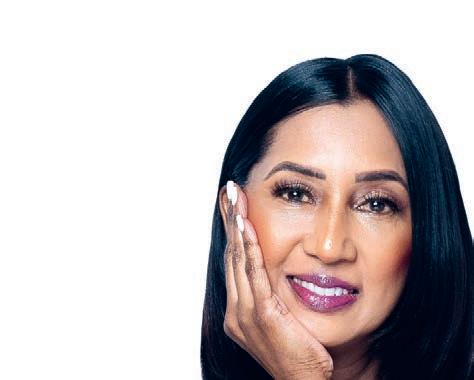

Practically implementing pipeline strategies and following through with real action goes beyond ticking the box, writes GLENDA NEVILL
groundbreaking research into the issue. “Journey to senior leadership: Intersectional narratives from women in the leadership pipeline” by Vamisile Mbatha and Michele Ruiters highlighted particular areas of concern. Mbatha and Ruiters point out that while companies are aware that women’s promotion prospects need to be bolstered, businesses are not careful enough to look at the role personal identities play in achieving those promotions. (For more info see sidebar.)
Koo Govender, CEO of Publicis Groupe Africa, believes that to drive lasting change, companies need to move beyond symbolic gestures and focus on measurable, year-round interventions.
“At Publicis Groupe Africa, we embed initiatives like Coffee with Koo, which creates intentional spaces for dialogue, mentorship and sponsorship. We ensure women have access to leadership, not just visibility,” she says. “Strategies must include clear key performance indicators, milestones for promotions and progress tracking at human resources and exco levels to hold leadership accountable. It’s about creating ecosystems that consistently develop and uplift women, not just celebrate them annually.”
Vamisile Mbatha and Michele Ruiters share four key takeouts from their research “Journey to senior leadership: Intersectional narratives from women in the leadership pipeline”.
1.Organisational culture and leadership
• Organisational practices and leadership behaviours often create barriers for women, even when they possess the necessary skills and experience,
• Lack of transparency in promotion criteria and insufficient support systems (such as sponsorship programmes and flexible work arrangements) further exacerbate the issue.
2.Intersectionality
• Sociodemographic factors, such as gender, race, motherhood and marital status, intersect to create specific challenges for women.
• Research suggests that women may face discrimination due to factors beyond gender, such as race or their status as mothers.
3.Leadership development
• Building strong professional networks and leveraging mentorship and sponsorship are vital for career advancement.




In her career, Govender has founded two organisations dedicated to bridging the gender gap in business. She is the chairperson of Phakama, a women’s academy targeting third-year marketing students to prepare them for corporate life. Govender also launched Female Foundry in South Africa, a global dentsu initiative designed to bridge the gender gap in emerging markets.
She believes populating the leadership pipeline early in women’s careers is essential. “We can’t rely on the same leadership pool cycling through industries. We need to invest early, mentor with purpose and equip young talent with real-world experience from the start,”
• Organisations can play a role by implementing strategies like transparent promotion criteria, unconscious bias training and flexible work arrangements.
4.Emerging issues
• Sponsorship is a key factor in women’s advancement, with mentors actively recommending and supporting their protégés for leadership roles.
• Expectations from senior female leaders can also influence the experiences of women in the pipeline.
“WOMEN WHO ARE INTENTIONALLY SUPPORTED THROUGH SUCCESSION PLANNING, MENTORING AND ONBOARDING PROGRAMMES TEND TO THRIVE AND INFLUENCE ORGANISATIONAL CULTURE POSITIVELY.”
– TSHOLOFELO NKETANE
she says. “This isn’t about a short-term x; it’s about building a legacy. If we don’t cultivate future leaders now, we’ll face leadership gaps later.”
Tsholofelo Nketane, director of executive search at Tuesday Consulting, has seen green shoots develop over the past few years. “We’ve seen growing awareness among boards and executives that diverse leadership drives stronger performance, richer perspectives and improved decision-making. Over the past three to ve years, client briefs have increasingly prioritised the identi cation of women, particularly black, African, Indian and coloured leaders. Investors, employees and customers increasingly demand leadership that re ects the diversity of the communities served,” she says.
Nevertheless, structural barriers remain. “Barriers often include lack of representation in decision-making roles, outdated succession models and corporate cultures that reward visibility over value,” Govender explains.
“Many systems are not designed to accommodate diverse leadership styles or the realities women face in balancing work and home responsibilities. Biases, conscious and unconscious, also play a role in who gets chosen to lead. We must challenge these norms structurally, not just symbolically,” she advises.
Nketane cites further barriers as limited visibility of quali ed candidates within traditional networks, small or infrequent board vacancies, particularly in small to mid-cap companies and biases around “ t” and assumptions about readiness for highly strategic roles.

She says these can be countered with “a targeted executive search approach, market mapping, networks, attending conferences and being part of the industry groups and internal CRM databases to give a comprehensive market insight, trends, quali cation and remuneration benchmark to facilitate decision-making”.
Tsholofelo Nketane, director for executive search at Tuesday Consulting, offers the following five ways to develop a successful leadership pipeline:
• Actively invest in succession planning and pipeline development for future leaders.
• Engage in candid board-level conversations on the business value of diversity and the culture shifts required to sustain it.
• Structure mentorship and sponsorship programmes to prepare high-potential women for leadership.
• Deliver board and executivetraining focused on inclusive decision-making and unconscious bias.
• Ensure succession planning policies that embed diversity targets alongside skill requirements, ensuring sustainable and meaningful representation.
reviewing promotion data by gender and holding leaders accountable for creating inclusive teams. The culture must encourage open conversations, challenge bias and celebrate women’s success stories.”
Nketane says diversity is now often a primary requirement, not an afterthought.
“Increasingly precise targets, particularly for women and African, Indian and coloured leaders, are paired with an expectation of delivering candidates who match both skills and cultural t. Organisations are investing in long-term succession planning and pipeline development, rather than focusing solely on immediate vacancies,” she explains. A growing pool of women with senior-level experience and quali cations allows organisations to match intention with capability, Nketane adds. “Our 2021 research with the 30% Club highlighted that companies with low female board representation are exploring creative avenues to expand talent pipelines, emphasising intentional and rigorous executive search,” she adds.
Practically implementing pipeline strategies and following through with real action goes beyond ticking the box.
“Authenticity is key. If it’s just a checkbox, it won’t drive change,” says Govender. “Companies must be genuinely invested in women’s growth. This means setting targets, tracking progress and creating real consequences for inaction. Equity should be an exco-level and human resources-level priority. And, importantly, leadership must model the behaviour from the top down.”
Govender stresses this is an ongoing journey, one that must be built into the DNA of the business. “That means regular check-ins,
She believes succession planning often mirrors current leadership. “We need to deliberately include women in leadership pipelines and board prep initiatives. That means identifying potential early and giving women the tools, mentorship and visibility needed to be considered for board roles,” Govender says.
Tuesday Consulting monitors placements and maintains engagement with clients and candidates, Nketane says. “Insights show that women who are intentionally supported through succession planning, mentoring and onboarding programmes tend to thrive and in uence organisational culture positively,” she says. At the centre of the issue lies one powerful truth. Govender elucidates: “Men must be allies in this journey. Real transformation requires shared responsibility. Men in leadership need to understand the nuanced challenges women face and be active participants in driving equity. Above all, companies must walk the talk, not just through words, but also through measurable action. That’s how we shift from intent to impact.”
Follow: Koo Govender www.linkedin.com/in/koogovender Tsholofelo Nketane www.linkedin.com/in/tsholofelonketane

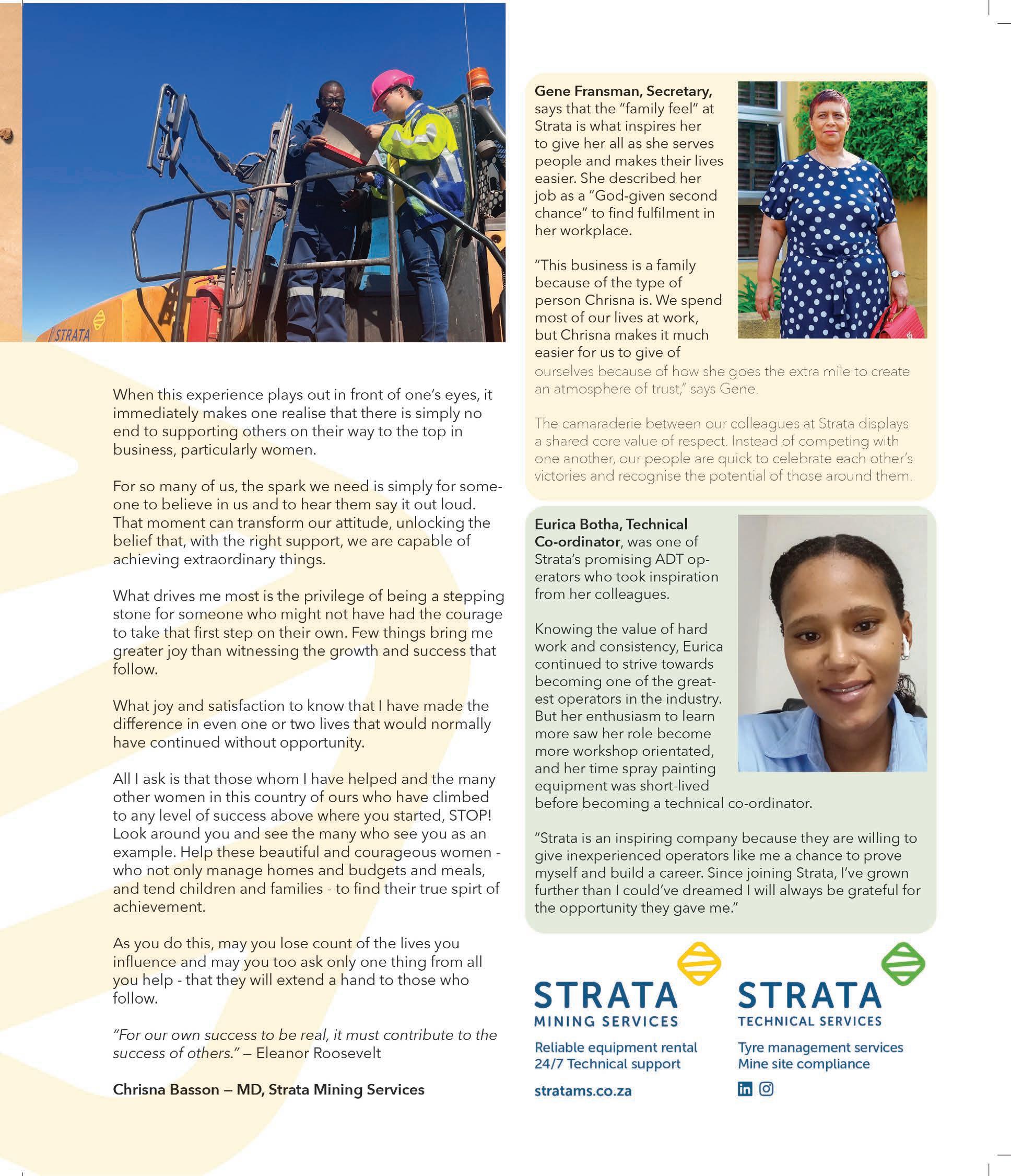
Known as the “motherhood penalty”, the career setbacks women face after having children are well-documented worldwide. Yet a select group of South African companies is redefining the narrative, creating opportunities for growth and inclusion, writes VANESSA ROGERS
Worldwide, the “motherhood penalty” continues to hinder women’s advancement. The World Economic Forum’s Global Gender Gap Report 2024 shows that South African women still earn 23–35 per cent less than men for equivalent work. A Journal of Marriage and Family (2021) study further quanti ed a motherhood wage penalty of around ve per cent per child, revealing long-term nancial impacts.
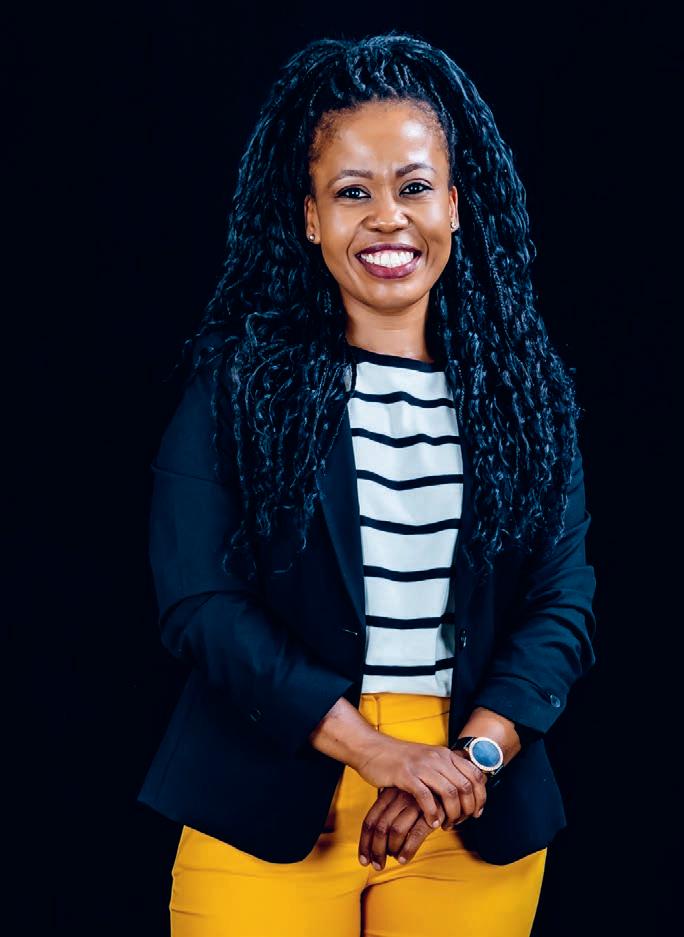
“WHEN I HAD MY DAUGHTER NEARLY SEVEN YEARS AGO, SASOL AND MY IN-HOUSE TEAM WERE FANTASTIC AT PROVIDING EMOTIONAL AND PROFESSIONAL SUPPORT.”
– MATEBELLO MOTLOUNG
More recent ndings, however, suggest the landscape is shifting. A 2025 study published in the Journal of Experimental Social Psychology identi ed a potential “parenthood boost” in which parents were often perceived as more competent and promotable. Yet, crucially, this positive bias was far stronger for white parents than black parents, exposing how race and gender intersect in complex ways.
Closer to home, Henley Business School’s Dr Melissa Carr, in a March 2023 article titled “The Motherhood Penalty”, argues that systemic issues – including insuf cient paternity leave, high childcare costs and entrenched workplace stereotypes – remain key drivers of the penalty in South Africa. For many women, this translates into slower promotions, reduced earnings and an unrelenting juggle between professional ambition and family responsibility.
Despite these challenges, some forward-thinking organisations in South Africa are proving that progress is possible: •Exxaro has developed a gender equality charter to ensure that 50 per cent of
management positions are held by women by 2025.
• Bidvest Group is the only company within the JSE Top 40 to have reached gender parity at board level before 2023.
• Johnson & Johnson is recognised for its family-friendly policies and for investing in mentorship programmes for women-owned businesses.
• T-Systems South Africa is a winner of the Gender Mainstreaming Award for uplifting young women from marginalised backgrounds.
Another company worth a mention is Sasol. Acting senior manager: External Communications and Digital Platforms, Matebello Motloung, shares her experience: “I’m truly blessed to work for an organisation that takes the value of ‘care’ so seriously. When I had my daughter nearly seven years ago, Sasol and my in-house team were fantastic at providing emotional and professional support – from allowing me to work exible hours (in pre-COVID-19 times!) to showering me with baby necessities. I didn’t have to buy baby clothes or diapers for almost two years!”
The paperwork following a birth can feel overwhelming, yet Motloung recalls how Sasol’s HR partner stepped in to add her daughter to the company’s medical aid.
“And, two months before her arrival,” she continues, “my line manager, Alex Anderson, adjusted my hours. He was incredibly accommodating.”
Seven years later, Motloung says she still feels supported: “I’ve never missed a school concert or any major milestone in my daughter’s life because of work. Family is a highlighted aspect of our company culture. The experience has taught me that as a mom – and an ambitious corporate woman –work-life balance is a myth. What I aim for, and am supported in, is work-life harmony.”
Lee Fourie, manager: marketing projects and support at Medihelp, has a different but equally powerful perspective. Over eight years, she has had three children – now
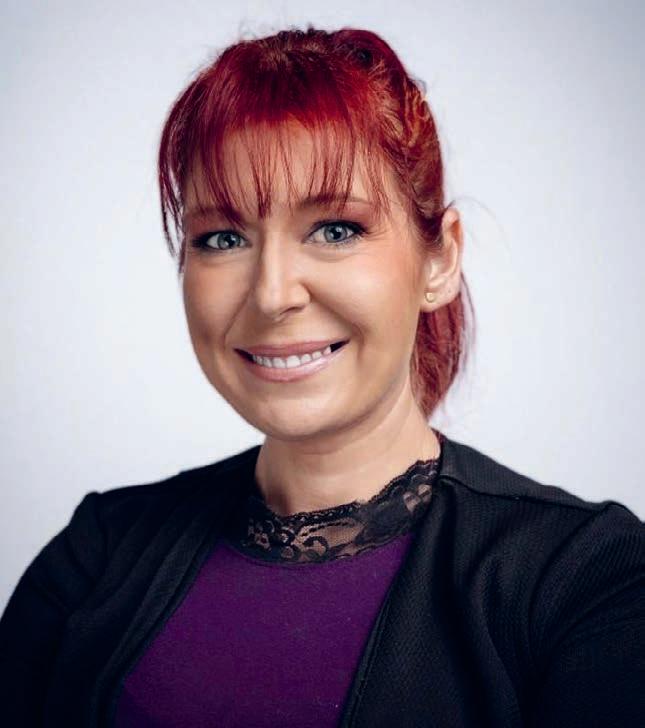
“NEUTRAL PARENTAL LEAVE – EQUALLY AVAILABLE TO MOTHERS AND FATHERS – WOULD BE A GAME-CHANGER IN SOUTH AFRICA.”
– LEE FOURIE
aged seven, three and ten months – while navigating the corporate world.
“In principle, motherhood shouldn’t diminish a woman’s perceived value or trajectory towards leadership. In practice, I’ve felt subtle shifts: hesitation to include a new mom in a high-stakes project, unconscious bias that assumes reduced ambition and quiet sidelining during periods of absence. I’ve had to be deliberate and vocal about staying in the leadership conversation.”
For Fourie, structured support makes the difference between returning ready to lead versus surviving day by day.
“Hybrid work is part of Medihelp’s culture and strategic advantage. It allows us to deliver results without compromising family commitments and ensures no one misses out on strategic projects simply because they work partly from home. Leadership here measures outcomes, not physical presence – and that’s been transformative.”
She acknowledges the effort required to push against stereotypes. “I’ve had to consciously demonstrate that my capacity, creativity and focus have grown since becoming a mom. Medihelp’s support, in both exibility and leadership trust, has enabled me to return not at the same level, but stronger.”
Fourie adds that neutral parental leave –equally available to mothers and fathers –would be a game-changer in South Africa. Until then, informal mentorship and supportive leadership teams remain vital in keeping ambitious mothers in the career pipeline.
What emerges from these accounts is a spectrum: from organisations entrenched in outdated structures to those actively reimagining corporate culture. Research makes it clear that retaining skilled women is not just about fairness – it’s an economic imperative. A 2024 RecruitMyMom study found that 95 per cent of skilled women who take a career break eventually return to work while only ve per cent chose not to return.
However, exibility is a decisive factor in where they land. When it’s absent, attrition rates rise as women migrate to more accommodating employers.
International best practice, according to WorkInfo, combines longer paid parental leave (shared between both parents) with high income replacement (70–100 per cent), supplemented by state subsidies. In South Africa, however, UIF covers just 60 per cent of earnings for four months, partners get only 10 unpaid days, and informal workers lose out entirely.
Follow: Matebello Motloung www.linkedin.com/in/matebello-motloung-mba
Lee Fourie www.linkedin.com/in/lee-fourie-a504498a
Dr Melissa Carr www.linkedin.com/in/dr-melissa-carr-2065735
The result? High turnover, deepened inequality and a persistent wage gap. Companies like Exxaro, Bidvest, Johnson & Johnson, Sasol and Medihelp demonstrate that a deliberate, human-centred approach – focused on exibility, mentorship and equal opportunity – can chip away at the penalty and build momentum for change.
Statistics surrounding the motherhood penalty:
• Go flexibility: skilled career women put a high value on flexibility, and become active jobseekers if that flexibility is removed, reveals HRFuture. This makes corporate attrition pretty high because women end up transitioning to more accommodating employers when a corporate setting is too rigid.
• The juggle is real: close to 60 per cent of mothers prefer hybrid models (84 per cent job hunt otherwise), which correlates with stronger career progression (71 per cent say this has boosted their career trajectory, reduced turnover and resulted in higher engagement). However, companies must adopt a balance of contributions (remote, in-house) to protect against proximity bias, advises RecruitMyMom.
• Mind the gap: World Economic Forum research says becoming a mother adds a penalty of 4–13 per cent on wages, on average, around the globe. In South Africa, women earn between 23–35 per cent less than men for the same work. This gap has unfortunately widened over time, with women in 2021 earning 78 cents for every rand earned by men, compared to 89 cents in 2008, reveals SA-Tied.
Hot flushes, night sweats and fatigue affect one in three South African women – impacting performance, retention and leadership continuity –making menopause-inclusive policies a strategic business imperative, not just a welfare consideration, writes LISA WITEPSKI
Nearly 10 million women in South Africa fall within the menopause age group. says Colleen Larsen, CE of Business Engage. That translates to one in three women nationally experiencing daily symptoms such as fatigue, anxiety and brain fog – all of which can impact their performance.
Women experiencing menopause may display presenteeism and reduced productivity. They may even exit the workforce prematurely. “In South Africa, fty-eight per cent of women experiencing menopause hold executive or managerial positions. This poses a serious risk to leadership continuity, institutional knowledge retention and talent development investment,” Larsen points out.
Despite this, few South African companies have formulated policies to accommodate menopausal women. This is one of the reasons Business Engage launched MenoMove, a platform to raise awareness about the challenges accompanying this life stage. Says Larsen: “Menopause-inclusive policies should be viewed not as welfare measures, but as strategic levers. Companies that support menopausal employees strengthen retention, preserve leadership capacity and foster cultures of empathy and high performance. In a labour market where women are critical drivers of economic growth, this is not simply about avoiding attrition; it’s about securing competitive advantage.”
Larsen says many global pioneers have shown how menopause-inclusive policies have a material impact on performance. In the United Kingdom, for example, the NHS and Channel 4 have both implemented
formal menopause policies with training for managers, exible work arrangements and access to resources. “The Business in the Community Age Toolkit reports that these interventions have led to measurable gains in retention, morale and productivity,” Larsen says. King’s College, meanwhile, developed an inclusive menopause framework that encompasses workplace adjustments, awareness training and peer support networks. Other organisations are calling on Menospace, which provides menopause training in companies. The company encourages the appointment of menopause champions, advises regular risk assessments and facilitates the entrenchment of a culture of openness, “recognising that leadership support and peer advocacy are key to successful outcomes,” Larsen explains.
What can South African rms learn from these international examples? “These initiatives

Dr Nadia Jajbhay
demonstrate a progression from policy awareness to full cultural integration,” Larsen answers. “Rather than viewing policy as the end goal, they highlight the importance of embedding menopause awareness into the fabric of the workplace. The consistent results –higher retention, improved mental wellbeing and stronger engagement—indicate a clear return on investment and set a global standard for strategic response.”
She adds that successful menopause interventions should combine education, exibility, culture change and accountability. Awareness and education are the rst steps. Organisation-wide awareness campaigns, accompanied by targeted manager training, are a must, helping to dismantle stigma and equip
“MENOPAUSE IS A NATURAL, INEVITABLE PHASE OF EVERY WOMAN’S REPRODUCTIVE LIFE. ATTITUDES TOWARDS IT SHOULD BE NORMALISED AND INFORMED RATHER THAN TABOO AND PREJUDICED – IN BROADER SOCIETY AND CORPORATE SETTINGS.” –
DR NADIA JAJBHAY
leaders to respond with empathy. Dr Nadia Jajbhay, a superspecialist radiologist who treats many menopausal women at the Women’s Health and Mammography Institute, agrees that starting dialogue is vital. “Many of the common menopause symptoms inevitably impact work or how we relate to colleagues. It is important that we discuss these issues in the workplace,” she says. “More than this, menopause is a natural, inevitable phase of every woman’s reproductive life. Attitudes towards it should be normalised and informed rather than taboo and prejudiced – in broader society and corporate settings.”
Larsen observes that the appointment of menopause champions can help here, establishing psychological safety by leading dialogue and encouraging it by hosting regular MenoConversations that contribute to a supportive and inclusive culture. These structures are critical because without psychological safety, women will not feel able to use the support available, even where policies are in place.
Dr Jajbhay adds that it may be necessary to adapt the workplace physically. For example, women should be able to access spaces where they can pause and reset their moods. Ideally, they should also be able to work remotely so they can take a break when they feel exhausted. It also helps if workplaces are equipped to help them deal with physical symptoms. For example, an air-conditioned of ce (or even a fan) can soothe the discomfort caused by hot ushes. Larsen agrees: “Tailored work arrangements demonstrate respect for employee wellbeing and enable continued contribution without compromise.”
Organisations are, furthermore, encouraged to look at the health bene ts and resources provided. “Healthcare coverage should explicitly include menopause-related support, such as hormone therapy, counselling and mental health resources,” Larsen says. Some employees may prefer to access telehealth platforms due to the privacy and convenience afforded, while toolkits, webinars and expert sessions are also valuable because they allow women to learn more about the menopause process and how to manage it.
Finally, it’s vital that menopause is embedded within the company’s diversity, equity and inclusion strategy. “Viewing menopause through a diversity lens and framing it as a belonging imperative ensures leadership buy-in and demonstrates a long-term commitment to employee wellbeing across life stages,” Larsen says. This positioning has signi cant bene ts:
it strengthens the employer value proposition for a broader demographic, including younger generations who prioritise inclusivity in the workplace. So, a company’s approach to menopause can become a long-term business differentiator.
Standard Bank’s insurance and asset management business unit has certainly found that being menopause-inclusive carries both cultural and commercial bene ts.
Amelia Beattie, head of business ef ciency, property and sustainable impact, explains that the company takes a holistic approach to supporting women through menopause, making changes to both physical spaces and workplace culture. For example, the introduction of dedicated comfort rooms – private, restful spaces designed for moments when women feel the need to take a break and regroup – is a tangible demonstration of the company’s belief that care and dignity should be part of the workday, Beattie says. The company is equally committed to providing emotional support and open dialogue. By encouraging open conversations in psychologically safe spaces, it has normalised a topic that “should not be a taboo topic, but a normal life stage”. The company is also working towards making leaders and managers aware of the importance of empathy, understanding and proactive support.
These measures have led to the development of a culture “where women feel seen, heard and empowered to continue their professional journeys without stigma or isolation”, Beattie says.
The company has experienced real bene ts – both cultural and commercial –as a result “Culturally, our efforts help build trust and improve psychological safety, reinforcing our commitment to gender equity and sustainable impact. Commercially, initiatives like tailored nancial wellness offerings and inclusive policies have the potential to deepen employee engagement and customer loyalty.”
Beattie says by supporting women through all life stages, the company is making strides towards retaining talent, cultivating leadership and resilience across the organisation. “By acknowledging menopause in company
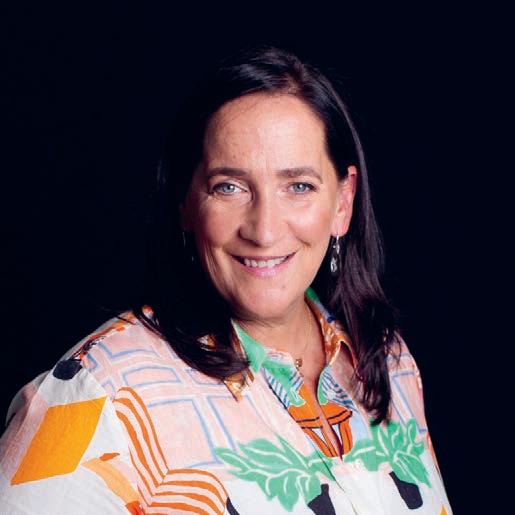
“BY ACKNOWLEDGING MENOPAUSE IN COMPANY FRAMEWORKS, WE FOSTER A CULTURE OF EMPATHY AND INCLUSION. IT SENDS A POWERFUL MESSAGE THAT WE VALUE OUR EMPLOYEES HOLISTICALLY – NOT JUST FOR THEIR OUTPUT, BUT ALSO THEIR LIVED EXPERIENCES.”
– AMELIA BEATTIE
frameworks, we foster a culture of empathy and inclusion. It sends a powerful message that we value our employees holistically –not just for their output, but also their lived experiences.”
Larsen agrees: “Menopause-inclusive policies are no longer optional. They represent a critical, future-focused response to demographic change, leadership risk and the evolving expectations of a diverse workforce. Companies that act early will secure a strategic edge in talent attraction, retention and innovation. The cost of inaction is high: lost productivity, disrupted succession pipelines and diminished diversity in leadership. However, the return on strategic action is even higher – measured in performance, resilience and sustainable growth,” she concludes.
Follow: Dr Nadia Jajbhay www.linkedin.com/in/dr-nadia-j-390535135 Amelia Beattie www.linkedin.com/in/theameliabeattie
Gender-based violence and harassment costs South African organisations billions, but what is the economic impact for survivors? And, what action and guard rails should organisations introduce to protect them?
THANDO PATO unpacks the expert opnions
Gender-based violence and harassment (GBVH) in the workplace made national headlines earlier this year after a sexual harassment complaint by Andiswa Mengo, a judge’s secretary, against Eastern Cape Judge President Selby Mbenenge. While the case shone a spotlight on GBV in the workplace – rather than in domestic settings – it also exposed the challenges complainants face when seeking justice against an alleged perpetrator.
Women are particularly vulnerable to workplace GBVH. Results from the 2022 Deloitte report, Women @Work 2022: A global outlook, which includes South Africa, show that globally, nearly 47 per cent of female respondents were worried about their personal safety at work or when travelling to work. Among LGBTQ+ women and disabled women, the stats are even higher – 53 and 66 per cent respectively. Nearly 1 in 10 respondents indicated that
they have been harassed by a colleague, while 16 per cent said they had been harassed by customers or clients.
“GBVH in the workplace leaves a deep and lasting impact, not only on survivors’ careers, but also on their con dence, health and long-term economic security,” says Tandi Nzimande, CEO of the GBVF Response Fund.
Namuma Mulindi, policy development and advocacy specialist at Sonke Gender Justice, says that in professional settings, GBVH mostly manifests as sexual harassment involving behaviours such as:
• Verbal abuse.
• Lewd comments.
• Unwanted sexual advances.
• Inappropriate physical contact.

Coercion and bullying that includes threats or demands, or suggestions of sexual favours in exchange for work or promotion.
Nzimande de nes workplace GBVH as: “Any inappropriate and unwanted behaviour aimed at gaining power or dominance that violates rights, creates a hostile environment or acts as a barrier to equity in the workplace.”
GBVH, she says, often goes unseen, taking place behind closed doors or in settings where there are no witnesses.
Perpetrators, she adds, may use sophisticated
psychological tactics against victims, such as excluding them from advancement opportunities or deliberately undermining their position or knowledge, directly affecting their career mobility.
For many victims, GBVH is not a single traumatic incident, but a pattern of degrading and controlling behaviour.
Nzimande says GBVH thrives in professional environments where verbal abuse – in the form of sexual innuendo or gender discrimination – is dismissed as “banter” or “part of the job”. This is particularly prevalent in male-dominated sectors of the economy.
With the rise of technology, the increase in remote work and the expansion of professional spaces, the de nition of “workplace” needs to be broadened and rede ned, says Nzimande.
“While the workplace refers to a physical space, it could also include a virtual workplace, virtual meetings, social media or any other online platform where colleagues interact.
It may also include employer-provided transport and employer-linked events such as conferences or business trips.”
Both Mulindi and Nzimande agree that workplace GBVH often derails careers in subtle, cumulative ways. Survivors may step back from leadership opportunities, avoid high-visibility projects or leave their profession entirely.
“The trauma erodes self-belief, and many women aren’t dismissed outright – the erosion comes through missed work, stalled promotion and reduced visibility. Economic exclusion, reduced earnings and diminished access to opportunity can push survivors into lower status and less secure roles, entrenching cycles of vulnerability,” explains Nzimande.
Mulindi expands on this, saying victims who refuse to bend the knee can face immediate career and nancial consequences. “Where women refuse to give ‘sex for jobs’, they face
“SURVIVORS OFTEN SUFFER HEIGHTENED ANXIETY AND LACK OF SELF-CONFIDENCE. SOME RESIGN WITHOUT ALTERNATIVE INCOME – THAT’S THE LEVEL OF DISTRESS CAUSED.” – NAMUMA MULINDI
a direct lack of opportunity for development. Even when already employed, the trauma can affect performance, creating career gaps that make re-entry dif cult.”
For those who remain in toxic workplaces, the emotional toll – anxiety, depression, burnout – can last for years, she adds. “Survivors often suffer heightened anxiety and lack of self-con dence. Some resign without alternative income – that’s the level of distress caused. Such cultures also have ripple effects; bystanders who witness harassment may experience helplessness or fear, leading to turnover across entire teams.”
For disabled and LGBTQ+ employees, the risk of GBVH is higher, says Nzimande. “LGBTQ+ employees face misgendering, exclusion and heightened risk of harassment. Women with disabilities may encounter physical barriers to reporting, making them more vulnerable.”
This, she says, means human resources and company policies must go beyond “one-size- ts-all” protections and instead embed intersectional awareness into every stage of prevention and response.
Both women stress that for organisations to tackle GBVH and support all survivors successfully, whistleblowing processes must be transformed into grievance processes that enforce accountability and ensure con dentiality.
“Con dential, accessible reporting options, intersectional support, clear accountability and survivor choice must guide the process. Organisations
need to consider paid leave, exible work, anonymous reporting and cross-departmental GBV response teams – not just HR-owned processes,” explains Nzimande.
Mulindi adds: “The fewer people a survivor must tell their story to, the better. Designate one investigator, offer psychosocial support from the moment of disclosure and create whistleblower mechanisms so bystanders can safely report misconduct.”
Legislatively, South Africa has strong frameworks, including the International Labour Organization (ILO) Convention 190, the Employment Equity Act and the Code of Good Practice on the Prevention of Harassment. However, enforcement is challenging, leaving victims vulnerable.
Globally, the International Labour Organization (ILO) estimates that gender-based violence and harassment (GBVH) costs economies billions annually in lost productivity, absenteeism and staff turnover. A 2022 ILO report, Experiences of Violence and Harassment at Work: A Global First Survey, indicated that over 22 per cent (743 million) of the world’s workforce had experienced some form of violence or harassment at work during their working life.
The cost of inaction against GBVH for organisations is not just moral; it’s financial and strategic, says Tandi Nzimande, CEO, The GVBF Response Fund. “In some contexts, staff lose up to eleven workdays per year due to GBVH, costing companies the equivalent of three to nine per cent of their payroll. GBVH also undermines retention, innovation and leadership diversity.”
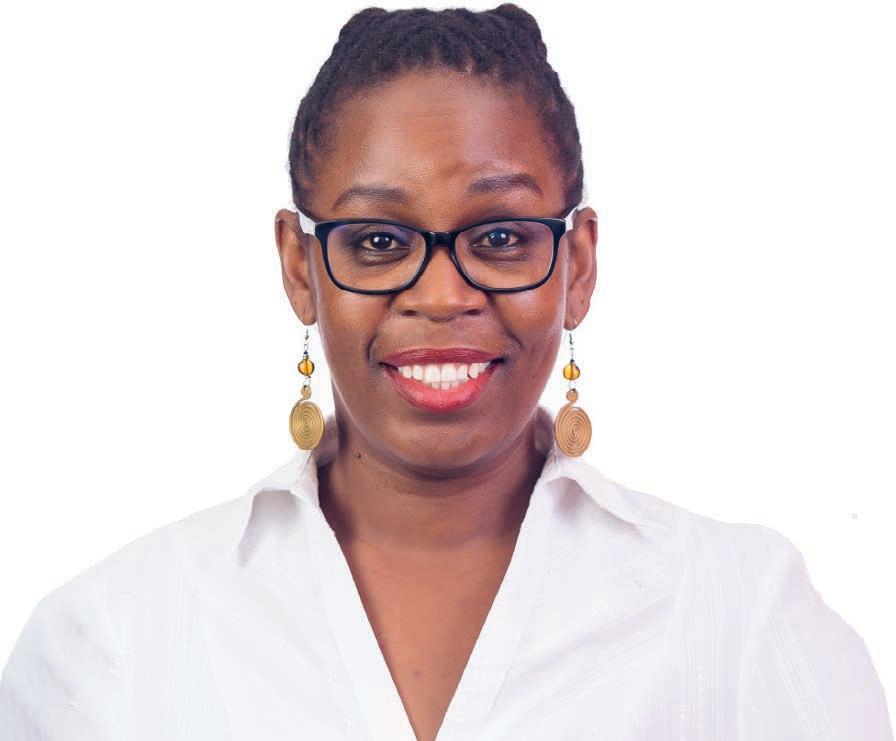
Nzimande says litigation over harassment damages a company’s reputation, prompting even unaffected employees to leave. And, in terms of innovation, unsafe environments suppress creativity.
Eradicating a toxic workplace culture requires action and buy-in from senior leaders, and change starts at the top. Nzimande says boards and CEOs must:
• Champion anti-GBV policies.
• Integrate GBV metrics into corporate scorecards.
• Model gender-sensitive behaviour. “HR should not be subordinate to senior management. Without autonomy, it cannot enforce policies without bias,” says Mulindi.
The ght against workplace GBV demands leaders go beyond compliance, embedding survivor support and accountability into an organisation’s DNA. “Freedom from violence is a human right. Safe workplaces are not a perk; they are a prerequisite for women to thrive and stay in the workforce,” concludes Nzimande.
“Fearful employees are less likely to share ideas or take risks – a direct hit to productivity and competitiveness.”
The GBVF Response Fund, in partnership with The Presidency, the Johannesburg Stock Exchange and international development organisations, announced the formation of the Private Sector Coalition Against Gender-based Violence and Harassment in the Workplace (the PSC) in 2024.
The goal of the PSC is to develop private sector standards and best practice protocols and to integrate preventive measures, business practices, supply chains and communities through a three-step framework aligned to legislation.
The three steps include prevention, protection and enforcement frameworks to tackle GBVH.
To learn more, contribute and be part of the PSC, companies are encouraged to reach out to the GBVF Response Fund on their website www. gbvfresponsefund1.org or email info@gbvfresponsefund1.org.
Follow: Tandi Nzimande www.linkedin.com/in/tandi-nzimande-20b4744 www.linkedin.com/in/namuma-mulindi-93311925
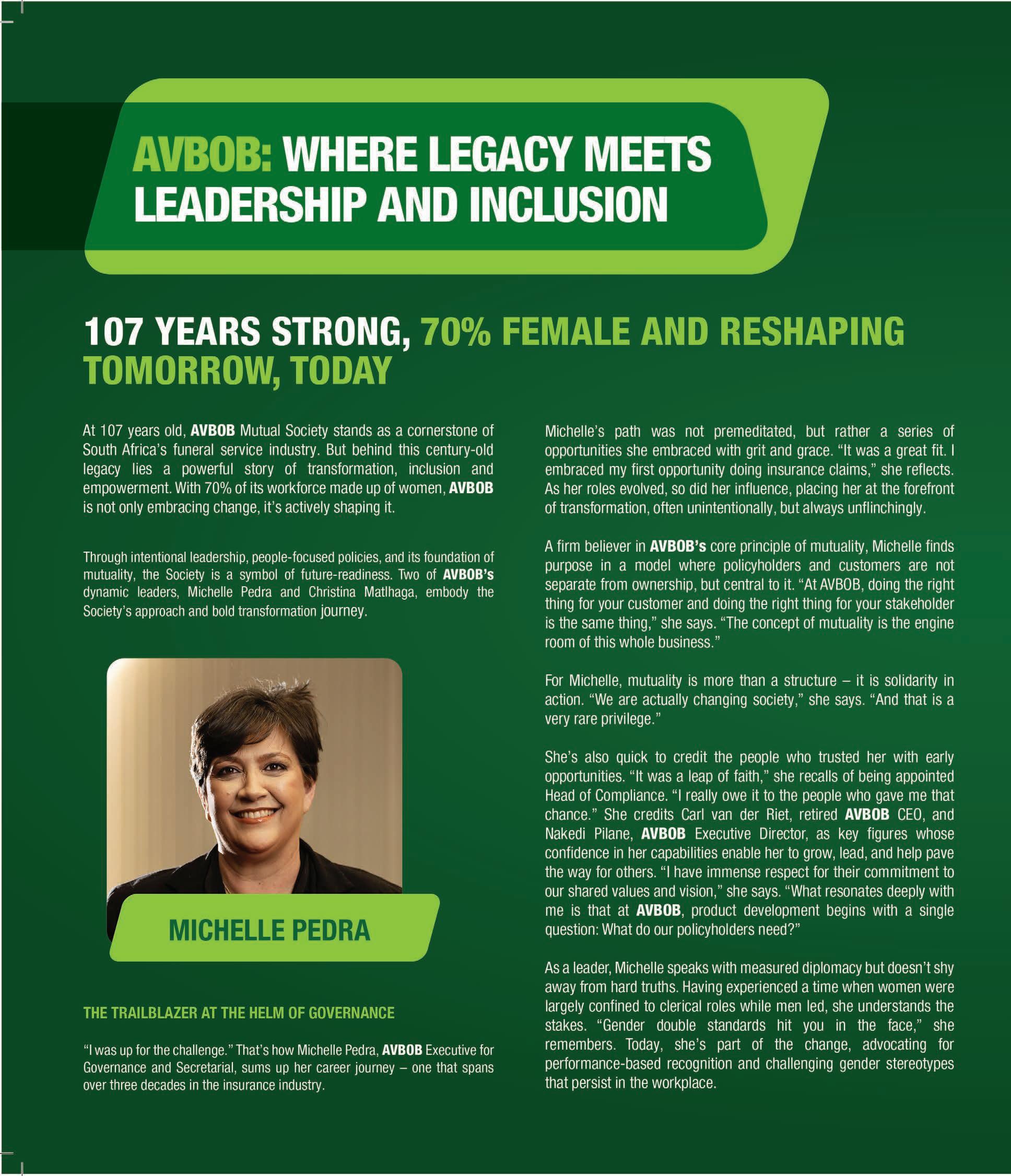

In the wake of the fourth industrial revolution, women across Africa are not merely adapting to digital disruption; they are orchestrating it, building the infrastructure of tomorrow from the ground up, writes BRENDON PETERSEN
Recent data reveals stark gender disparities in Africa’s start-up ecosystem: only three per cent of venture capital goes to female-founded African start-ups, according to a 2022 Quartz Africa analysis, and in 2024, African female start-up founders raised just $48-million while male founders raised over $2-billion. However, behind these statistics lies a more complex narrative of quiet revolution and the profound ways women are leveraging digital tools to rewrite the rules of economic participation.
In Kenya’s informal settlements, women organise chamas (traditional savings circles) using mobile money platforms that have transformed communal banking into sophisticated nancial networks. Across the continent, women are not waiting for permission to innovate; they are creating the digital infrastructure that will de ne Africa’s economic future.
This transformation represents a fundamental shift in how technology intersects with gender, power and economic agency, particularly in communities that formal nancial systems have long overlooked.
“For many African women, entrepreneurship isn’t just about income; it’s about reclaiming power in systems that were never built for them,” explains Lucy Muigai, CEO of B Lab Africa, whose work spans the continent’s diverse entrepreneurial ecosystems. “It’s about having the autonomy
to make choices, the safety to say no and the dignity to live without fear or dependence.”
Muigai’s perspective emerges from witnessing grassroots innovation that rarely makes international headlines. Based in Nairobi, but working across Africa’s 54 countries, she has observed how women reshape economic systems through digital tools. “One of the most overlooked innovations is the widespread use of chamas or table banking,” she notes. “These networks are nancing everything from micro enterprises to school fees, and they’re incredibly effective yet rarely acknowledged in mainstream entrepreneurship narratives.”
The fourth industrial revolution (4IR), with its emphasis on arti cial intelligence, automation and digital connectivity, initially appeared to threaten traditional employment patterns. However, for women who have historically operated outside formal economic structures, these technologies represent unprecedented opportunities for inclusion rather than displacement.
Kgomotso Mannya, chief marketing of cer for Samsung Africa, brings a corporate perspective to this transformation. With nearly two decades in marketing leadership across beauty, technology and consumer goods sectors, she understands both the promise and challenges of digital inclusion.
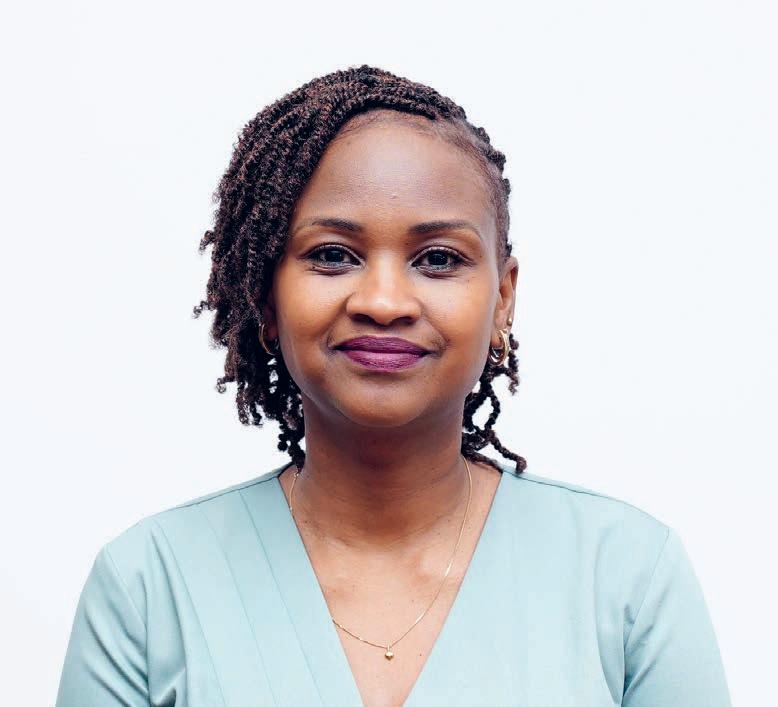
“The fourth industrial revolution is reshaping everything. In the African context, its impact is not evenly felt,” she observes. “When we look at 4IR through a gendered lens, the

“WHEN WE LOOK AT 4IR THROUGH A GENDERED LENS, THE DIGITAL DIVIDE BECOMES MORE THAN JUST A TECH ISSUE (IT’S A SOCIAL AND ECONOMIC ONE).”
– KGOMOTSO MANNYA
digital divide becomes more than just a tech issue (it’s a social and economic one).”
Mannya recognises that closing the digital divide requires more than distributing devices; it demands a fundamental rethinking of how technology serves diverse communities.
“LIBERATION FOR AFRICAN WOMEN IS WHEN AGENCY IS THE NORM, NOT THE EXCEPTION. WHEN WOMEN DON’T HAVE TO FIGHT FOR SPACE BECAUSE THE WORLD HAS BEEN RESHAPED WITH THEM AT THE CENTRE.”– LUCY MUIGAI
Lucy Muigai

“For many African women, access to digital tools and skills is still limited by deep-rooted structural barriers: unequal education, lack of internet access, affordability gaps and cultural norms that discourage women from pursuing careers in STEM (science, technology, engineering and mathematics).” Yet she sees tremendous opportunity. “I also see 4IR as an incredible opportunity to leapfrog barriers if we’re deliberate. For example, mobile-based learning platforms can bring STEM education to young girls in remote areas.”
Mannya’s role at Samsung places her at the intersection of technology access and market development, where she witnesses the human stories behind digital transformation. “What keeps me grounded are the moments when I see technology quietly changing lives in ways that do not make headlines, but matter deeply,” she explains. “It is the young entrepreneur using their phone and a simple app to start a business from their kitchen. It is the student in a rural community who can now attend a virtual class that would have been impossible a few years ago.”
The logistics sector, traditionally one of the least gender-diverse industries, illustrates these possibilities. Kimberley Taylor founded Loop in her early twenties, building what has become a platform powering millions of deliveries monthly across South Africa.
“Tech often assumes a perfect user. Someone uent in English, digitally con dent, sitting at a desk,” Taylor explains. “However, our users are on the road, in warehouses, solving real-world problems on the y. So, we build from the ground up. We spend time with drivers. We sit in dispatch rooms. We don’t design for edge cases, we design for real life.”
This user-centric approach represents more than good product design; it embodies a different philosophy about technology’s role in society.
When women drive digital transformation, they prioritise different outcomes: community resilience over rapid scaling, inclusive access
over pro t maximisation, sustainable growth over venture capital metrics. These priorities are reshaping how success is de ned in Africa’s digital economy.
However, systemic challenges persist. Access to funding remains a critical barrier, while digital literacy gaps continue to limit women’s full participation in the digital economy.
Taylor believes the solution requires reimagining the entire innovation ecosystem. “I’d embed mentorship into every layer of the ecosystem. Not the coffee-chat kind, but the kind where someone picks up the phone and vouches for you.” She also challenges investors to look beyond surface presentations: “Too often, we reward polish over substance. I want to see more bets placed on gritty builders who know the pain they are solving.”
“Closing the gender gap in technology starts with acknowledging that talent is universal, but access and opportunity are not,” Mannya emphasises. “We need to create environments where women are not only welcomed, but actively supported to thrive, from the classroom to the boardroom.” She believes this requires challenging fundamental assumptions about who belongs in tech spaces and ensuring women have in uence, not just visibility.
Educational initiatives like Samsung’s Solve for Tomorrow programme demonstrate this approach in practice, while organisations like B Lab Africa work to embed gender-responsive approaches into policy design and funding criteria.
The conversation itself is evolving. Rather than focusing solely on women’s exclusion
from technology, leaders are increasingly highlighting women’s innovations and their transformative impact on digital ecosystems.
“I wish more people understood that Kenya isn’t just a hub of innovation; it’s a hub of inclusive, homegrown and woman-led innovation,” Muigai re ects. “Kenyan women are not waiting for permission to innovate. They’re launching climate-resilient agribusinesses, designing inclusive nance tools, running arti cial intelligence-powered health platforms and leading in policy and investment spaces.”
This transformation extends beyond individual countries. Across francophone, lusophone and anglophone Africa, women are building cross-border networks that strengthen collective power and share innovations across linguistic and cultural boundaries. Mobile money systems pioneered in East Africa are being adapted for West African markets. Fintech solutions developed in South Africa are nding applications across the continent.
The ultimate vision extends beyond economic inclusion to comprehensive liberation. As Muigai articulates it: “Liberation for African women is when agency is the norm, not the exception. When women don’t have to ght for space because the world has been reshaped with them at the centre.”
This digital revolution, led quietly but persistently by women across the continent, represents more than technological adoption or economic opportunity. It embodies a fundamental reimagining of power, agency and possibility in African societies. As these women continue building the infrastructure of tomorrow, they are not just participating in the fourth industrial revolution; they are de ning what it means for Africa’s future.
The transformation is already underway, one mobile transaction, one logistics platform, one chama at a time. The question is not whether women will play a role in Africa’s digital future, but how quickly the rest of the world will recognise the revolution they are already leading.
Follow: Kimberley Taylor www.linkedin.com/in/kimberley-taylor-loop Lucy Muigai www.linkedin.com/in/lucymuigai Kgomotso Mannya www.linkedin.com/in/kgomotso-mannya-9241032b
Women leaders at N EXIA SAB&T underscore the company’s commitment to inclusivity and are a testament to the success of its people-centric approach
The story of audit, tax and advisory service provider Nexia SAB&T – now in its 31st year of operation – is de ned by transformation, trust and a drive to deliver measurable value to clients and communities. The company continues to elevate its brand purpose through its 2025 The People Behind the Numbers campaign, which highlights the human insight, care and expertise that underpins its work. It recognises that behind every solution offered is a dedicated professional whose focus is not only technical accuracy, but also long-term impact.
Ayisha Zange, chairperson of Nexia SAB&T executive committee (exco), plays an in uential role in shaping the organisation’s global voice. As part of the Nexia international’s Diversity, Equity and Inclusion Taskforce and the Environmental, Social and Governance Advisory Forum, she contributes to policies that drive inclusive leadership, sustainability and systemic transformation. Her strong focus on governance and accountability ensures Nexia SAB&T leads with integrity and inclusion at its core.
Zulpha Abrams is a distinguished leader in internal audit, renowned for her trailblazing contributions to the profession. She made history as the rst professional in South Africa to be recognised by the Institute of Internal Auditors South Africa (IIA SA) as an external quality assurance reviewer, a testament to her exceptional competence, independence and unwavering commitment to professional auditing standards.
As a director at Nexia SAB&T, Zulpha serves on the exco and chairs the Risk and Ethics Monitoring Committee, where she plays a pivotal role in the rm’s governance and strategic oversight. With over 30 years of experience spanning public and private sector environments nationally and internationally, she brings unmatched expertise and insight to every engagement.
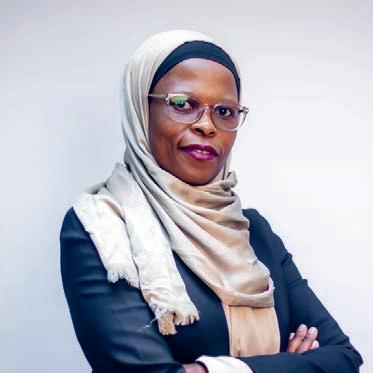
A chartered accountant by quali cation, Zange also leads the company’s environmental, social and governance practice and, in addition, serves as a director of the SAB&T Foundation, where she helps shape its philanthropic vision and community development initiatives. Her leadership and impact were recently recognised when she was named a nalist in the 2025 Nedbank Top Empowerment Awards, re ecting her commitment to empowerment, transformation and creating meaningful social change. Zange also sits on the board of various nonpro t organisations.
A chartered accountant and certi ed internal auditor CIA, her accolades include the national Internal Auditor of the Year award from the Institute of Municipal Finance Of cers. She pioneered the rst South African Institute of Chartered Accountants trainee accountant programme in local government and has served on numerous audit committees across government, education and nonpro t sectors, consistently driving excellence and innovation in audit practice.
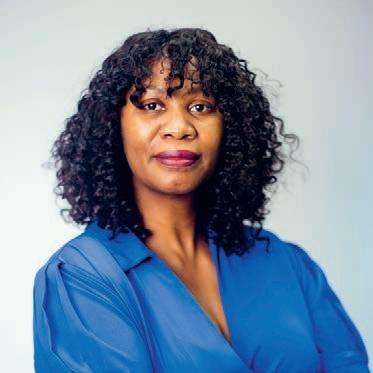
external audit division. She began her career by completing her articles at Ernst & Young before joining Nexia SAB&T in 2005 as an assistant manager. Her dedication and expertise have seen her rise through the ranks to become one of the rm’s respected leaders.
Madlingozi’s career spans public and private sectors, with extensive involvement in external audits, compliance reviews, nancial management and regulatory advisory. Her diverse portfolio includes leading engagements for organisations across healthcare, construction, retail, property, hospitality, nonpro ts and retirement funds.

Her leadership style is centred on resource planning, guiding teams to deliver quality audit outcomes, and building strong client relationships. Madlingozi’s skills extend to broad-based, black economic empowerment consulting, due diligence reviews and project management.
Yoliswa Madlingozi, Nexia SAB&T director, has two decades of experience in auditing and nancial management. She is a seasoned professional and a director in Nexia SAB&T’s
Passionate about driving excellence and accountability, she represents the rm’s ethos of being The People Behind the Numbers, combining technical expertise with a peoplerst approach. Madlingozi is an inspiring presence at Nexia SAB&T, contributing to the rm’s growth and the success of its clients.
Busisiwe Tshabalala is a dynamic leader in internal audit and nance and has been with the rm for 13 years. She is a 2025 graduate of the Management Development Programme offered by the International Women’s Forum SA through partnership with the Finance and Accounting Services Sector Education and Training Authority (FASSET) and Duke, and a certi ed internal auditor.
Tshabalala has earned multiple accolades, including Employee of the Year, Manager of the Year and Ambassador of the Year. She serves as one of the ambassadors of The People Behind the Numbers campaign, where her story highlights the talent and dedication that drive the profession.
She was also featured in the We are HERstory in the Making campaign, launched by Nexia SAB&T to shine a spotlight on the pivotal role women play in the organisation and industry. Tshabalala is a member of Toastmasters International, where she intends to continuously improve her public speaking, communication and leadership skills to help contribute to her effectiveness as a manager.
Her role in Nexia SAB&T’s exco signals both leadership recognition and strategic in uence within the rm. Her contributions span governance, nancial oversight, risk management and operational excellence, while also championing innovation, transformation and talent development. Moreover, her presence as a woman on the exco brings a vital dimension of inclusive leadership.
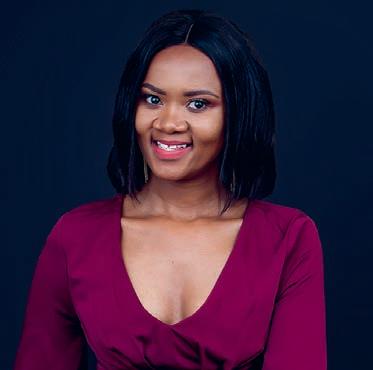
She was recently a featured keynote speaker at the Women in Business Conference hosted by Yobuningi, where she spoke about mentorship and coaching and the role Nexia SAB&T plays with peers and industry leaders. Her achievements re ect a strong commitment to professional excellence, leadership and inspiring others in the eld of internal audit.
A seasoned professional, Caroline Chigora is a chartered accountant and director in the external audit division at Nexia SAB&T with a proven record of delivering high-quality external audit, compliance and advisory engagements. Her extensive background in auditing across public and private entities has equipped her with a deep understanding of governance structures, risk management frameworks and internal control environments, thereby providing valuable insight to her clients.

Her leadership ensures that EBS provides practical, results-driven solutions that enable businesses to navigate challenges, unlock opportunities and build resilience across diverse industries. By fostering this impact, she helps maintain Nexia SAB&T’s long-standing dedication to empowering businesses and contributing to South Africa’s broader economic development.
By occupying this seat, she not only in uences the trajectory of the rm, but also paves the way for greater gender equity in leadership, inspiring future generations of women leaders.
As an SAB&T Foundation director, Chigora contributes to the organisation’s societal impact and philanthropic efforts, aligned with its core values around empowerment and community development. In this capacity, she plays a key role in translating corporate purpose into tangible action, ensuring the organisation’s resources and in uence are leveraged to address pressing social challenges.
Her leadership helps drive initiatives that promote education, economic inclusion and sustainability, thereby creating long-term value for communities and the business.
Jana Marais is the head of the Entrepreneurial Business Services (EBS) service line at Nexia SAB&T. Established in 1994 as the rm’s very rst service line, EBS has remained central to the rm’s identity by supporting entrepreneurs and small businesses with specialised nancial management and business advisory services. Under Marais’s guidance, the service line continues to evolve to meet the changing needs of the business landscape while staying true to its founding purpose of driving entrepreneurship and sustainable growth.

A registered member of the South African Institute of Professional Accountants, Marais brings professional expertise and a strong commitment to client success.
Nexia SAB&T continually invests in the development of its people, integrating technical training with leadership, communication and digital skills to future-proof its teams and ensure enduring excellence.
Known for its entrepreneurial air and people-centred approach, Nexia SAB&T is committed to accessible and ethical service delivery as re ected in the work of the SAB&T Foundation, which supports entrepreneurial development and poverty alleviation through sustainable, high-impact projects. These initiatives form part of the company’s broader environmental, social and governance priorities, where it actively contributes to building a more inclusive and resilient economy.
The company remains committed to rede ning what it means to be a professional services rm in South Africa and is proud of the work it undertakes, the people who do it, and the legacy it continues to build with clients and communities.
Fintech innovation is disrupting South Africa’s traditional banking barriers –empowering women small, medium and micro enterprise owners, bridging structural gaps and reshaping access to finance. VANESSA ROGERS explores how new models are unlocking growth and independence
For many South Africans, particularly women and small business owners, accessing nance remains one of the most signi cant obstacles to growth and independence. Traditional banking models have long excluded large portions of the population, either through high fees, complex documentation requirements or limited reach in rural areas. The consequences are clear: sti ed entrepreneurship, persistent gender inequality and a missed opportunity for broader economic growth.
A wave of ntech innovation, however, is rewriting the rules. Digital tools and alternative banking models are making it easier for people to manage money, build credit histories and access funding. For women entrepreneurs, these solutions are unlocking opportunities that traditional banking has historically kept out of reach.
Nobesuthu Ndlovu, director of Old Mutual Corporate’s SME (small, medium enterprise) division, knows these barriers personally. “I am the classic example of a former SME owner with strong entrepreneurial skills, who ended up in corporate because of the challenges inherent in running a business in South Africa,” she explains.
“I previously ran a stand-alone retail store that partnered with brands like Foschini. Orders were coming in consistently, but securing the funding to ful l them was a constant struggle. My business was thriving in every other way, but without that essential funding, growth was impossible.”
Old Mutual responded by creating SMEgo, a platform available via smartphone app and web portal, designed to help SMEs access essential business services.
From investor funding to HR management, billing
• TymeBank: fee-free digital banking and microloans; ideal for underserved populations.
• Yoco: mobile point-of-sale tools; perfect for small businesses and informal traders.
• Mama Money: low-cost mobile transfers for migrant workers.
• MobiCred: online credit with manageable repayment options.
• RainFin: peer-to-peer lending, connecting borrowers directly with investors.
and legal documents, SMEgo supports SMEs to manage operations ef ciently and focus on growth. “The platform streamlines work ows, saving owners increments of the one resource they have the least of: time,” says Ndlovu.






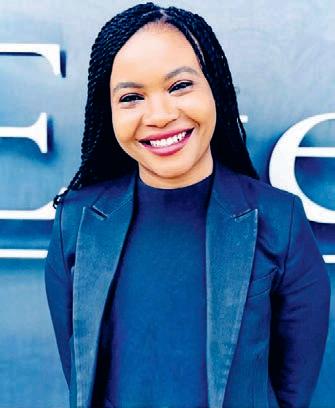
quintile, compared to 73 per cent of white South Africans. Government funding vehicles are underutilised, and banks have maintained a funding level of just ve per cent since 2001. SMEs are primarily funded by family and friends,” Lehohla said at the launch of Old Mutual’s SMEgo Pitchathon earlier this year. He added that the COVID-19 funding crisis, where only R17-billion of the allocated R200-billion reached businesses, is a stark example of systemic failure.
Fintech solutions are increasingly bridging these gaps. A TymeBank/Innovate Finance video on the “Power of Financial Inclusion in South Africa” highlights the story of Sandra Leutle Losing her mother at 17, she learned nancial independence early. “I realised you’re actually paying a lot just to save with a bank. The good thing about my bank is that I can save without exorbitant fees, giving me full control over my money.”
Digital banking entrants, such as TymeBank, with fee-free accounts and accessible services, are particularly suited for rst-time customers and low-income earners.
According to the Banking Association of South Africa, SMEs – particularly small and informal ones – make up 91 per cent of formalised businesses, provide employment to over 60 per cent of the labour force and contribute up to 34 per cent of the country’s gross domestic product. Yet, research shows that 70–80 per cent of dynamic SMEs fail within their rst ve years. Pali Lehohla, former statistician-general and founder of the Pan-African Institute for Evidence, links this directly to a chronic funding crisis.






“Only 13.7 per cent of black South Africans are in the top income

Informal traders face multiple obstacles, from distance to bank branches and ATMs to poor connectivity and low nancial literacy. A Journal of Risk and Financial Management study reports that some communities are as far as 80km from the nearest nancial institution. Hidden fees and mistrust of nancial institutions discourage many women from opening accounts, while community savings initiatives, such as stokvels and rotating savings and credit associations, often feel safer and more familiar. Fintech innovation is more than convenience; it is a critical lever for empowerment. By lowering barriers, providing tools and facilitating access to funding, digital nancial solutions are helping women entrepreneurs take control of their businesses, create jobs and strengthen South Africa’s economy. Closing the exclusion gap is not just a moral imperative; it is a strategic economic priority – one that could rede ne growth for years to come.
Follow: Nobesuthu Ndlovu www.linkedin.com/in/nobesuthu-ndlovu-780a0183 Sandra Leutle www.linkedin.com/in/sandraleutle
MATSIE MPSHE, founder and MD at The Transformation Firm and founder of the SMME Empowerment Summit, shares why corporates must partner with SMMEs, especially women-led businesses, to drive sustainable growth and transformation
South Africa has over 2.5 million small, medium and micro enterprises (SMMEs) – employing nearly 10 million people. Yet many of these businesses are still viewed by corporates through the narrow lens of CSI or supplier development compliance. What if we have it backwards? What if it is big business that can no longer afford to underestimate the value and innovation of small business? Without meaningful partnerships with the SMME ecosystem, especially in under-represented and township communities, large companies risk stagnation. It is time to reframe the conversation around small business. SMMEs are not charity cases; they are central to our country’s economic resilience and recovery. These entrepreneurs are resourceful, driven and deeply connected to the needs of the communities they serve. They move with agility, often doing more with less, and their solutions are often more local, inclusive and relevant. They understand culture and context, and they are embedded in their markets – something many large corporates struggle to achieve, even with deep budgets and broad reach.
business is intertwined with the success of small business.
Supporting SMMEs should sit across operations, procurement and product teams –not just one social impact division. One of the most impactful shifts a company can make is to pay small businesses on time. It seems basic, but timely payment signi cantly improves cash ow and growth potential. Equally important is including them early in design and development processes – co-creating products, pilot projects or innovation labs.
Transformation is about inclusion in meaningful, income-generating opportunities. Inclusion starts with access to networks, decision-makers, industry information and market opportunities – not just funding. Corporates can unlock real value by nding points of synergy within their own ecosystems and supply chains.
Big business does not operate in a vacuum. Success is intertwined with the communities around us and the businesses that serve them. Sustainable growth requires inclusive, practical and long-term ecosystems – opening supply chains, building relationships and going beyond writing cheques.
True transformation in supply chains requires seeing SMMEs as strategic partners, not tick-box initiatives. Too often, enterprise development is treated as an isolated function, divorced from actual procurement or supply chain opportunities. Well-meaning but short-sighted support misses the real opportunity: collaboration that is sustainable and commercially driven. That means designing long-term interventions that build capacity, open procurement pipelines and develop solutions together. It is not about doing SMMEs a favour, but recognising that the future of big Follow: Matsie Mpshe www.linkedin.com/in/matsie-mpshe-95408286
Corporates have an opportunity to elevate women-led SMMEs beyond once-a-year panels and campaigns. Women entrepreneurs bring invaluable insights, leadership and resilience, but they need consistent opportunities to grow and lead. Corporate South Africa can make that happen – not as a favour, but as a business imperative.
If we are serious about rebuilding our economy, we must let go of outdated models that separate corporate social investment from core business. The future of big business depends on the success of its smallest partners.
INCLUSION STARTS WITH ACCESS TO NETWORKS, DECISION-MAKERS, INDUSTRY INFORMATION AND MARKET OPPORTUNITIES – NOT JUST FUNDING.
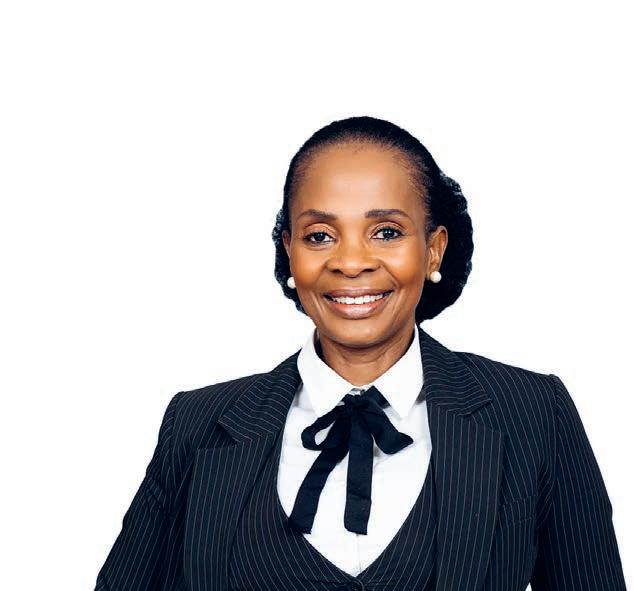


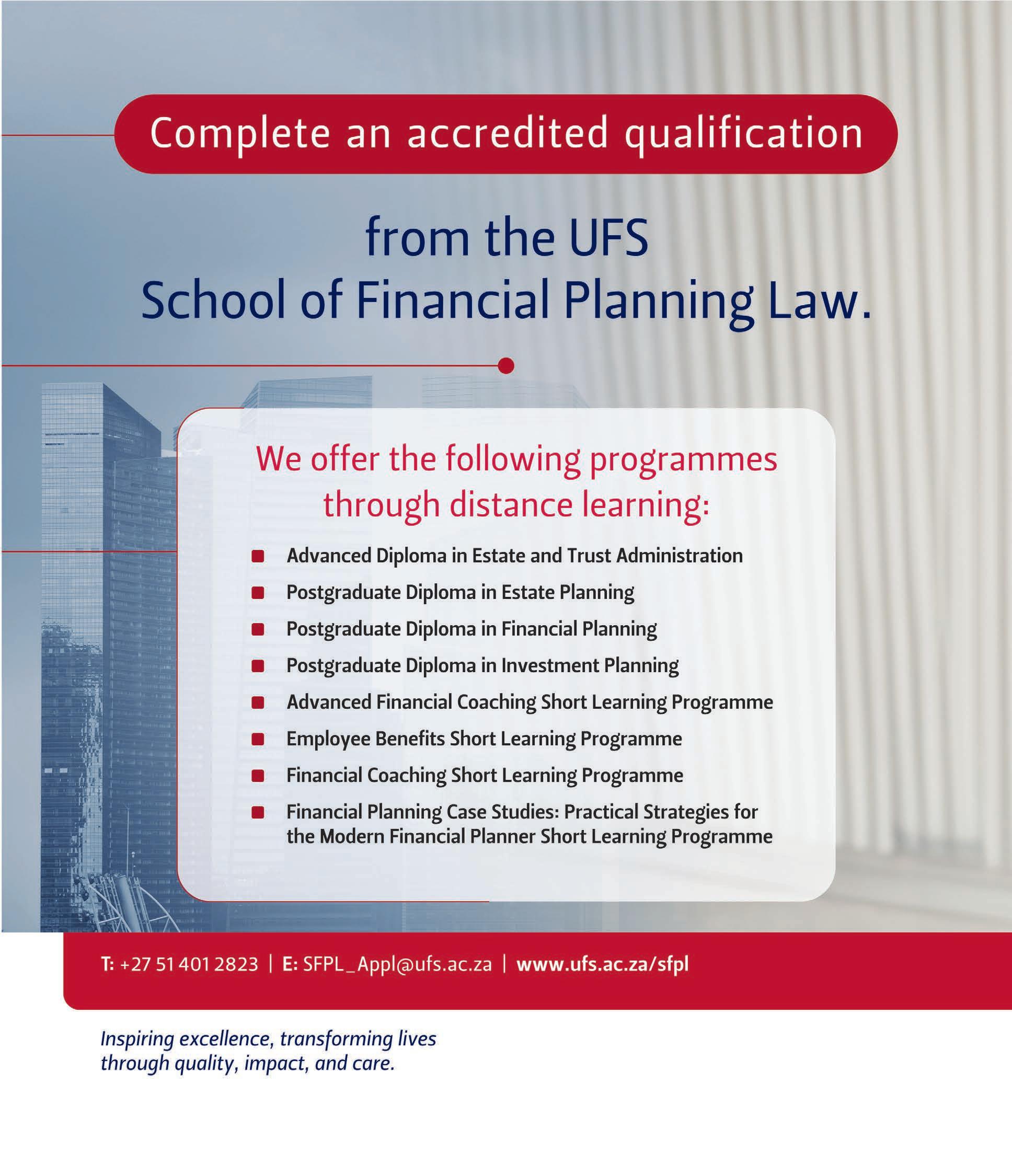

African women entrepreneurs, the backbone of the informal economy, are finally getting support and access to vital credit and tools, unlocking their potential and driving growth. By BUSANI MOYO
The real story of Africa’s economy isn’t just written in the high-rise towers of Sandton, Nairobi or Addis Ababa. It’s written daily on the bustling streets of townships, informal settlements and quiet rural villages. It’s written by the women who run spaza shops, braid hair in makeshift salons and sell fresh produce from roadside stalls. These women are more than just entrepreneurs; they are the social and economic glue holding their communities together.
Yet for too long, they have been invisible to the formal nancial world – overlooked by banks, excluded from national economic strategies and often dismissed as mere “survivalists”.
However, that narrative is changing. A powerful shift is underway, driven by nancial institutions, tech innovators and nonpro t organisations that see these women not as a risk to be managed, but as a massive, untapped market. They argue that investing in this informal economy isn’t charity; it’s one of the smartest economic decisions the country can make. The structural barriers, however, remain formidable: limited access to credit, regulatory exclusion and infrastructure gaps have historically kept conventional nance out of reach.
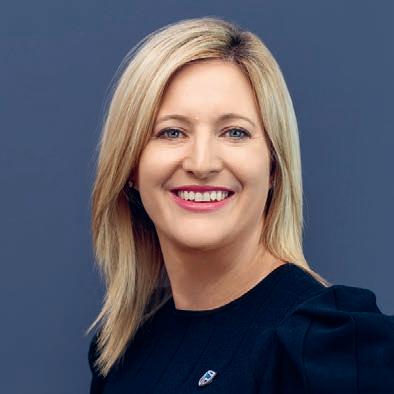
Now, a combination of institutional adaptation and technological disruption is starting to dismantle these walls.
Standard Bank, a pillar of the formal nancial sector, is tackling this challenge with a multifaceted approach built on access to nance, business development and markets. Simone Cooper, head of business and commercial banking, explains that the bank’s
enterprise and supplier development (ESD) programmes provide strategic funding, such as purchase order nance, to qualifying black-owned small and medium enterprises. However, its commitment extends beyond capital. Cooper highlights the importance of holistic support. “Our commitment to women-owned businesses is ever-growing and changing to ensure these businesses remain sustainable and resilient,” she says. This philosophy is embodied in the bank’s Basali Development Programme, launched in partnership with Giving Wings, a strategic consulting, executive coaching and development company. Cooper describes the partnership as a programme “speci cally designed to grow, scale and support black-woman-owned South African businesses ... by closing the growth and support gap created by gender and race marginalisation”.
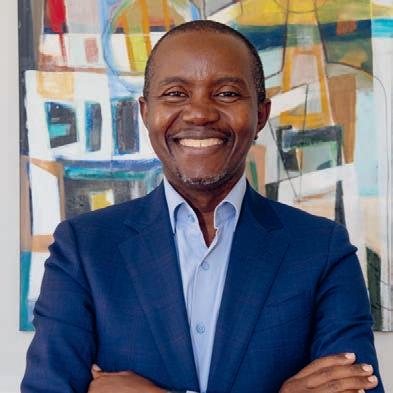
While established banks adapt, ntech innovators are building entirely new nancial realities from the ground up. JUMO, a digital banking technology provider, is leveraging mobile technology to reach entrepreneurs where they are. Joseph Mucheru, JUMO’s president, explains that their arti cial intelligence-powered infrastructure analyses alternative data, such as mobile usage patterns, to build nancial identities for women who lack a formal credit history.
The impact is tangible. Since January 2024, the programme has provided over 200 female entrepreneurs with crucial knowledge, disbursing R1.1-million in grant funding and running masterclasses on everything from cash ow management to pricing. Cooper adds that creating spaces for connection is equally vital. “We value and understand the power of support for business owners through human connection and engagement with each other,” she notes, referencing its popular Women in Business networking sessions.
“JUMO’s technology solves this by analysing alternative data to assess credit risk,” Mucheru states. “This means JUMO can provide fast, reliable and low-cost credit at scale, a lifeline for women entrepreneurs.” This model directly dismantles key barriers. Geographic constraints disappear when banking is accessible on a feature phone without data, eliminating costly journeys to a bank branch. Privacy and independence are also critical. “At JUMO, we empower women to take control of their nances with privacy and dignity,” Mucheru says, explaining that borrowing discreetly from a phone removes the social pressures of visiting a physical branch.
“OUR COMMITMENT TO WOMEN-OWNED BUSINESSES IS EVER-GROWING AND CHANGING TO ENSURE THESE BUSINESSES REMAIN SUSTAINABLE AND RESILIENT.”
– SIMONE COOPER
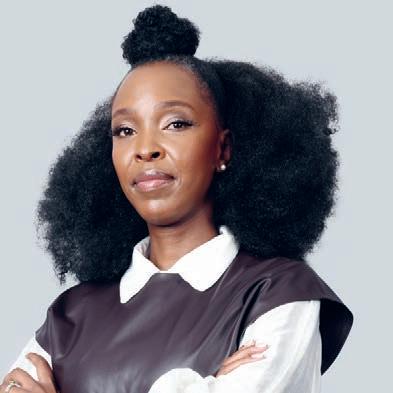
The human impact is profound. Mucheru shares the story of Angela, a charcoal stall owner in Uganda who used a JUMO-powered loan to start her business. Her goal is nancial freedom, and she’s aiming high, aspiring to be “one of the billionaires around town” within ve years. In Zambia, Eunice uses a similar service to restock her small drug store, seeing herself as “a pillar of her community”. These stories illustrate a wider trend; JUMO’s research found that 85 per cent of women using their services reported an improved quality of life.
Beyond lending, a new wave of impact investors is working to correct systemic biases in funding. Tshilidzi Matlala, chief portfolio of cer at E Squared Investments, says her organisation embeds gender-lens principles across all its decision-making. She is candid about the historical exclusion of women from capital, attributing it not to a lack of potential, but to “structural and systemic biases baked into traditional assessment models”.
To counter this, E Squared has built an intentionally inclusive governance structure. “Our investment committee and board are composed predominantly of women – four out of ve members are female,” Matlala reveals. “Diverse investment committees make different decisions and we are proud to see the tangible impact of that diversity in our portfolio.” This has led to over 50 per cent of its investment value being deployed into female-founded or co-founded businesses. As an equity investor, E Squared also moves away from collateral-based instruments, using tools like Simple Agreements for Future Equity that don’t require xed assets – a critical shift for entrepreneurs.
The path forward requires a collaborative ecosystem where banks, ntechs, investors
“OUR INVESTMENT COMMITTEE AND BOARD ARE COMPOSED PREDOMINANTLY OF WOMEN – FOUR OUT OF FIVE MEMBERS ARE FEMALE”
– TSHILIDZI MATLALA
An organisation that proves the impact of supporting women in moving from informal spaces into the mainstream is Kagiso Trust. Its work stands as a testament to the power of investing in marginalised people, especially women who are transforming their communities from the ground up. “Everything we do is based on the belief that investing in people is the greatest investment of all,” says Kagiso Trust CEO Dr Mankodi Moitse. The women empowered by Kagiso Trust’s programmes prove her right every day.
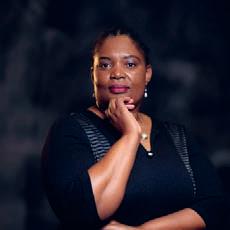
In the Eastern Cape, Noziphiwo Zumani watched her hometown, Makhanda, deteriorate, feeling defeated by the loss of hope. After participating in a Kagiso Trust community development workshop, she was inspired to co-found Imbumba Yeemboni (“a collective unity of visionaries”), a nonprofit tackling local challenges. Today, it hosts heritage tours and plans community gardens, turning despair into a “beacon of hope”.
For Nomsa Ngwenya, a farmer in Limpopo with a master’s degree in agricultural science, the challenge was market access. Joining the SPAR Rural Hub farmer development programme, supported by Kagiso Trust’s Tyala Impact Fund, was a “game-changer”. It provided the resources and market links she needed to thrive, earning her the Female Farmer of the Year award.
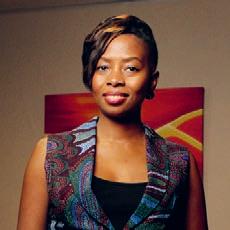
Dipuo Phakathi, a qualified engineer, turned a side hustle into a high-end custom furniture business, DeNic Cabinets. She credits her time in Kagiso Trust’s PROPreneurX accelerator for teaching her the value of strategy and networks. “Collaboration is key,” Phakathi says. “Who better to refer to a client than the same people you have sat down in a classroom with? For me, that was gold.”
Dr Moitse, who leads a majority-female organisation, sees a common thread in these stories. The women beneficiaries, she notes, build networks and partnerships rather than empires. “It is wonderful to see them repaying our investment in the best way possible – by igniting human capacity themselves.”
and government work in concert. Mucheru sees the future of ntech creating seamless pathways for entrepreneurs to move from informal to formal economic participation, driven by richer data and partnership-driven innovation.
Integrating Africa’s informal economy is not just an economic calculation; it is a recognition of the immense human capital that has been driving communities for decades. By dismantling barriers and providing the right tools, it is possible to ensure the resilience and ingenuity of these women entrepreneurs, placing them in a position where they are no longer just the backbone of their communities, but also a celebrated and central force in the nation’s economic prosperity.
Follow: Simone Cooper www.linkedin.com/in/simone-cooper-49078148
Tshilidzi Matlala www.linkedin.com/in/tshilidzi-matlala-cfa-28b47223
Dr Mankodi Moitse www.linkedin.com/in/dr-mankodi-moitse-927a2a84
Dipuo Phakathi www.linkedin.com/in/dipuo-phakathi-632751194



From individually quick frozen chicken to sustainable packaging, RAINBOW CHICKEN’S technical director, Claire Mundell, reveals how her team balances creativity, consumer needs and sustainability in food production to ensure future-ready food
As the work of Dr Ivy Meso, alongside, demonstrates, excellence at Rainbow Chicken depends on a combination of science, systems and people. That same approach drives Claire Mundell, Rainbow Chicken’s technical director, who has built a 28-year career at the company, transforming ideas into products that shape how South Africans eat.
“Every day counts,” Mundell says, re ecting on her journey since joining Rainbow Chicken in 1997 as the company’s rst-ever R&D (Research & Development) technologist.
“When I look back at where we started, it’s inspiring to see how far we’ve come and how much opportunity still lies ahead, especially for women in the food industry.”
For Mundell, who now leads Rainbow Chicken’s R&D function, one of the most important questions is: Do we innovate or do we renovate?
“Innovation is about creating something new; renovation is about evolving or improving something that already exists,” she explains. “Knowing when to do which
requires listening closely to the market and trusting the strength of your team.”
Rainbow Chicken’s decision-making is informed by consumer research, global food trends and feedback from customers across all sectors – from major retailers and wholesalers to hotels, restaurants and quick-service restaurants.
“We attend international food expos, engage with global partners, such as KFC and Burger King, and invest appropriately in market testing,” Mundell says. “These insights help us anticipate shifts in consumer demand and identify whether we need a breakthrough product or a strategic evolution of what already exists.”
Looking back, examples of innovation include the introduction of Simply Chicken Viennas and Simply Chicken Polony, which revolutionised premium quality, convenience and shelf life.

On the renovation side, the company is continually introducing new avours and formats of crumbed chicken, improving quality and consistency without changing the product’s core value.
Mundell admits not every innovation is an immediate success. “Back in 2006, we launched a range of avoured, fully cooked chicken portions that were simply ahead of their time,” she says. “Now, we place much greater emphasis on consumer readiness before large-scale investments.”
Mundell’s rise from R&D technologist to technical director underscores the importance of mentorship and representation for women in leadership. “My job now is to create an environment where people, especially women, feel valued and encouraged to bring their ideas forward,” she says. “Innovation is never achieved in isolation. Our strength lies in teamwork, and when people feel empowered, great things happen.”
Her collaborative style has yielded numerous advancements in customer relationships, project collaborations and supplier partnerships. However, she’s most proud of the culture Rainbow has built. “It’s not only about chicken; it’s about people. That’s where real innovation starts.”
“IT’S INSPIRING TO SEE HOW FAR WE’VE COME AND HOW MUCH OPPORTUNITY STILL LIES AHEAD, ESPECIALLY FOR WOMEN IN THE FOOD INDUSTRY.”
– CLAIRE MUNDELL
Sustainability remains a guiding principle. Rainbow Chicken is exploring initiatives to reduce water use as well as repurpose waste as alternatives to land ll. “Our responsibility is to innovate not just for today’s consumer, but also for future generations,” says Mundell.
Her message for Women’s Month is one of action and encouragement: “Make every day count. Show up, keep learning, stay humble and challenge yourself because somebody is watching and being inspired by your journey.”
Like the work of Dr Meso pro led on the next page, Mundell’s leadership re ects Rainbow Chicken’s mission to nourish the nation through excellence in food production, powered by innovation, sustainability and its people.


Veterinary science is often seen as a calling, but for Dr Ivy Meso, it was a dream nurtured from an early age. Growing up in a home lled with pets, she was fascinated by the care veterinarians provided whenever the family dogs needed treatment. That fascination, coupled with a love for agriculture, led her to attend an agricultural high school and ultimately pursue a career in veterinary science.
“Monogastrics were always my rst choice, even during my undergraduate studies,” she recalls. “Poultry became the natural path for me.”
Today, Dr Meso is a poultry veterinarian at Rainbow Chicken, one of SA’s leading producers. Her role places her squarely at the intersection of animal health, food security and the everyday challenges that come with managing the risks facing the country’s poultry industry. “People often think being a poultry vet is predictable,” she says with a smile. “However, the eld is so dynamic. No two days are the same. You’re constantly learning and solving problems.”
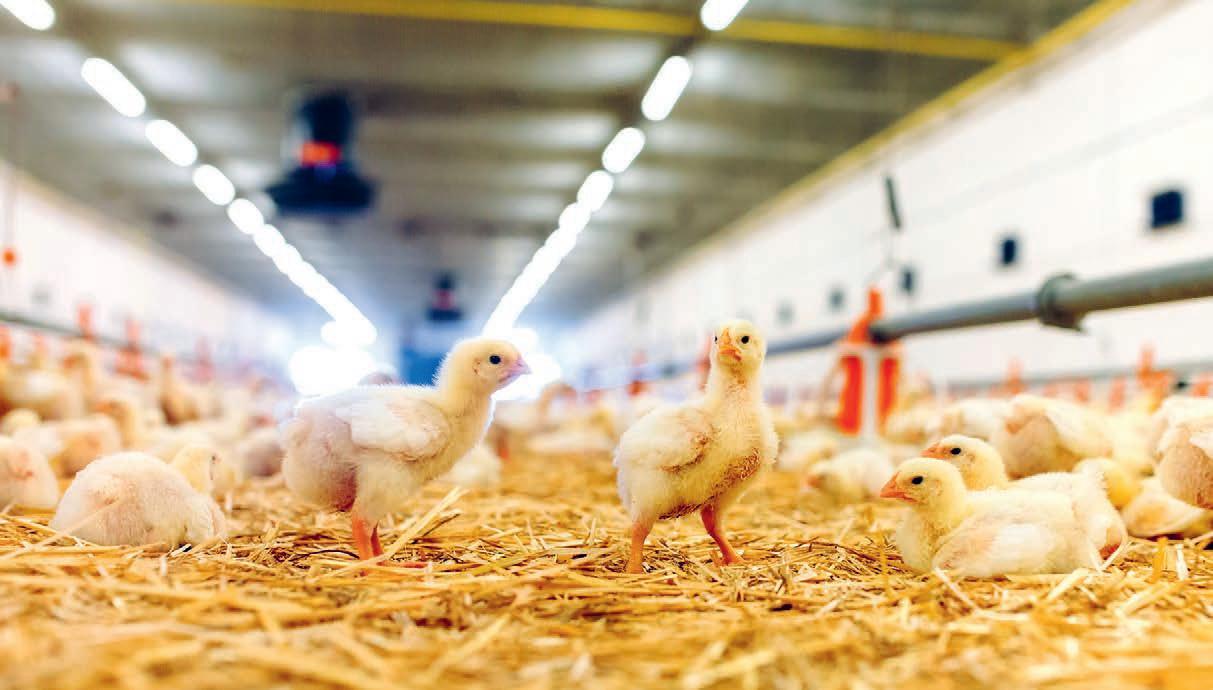
“It was about balancing compliance, control, diagnostics, mitigation and, most importantly, people. It felt like controlled chaos. However, you also witness the grit and tenacity of teams determined to keep nding solutions, even amid a crisis.”
Her frontline experience has underscored how animal health and food security are deeply intertwined. “One of the biggest misconceptions is that these two priorities are separate. They’re not,” she says. “Strong animal health systems directly protect our food supply.”
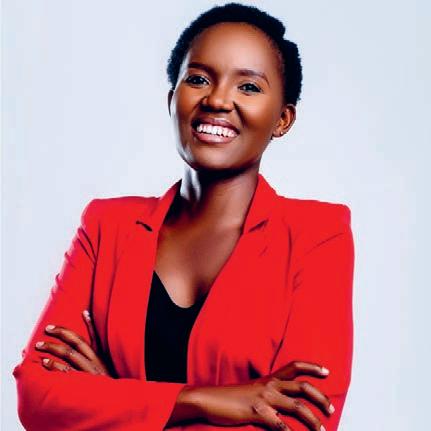
“THE MANAGEMENT OF AN OUTBREAK, EVEN IN A CRISIS LIKE AVIAN INFLUENZA, COMES DOWN TO SYSTEMS THAT CAN PIVOT AT A MOMENT’S NOTICE.”
MESO
LEADING ON THE FRONTLINES OF HPAI
Few challenges have tested the poultry industry like the Highly Pathogenic Avian In uenza (HPAI) outbreak. For Dr Meso, navigating this crisis required balance. “There isn’t one word that sums up that period in my career,” she explains.
As new strains and diseases continue to emerge, Dr Meso emphasises the importance of robust biosecurity and vaccine planning. “No two geographical areas are the same,” she notes. “I rely on historical risk pro les and up-to-date diagnostics to develop plans that are practical and adaptable.”
She believes systems, rather than single actions, are what ultimately safeguard the industry. “The management of an outbreak, even in a crisis like avian in uenza, comes down to systems that can pivot at a moment’s notice,” she explains.
While the challenges are real, Dr Meso is optimistic about the future of poultry veterinary science in South Africa. “Smarter technologies and stronger local expertise are on the horizon,” she says. She also points to innovations driving sustainability in poultry farming as key to the industry’s future resilience.
For her, technology is only one part of the equation. She is equally passionate about the people behind the industry and believes investing in talent, especially women, will strengthen the sector long term. “You must want to do this work and have a passion for it because there will be tough times,” she says. “Your ‘why’ will carry you through.”
When asked what advice she would give to aspiring female veterinarians, Dr Meso’s message is simple yet powerful: “Find the importance of moments, and understand that irrelevance may be your greatest risk. People must remain at the centre of everything you do. We are solving problems for people as much as we are caring for animals.”
By sharing her journey, Dr Meso hopes to inspire young women to follow in her footsteps. Her work at Rainbow is a testament to the company’s commitment to empowering female leaders and advancing veterinary science as part of its broader mission to nourish the nation.
“Veterinary science is about resilience, adaptability and care,” Dr Meso re ects. “It’s incredibly rewarding to know the work we do makes a real difference to the health of both animals and people in South Africa.”

Tammy Makadooj, CEO and managing director of KGB HOLDINGS, is driving growth for the company and championing empowerment with courage and grace
From humble beginnings to building a powerhouse in logistics, fuel and property, the KGB legacy is one of resilience, innovation and purpose.
Founded by Shaun Mack in 1983, the company’s journey re ects decades of hard work and a vision of “Serving to Grow, Growing to Serve, Building a new Southern Africa”. Through challenges and reinvention, KGB has become a trusted brand, with a reputation built on integrity and perseverance.
Today, that legacy lives on through a new chapter – one led with boldness and grace by Tammy Makadooj, CEO of the KGB Group. In industries traditionally dominated by men, Makadooj has emerged as a formidable leader, carrying forward her father’s vision while infusing it with her own innovative approach.
An important part of this growth is New Energy Petroleum (NEP), relaunched as a trusted liquid fuels supplier. Under Makadooj’s stewardship, NEP has become a symbol of diversi cation and sustainability, providing reliable energy solutions that align with both industry demands and environmental responsibility.
Recognised among Africa’s leading women in energy and logistics, Makadooj’s accolades, including being a nalist for Top Women Business Leader of the Year and being awarded Top 50 Pan African Female Leaders in Energy, are testaments to her in uence. Yet what sets her apart is not just recognition, but her unwavering commitment to empowerment. Makadooj embodies the truth that women in business do more than lead companies; they open doors for others, create opportunities and shape futures.
“As a woman in business, my journey has been deeply shaped by the values instilled by my late father. Today, as co-director with my brothers, we are privileged to carry that vision



















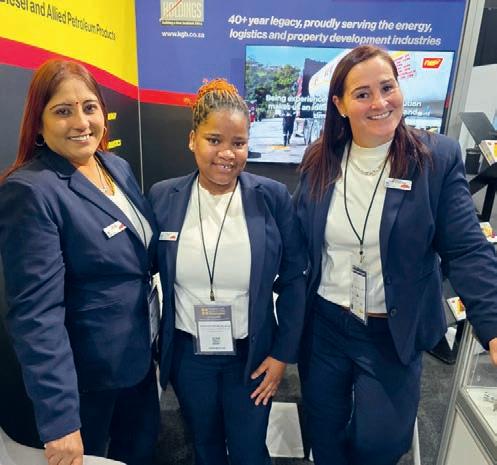
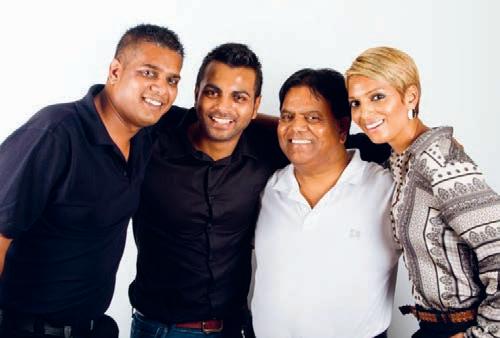
forward together, honouring him while shaping the future of our company.





“Within this family-led structure, I have found my own voice and purpose: driving the empowerment of women both inside and outside the organisation. In industries where female leadership remains under-represented, I see it as both a responsibility and an opportunity to create spaces where women can thrive. At KGB, I actively champion mentorship, skills development and career growth for women across our teams. My belief is simple: when women rise, we all rise.

















“This commitment is not separate from our family values, but an extension of them. Working alongside my
brothers, who share the same dedication to inclusivity and excellence, has shown me that real empowerment is not about exclusion, but about balance – recognising everyone’s strengths and ensuring that each person is valued.
“For me, celebrating women is not only about recognising the milestones we have achieved, but also about creating opportunities for the generations to come. As I look ahead, I do so with gratitude for the foundation laid by my father, with pride in the unity of our family business and with a steadfast commitment to uplift women as an essential part of our shared success.”
SCAN THIS QR CODE TO GO TO THE KGB HOLDINGS WEBSITE




For more information:
Head Of ce: 57 Sloane street
The Campus Wembley building Bryanston 010 045 0044
Edwin Swales – 15B Cliff Crescent, Edwin swales
Business Park Bellair 031 459 2210
Phoenix – 138/140 Aberdare Drive, Phoenix Industrial Park, Phoenix 031 500 3494
WWW.KGB.CO.ZA
Across South Africa’s agricultural landscape, women are making a bold and visible impact. They are successful farmers, feed specialists, food security advocates and business owners, playing a central role in shaping the future of food production. Their contributions extend from the soil to the supply chain, and they are fundamental to building a stronger, more inclusive food industry.
At Epol, we witness the resilience of women in agriculture, those who are driving meaningful transformation on the ground. These women are not just participating in agriculture; they are innovating within it. They’re running complex broiler operations, overseeing commercial dairy farms and building thriving agribusinesses in communities where food insecurity is still a daily reality.
As one of South Africa’s leading animal feed producers, we see rst-hand how women in agriculture feed their families and shape the future of rural economies. What sets these women apart is their commitment to production and purpose. Many reinvest in their communities through employment, education and mentorship, fuelling a cycle of empowerment that ripples far beyond their farm gates.
However, we also see the challenges. Despite their growing presence, women in agriculture continue to face systemic barriers: limited access to land ownership, under-representation in leadership and dif culty accessing nance and technical support.
Climate change only compounds these issues. It creates new layers of vulnerability
Women are fundamentally helping shape a more resilient food system, writes ANINA HUNTER, director of feed at Epol (Rainbow Chicken Ltd)
for small-scale farmers, especially women, who often manage risk without the same resources, support structures or institutional backing afforded to their male counterparts. For instance, women often have to balance their farming responsibilities with household chores and childcare, which can be physically and emotionally taxing.
That’s where we believe the private sector can, and must, step in.
Epol’s approach to empowerment is built around practical partnership. We offer a wide range of scienti cally formulated feed solutions tailored to species, life stage and performance goals.
However, our work goes beyond the bag. Our national network of technical advisors and specialists provides farmers with personalised, on-farm support, from diet formulation and animal nutrition consulting to diagnostic testing of silage, hay and pastures.
Through our laboratory services, we help farmers better understand the nutritional value of their inputs, enabling data-driven decisions that improve animal health, productivity and ultimately pro tability. We also offer custom feed mixes and supply from six strategically located mills, ensuring farmers in even the most remote regions have consistent access to quality nutrition backed by technical expertise.
THE SECTOR
Anina Hunter
This kind of support can be game-changing, particularly for women who are new to commercial farming or managing operations without legacy knowledge or mentorship. When a farmer receives not just a product, but also a partner in their success, it builds con dence and unlocks growth. That’s empowerment in action.
Internally, we also walk the talk. Epol has a growing cohort of women in leadership roles, particularly within the areas of safety, health, environment, risk and quality (SHERQ). They oversee logistics and mentor the next generation of agricultural professionals. Their perspectives bring fresh thinking to long-standing challenges and contribute to creating a workplace culture that values diversity, innovation and inclusion, making everyone feel valued and respected.
We believe food security isn’t only about quantity; it’s about equity. It’s about building systems that recognise, reward and uplift the full spectrum of talent contributing to agriculture. When women are supported, the sector becomes more resilient, more responsive to change and more capable of feeding our future. I re ect with pride on the women we serve and the women we work alongside. They are growing businesses, building communities and breaking new ground in agriculture. They are shaping a better future.

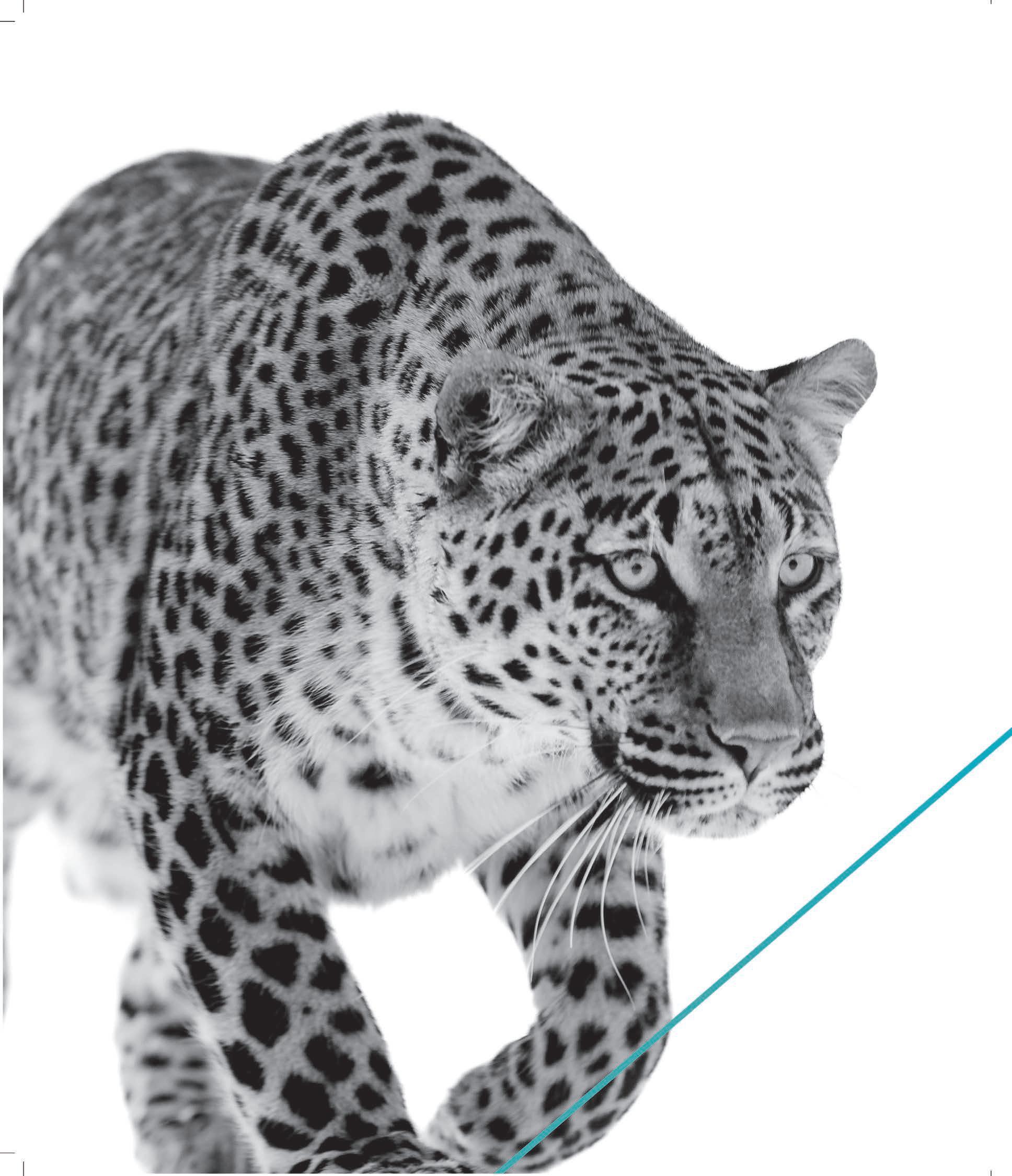

ZISANDA GILA , head of money markets at Momentum Asset Management, shares in this Q&A that it’s a responsibility and a privilege to manage people’s investments with care and discipline
Q: What inspired you to become a portfolio manager and what drew you to the investment world?
A: I have observed a direct link between the investment world and daily real-world experiences. Portfolio management is an intellectually stimulating and ful lling career. It almost feels like you are not just studying markets, but also making decisions that directly affect people’s futures and nancial wellbeing.
The inspiration to become a portfolio manager came from the opportunity to apply my learnings and analytical skills, turning data into decisions in a way that makes a real difference, not just in markets, but also in a way that affects people’s lives. That is what makes it so meaningful for me.
Q: What drives you in your role today? What keeps you motivated and focused through market cycles?
A: In this changing world where markets are unpredictable, what drives me is the huge responsibility and privilege of managing people’s investments with care and discipline, while navigating the uncertainty. Markets evolve and that forces us to evolve. Each market cycle is an opportunity to understand how economies, policy decisions and human behaviour come together to shape markets at a point in time.
For me, portfolio management is not just about returns; it’s about staying grounded in a long-term investment philosophy while navigating complexity and volatility with purpose and turning insight into effect, providing a smooth investment experience for clients.
Q: Have there been any defining moments or key lessons in your career that have shaped your investment philosophy?
A: One of the de ning moments that shaped how I view markets and risk was managing portfolios through a fast-tightening interest rate cycle during the COVID-19 pandemic. It taught me that even the best strategies can

be threatened by sentiment or liquidity-driven events in the short term.
That experience emphasised the concept of diversi cation, strong risk controls and well-structured portfolios constructed to absorb such shocks from different market conditions as cornerstones of sound investing.
Q: Who or what has inspired you most throughout your journey?
A: Throughout my journey, I have been privileged to draw inspiration from personal and professional fronts.
Personally, the values of discipline, resilience and integrity that my parents instilled in me have been foundational and served me well in my career. They taught me the importance of staying grounded and focused while working hard to achieve my life goals.
Professionally, I am inspired by my mentors and colleagues in the nancial markets, who approach the markets with intellectual rigour and humility. My mentor always emphasised that self-awareness is a critical, yet often underappreciated, trait in successful portfolio management. It enables you to recognise your biases, stay grounded during market stress and understand your risk tolerance as well as behaviour-driven tendencies and decisions.
The ever-changing markets are a constant source of inspiration. They can be humbling when you make a wrong call, and they reward good discipline as well as philosophy. They force one to learn and strive to improve every day.
Q: What message would you like to share about money?
A: Always stay invested; it changes the way you view money.
As portfolio managers, our role is to help you grow and protect it in a way that supports your unique life journey with diligence and care.
EACH MARKET CYCLE IS AN OPPORTUNITY TO UNDERSTAND HOW ECONOMIES, POLICY DECISIONS AND HUMAN BEHAVIOUR COME TOGETHER TO SHAPE MARKETS AT A POINT IN TIME.
Follow: Zisanda Gila www.linkedin.com/in/zisanda-gila-a6306721
Cliffe Dekker Hofmeyr’s PHETHENI NKUNA , director – Executive Management Office and director – Employment Law, shares some of the secrets behind her success
Drafting pleadings or giving an opinion to clients certainly comes easier than documenting one’s journey to and of leadership. What was particularly challenging in my journey and, I believe remains an obstacle for other women, is the absence of a blueprint to emulate. As I pen this article, I hope to inspire hope, courage and audacity in those who are eager to take the baton. I share some of the principles that, I dare say, made success predictable. These were paired with systems I established to ensure I could produce and sustain the results.
First for me was branding. I have always been one to look for a differentiator. How do you show up before you even enter the room? What was my performance promise? I appreciated early in my career that I needed to build credibility through mastering my craft. Developing my talent and becoming great at what I do were important parts of my brand. Otherwise, my voice would not matter. In fact, I might never have even got a chance to be heard at all. It was important to know what I was doing and to be good at it. Linked to this is preparation. That is where I got con dence. I was ready, I knew the facts, I studied the law, identi ed loopholes and even foresaw sharp curves and U-turns.
It took a lot of hard work, long hours and exposure to complex and niche matters. I was fortunate to have worked with an incredible attorney who did not “hold back the punches”. Sponsorships and making our male counterparts allies remain integral to closing the female leadership gap and advancing the career development of female lawyers. Leadership goes beyond representivity. It is also about the corollary authority and having a voice. My sponsor threw me into the deep end – in matters, leading client engagements, and even championed by academic pursuits. He jokes about how he did not understand why a lawyer would want to do an MBA, but he supported me anyway. It was the gift of sponsorship, batting on my behalf. Getting my LLM and MBA were very much a part of the branding pursuit. Then showing up, and doing so consistently, even for the smallest opportunities. Through this, I built a habit of consistently delivering
exceptional outcomes, irrespective of the circumstances or the client. As part of showing up, I re ned my language. Our bodies, circumstances, dreams and destinies pay attention to the words we speak intentionally or otherwise, there is no lter. It was important to speak well and reaf rm to my subconscious that I had what it takes, that I was capable and built for this. Added to this, was not ignoring the opportunity of networking – even with your colleagues.
In 2022, during our directors’ conference, I sat with another director and the CFO. During our lunch break, we chatted about associate attrition – the “Great Resignation” post-COVID-19. My MBA research had centred on the Theories of Motivation, looking speci cally at the Unfolding Theory of Turnover. Brie y, the Unfolding Theory highlights ve cognitive pathways (although more may exist) employees follow when deciding to leave an organisation. Understanding these pathways would propel the rm to put in place measures that would serve as shock absorbers and intentionally reduce the erosion of talent. It was this conversation that opened the door to the of ce I now occupy.
Beyond this point, my eyes are set on legacy. Ultimately, my goal is to have a professional presence that makes a difference. One of my passions is to mentor and sponsor, within and outside the rm, especially women, aiding other females in their professional development, building con dence and guiding them.
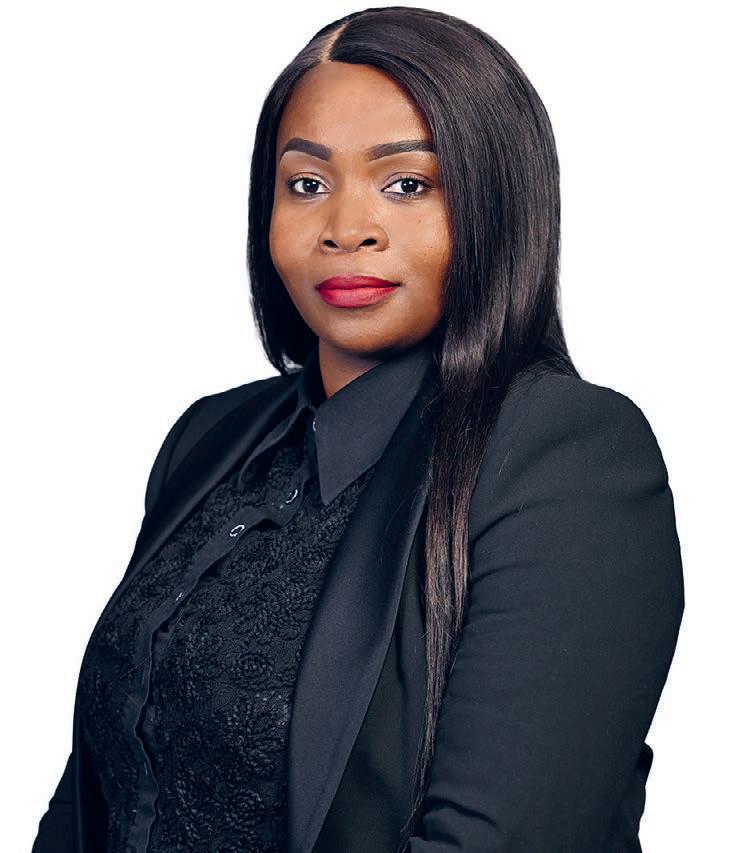

In South Africa’s formal sector, women earn on average 12per cent less than men, according to a new study published in the Journal of Development Economics using tax data on the universe of formal workers in South Africa. This gap, states the study, is largely shaped by the over-representation of women in lower-paying companies and industries.
More than another statistic, this stark inequality is a reminder that real change requires action both within companies and across industry norms.
When I joined Clicks in March this year, I knew I was stepping into a heritage brand with a long-standing commitment to customers and communities. What I have come to appreciate more deeply is the clarity with which Clicks lives out its purpose: to help people feel good and live better
That clarity has become our anchor in an evolving retail landscape challenged by economic headwinds, changing consumer behaviours and digital disruption.
Every day, decisions in retail leadership have an immediate impact – across our stores, on our shelves and through our service. Leading effectively in this environment, particularly as a woman in a traditionally male-dominated sector, requires courage, listening and intentional action to accelerate gender equity, not just symbolically, but also structurally.
SUPPLIER DEVELOPMENT IS ONE OF THE MOST EFFECTIVE WAYS TO DRIVE SHARED VALUE.
BONGIWE NTULI , the first female managing executive of Clicks Retailers SA, reflects on what it takes to drive transformation, inclusion and resilience across South Africa’s retail sector
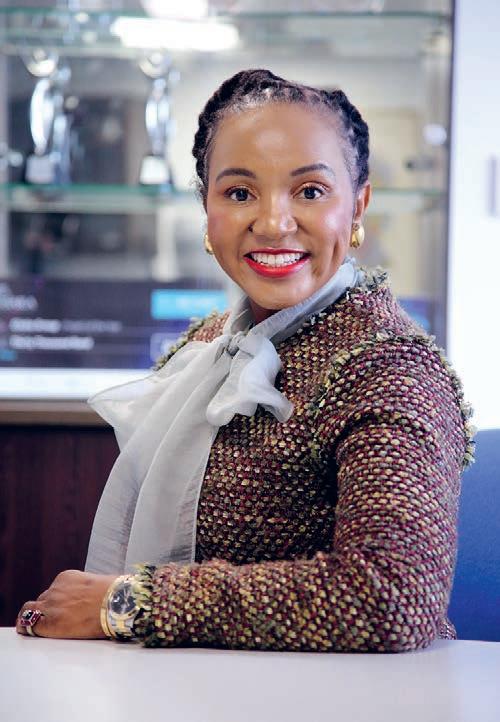
Transformation starts with how we lead, hire and invest. At Clicks, we employ over 18 800 people, the majority of whom are women, with 95 per cent black and 62 per cent women among our permanent staff. Eighty-four per cent of management roles are held by black employees and 59 per cent by women.
However, beyond employment numbers, the key to leadership equity lies in supporting career growth. That is why Clicks invested R185-million in a combination of training, bursaries, internships and learnerships last year. In 2023, 86 bursaries were awarded to pharmacy students, while 96 per cent of
people trained were black and 66 per cent were women.
Our impact must extend beyond Clicks. Supporting women-owned enterprises through inclusive procurement and supplier development is one of the most effective ways to drive shared value. By providing market access to small- and medium-sized businesses, particularly those rooted in under-resourced communities, the retail sector can help build sustainable livelihoods, boost local economies and expand the reach of quality, locally made goods. These kinds of partnerships show how commercial inclusion can generate long-term, generational impact that bene ts both business and society.
Care matters deeply – not as a soft leadership trope, but as a business imperative that shows up in how we design the customer journey, support our store teams and respond to national challenges.
When public sector healthcare systems are under strain, it is often retail pharmacies that ll the gap. Initiatives such as the Clicks Helping Hand Trust – which has delivered more than 400 000 free primary healthcare services over the past three years to underprivileged women and children – show that care is a long-term commitment, not a campaign. When oods, res or economic shockwaves hit communities, it is our people who keep the doors open and who show up.
For me, leadership is not just about what we build, but also what we enable. Clicks has shown how purposeful investment and equitable practice can deliver robust outcomes internally. However, the real opportunity lies in scaling these successes across the sector and economy.
If South Africa is serious about closing the gender pay gap and enabling systemic transformation, we need inclusive systems that support women to lead on their terms, wherever they work. When equity becomes structural rather than aspirational, everyone wins.
At CLICKS GROUP, a generation of women is reimagining access, innovation and impact across every part of the business. Six of these leaders share what keeps them showing up every day to make a difference – and how they are accelerating action for greater gender equity
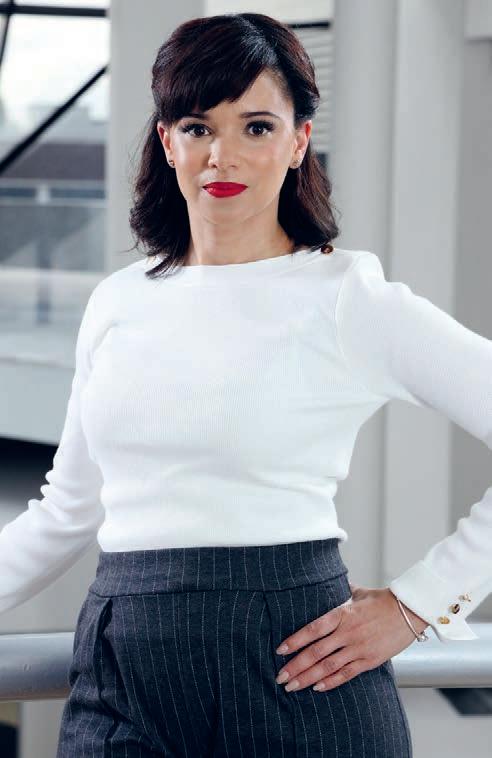
BRONWYN MACAULEY, public health specialist and responsible pharmacist, clicks
Bronwyn Macauley’s journey from pharmacist to strategic leader is rooted in purpose: to expand access to affordable, quality healthcare. With nearly a decade of operational experience across dispensing, retail and clinics, and a master’s degree in public health, she brings a deeply human perspective to primary care strategy at Clicks.
Her focus? Future-proo ng South Africa’s pharmacy sector by developing talent and
“EVERY NEW PHARMACY OR CLINIC WE OPEN IS A STEP TOWARD GREATER HEALTHCARE ACCESS.”
– BRONWYN MACAULEY
reimagining delivery. “Pharmacists are among the most accessible healthcare professionals,” she says. “They have a vital role to play in public health, innovation and integration.”
Macauley is a vocal advocate for mentorship and transformation. She supports initiatives such as internships and bursary programmes at Clicks and is committed to inclusive leadership. “Pharmacy is a powerful profession,” she says. “We need to make it re ect the communities we serve.”
For Phathiswa Sefatsa, leadership starts with authenticity. “It means being true to who I am and what I bring to the table,” she says.
Sitting at the intersection of customer experience, culture and brand strategy, she plays to her strengths while building diverse,
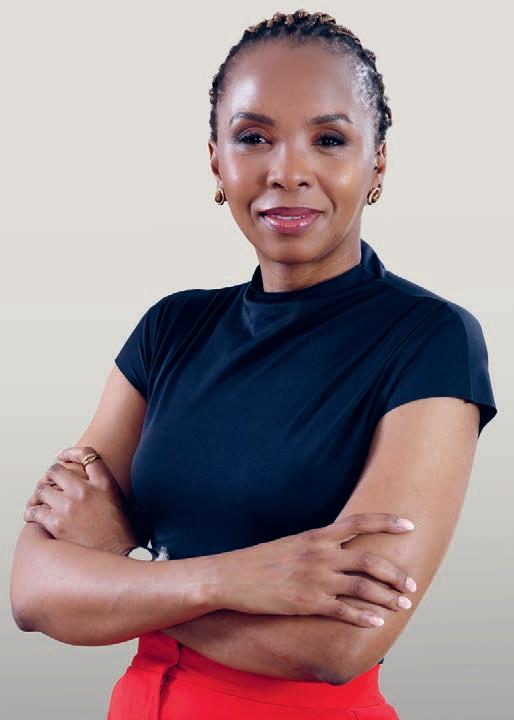
“IT’S NOT ABOUT DOING EVERYTHING; IT’S ABOUT BUILDING A TEAM THAT CAN DO ANYTHING.”
– PHATHISWA SEFATSA
high-performing teams. “In the areas where I’m not so great, I bring in people who do those tasks better so that, as a team, we can execute well.”
Sefatsa believes kindness and good character matter just as much as results. She is a champion for equity in the workplace, especially for black women. “Women have been disenfranchised for a long time,” she says. “It’s necessary to give them opportunities to get ahead so the next generation can see what’s possible.”
IMPACT IN ACTION: CLICKS BY THE NUMBERS
• 62 per cent of Clicks Group employees are women.
• 44 per cent of board seats are held by women.
• R78-million invested in supplier development, with 48 per cent of beneficiaries being women-owned businesses.
• R185-million invested in skills development, benefitting 6 014 employees.
• 1 885 employees promoted, including 1 154 women.
• 128 955 people reached through free primary healthcare services.
TAMMY SIMON, GROUP HEAD OF LEGAL
For Tammy Simon, leadership is far less about titles than it is about creating a legal culture where women can lead with con dence and care. As group head of legal at Clicks, she has made it a priority to open doors for others: mentoring junior lawyers, advocating for exibility and consistently brie ng women-led legal teams.

“REST IS NOT A REWARD; IT’S A NECESSITY – AND WE NEED TO MODEL THAT FOR OTHERS, TOO.”
– TAMMY SIMON
Her work outside the group includes founding a mentorship programme with the Law Society and pushing for greater transformation through the SA General Counsel for Diversity & Inclusion.
“We need to build careers that respect all the seasons of women’s lives,” she says. Her calm, clear-eyed approach to leadership balances strategy and empathy with a deep belief in purposeful rest and clear priorities. “Con dence comes with experience,” she adds. “Progress comes from being faithful in each step – not waiting for the perfect moment.”
PALESA SEAKAMELA, GENERAL MANAGER: UNITED PHARMACEUTICAL DISTRIBUTORS (UPD)
At UPD, the pharmaceutical distribution arm of Clicks Group, Palesa Seakamela ensures essential medicines reach every corner of the country. From hospital networks to independent pharmacies, her focus is on consistent, ef cient delivery through cold-chain innovation and resilient systems. “We’ve proven we can respond to urgent public health needs – like we did with the COVID-19 vaccine roll-out,” she says.
Beyond logistics, Seakamela is passionate about empowerment. Under her leadership, UPD has expanded the owner-driver scheme for its electric vehicle delivery eet to include black female entrepreneurs, removing historic barriers in the logistics space.
Her leadership style is clear and values-driven: collaborate with purpose, lead by example and build others up.
“Resilience and adaptability are key when things don’t go according to plan.”
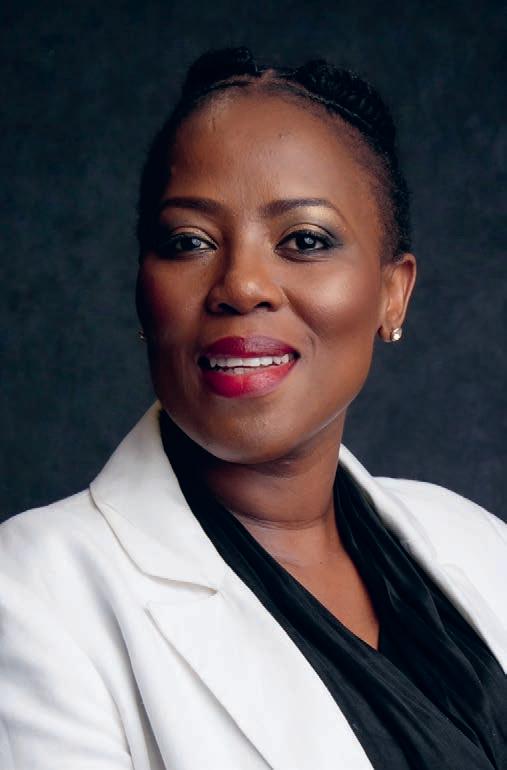
“ACCESS TO MEDICINE IS THE FOUNDATION OF PUBLIC HEALTH – AND IT’S WHAT DRIVES ME EVERY DAY.” – PALESA SEAKAMELA
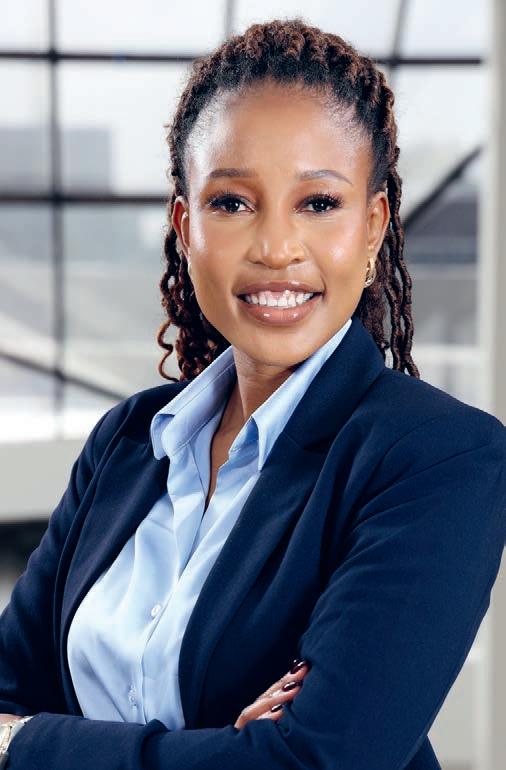
With a leadership style deeply rooted in The Body’s Shop’s founding values of activism, sustainability, equality and community, Lwazi Nhlapo see her role as a true calling. “Every day, I get to lead a brand that dares to care in a world that often chooses convenience over conscience.
“WHEN
–
“Sustainability and social responsibility aren’t boxes to tick – they are the heartbeat of our business,” she says. That includes re ll stations in 23 stores, 100 per cent vegan formulations, ethical ingredient sourcing and locally produced ranges. Under Nhlapo’s leadership, The Body Shop led an initiative to integrate anti-gender-based violence education into the Life Orientation curriculum in South African schools. It also hosted Motherhood in Motion, a unique wellness-led event to celebrate the strength and nurturing power of maternal gures.
“My journey has been shaped by people who saw something in me before I saw it in myself,” she says. “As a strong black woman in corporate South Africa, I’ve had to learn how to lead without losing my sense of self.”

Linda Sinclair credits Sorbet’s franchisees and employees – known as ‘citizens’ – as the heartbeat of Sorbet’s business success. “They don’t just perform treatments, they serve and uplift our guests, creating experiences that matter,” she says.
As a purpose-led brand, Sorbet sees beauty as a way to build con dence and community, explains Sinclair. As it celebrates its 20th birthday and 200th store opening this year, the brand’s focus on uplifting women through service, education, skills development and ownership remains resolute. “From the beginning, Sorbet was never just about manicures or facials. It was about belonging, empowerment and rede ning the industry,” she says.
Looking ahead, Sinclair is focused on accessibility, sustainability and broadening the notion of wellness to include not just physical, but also mental health and inclusivity. “Our future won’t be measured only in store numbers, but in the lives we touch.”
“AT SORBET, WE DON’T JUST OFFER TREATMENTS; WE CREATE SPACES OF PURPOSE, PRIDE AND POSSIBILITY.” – LINDA SINCLAIR
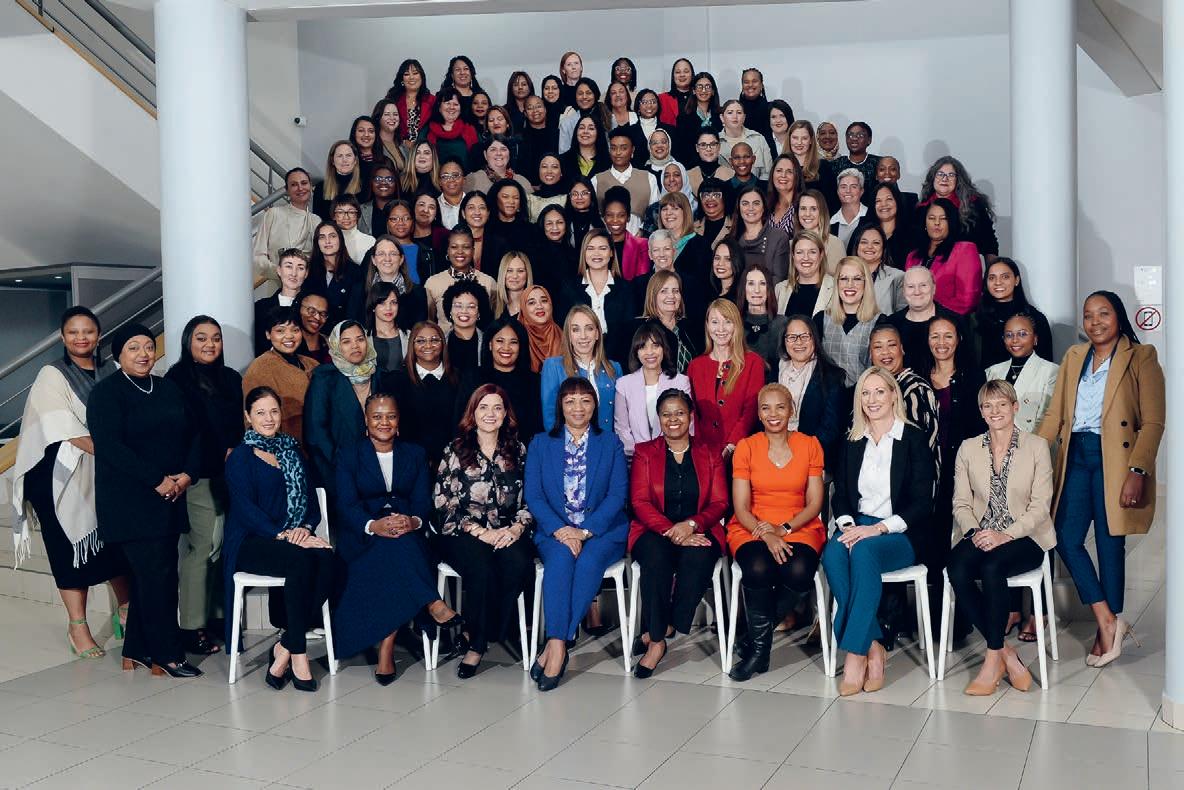
As a leader in the healthcare market, Clicks Group is committed to increasing access to affordable healthcare in Southern Africa through its retail pharmacy and pharmaceutical wholesale businesses. Clicks Group’s sustained financial performance and growth in shareholder value has seen the group included in the FTSE/JSE Top 40 Index for the past seven years. Its brands include Clicks, Clicks Baby, The Body Shop, Sorbet and United Pharmaceutical Distributors (UPD).
Its anchor brand, Clicks, is South Africa’s leading health, beauty and wellness retailer with over 945 stores and more than 730 in-store pharmacies. Clicks targets customers in the middle- to upper-income markets (LSM 6–10) and offers exceptional value for money and expert advice in convenient locations and appealing formats. The Clicks ClubCard loyalty programme is one of the largest in South Africa, with just over 12.5 million active members.
UPD is South Africa’s leading fullrange pharmaceutical wholesaler, supplying retail pharmacies, private hospitals, dispensing doctors and retail health stores. The business provides the distribution capability for the group’s healthcare strategy.
WEBSITE SCAN THIS QR CODE TO GO TO THE CLICKS WEBSITE

For more information: www.clicksgroup.co.za
Equity must be built into every aspect of the employee experience, writes BRIDGET MAKHURA , chief people officer at Clicks Group
Despite making up nearly half of South Africa’s economically active population, women occupy just 26.5 per cent of top management roles, according to the Department of Employment and Labour’s 2024 Employment Equity Report. This imbalance signals the need to treat equity not as a compliance task, but as a strategic priority across the corporate sector.
At Clicks, our people strategy is shaped by fairness, opportunity and care. We invest
WE HAVE EMBEDDED GENDER PAY REVIEWS INTO OUR SALARY CYCLE, GUIDED BY OUR TOTAL REWARD FRAMEWORK.
in structured growth pathways –from bursaries and learnerships to development programmes – that enable talent to grow from within. Our Level 3 B-BBEE (broad-based black economic empowerment) rating re ects this long-term commitment to inclusive hiring and economic mobility. However, equity is also about how people feel at work. Our approach to wellness includes a 24/7 Employee Assistance Programme, with trauma counselling, legal advice and mental health support. We enforce a zero-tolerance policy on harassment and discrimination, and partner with the Thuthuzela Care Centres
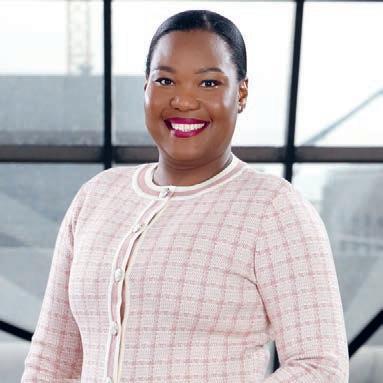
to ensure employees affected by gender-based violence receive professional care and protection.
Achieving pay parity has taken consistency and resolve. We have embedded gender pay reviews into our salary cycle, guided by our total reward framework –recognised by the South African Reward Association. In 2023, this enabled us to reach and maintain overall pay parity across management levels. When inclusion is built into the systems that shape working life, fairness becomes standard, not exceptional. Our progress shows that true transformation is possible, not just within a single company, but across the sector – if we lead with intention.
Clarity of purpose drives powerful connection with colleagues and customers alike, writes DR MELANIE VAN ROOY, chief marketing officer at Clicks
The majority of South African consumers –68 per cent, according to the Kantar BrandZ 2024 Global Report – are willing to invest time and money in brands that commit to doing good. This is a clear signal that purpose is no longer a nice-to-have. However, it is also not a marketing campaign; it is an inside job.
This year, Clicks ClubCard turns 30 – a milestone that invites both celebration and re ection. It is a reminder of how much our brand has evolved, and how deeply our growth is rooted in purpose.
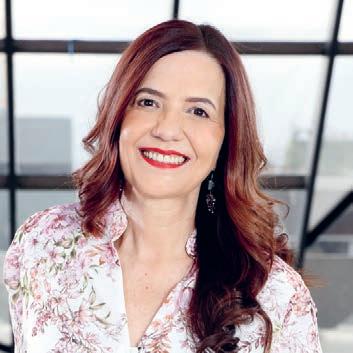
At Clicks, our ethos – to build a healthier future – is not something we tuck into a tagline. It is a commitment we live daily: to build healthier lives, communities, economies, and a healthier planet. When a brand’s purpose is this clear – and this human – it attracts people who believe in something bigger than themselves and gives us, as a team, a shared sense of direction. That sense of shared purpose makes cohesion possible. It turns values into culture – one of collaboration built on trust, creativity fuelled by
safety and accountability shaped by kindness.
As a woman in senior management, I am mindful of the responsibility that comes with visibility. Mentorship does not always require a programme; sometimes it is simply seeing someone clearly, quieting the imposter voice and reminding them of their worth.
By investing in young women leaders in a way that helps them feel seen, supported, and inspired to do the same, I hope to leave a legacy of connection. That, to me, is the power of a purpose-driven brand: one that people not only buy from, but also believe in.
In high-risk industries, such as mining, manufacturing, construction and logistics, the margin for error is razor-thin. Health, safety, environmental and community compliance isn’t just a legal requirement; it’s a lifeline for the people on the ground and the reputation of the companies that employ them. By INGRID OSBORNE , co-founder and CEO of Saryx
For decades, high-risk industries have relied on paper-based systems, fragmented spreadsheets and outdated processes to track critical compliance data. However, in an era of rapid technological change, that approach no longer cuts it. Cue health, safety, environment and community compliance (HSEC).
HSEC Online® is an award-winning, cloud-based compliance management platform that is transforming the way companies manage safety and regulatory requirements. Built to capture, store, distribute and manage compliance documents in real-time, HSEC Online integrates all aspects of health, safety, environment and community compliance into a single, centralised solution.
We built HSEC Online because we saw the cost – in time, money and sometimes lives –of outdated compliance systems. Our goal has always been to give organisations a clear, real-time view of their compliance so they can make faster, safer decisions.
Traditional compliance systems often suffer from a dangerous lag between capturing data and acting on it. An expiring permit, a missed training requirement or a hazard not reported in time can have catastrophic consequences. HSEC Online eliminates that lag. By digitising and automating compliance processes, the platform provides instant visibility into compliance levels across an organisation’s entire operational footprint – whether it’s a single site or dozens spread across multiple countries.
This level of transparency allows managers, contractors and regulatory bodies to act quickly when potential risks are detected, reducing both downtime and liability exposure.
The platform’s impact isn’t theoretical. It has been successfully implemented by some of the world’s most respected companies. One standout example: HSEC Online onboarded eight sites, from planning to go-live, in just three months and another ve sites in a single month –a feat unthinkable under legacy systems.
Our clients trust us because we deliver measurable results quickly. When you can show that multiple sites were onboarded in under three months, that’s not just a success story; it’s proof of scalability.
With a current footprint spanning 14 countries and onboarding between 100 and 400 companies each month, the platform is proving it can scale across diverse regulatory environments and operational challenges.
HSEC Online isn’t just a stand-alone tool; it’s designed for seamless integration with existing systems like HR, ERP, access control, and medical surveillance software. This interoperability means organisations don’t have to rip and replace existing infrastructure; they can enhance it.
Arti cial intelligence-powered features, including metadata extraction for document processing and predictive analytics for risk
identi cation, give users a proactive edge. Rather than reacting to compliance gaps after they appear, companies can anticipate and address them before they become a problem.
As environmental, social, and governance (ESG) reporting becomes a boardroom priority, HSEC Online’s ability to provide auditable, real-time data on safety and compliance has made it a powerful tool for demonstrating responsible operations. In industries under increasing scrutiny, this isn’t just a compliance win; it’s a competitive advantage.
For many of our clients, ESG isn’t a box-ticking exercise; it’s a commitment. We make it easier for them to prove that commitment with accurate, transparent and easily accessible data.
The shift from manual compliance tracking to intelligent, connected systems is no longer optional. In the years ahead, high-risk industries will demand even greater transparency, automation and predictive capability. With its proven track record, rapid deployment capability, and scalable design, HSEC Online is well-positioned to remain the industry’s gold standard.
By combining deep industry knowledge with cutting-edge technology, HSEC Online is doing more than digitising compliance; it’s rede ning what’s possible in workplace safety.
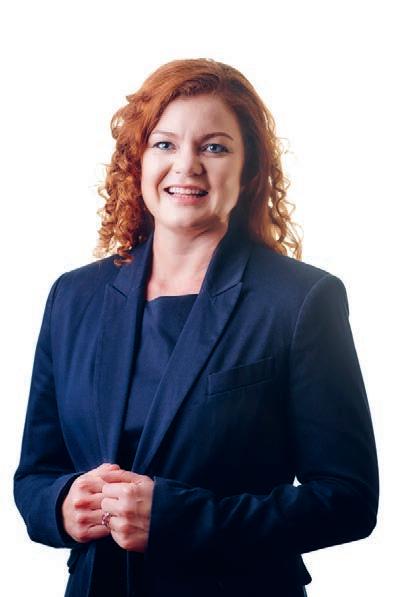











We are not just another law and tax firm. We are a unique professional services firm and your strategic partner in protecting what you’ve built and unlocking new opportunities. With a focus on tailored solutions that minimise risk and maximise value, we go beyond advice. We walk alongside you, safeguarding your interests and empowering your decisions every step of the way.
Andersen South Africa connects you to the full strength of a truly global firm. As part of Andersen Global, we harness the expertise of more than 20 000 professionals and 2 000 partners across 600 offices worldwide
Our African presence is equally strong, spanning 50 countries, 82 locations and over 300 partners, enabling us to deliver world-class solutions with local understanding, wherever you do business
Our five core values aren’t just words on a page; they are our daily practice. Best-in-Class is our promise to be the benchmark for quality, always striving for excellence in every solution we provide. Stewardship
is our commitment to you, powered by our investment in the brightest minds in the industry. Independence ensures we act as your objective advocate, free from conflicts that can compromise your success.
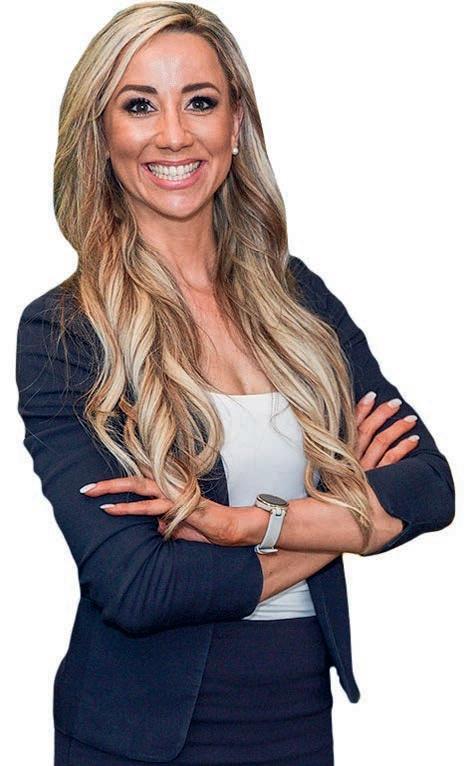
With Seamless service across a global network of over 170 countries, we ensure you receive consistent, high-quality support, no matter where you are. And, through complete Transparency, we build a foundation of trust with open communication and shared information every step of the way.
KESHIA MANOLIOS, director and a founding partner of Andersen in South Africa, believes progress towards a truly inclusive corporate world is accelerating
My journey from the courtroom to the boardroom is one marked by complex challenges, fierce competition and, crucially, the interwoven themes of resilience and empowerment. As a businesswoman, leader and partner at Andersen, my experiences have shaped a deep understanding of what it takes to lead in high-pressure environments while paving the way for future generations of women.
My early days as an attorney taught me that the courtroom is not just an arena for legal arguments, but a crucible for personal growth and fortitude. The adversarial system instils a discipline for preparation, tenacity
under scrutiny and the ability to recover quickly from setbacks.
These skills are not just relevant; they are essential in today’s corporate environments where boardrooms demand clarity of thought and agility in decision-making. It takes all kinds to make a world, and I have certainly been exposed to a spectrum of individuals who have challenged my strengths and sought to take advantage of my weaknesses.

1. Own your voice. In a fast-paced profession, it can be tempting to mimic the style of others. Instead, find your own authentic voice. Your perspective is your power. Speak respectfully with conviction and don’t hesitate to contribute your ideas. You may not always get your way, but you should always have your say.
2. Build your own “board of directors”. You don’t just need a single mentor. Identify a diverse group of advisors, a personal “board of directors”. This group should include people from various fields and levels of experience who offer different kinds of support and perspectives. Ensure
Within Andersen and throughout my career, I have encountered certain key individuals who saw the benefit and privilege of empowering others, and it was through them that I transformed into the
you include people you can trust and who will be honest in their feedback.
3. Master your mindset. The pressure in law is constant. Learn to distinguish between what you can control and what you can’t, and let go of what you can’t control. Resilience isn’t just about bouncing back; it’s about staying focused and disciplined under the pressure. Remember that every setback is a lesson, not a failure.
4. Champion others. While receiving guidance is valuable, actively championing other women in your field is equally important. Look for opportunities to promote the work of colleagues, recommend them
THE COURTROOM IS NOT JUST AN ARENA FOR LEGAL ARGUMENTS, BUT A CRUCIBLE FOR PERSONAL GROWTH AND FORTITUDE.
professional I am today and someone who takes the responsibility of mentorship very seriously. Mentorship goes beyond knowledge sharing; it reflects potential and inspires people to step into their full potential.
Leave others better than you found them. This is the mantra by which I live my everyday life –professionally and personally. Progress towards a truly inclusive corporate world is accelerating, and it is the responsibility of every individual, but particularly those in leadership positions, to ensure an inclusive and empowering environment. Diverse teams, without a doubt, drive better decisions and performance.
for key projects and speak about their accomplishments in rooms where it matters. By lifting others as you rise, you help build a stronger, more inclusive profession for everyone. After all, we are better together.
5. Do not dim your light. The legal fraternity will expose you to high-pressure situations that can often knock you down. The key is to get back up and never allow a situation or any individual to dim your light. You have a purpose and are here for a reason. Agility is key to success; you cannot evolve without certain adjustments and sacrifices, but they should never be at the cost of your morals or the essence of who you truly are.
Follow: Keshia Manolios www.linkedin.com/in/keshia-manolios
With the G20 member states placing renewed emphasis on the quality of women’s employment and not just numerical parity, the urgency of South Africa’s gender pay disparity is impossible to ignore, writes STELLENBOSCH UNIVERSITY
Professor Anita Bosch, research chair for Women at Work at Stellenbosch Business School, describes the country’s persistent pay gap as “a crisis with profound consequences for families and households”.
Despite progressive labour laws, South African women still earn signi cantly less than men for work of equal value. The ILO places the median hourly wage gap at 28 per cent, above the global average of 20 per cent. In real terms, for every R100 men earn, women take home R72. This is particularly concerning given that 42.24 per cent of South African households are headed by women, according to Statistics South Africa’s 2024 General Household Survey 2024.
Professor Bosch argues that the disparity stems not from ignorance or lack of resources, but entrenched systemic failures: weak enforcement of legislation, opaque pay practices, unchecked occupational segregation, unequal care duties and a workplace culture that undervalues women. Addressing this demands action across three pillars: responsible transparency, enforcement and systemic transformation.
Employers must be required to disclose gender pay data across job levels, incentives and bonuses. Currently, much of this remains hidden from employees, regulators and the public. Professor Bosch stresses that responsible transparency is not just about publishing data; it requires preparation of people and also clarity on how pay decisions are made and how to close gaps.
Although equal pay for work of equal value is mandated by law, Professor Bosch warns that without monitoring, penalties and support for collective negotiation, protections remain ineffective. “The gender pay gap will not close on goodwill alone; it requires accountability,” she states, calling for regulators to be resourced to examine pay practices and impose meaningful sanctions where disparities are unjusti ed.
Women still tend to occupy lower-paying industries, while men dominate higher paying industries and leadership roles. On paper, South Africa performs well – the African Women’s Inclusion Index ranks it among the top six African countries in women’s leadership representation. Yet women’s educational achievements often channel them into lowerpaying elds, and the gap is widening even at the top end of the pay scale.
Companies must analyse pay gaps by occupation and level to identify where imbalances lie and use this data to diversify recruitment, development and promotion practices,” says Professor Bosch. Failure to act perpetuates inequality and undermines competitiveness in a diverse global market, she adds.








Achieving parity also requires cultural change. Policies such as exible work arrangements and parental leave bene t all employees, but are particularly critical for women, who still carry most caregiving responsibilities.

“Advancing gender pay parity is not just about



numbers; it is about rethinking how we value and address women’s contributions and needs throughout their careers,” Professor Bosch explains.
Overcoming the perception of leadership as “inherently masculine” requires dialogue that rede nes household and workplace responsibilities as shared.
Professor Bosch’s research, re ected in reports such as The Gender Pay Gap: A Guide for the Already Converted, shows that global best practices combine pay transparency, strong enforcement and cultural change.
Closing the gap is vital to reducing poverty, improving children’s welfare and building a just society. Momentum’s The Success Women Want 2025 Report highlights that 16 per cent of women view the wage gap as a barrier to success.
Gender pay equity is not a women’s issue alone; it’s a human rights and economic imperative. Professor Bosch calls on employers, government, labour unions and civil society to commit to making “responsible pay transparency non-negotiable”, enforcing laws “with courage and consistency,” dismantling segregation through “deliberate, data-driven interventions,” and building workplaces that “value, support and advance” women.
“We cannot afford another year, another decade, of stagnation.” South Africa must lead globally on gender pay parity. “Paying women fairly is not charity; it is justice and smart economics,” she concludes.
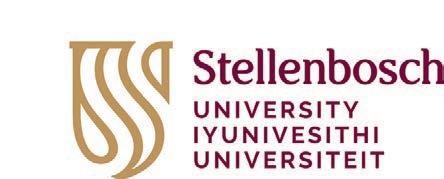
PROFESSOR SIBUSISO MOYO, deputy vice chancellor: research, innovation and postgraduate studies at Stellenbosch University, explores strategies for empowering women academics and driving gender equity in higher education
Enabling true excellence for women requires a holistic, intentional approach extending far beyond academic achievement. Our university campuses must become engines of transformation –spaces where women are not only included, but also empowered to ourish as con dent leaders and change-makers.
In South Africa, progress towards gender parity is evident. More women than ever are accessing higher education, earning advanced quali cations and holding leadership positions. These accomplishments re ect collective efforts to remove barriers and create new pathways for women’s empowerment. Yet challenges remain and we must continue striving for a more equitable future.
next generation of professors and provides comprehensive support with coaching as a central component. This initiative, open to all genders, has proven particularly valuable for accelerating women’s academic careers at SU.
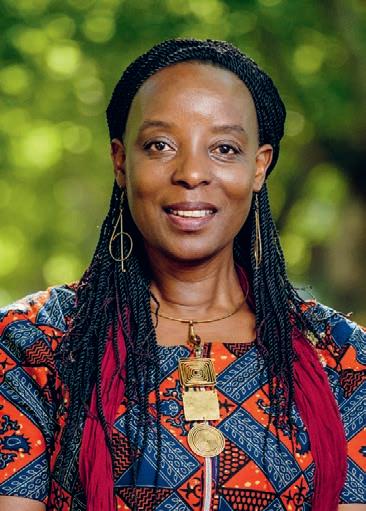
Higher education institutions are central to this process. They are centres of learning, innovation and societal change. Addressing disparities requires co-ordinated efforts by institutions and their networks. Initiatives at continental and national levels, such as those led by the Association of African Universities, are driving strategic measures to close the gender leadership gap.
Through research and engagement with policymakers and funders, institutions can highlight inequalities and push for meaningful policy reform.
At Stellenbosch University (SU), we are committed to creating an inclusive environment where diverse staff, including women, can thrive. Our programmes include coaching, mentorship and leadership development initiatives designed to advance women in academia.
For example, the SU Research and Innovation strategic programme (SUNRISE) attracts the
Recent engagements with Warwick University and the International Research Culture Conference 2025 have highlighted SUNRISE as a model for building positive research cultures and improving the institutional experience for all staff.
As a research-intensive university, SU strives to create a supportive culture where early-career researchers nd their identity and place in a complex environment. When women see others like them in leadership roles, barriers break and opportunities emerge.
We celebrate women academics through initiatives such as our Research and Innovation annual awards. In 2024, for instance, Professor Pumla Gobodo-Madikizela won the Templeton Prize – an achievement that continues to inspire women across academia, demonstrating there should be no limits to ambition.
Despite progress, women remain under-represented in academic leadership. As of 2023, women made up only 18.5 per cent of professors and 29.8 per cent of associate professors in South Africa.
At SU, just 3 women hold A-rated NRF researcher status compared to 20 men. Of 477 NRF-rated researchers, 181 (35 per cent) are women. More must be done to recruit, retain and promote women to the highest academic levels, particularly in under-represented disciplines.
Institutional commitment is essential. Equal pay, inclusive recruitment and sustained support from postgraduate studies to senior leadership roles are key.
In STEM (science, technology, engineering and mathematics) elds, where technological advances such as arti cial intelligence are transforming industries, women must not be left behind. Initiatives like the African Institute for Mathematical Sciences’ AI master’s track –led by Professor Ulrich Paquet, Professor Karin Howell and Professor Claire David –are addressing gender disparities in cutting-edge disciplines. Similarly, the African STARS Fellowship Programme, led by Professor Tulio de Oliveira at SU, aims for 60 per cent female participation in healthcare research, fostering gender equity in science and technology.
Funding research and supporting women academics ensures equitable representation in projects and publications. Partnerships with industry and government can help create clear career pathways for women across multiple sectors.
Diversity drives innovation, creativity and effectiveness. Yet UNESCO notes that although women make up over 50 per cent of university graduates, they represent less than 30 per cent of the world’s researchers –a loss for society at large.
At SU, we continue to invest in mentorship, mental health support, career development and research capacity building. Our research and innovation strategy prioritises institutional research culture, requiring collaboration between human resources, faculties, research divisions and researchers to create a people-centred, world-class environment. By unlocking the full potential of women in higher education, we help build a future where everyone, regardless of gender, has equal opportunity to lead and excel.
Follow: Professor Sibusiso Moyo www.linkedin.com/in/sibusiso-moyo-89208725
The UNIVERSITY OF MPUMALANGA celebrates dynamic women leaders who are breaking barriers, driving transformation and redefining academic success
Professor Thoko Mayekiso has served as vice chancellor of the university since 2014. As a founding vice chancellor, she pioneered the developmental trajectory of the University of Mpumalanga (UMP) to become a comprehensive institution.
Professor Mayekiso is deeply steeped in the academy, and the expression “rising through the ranks” aptly describes her academic and professional trajectories.
She obtained a BA Honours and MA in Psychology, from the University of Fort Hare and furthered her studies at the Free University Berlin, Germany, where she obtained her D Phil (cum laude) in Psychology. She also holds a Higher Education Diploma (postgraduate) from the University of South Africa and is a registered clinical psychologist with the Health Professions Council of South Africa.
In her sterling academic career, Professor Mayekiso has held positions of senior lecturer, associate professor, professor, head of the Department of Psychology and vice dean in the Faculty of Arts at the then University of Transkei. While at this university, she interspersed her teaching role with clinical practice, serving as a part-time clinical psychologist at the Umtata General Hospital.
She practised as an honorary clinical fellow at the Greenwood Institute of Child Health, University of Leicester and simultaneously served as a clinical psychologist in the Department of Medical Psychology, Leicester General Hospital in the United Kingdom.
A distinguished scholar and accomplished academic, Professor Mayekiso attracted several scholarships and fellowships. Notable among these are the German Academic Exchange Scholarship and the Commonwealth Fellowship tenable in the United Kingdom. She was awarded a certi cate by the Psychological Society of South Africa in acknowledgement of the contribution made to the profession of psychology in South Africa. She also executed functions as an executive member of the South African National Committee for the International Union of Psychological Science and board
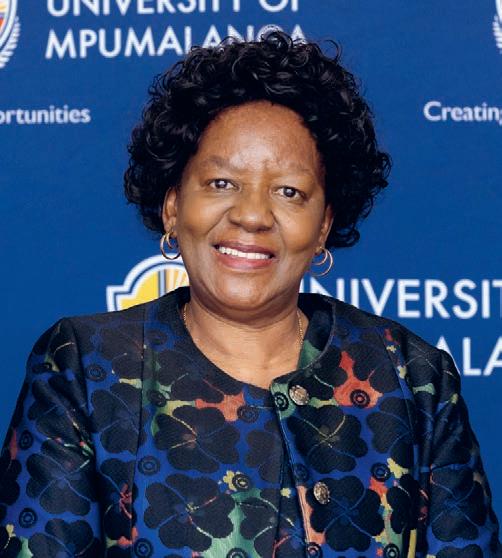
MAYEKISO IS HIGHLY REGARDED IN ACADEMIC CIRCLES AND HAS DEEP INSIGHTS ABOUT THE COMPLEXITIES OF HIGHER EDUCATION.
member of the International Council for the Science Union. Being in a profession that requires continuing professional development, Professor Mayekiso has ensured she keeps abreast of new trends and developments to keep her skills as a clinical psychologist sharply honed.
She joined the University of the Witwatersrand, Johannesburg in 2001, as head of the School of Human and Community Development (psychology, social work, speech pathology and audiology and specialised education), chair of psychology, deputy dean, and then acting executive dean in the Faculty of Humanities. The South African
University Vice Chancellors Association and the American Council on Education awarded her a fellowship tenable at the University of Washington, Seattle, United States Professor Mayekiso served at the Nelson Mandela University in 2007 as an executive dean in the Faculty of Arts and then deputy vice chancellor: research and engagement in 2009. While at the helm of research at the Nelson Mandela University, she signi cantly contributed to creating enabling on research environment and conducive ecology. She has published extensively in accredited journals – nationally and internationally –and has written six book chapters. She has supervised 25 master’s students and 12 doctoral students. She was a C-rated scientist by the National Research Foundation from 2013 to 2024 and a member of the Academy of Science of South Africa. She received a Research Excellence Award from the Nelson Mandela University in 2014 and from the University of Mpumalanga in 2019.
At all the universities where Professor Mayekiso has served as an academic and academic leader and manager, she actively participated in key committees. Beyond university management, she has been involved in many boards and science councils: founder member of the Child and Family Unit at the Umtata General Hospital, board member of the National Development Agency, founder advisory board member of the Oprah Winfrey Leadership Academy for Girls – South Africa, member of the council of the Agricultural Research Council, South African advisory board member of the Rosalynn Carter Mental Health Fellowships for Journalism, member of the advisory board of the Children’s Institute, University of Cape Town, founder member of the Emthonjeni Centre Advisory Board, editor-in-chief of the SAHARA Journal of Social Aspects of HIV/AIDS, associate editor of the Journal of Psychology in Africa, member of the board of the Institute for Cooperatives Development at the University of Fort Hare, and member of the board of the Eastern Cape Economic Consultative Council. She currently serves on several boards and advisory structures within the higher
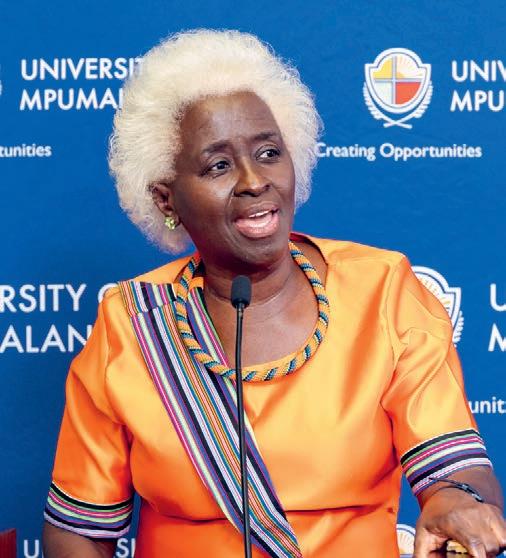
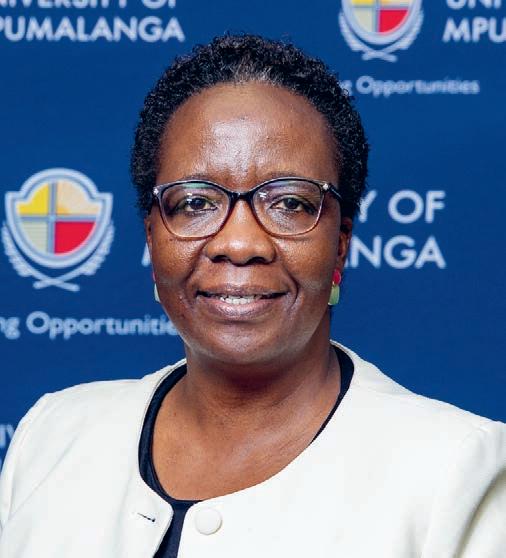
education sector. She was the chairperson of the Universities South Africa Research and Innovation Strategy Group. She serves on the boards of Higher Health, Universities South Africa, Technological Higher Education Network South Africa and is a member of the Academy of Science of South Africa Forum on the Just Transition. She is the chairperson of the advisory board of the UMP Centre for Entrepreneurship Rapid Incubator and an advisor to the Council of the Academy of South Africa.
She has led many task teams as universities grappled with the winds of change and the implementation of the transformation agenda, and is a member of the Universities South Africa Transformation Strategy Group. Professor Mayekiso is highly regarded in academic circles and has deep insights into the complexities of higher education.
Professor Mashudu Davhana-Maselesele is the deputy vice chancellor: teaching and learning at the University of Mpumalanga. She is a dedicated higher education leader, scholar and advocate for transformation in teaching, learning and capacity development. Professor Davhana-Maselesele began her career as a professional nurse, midwife
and primary healthcare nurse at Donald Fraser Hospital. She later transitioned to academia, earning a BA Honours (Cur) and MA (Cur) in Nursing Education from UNISA. She furthered her studies at the University of Johannesburg (then RAU), where she obtained a DPhil in Programme Development. She also holds a postgraduate diploma in International Research Ethics in Southern Africa from the University of Cape Town. She completed postdoctoral studies at the University of California, Los Angeles, focusing on trauma research, particularly gender-based violence.
During her academic journey, she rose through the ranks from junior lecturer to lecturer to senior lecturer at the University of Venda. She has held key academic leadership positions at the North West University (Mahikeng Campus) as an associate professor, professor, executive dean of the Faculty of Agriculture, Science and Technology, vice rector: teaching/ learning, research and community engagement, and later the campus rector. She joined Walter Sisulu University as rector of the Mthatha Campus and later became an acting deputy vice chancellor: academic affairs and research.
PROFESSOR DAVHANA-MASELESELE HAS CONTRIBUTED SIGNIFICANTLY TO CAPACITY DEVELOPMENT, MENTORING EMERGING ACADEMICS, STRENGTHENING INSTITUTIONAL SYSTEMS AND CULTIVATING RESEARCH, SCHOLARSHIP AND ENGAGEMENT INITIATIVES.
Professor Davhana-Maselesele has contributed signi cantly to capacity development, mentoring emerging academics, strengthening institutional systems and cultivating research, scholarship and engagement initiatives. She has raised funds for the development of young, upcoming academics and infrastructure development at the Mahikeng Campus. She has supervised postgraduate students at the master’s and doctoral levels.
She has published widely in accredited journals nationally and internationally and was editor-in-chief of CURATIONIS. She has also served as a member of the South African Nursing Council and as an editorial board member of different journals.
Professor Samukelisiwe Khumalo, dean of the Faculty of Education at the University of Mpumalanga, is a transformative leader committed to excellence in teaching, learning, and student success. She holds a PhD from the University of KwaZulu-Natal (UKZN) and multiple degrees from the University of Zululand. Formerly an associate professor and academic leader at UKZN, she earned the 2024 Teaching Excellence Award and several accolades for her contributions to education. With extensive experience in programme development and reviews, her focus areas include curriculum studies, teacher development and teaching and learning. Her research explores strategies to enhance student academic success, particularly for rural students. She has published widely, supervised numerous master’s and PhD students and was named among Golden Key’s 300 most in uential South African leaders in 2025.
She is a principal investigator for ongoing research projects, including a three-year student academic success project funded by the National Research Foundation. Currently, she is a member of the Umalusi Quali cations Standards Committee of Council. An alumna of the HERS-SA Academy, Professor Khumalo completed the esteemed Women in Leadership Programme in 2024. She also completed a Senior Management Development Programme at Stellenbosch Business School.
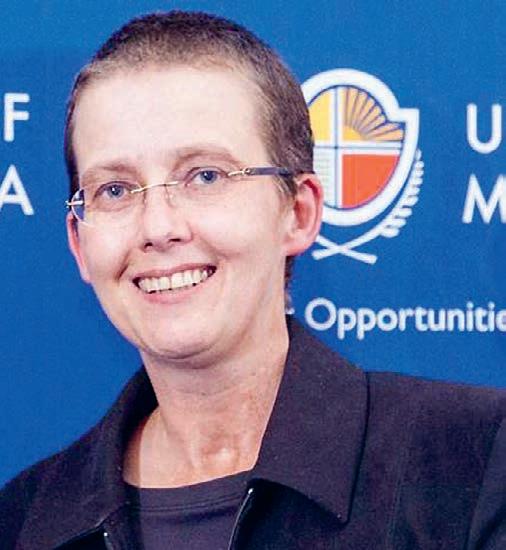


Professor Estelle Boshoff is an accomplished academic leader with more than two decades of experience in higher education. She currently serves as acting dean of the Faculty of Economics, Development and Business Sciences and head of the School of Development Studies at UMP, where she has driven strategic planning and curriculum innovation across disciplines. Her leadership includes overseeing programme accreditation, staff development and institutional governance through service on council, senate and multiple executive committees. Guided by a philosophy of inclusivity, empowerment and ethical decision-making, Professor Boshoff has also led impactful community engagement initiatives, particularly in advancing gender equity and student development. She actively engages students through mentorship, career development initiatives and research support. Her approach to teaching and learning is grounded in the belief that higher education should inspire students to think critically, act ethically and engage meaningfully with society.
Professor Boshoff’s commitment to excellence in teaching and learning is matched by her research in work ethics, human capital development and employability. She has presented internationally, winning two best-paper awards in Germany, and her
research appears in a wide range of peer-reviewed journals. Registered as an industrial psychologist, Professor Boshoff integrates academic leadership with practice, driving inclusive and transformative education that prepares globally competitive graduates.
Professor Primrose Thandekile Sabela is an associate professor and programme leader in development studies at UMP, within the Faculty of Economics, Development and Business Sciences. She holds a PhD in Development Studies and brings extensive experience in higher education, with a strong focus on academic leadership, curriculum development and student mentorship. Her interdisciplinary research interests re ect the diverse nature of development studies, spanning African development, gender and development and inclusive education.
Professor Sabela has contributed to academic knowledge through presentations at national and international conferences and has published in peer-reviewed journals. As a visionary leader, she is committed to advancing socially responsive scholarship that addresses real-world development challenges, particularly in African contexts. Her work continues to in uence policy discourse and academic thought, making her a valuable contributor to the eld and a key gure in shaping the
IN ADVANCING GENDER EQUITY AND STUDENT DEVELOPMENT.
future of development studies in South Africa. She demonstrates a strong commitment to advancing teaching and learning, underpinned by the consistent promotion of innovative pedagogical approaches. Her pursuit of academic excellence is evident in her signi cant contributions to knowledge production and dissemination. Her work constantly seeks to improve educational outcomes and strengthen research impact within her eld.
Professor Ntombovuyo Wayi-Mgwebi is an associate professor and head of the School of Computing and Mathematical Sciences at UMP. She holds a PhD in Computer Science from North-West University, with research interests that include ICT for development, digital transformation and responsible computing. With a career spanning more than two decades in higher education, she has served in diverse academic and leadership roles at school, faculty and institutional levels. She currently chairs the UMP Institutional Forum, where she advises the university council on institutional transformation and national higher education policies. Her leadership is de ned by a strong commitment to equity, ethics and academic excellence. This extends to advancing industry-aligned curricula and promoting community-engaged scholarship.
Beyond the institution, Professor Wayi-Mgwebi is actively engaged in shaping the broader academic landscape. She contributes to national and international platforms, such as the UNESCO IFAP National Committee, the National Institute for Theoretical and Computational Sciences and the Southern African Chapter of the Association for Information Systems.
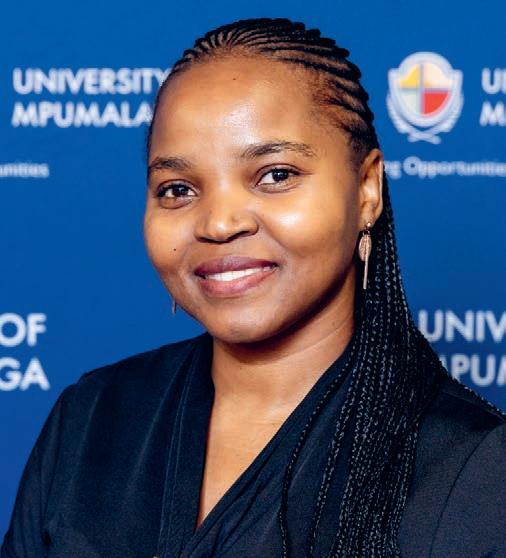
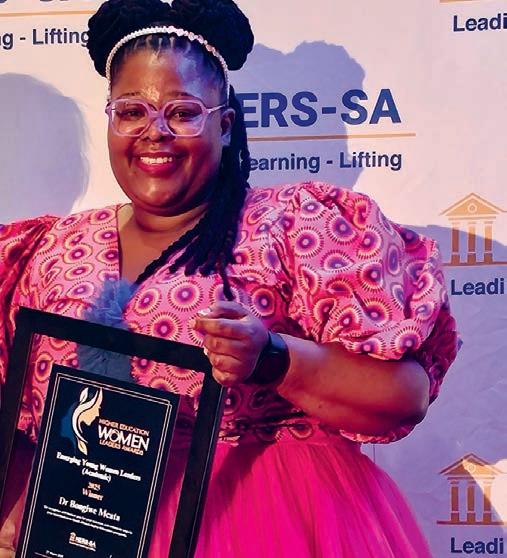

Outside academia, she is an active member of Toastmasters International, where she continues to grow her communication and leadership skills. She is also passionate about community development, particularly in promoting digital literacy and inclusive education at the grassroots level.
Dr Ayanda Nomaswazi Shabalala is a senior lecturer and programme leader for the BSc in Environmental Sciences at the University of Mpumalanga. She holds an MSc in Water Resources Management from the University of Pretoria and a PhD in Civil Engineering from the University of Johannesburg. Dr Shabalala’s research focuses on acid mine drainage (AMD) remediation and climate resilience. Her work has contributed to the development of low-cost treatment technologies for polluted mine water with strong potential for upscaling in collaboration with government and industry stakeholders. Her recent research shows that pervious concrete barriers could offer a long-term solution for AMD treatment. She is also exploring the intersection of mine water pollution, climate change and green infrastructure.
Dr Shabalala has published 16 peer-reviewed papers in leading journals and has presented her work at national and international conferences. She is a recipient of the DHET Future Professors Programme (2024), Faculty Teacher of the Year (2024) and Emerging Researcher of the Year (2023) awards. She has supervised four master’s and numerous honours students to completion. A registered water resources scientist with the South African Council for Natural Scienti c Professions, she has secured research funding from the Water Research Commission (WRC)
and National Research Foundation (NRF) of South Africa. She also sits on NRF review panels and serves as an external examiner for honours and master’s programmes.
Dr Bongie Mcata is an agricultural economist with over a decade of experience in academia and research. A lecturer and programme leader for the BSc Agriculture degree at UMP, she integrates academic leadership and research with community-focused engagements. She is passionate about inclusive agricultural development and transformative higher education that empowers rural communities and women in agriculture.
A PhD graduate in Agricultural Economics from the University of Fort Hare, she has contributed to national projects on food systems and socioeconomic development. She has published in peer-reviewed journals, presented at conferences and supervised postgraduate students. She has successfully led and co-led multidisciplinary projects funded by the WRC, Department of Science and Innovation, Department of Social Development and the Financial and Fiscal Commission. Dr Mcata sits on various UMP academic committees, the Mpumalanga Green Cluster Agency board, NRF Grant Review Panel and is a WRC reference group member.
Her accolades include the 2025 HERS-SA Emerging Young Women Leaders Award, serving as South Africa Scienti c Committee chair for the 2026 International Conference on Business Models in Agriculture, a BRICS Young Scientist alumna and the Agricultural Professional fellow.
Following her graduation from UKZN in the early 1990s, Nokukhanya Shongwe began her career in the private sector at Old Mutual and later moved to work at the Kruger National Park. With over 20 years of experience in higher education, she has worked at various higher education-based institutions, including WITS, NRF and the University of Limpopo. Her exposure in both the public and private sector has enabled her strong work ethic and commitment to service excellence.
From humble beginnings in Kabokweni, Mpumalanga, Shongwe has come full circle with her desire to learn and enable those in her community. Driven by her desire to contribute to the province known as the “Rising Sun”, she chooses to seize the vast opportunities that have been made possible under the leadership of Professor Mayekiso.
VISIT WEBSITE

For more information: www.ump.ac.za
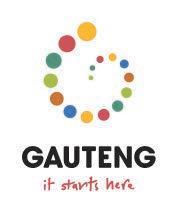
www.gauteng.net
THE GAUTENG TOURISM AUTHORITY celebrates two influential leaders making their mark
Sthembiso Dlamini has been a successful senior executive leader for more than a decade, driving innovation, growth and strategic excellence. As CEO of the Gauteng Tourism Authority (GTA), Dlamini is motivated by a desire to help people and businesses reach their full potential. She nds it rewarding to build capacity in people, as it allows her to serve in a more expansive and impactful way.
The GTA is responsible for marketing and positioning Gauteng as a tourist and business events destination of choice and a competitive global city region across Africa and the World. Dlamini joined GTA in 2023, and her work includes sustainable tourism development,

enhancing visitor experience and facilitating investment for tourism infrastructure projects. This work is primarily intended to drive the transformation of the Gauteng tourism sector by diversifying tourism products and experiences. The GTA also serves as the lead co-ordinator for the Gauteng Air Access initiative, which aims to increase airlift capacity in the province to facilitate trade, investment and tourism. At the heart of it all is ensuring tourism remains an important driver of inclusive economic growth and job creation in the province.
Before joining GTA, Dlamini held senior executive and leadership positions at several public institutions. Her extensive executive
and board experience in the public sector demonstrates her dedication to effective governance, transformation and ethical leadership.
She is passionate about lifelong learning and believes it will help her achieve mastery in all areas of her life. She holds a variety of academic quali cations, including an undergraduate degree, postgraduate quali cations and a master’s degree. She is currently pursuing her doctorate in business leadership. Continuous learning is an important part of ful lling her purpose of living a well-balanced, happy and healthy life, as well as a ful lled extended career life aligned with her higher purpose of making an impact in her community, country, Africa and the world.
SHE FINDS IT REWARDING TO BUILD CAPACITY IN PEOPLE, AS IT ALLOWS HER TO SERVE IN A MORE EXPANSIVE AND IMPACTFUL WAY.
Nonnie Kubeka, executive director of the Gauteng Convention and Events Bureau (GCEB), stands as a beacon of leadership and innovation in the Business Events Industry.
With a 25-year career in destination marketing and as an internationally recognised Meetings, Incentives, Conferences and Exhibitions (MICE) expert, Kubeka’s dedication and expertise have been instrumental in driving South Africa’s MICE sector forward. Her academic foundation, cemented the strategic

prowess she has used to position Gauteng as a premier international MICE destination. At the GCEB, her leadership has spurred remarkable growth with business tourism injecting billions into the local economy and creating countless jobs.
Her in uential journey includes key roles at Grant Thornton, Standard Bank CIB, the Cape Town International Convention Centre and Gauteng Tourism. These positions honed the skills she now applies to secure high-impact events and craft strategic partnerships for the GCEB.
Her tireless work has earned her prestigious accolades, including recognition by the Top 50 Most In uential Persons in the Events Industry, the Women in MICE Award, Forbes Africa, and, most recently, the Standard Bank Top Women Leadership Award and the African Tourism Women Leadership Award.
Beyond her professional achievements, Nonnie is passionately committed to mentorship. She serves on numerous advisory boards and has spoken on over 150 international and local platforms, dedicating herself to cultivating the next generation of industry leaders. Her legacy is one of visionary leadership, excellence and lifting others as she climbs.
The next generation of leaders in academia must ready themselves to deal with geopolitical tensions as well as artificial intelligence, writes PROFESSOR GRACE KHUNOU, acting executive director of leadership and transformation at Unisa
South Africa has many women, named and unnamed, who have stood up boldly both historically and in contemporary society.
These bold contributors have been ghting injustice and oppression while raising families under dif cult conditions and leading industry and innovation in teaching and in truth-telling.
While we know from our personal stories of how daring and fearless our own mothers, aunts and grandmothers were and continue to be, women are still stereotyped as incompetent, weak and “Jezebels”.
This is a blatant lie. It is problematic on so many levels as it sustains gender inequality, robs the world of talent and innovation and is harmful to building safe and sustainable futures.
GEOPOLITICAL IMPACT
The current geopolitical frictions we are experiencing are due to a continued lack of balanced voices in global politics. Where women lead peace missions, peace lasts longer.
IN THE ERA OF AI AND GROWING DIGITISATION, WE NEED THE NEXT GENERATION OF LEADERS TO BE CULTURALLY ASTUTE, TECHNOLOGICALLY AGILE AND JUSTICE-ORIENTED.
Where women are not barred from contributing, society thrives.
Among the deeper reasons for global con icts are greed and the need to show power in divisive ways that highlight and fear difference. Fear-based notions of difference driving current geopolitical tensions are similar to those used to treat women as being “less than”. Unchecked, these divisive ideas of difference will claw back the historical bene ts of previous peace efforts.

Universities work tirelessly to demystify the lies used to suggest that difference is dangerous, and this work is gaining momentum. The work of unmasking this lie is growing in our Bosadi/Womanist and Feminist theorising and praxis.
The book, Inyathi Ibuzwa Kwapaphambili, and others doing similar work are a beacon of hope that the work of excavating the stories of women is signi cant for dismantling this lie. The work of universities is thus to balance excavating hidden “herstories” with teaching and research on these women who are increasing their efforts to amplify the truth that women lead, and lead powerfully.
This work has gathered momentum. It normalises women and their various powers and shows how truth-telling, which some might label divisive, is healing and signi cant for building equal futures for all.
In the age of arti cial intelligence (AI) and growing digitisation, efforts to normalise the multiple roles of women in society as positive are urgent. These AI tools, when used deliberately, have the potential to make this work easy, as AI has the power to sort through vast amounts of data, archive, instantly share and replicate widely. However, for this potential to be achieved, bold leadership is required, as AI has been shown to have the potential to reinforce bias. To avoid this bias, universities should balance funding science, technology, engineering and mathematics (STEM) studies and social and human sciences so as not to lose the signi cance of critical and ethical thinking needed for the equitable and safe development and use of these technologies. Again, funds and various other resources should be set aside to get more women into STEM to improve and increase their contributions to the development and use of such technologies.
In the era of AI and growing digitisation, we need the next generation of leaders to be culturally astute, technologically agile and justice-oriented.
While the truth about women’s contributions and competence has been spearheaded by feminist scholars the world over, similar truths about other marginalised groups require the same boldness in our future leaders.
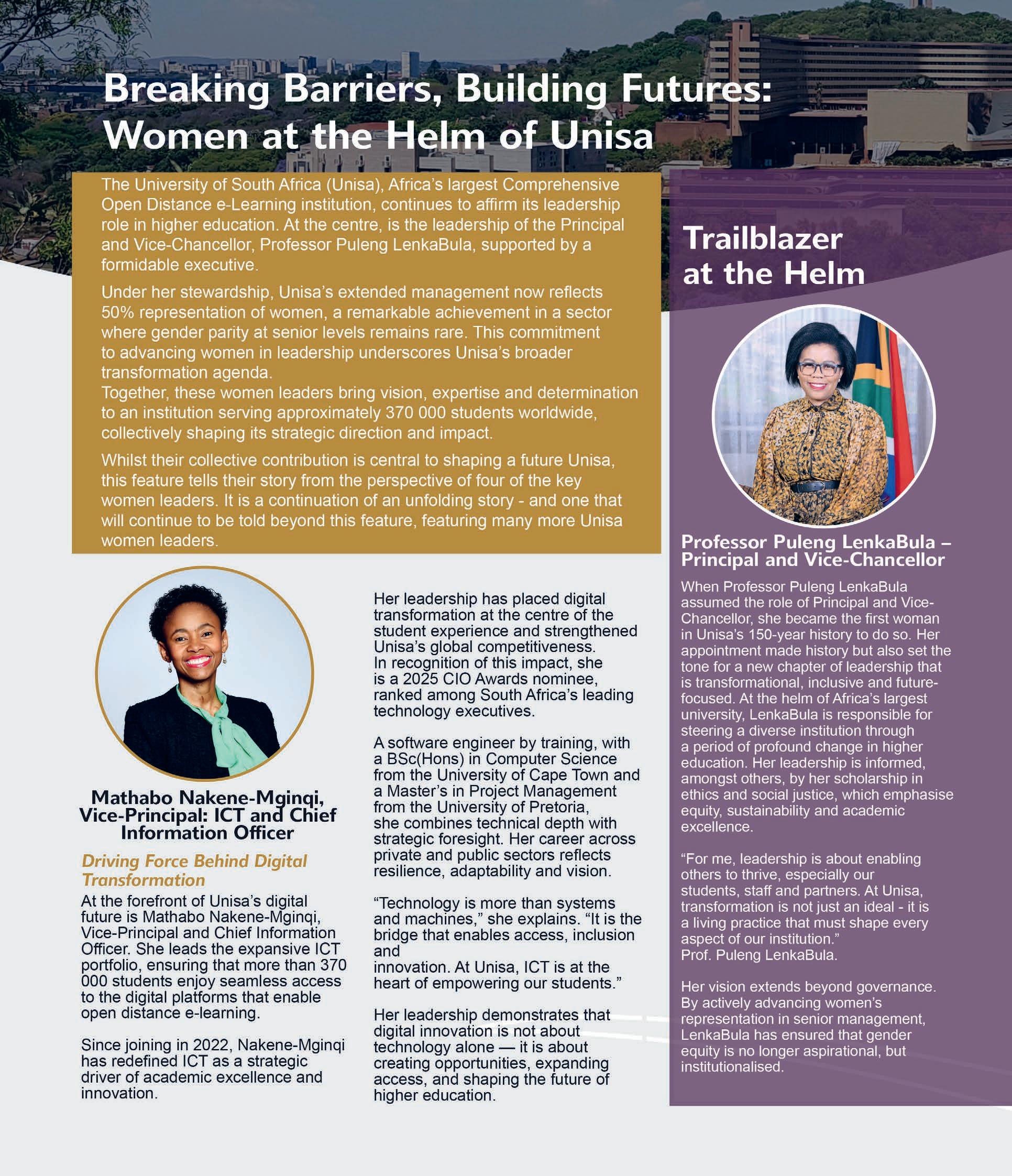
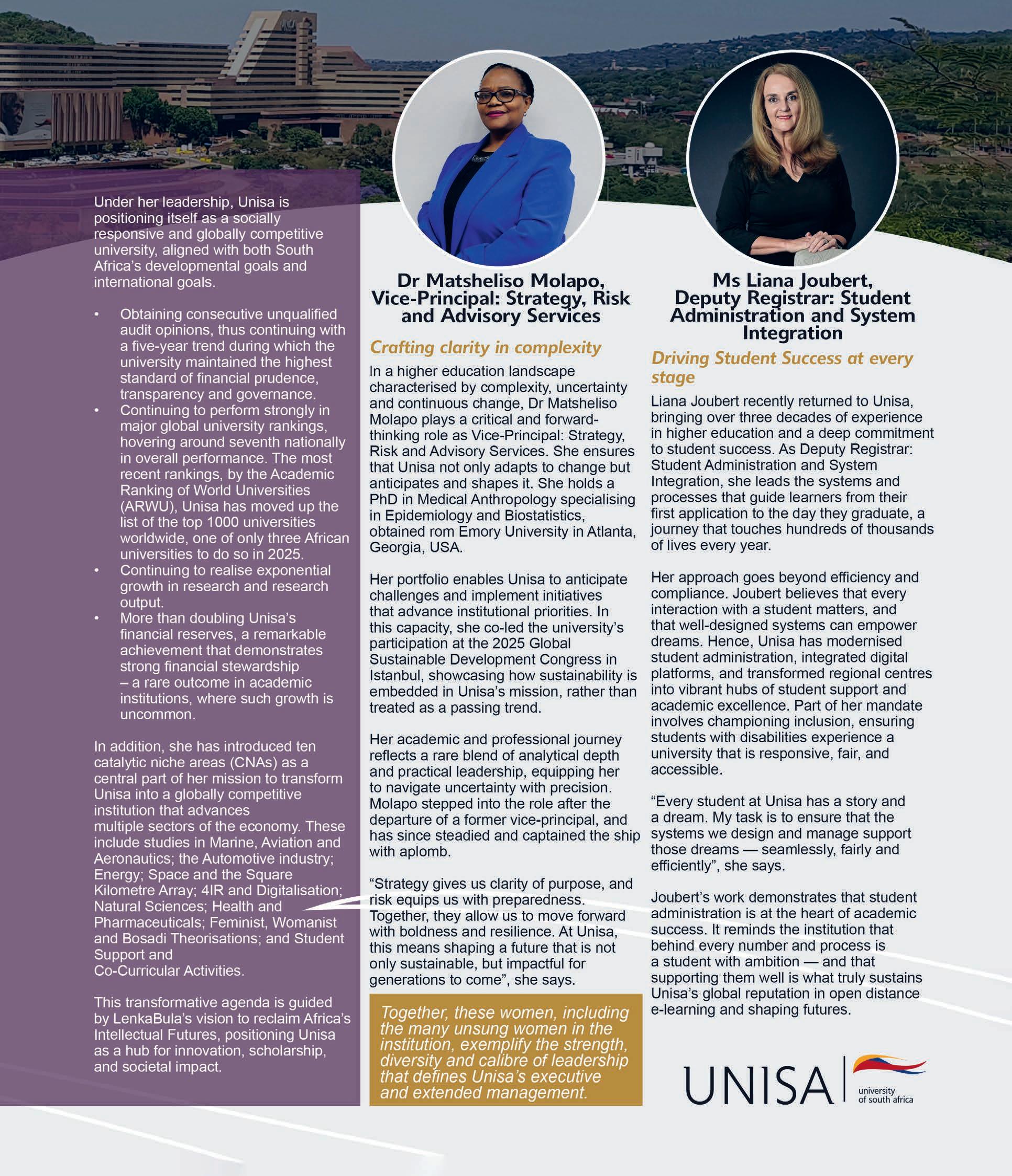
NDLULI, chief commercial officer at Discovery Insure, is intentional about sponsorship, not just mentorship, actively advocating for women in rooms where they are absent
From the moment I began my actuarial science studies, insurance became part of my world. Initially, I had planned to focus on investments because a passion for nancial inclusion drove me. I wanted to help people participate more fully in the economy and access tools to protect and grow their wealth.
Over time, I realised insurance is critical to that vision. In fact, it’s central to it. It provides a safety net that enables individuals and businesses to take calculated risks, moving them forward.
What’s kept my passion alive is the privilege of shaping solutions that deliver commercial growth and societal impact.
The short-term insurance sector is dynamic, constantly evolving and brimming with opportunities to innovate in ways that tangibly change lives.
I’ve been fortunate to have strong female role models from early on in my career, women who were often the only female voices in the room, but who navigated with authenticity, clarity and conviction.
My rst role in the short-term insurance sector was in the strategy of ce at Santam, when Lize Lambrechts had just taken over as CEO. Seeing her lead with con dence and individuality showed me that leadership doesn’t mean tting into a mould; it’s about leveraging your strengths and owning your perspective.
It’s also important to acknowledge the incredible male leaders who gave me opportunities and backed me without hesitation. Real transformation in our industry requires the support of allies who open doors, create opportunities and champion diverse voices. This support is critical.
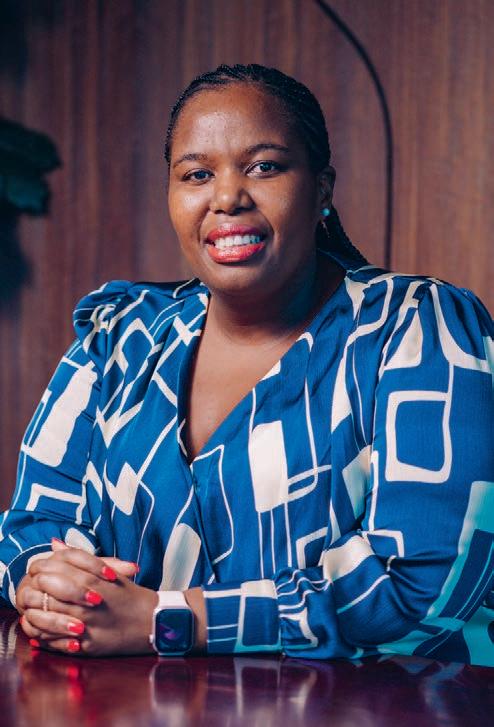
Precious Ndluli
I’m intentional about sponsorship, not just mentorship. Sponsorship means actively advocating for women in rooms where they are absent, making their contributions visible and connecting them to opportunities that accelerate growth.
REAL TRANSFORMATION IN OUR INDUSTRY REQUIRES THE SUPPORT OF ALLIES WHO OPEN DOORS, CREATE
OPPORTUNITIES AND CHAMPION DIVERSE VOICES. THIS SUPPORT IS CRITICAL.
Mentorship is still vital, especially in a sector where many young professionals are “ rst generation” in corporate environments. Without family members to guide them through the unspoken rules of the workplace, they need leaders who will provide a sounding board and encourage them to take the next step.
I aim to create environments where women feel safe to speak up, challenge norms and take calculated risks because real growth only happens outside your comfort zone.
WOMEN SHAPING THE FUTURE OF INSURANCE
It’s inspiring to see more women stepping into strategic and technical roles across the industry. They’re challenging outdated stereotypes and bringing diverse perspectives to the table, which is critical in an industry that thrives on anticipating and solving complex problems.
Diversity of thought means better product design, more inclusive customer engagement, stronger leadership cultures and ultimately better businesses. And, when our businesses are better, our societies bene t.
• You must intentionally invest in personal development while acquiring technical work experience. One of my greatest assets is being a student of life and of others, as that aids my personal development.
• Leadership is an internal job first before it is an external one, so lead yourself first. From that place, you need to relentlessly build your expertise, nurture relationships and seek opportunities that scare you a little.
• Remember, leadership is about creating an impact.
Follow: Precious Ndluli www.linkedin.com/in/precious-nduli-6bb1217
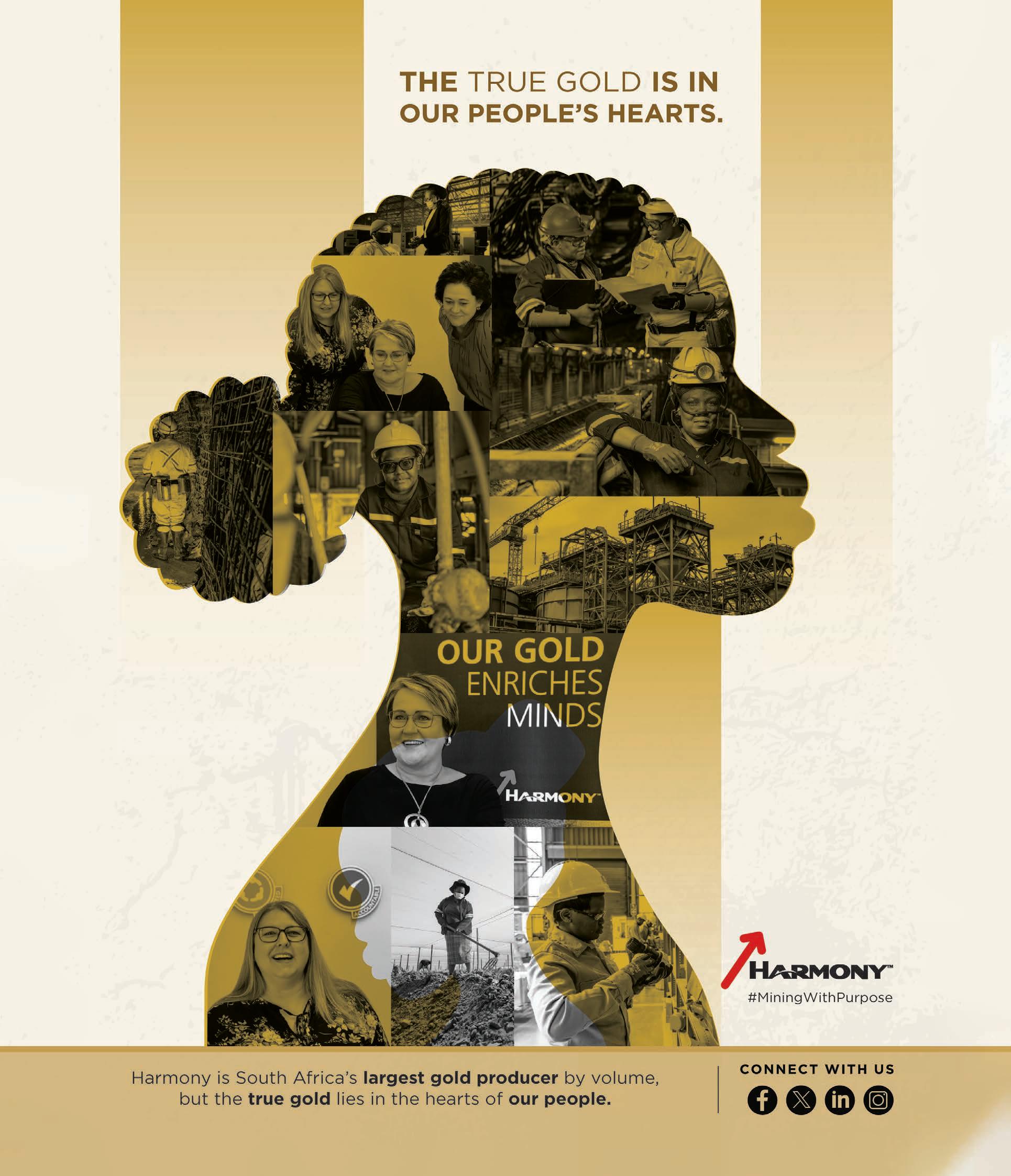
NONKU PITJE, CEO of Discovery Corporate and Employee Benefi ts, shares the lessons that helped her harness her strengths, shape her career and live in her purpose
As a teenager growing up in Soweto, I was eager to start working and earn money as soon as possible. My father helped me nd my rst part-time job while I was still in high school –packing shelves in a supermarket. I lasted one day.
Not because I wasn’t tenacious or because I looked down on the job. It was something else. I realised my multiple superpowers were being sti ed. I worked hard, but I was out of ow – a sign that my strengths lie in people, ideas and purpose.
My next job was a step in the right direction: sales consultant at a high-end clothing boutique. I was only 16, but there was client engagement, creative sales tactics and targets – all the things that tapped into my strengths. At school, I thrived in sports, debate club and leadership roles, environments that allowed my energy, curiosity and desire to connect with people to shine.
That day at the supermarket taught me something profound: my core strengths have a place and a purpose. My job is to nd environments where they can ourish so I can thrive. When I started shaping my career, I had an advantage. I already knew my natural, ingrained strengths, and I’ve used them in every role since.
I am generally an optimistic and positive person. I have always approached my career with the belief that the sky is the limit. I put no limitations on myself and always aim to do my best. I gravitate towards growth, even when it’s challenging. I view challenges as a playground to exercise my skills and gain new ones.
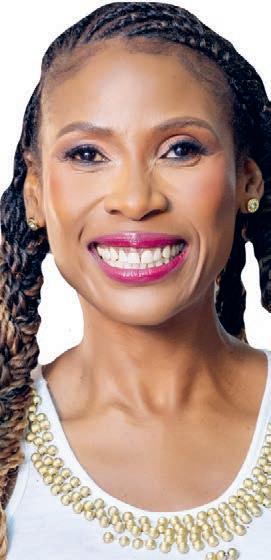

One skill that did not start as a strength but which I have worked on developing throughout my career is active listening. It’s about listening to understand, rather than to respond. When you actively listen and observe the unsaid, your response is more powerful and impactful.
When I use this skill optimally, I am a better leader, deal-maker, mother, daughter, partner and friend. It has the greatest impact in making people feel seen and heard –the very essence of what we all want.
If I’ve learnt anything in leadership, it’s this: happiness is not about avoiding problems. It’s about being anchored in purpose. Unhappiness is rarely caused by
MY PURPOSE IS TO INSPIRE AND EMPOWER MY TEAM TO HELP THE SOUTH AFRICAN WORKFORCE BECOME
HEALTHIER, LIVE BETTER, WORK BETTER AND RETIRE IN THE BEST FINANCIAL POSITION POSSIBLE.
external circumstances; it often stems from misalignment with purpose. Purpose gives me direction, but I’ve also learnt that purpose alone isn’t enough. You need presence to reach it.
Being present allows me to listen better, make wiser decisions, strengthen relationships and notice opportunities I might otherwise miss. I am most happy when I see the moment, am in the moment and embrace the moment. The magic is being fully there to hear it, see it and take part in it. That, for me, is living life – and that is happiness.
My purpose is to inspire and empower my team to help the South African workforce become healthier, live better, work better and retire in the best nancial position possible. In my leadership journey, I see daily how purpose and presence work together. Teams connected to a shared purpose and who show up for each other are more resilient, ful lled, have fun together and thrive.
I draw inspiration from Maya Angelou’s words: “People will forget what you said and what you did, but people will never forget how you made them feel.”
Follow: Nonku Pitje www.linkedin.com/in/nonkululekopitje
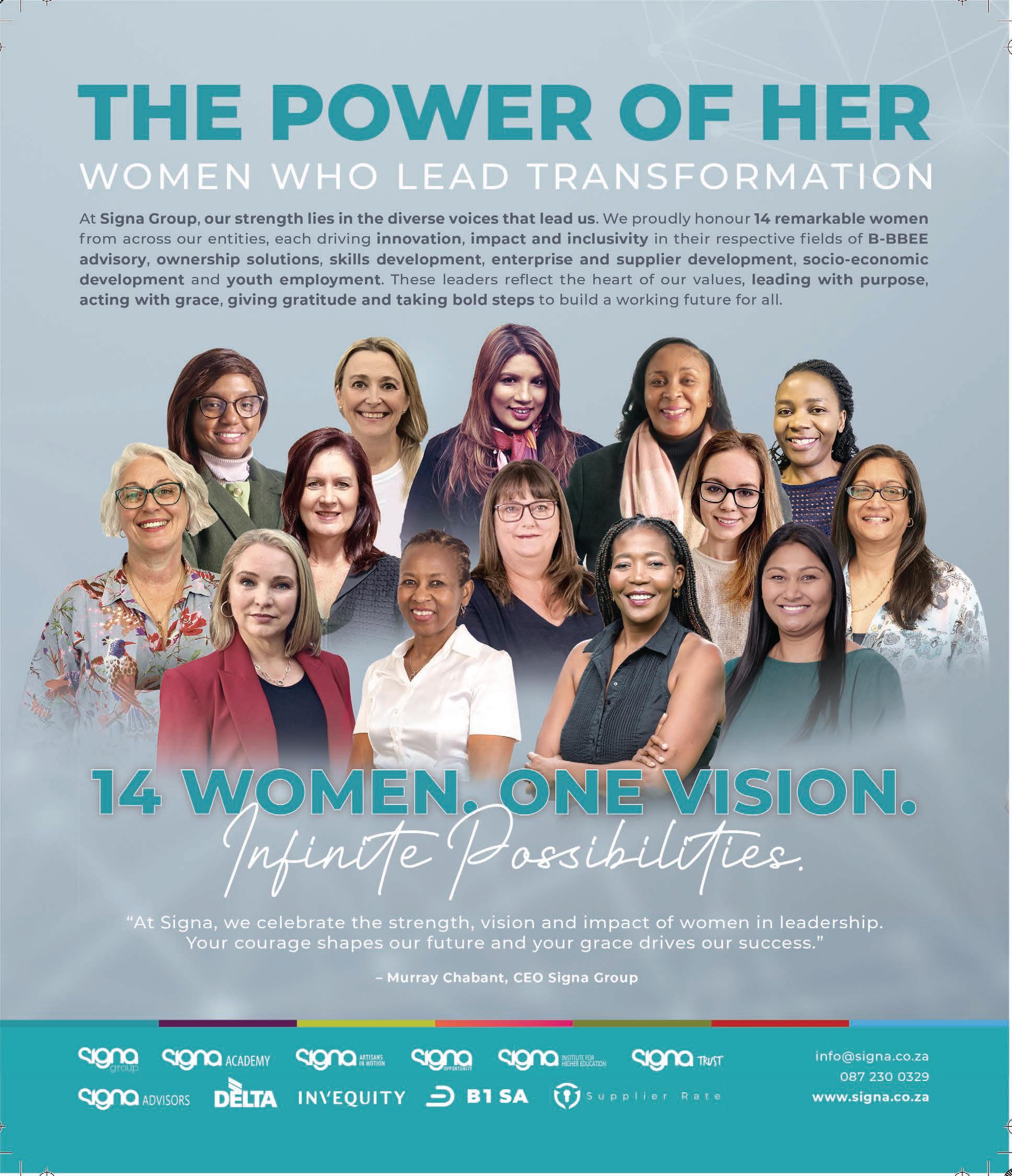

NICKI BRIVIK , founder of Ask Nicki, unpacks how integrating intimacy into corporate wellness boosts performance, creativity and connection
We have all sat through workplace wellness initiatives that focus on nutrition, tness or stress management. They’re important, yes, but I often wonder why the one element of our lives that affects every aspect of our health, productivity and relationships is left out: intimacy.
As a former attorney turned sex coach, I’ve witnessed how ignoring this vital part of our humanity limits not only personal ful lment, but professional performance, too. We don’t leave our bodies, desires or frustrations at the of ce door; we bring our whole selves into work, whether we like it or not.
Corporate wellness programmes have grown exponentially, and yet burnout rates are at an all-time high. Why? Because too often these initiatives treat people as if they’re only physical or mental beings. We are emotional, relational and sexual beings. Neglecting that truth is like xing the roof but leaving the walls to crumble.
Intimacy isn’t just about sex. It’s about connection, trust and the ability to show up as ourselves in our marriages, partnerships and workplaces. Research has consistently shown that people who experience greater intimacy and sexual satisfaction also enjoy lower stress, higher resilience and more energy – qualities companies say they want in their teams.
Think of the colleague who always seems distracted, or the leader who burns out after every big project. A lack of meaningful connection and ful lment seeps into our ability to focus, create and collaborate.
Sexual wellness is not about bringing the bedroom into the boardroom. It’s about recognising that when people feel desired, connected and at ease in their relationships, they become more engaged employees and leaders. One study published in the Journal
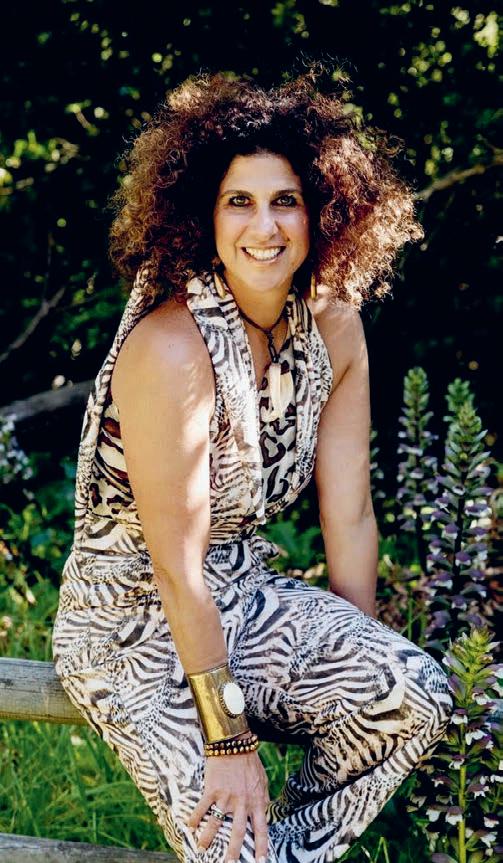
of Sex Research found that sexual pleasure at home, whether with a partner or solo, actually improves work performance and job satisfaction the next day.
Here’s a new angle: in an era where arti cial intelligence is reshaping industries and tasks, the one thing machines cannot replicate is human creativity. That spark of originality, imagination and lateral thinking is what organisations need most. Creativity is fuelled by intimacy. When we foster playfulness, curiosity and innovation in the bedroom, it spills into every other area of life. People who feel free to explore, express and create at home carry that same energy into the workplace.
So, how do we bring this conversation into the workplace without raising eyebrows or crossing lines? It starts with reframing.
1. Normalise the conversation
Just as we now talk openly about mental health, we can begin to acknowledge that intimacy is a legitimate part of holistic wellbeing. This isn’t about sharing private details, but about recognising sexuality as a source of energy and resilience rather than taboo.
2. Prioritise stress recovery
Stress is the biggest killer of desire. When companies invest in realistic workloads, exible scheduling and cultures of trust, they reduce burnout and make space for employees to reconnect with themselves and their loved ones. That ripple effect comes back to the of ce in the form of sharper thinking and renewed creativity.
3. Encourage growth mindsets in all areas of life
We are taught to upskill at work, but rarely to nurture curiosity in our personal lives. A culture that values learning, exploration and openness in uences how people relate to one another, making them better problem-solvers, leaders and innovators.
For years, we’ve acted as though intimacy and sexuality exist in a separate, sealed-off box from the rest of life. However, employees are not machines. They are human beings whose energy and joy come from many sources, including how seen, connected and desired they feel.
If we expand the de nition of wellness at work to include intimacy, we will unlock healthier individuals and stronger, more resilient organisations. When people thrive in their personal lives, they bring a different kind of spark to the workplace.
The future of corporate wellness isn’t more rigid programmes. It’s remembering that behind every employee badge is a whole person. When we create space for that whole person to ourish, everyone wins.
We honour the inspiring journeys of ve exceptional women at Isuzu Motors South Africa (IMSAf). Their stories embody resilience, empowerment and the vital support IMSAf provides in uplifting women within traditionally male-dominated industries. Together, they demonstrate how perseverance, con dence and an inclusive culture foster gender equality and leadership.
Sue McManus’s journey at IMSAf is marked by determination and growth. Starting as a secretary, she rose to a marketing specialist role involving extensive travel and event management. Despite the challenges of frequent travel, McManus maintained a strong work-life balance supported by her husband, enabling her to excel professionally.
Navigating obstacles as a woman in her eld was eased by a network of
supportive colleagues who valued her contributions. She recalls moments of public recognition that reinforced her motivation and sense of belonging. McManus advises young women: “Don’t be intimidated by what you don’t know. It can be your greatest strength.”
Deidre Zealand is a pioneer – the rst South African female soccer referee on the FIFA International List and the rst to of ciate a Premier Soccer League xture. Mental toughness helped her overcome demanding tness tests, showing that resilience outmatches physical limits.
Balancing refereeing and family life was possible thanks to her husband’s support and IMSAf’s exible policy on sport leave. Encouraged by supervisors who respected her multifaceted roles, Zealands’s advice is: “Do not despise the days of small beginnings. With belief, great achievements await.”
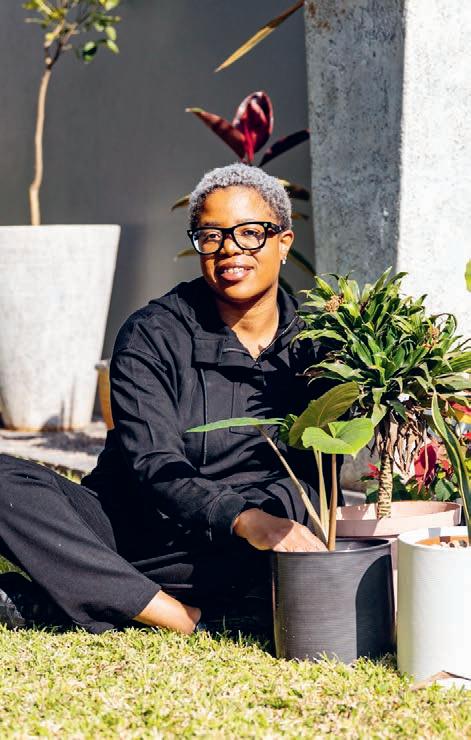
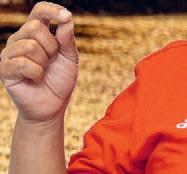


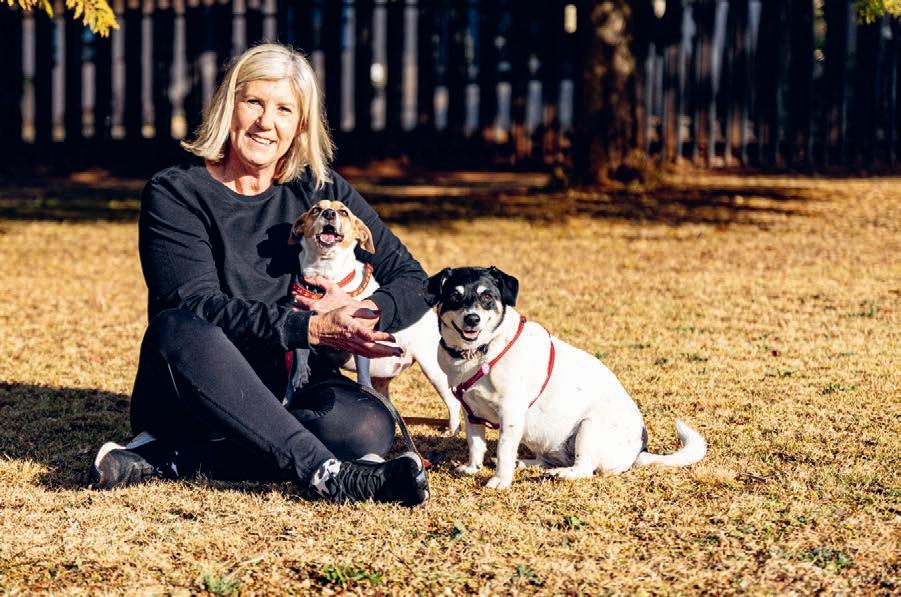

Mutondi Mashau’s journey combines resilience and professional growth. After joining IMSAf, she faced the loss of both her parents, but found support and strength through empathetic colleagues. IMSAf’s collaborative culture empowered her to lead an all-male team and contribute to strategic company initiatives. Her advice to women is clear: “Con dence is built through small wins and setbacks. Surround yourself with those who uplift you and remember you belong in every room you enter.” Her experience exempli es how support transforms potential into leadership.
Vuyokazi Msezeni’s story highlights courage and self-belief. Returning to education later in life, she juggled career, family and personal growth. Facing unconscious bias in a male-dominated industry, IMSAf’s mentorship programmes helped her gain con dence and progress professionally.
A turning point was mentorship from experienced female leaders who encouraged her to be bold and take up space. She urges young women to “be heard and be bold”, emphasising resilience as key to success.

IMSAF’S COMMITMENT TO GENDER INCLUSION SHINES THROUGH MENTORSHIP, FLEXIBLE POLICIES, LEADERSHIP OPPORTUNITIES AND A CULTURE THAT GENUINELY VALUES WOMEN’S CONTRIBUTIONS.
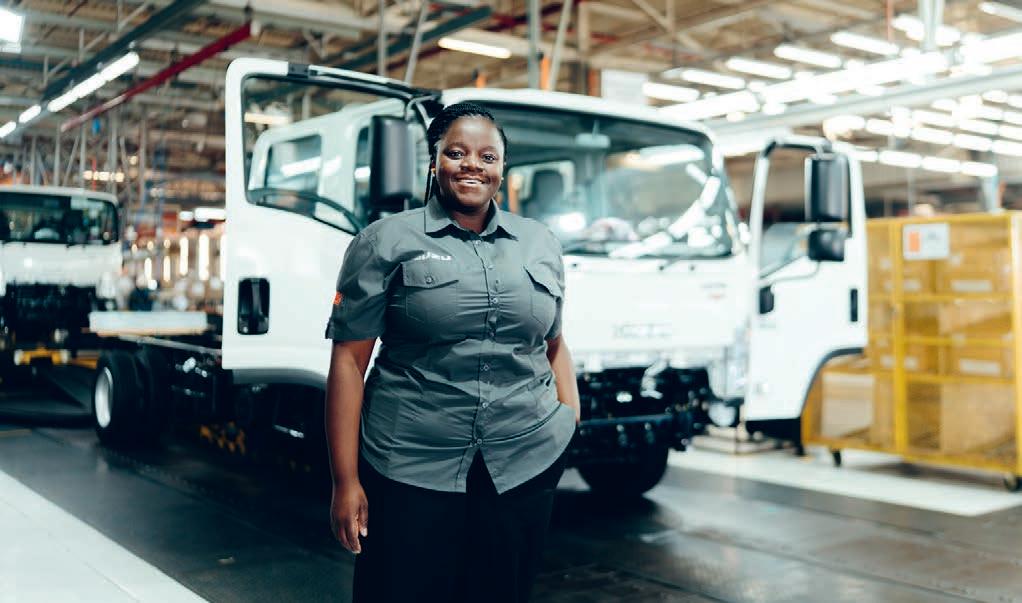
Nwabisa Maqubela’s journey is about authenticity and breaking moulds. She shares the challenge of not tting into stereotypical boxes, but choosing to remain true to herself –a liberating approach both personally and professionally.
Balancing career and family requires focus. She prioritises God, family and then work, supported by a community of women who provide help and encouragement. She highlights the struggle many women face of not being seen or heard, but credits IMSAf’s culture for respecting people irrespective of gender.
Maqubela encourages young women to identify goals, seek support and act despite fear: “Opportunities come and go. Dreams remain dreams if there is no action.”
The stories of McManus, Zealand, Mashau, Msezeni and Maqubela showcase how IMSAf is more than a workplace; it is a transformative platform that elevates women in South Africa’s automotive and industrial sectors. IMSAf’s commitment to gender inclusion shines through mentorship, exible policies, leadership opportunities and a culture that genuinely values women’s contributions.
Together, these women embody resilience, strength and leadership, inspiring future generations to push boundaries and lead with con dence. IMSAf is proud to af rm its role in nurturing empowered women who are shaping a stronger, more inclusive future.


